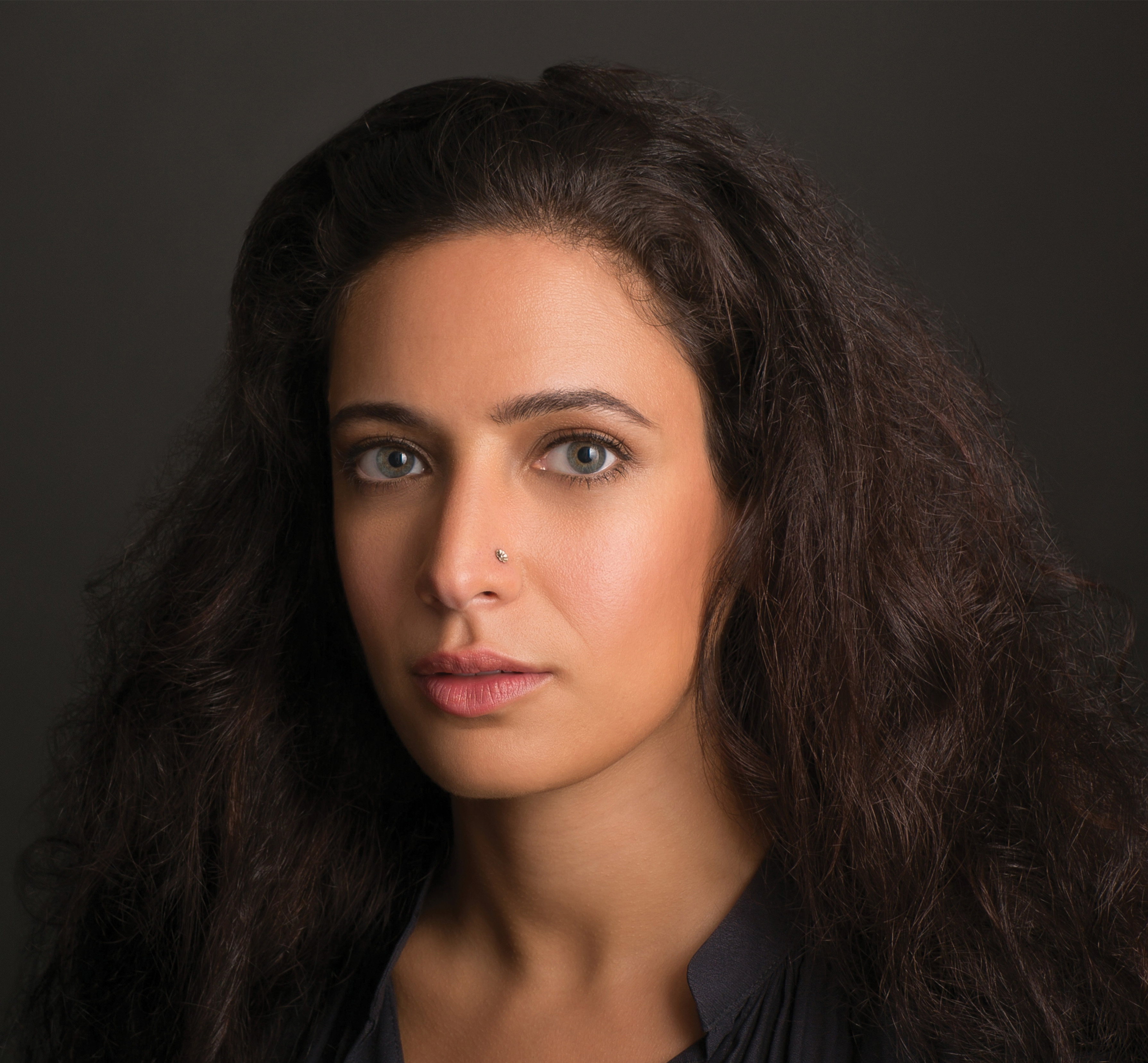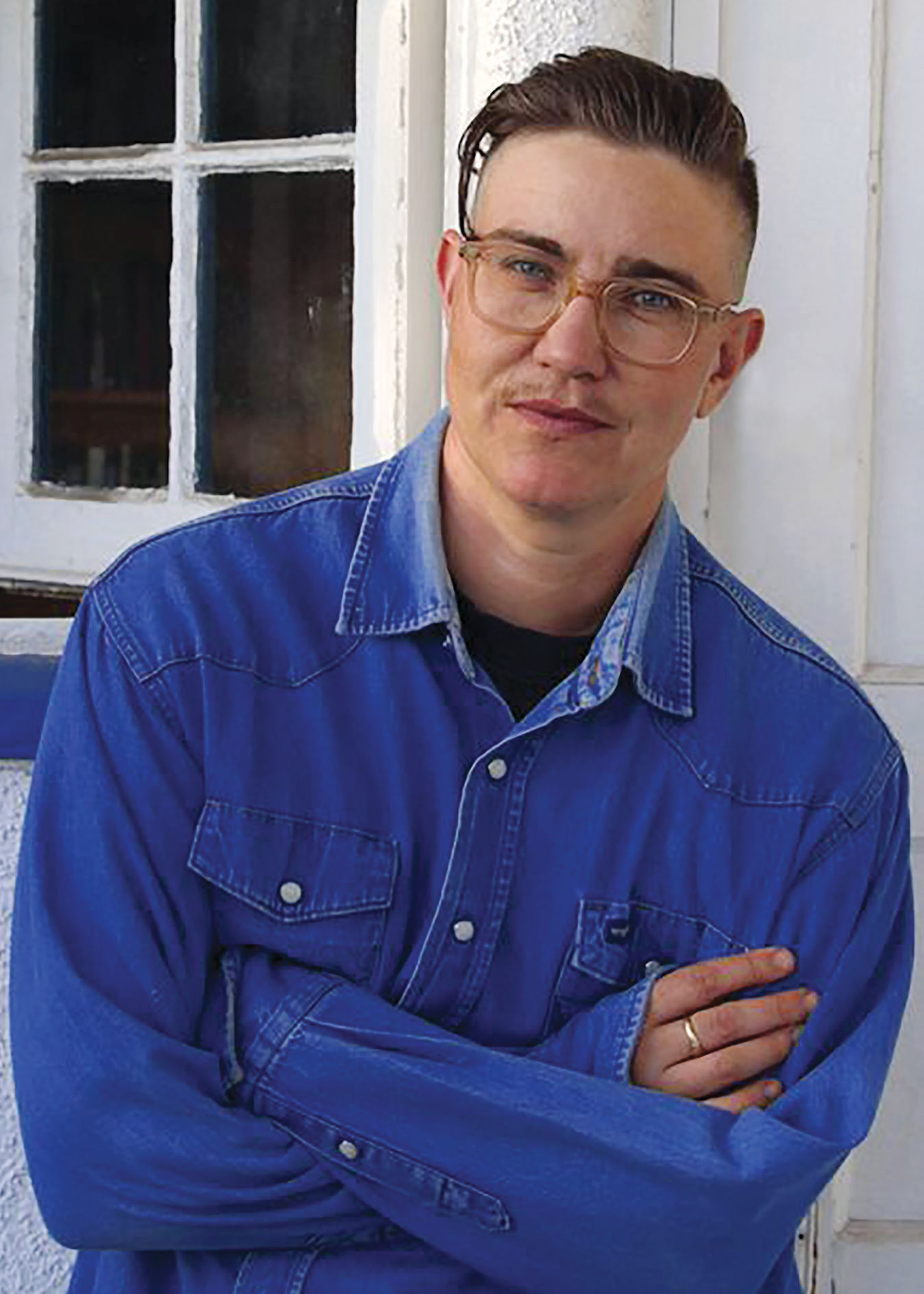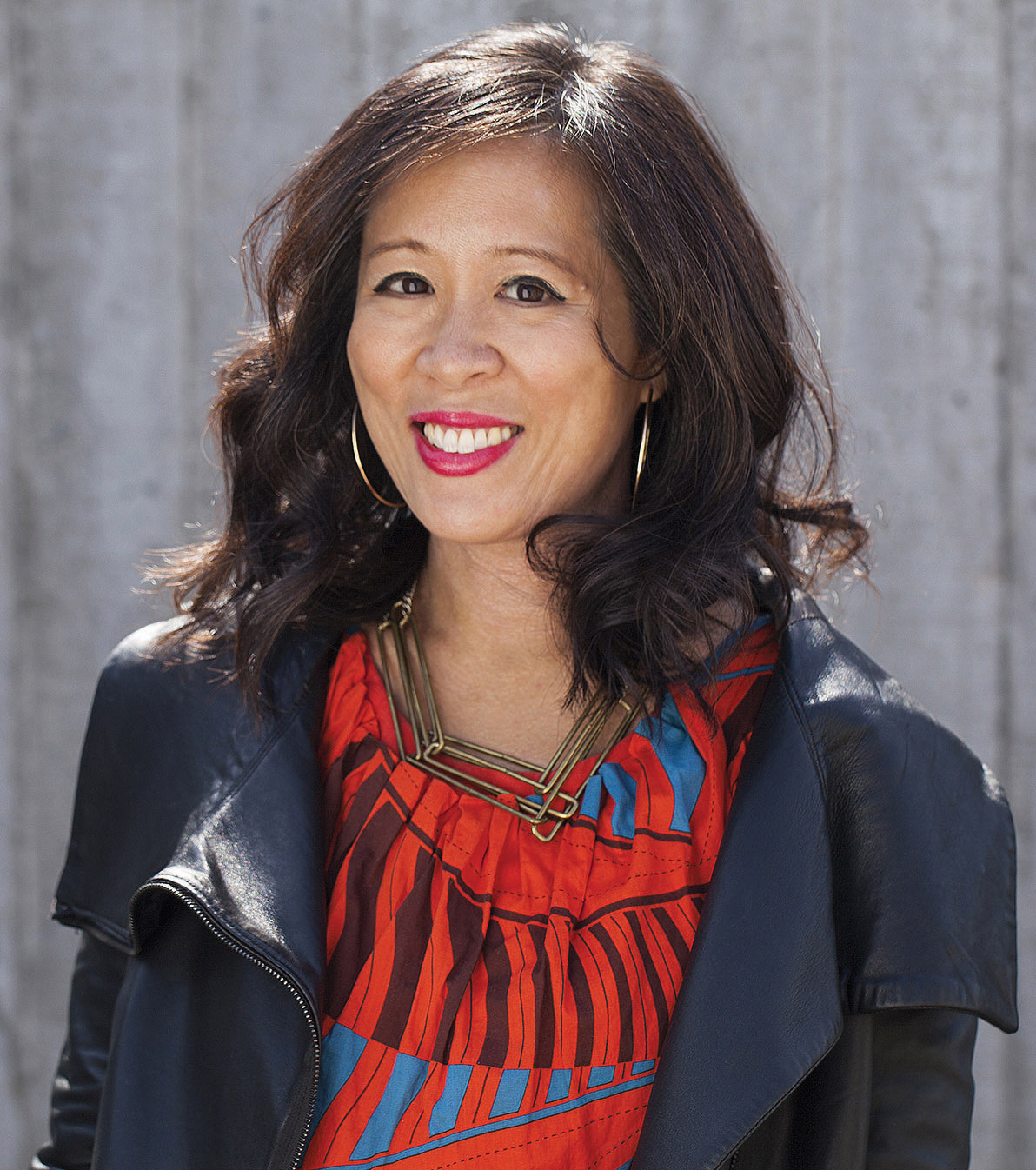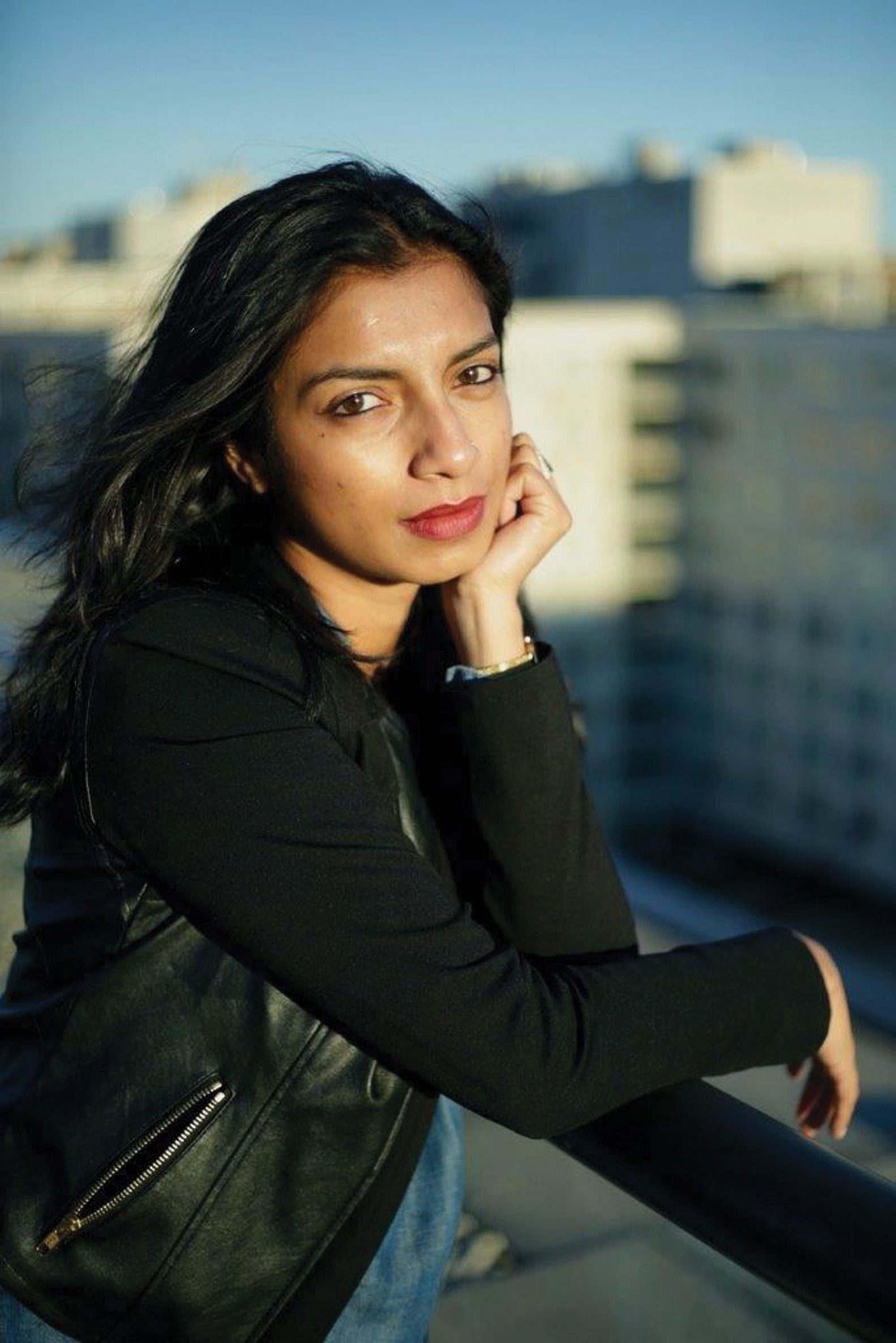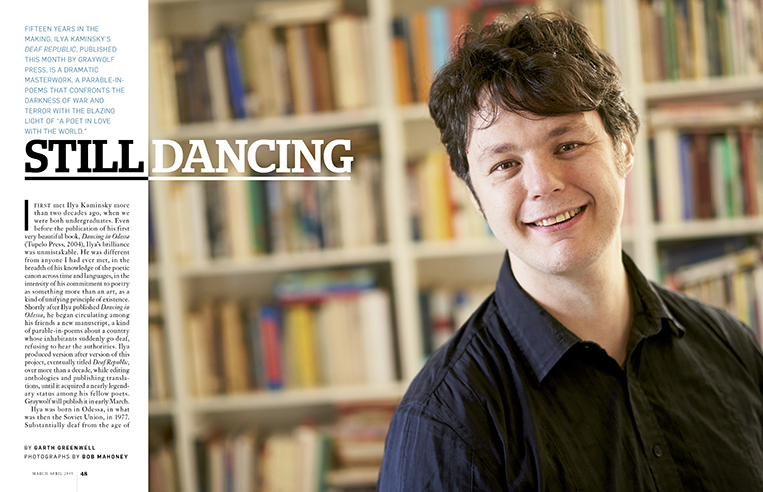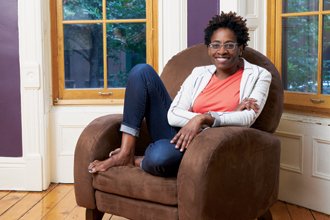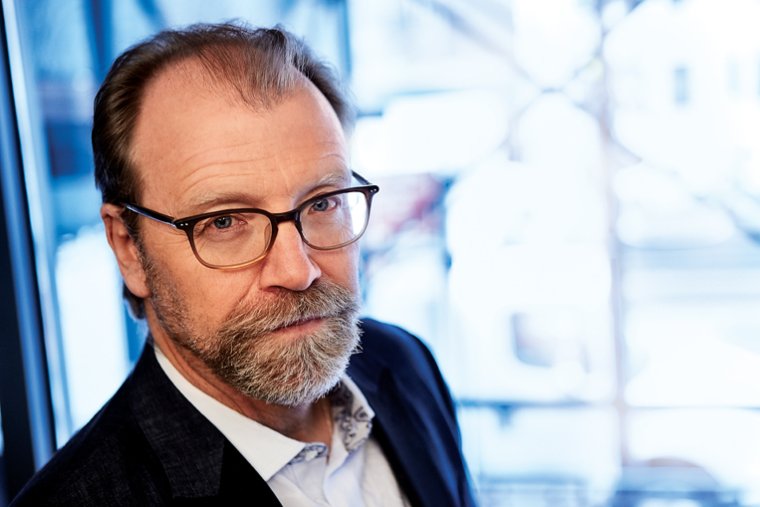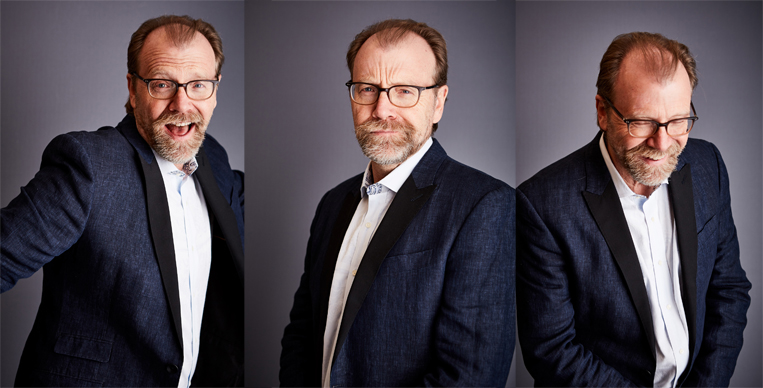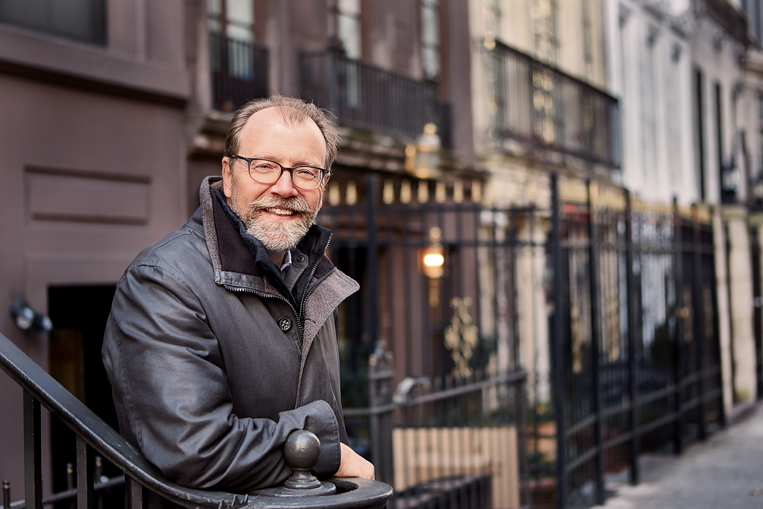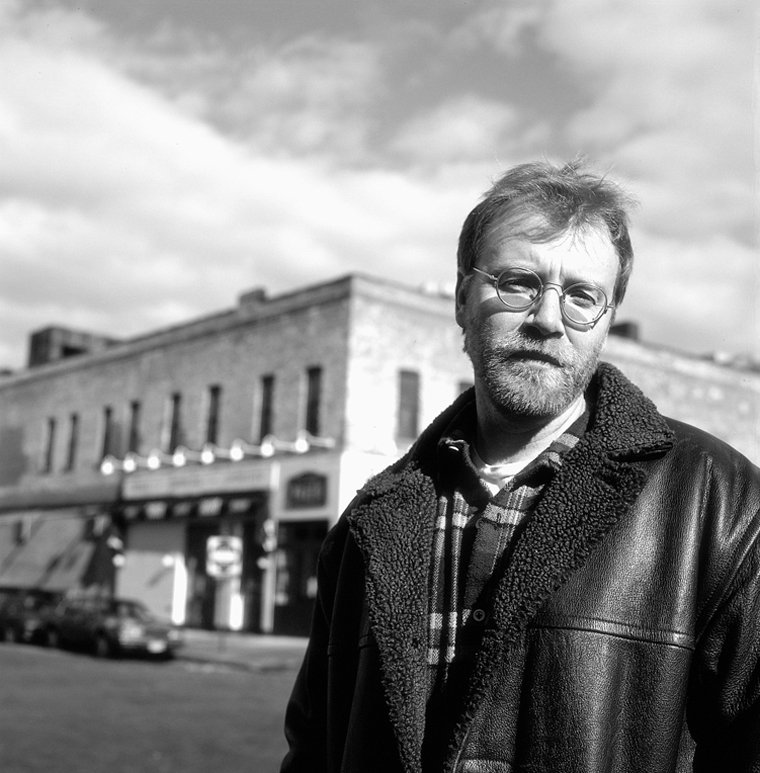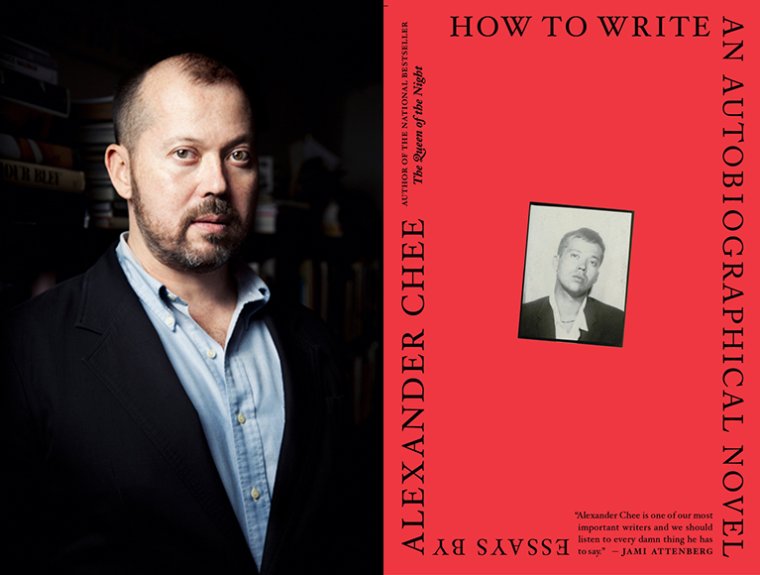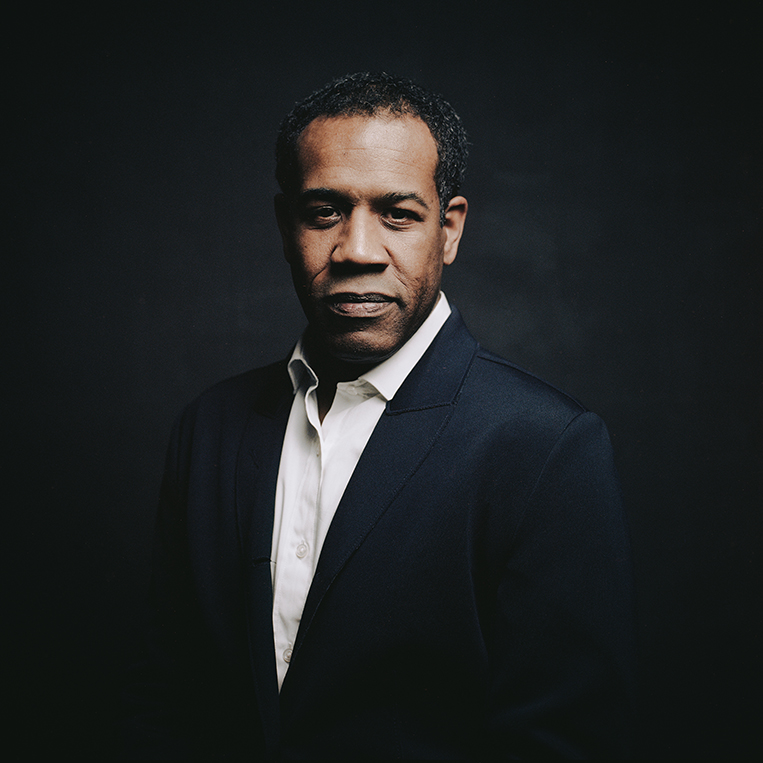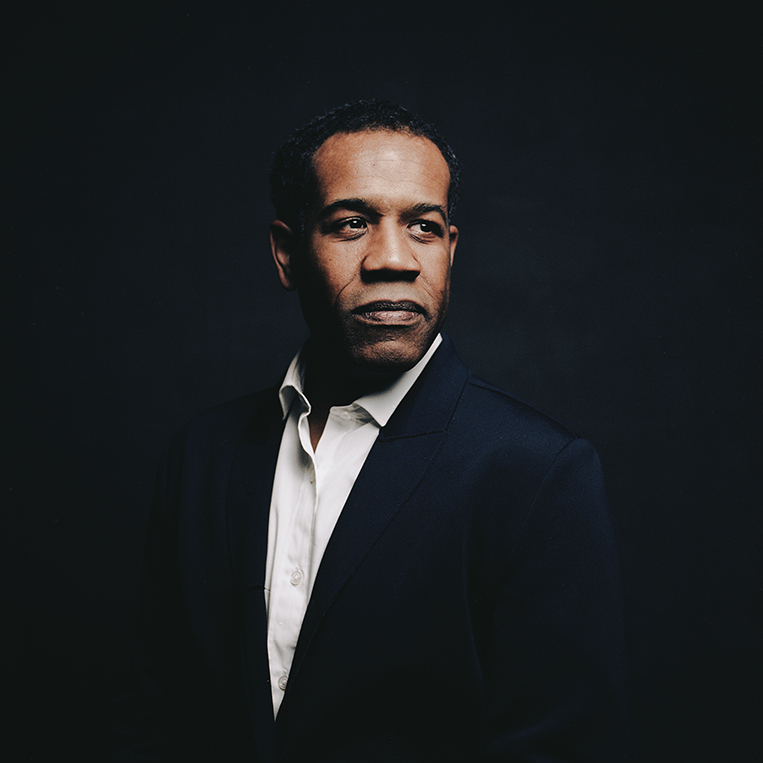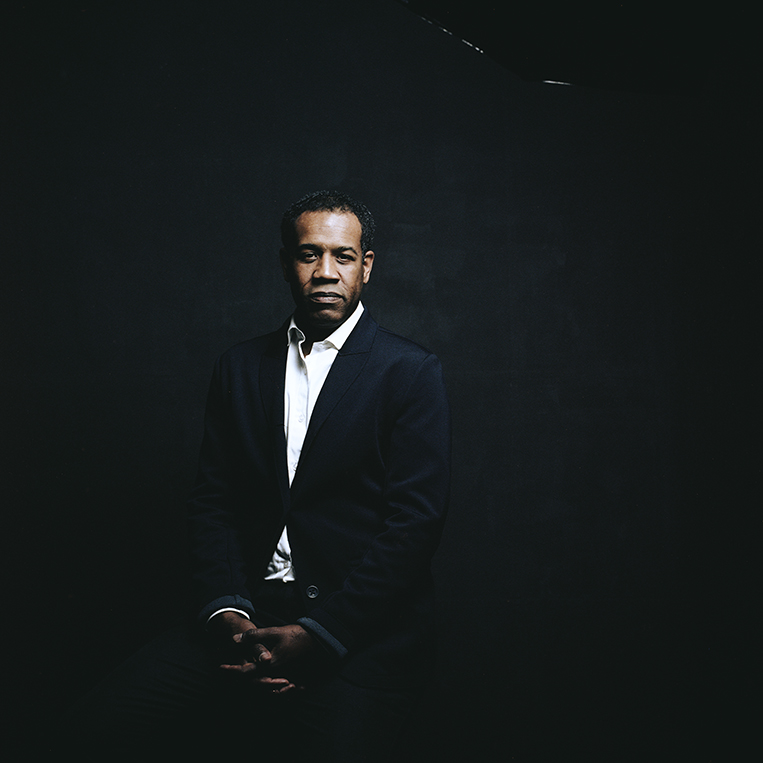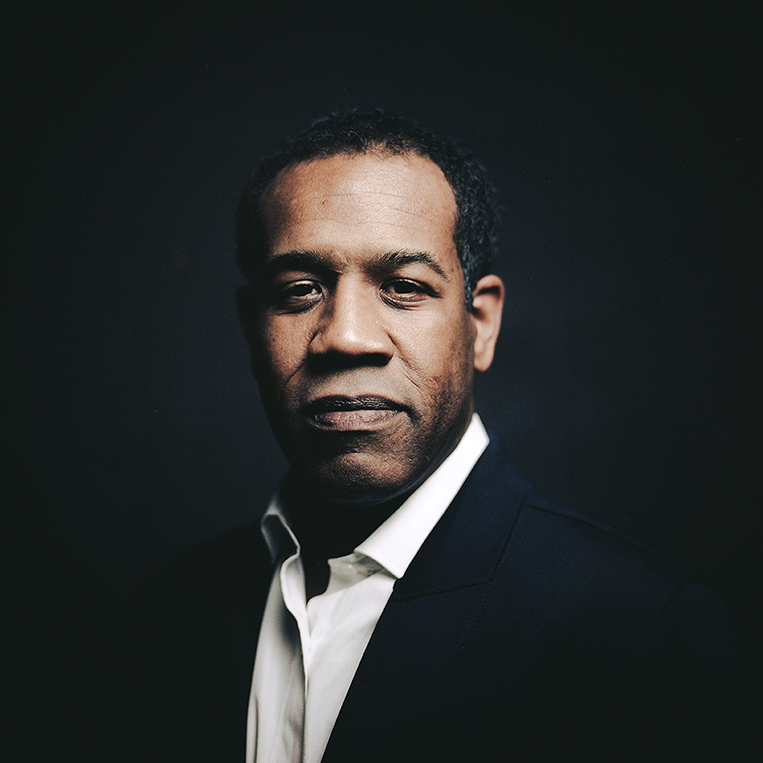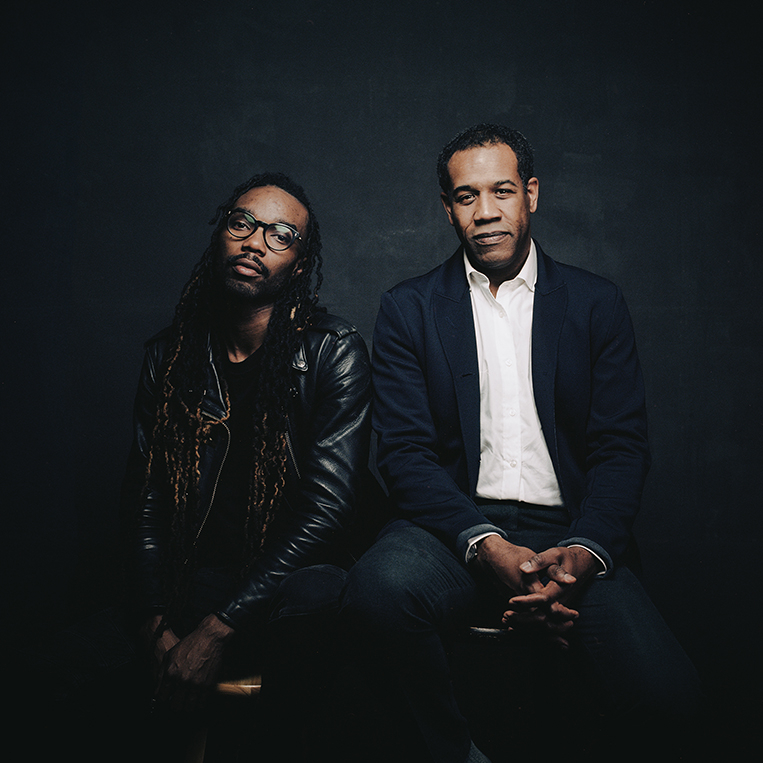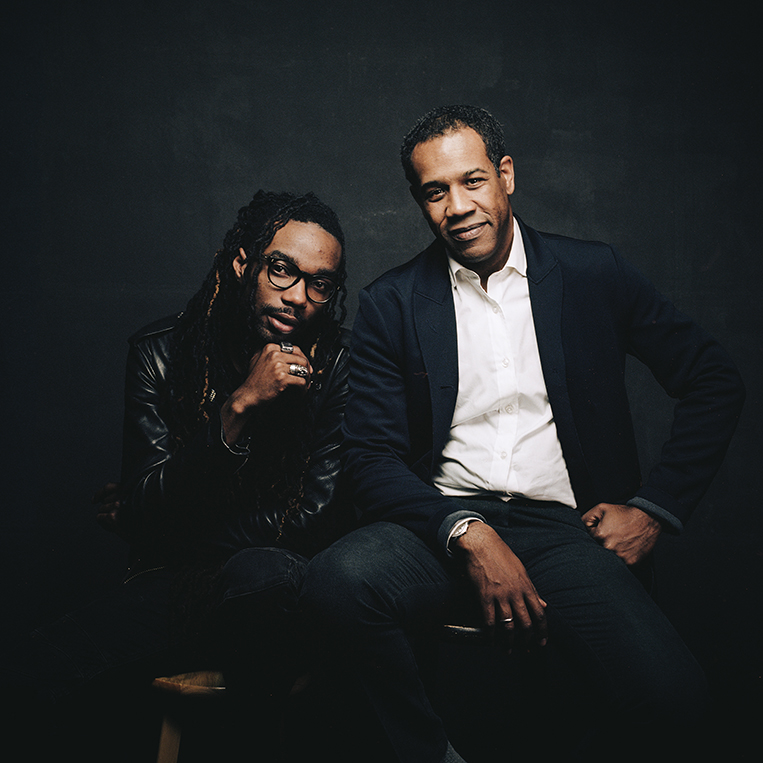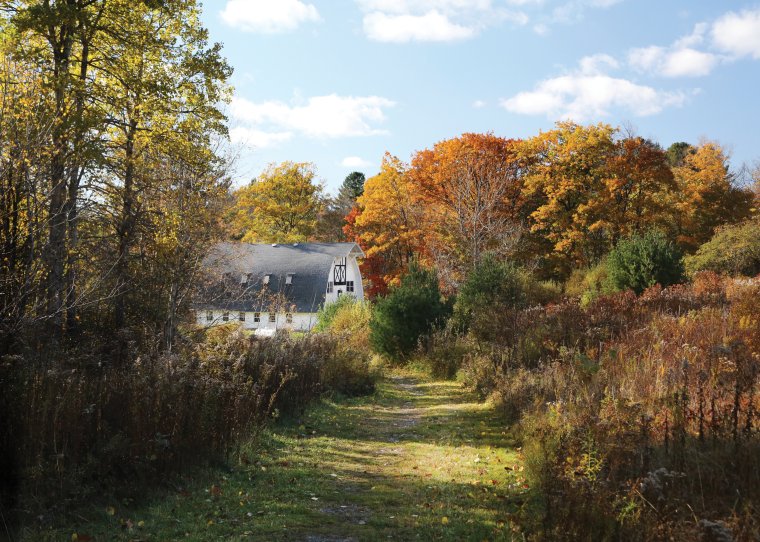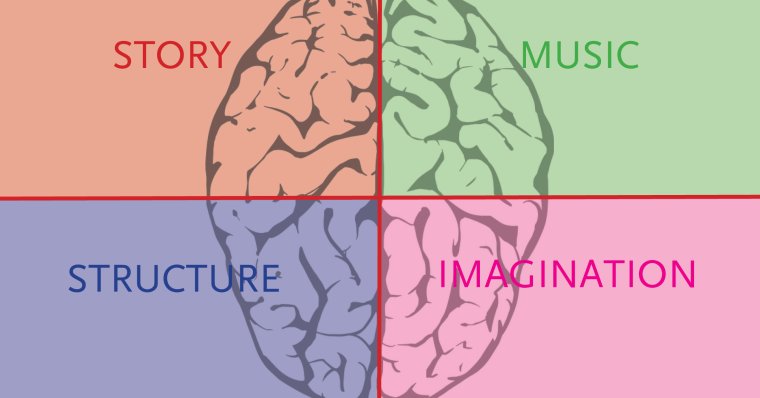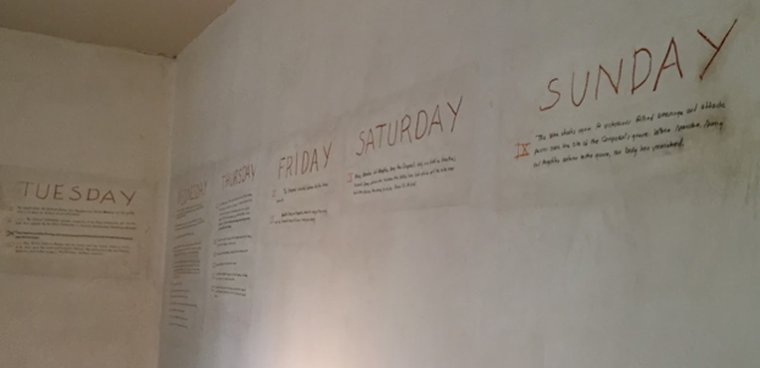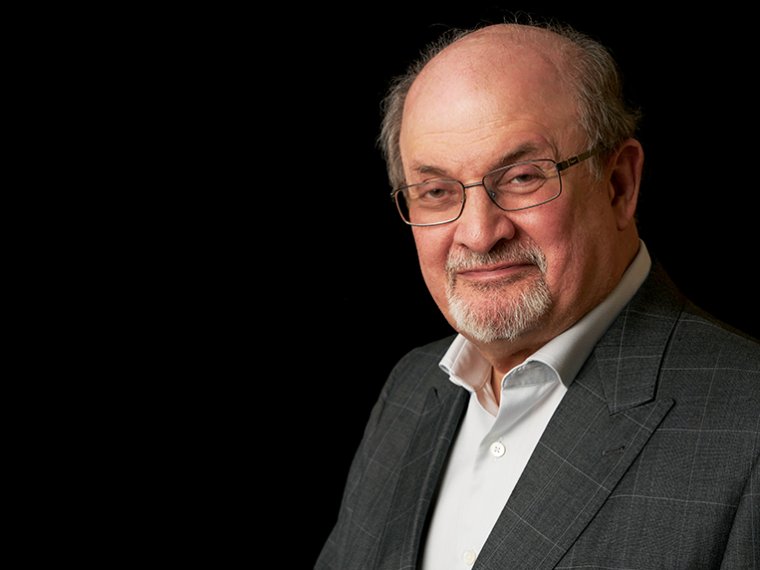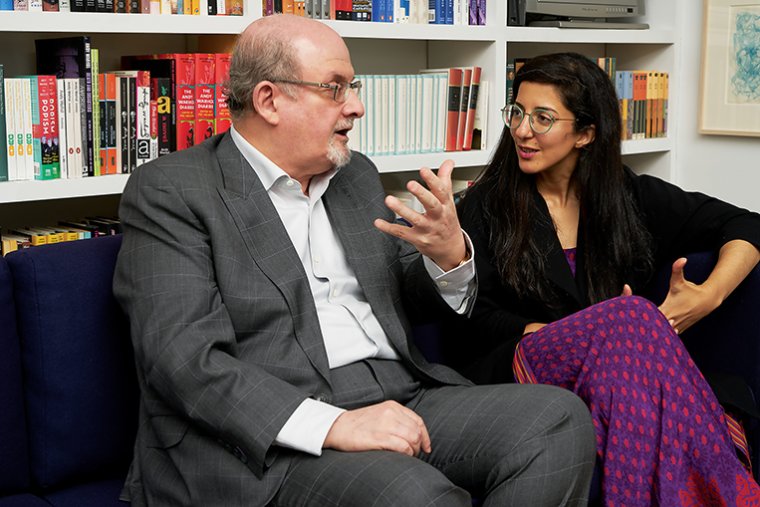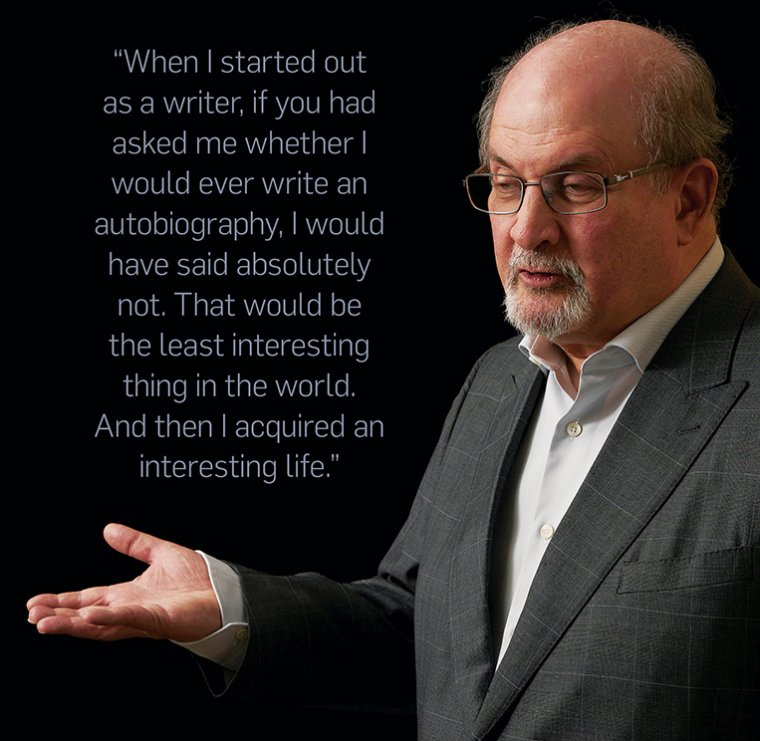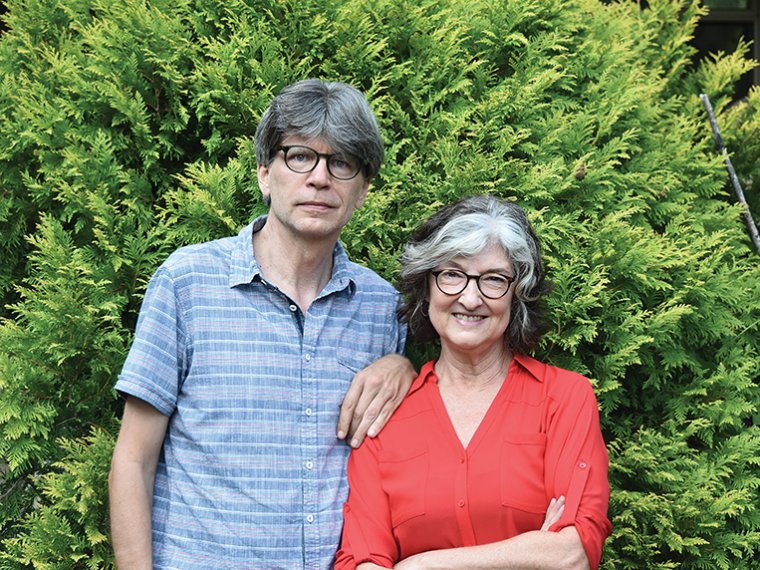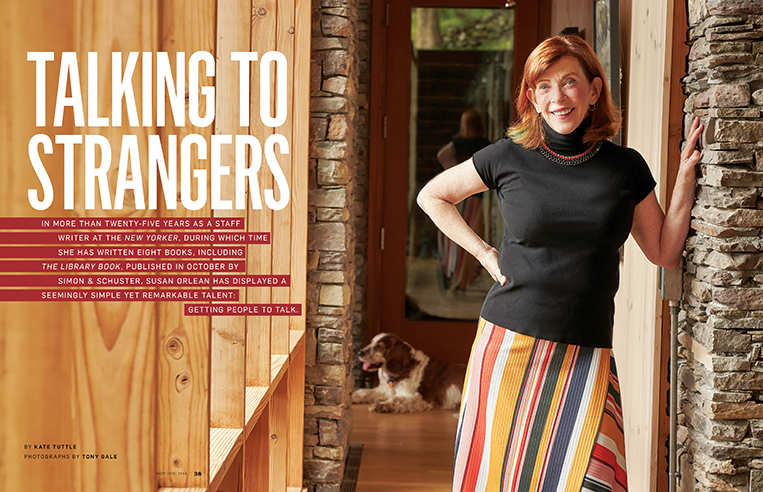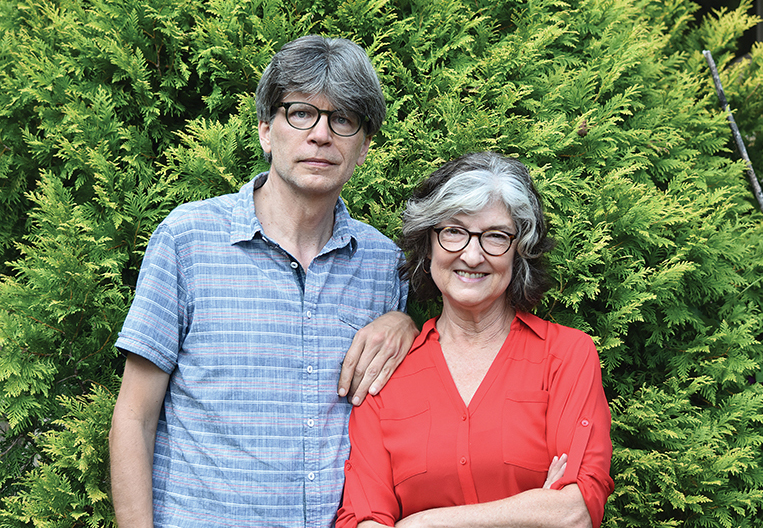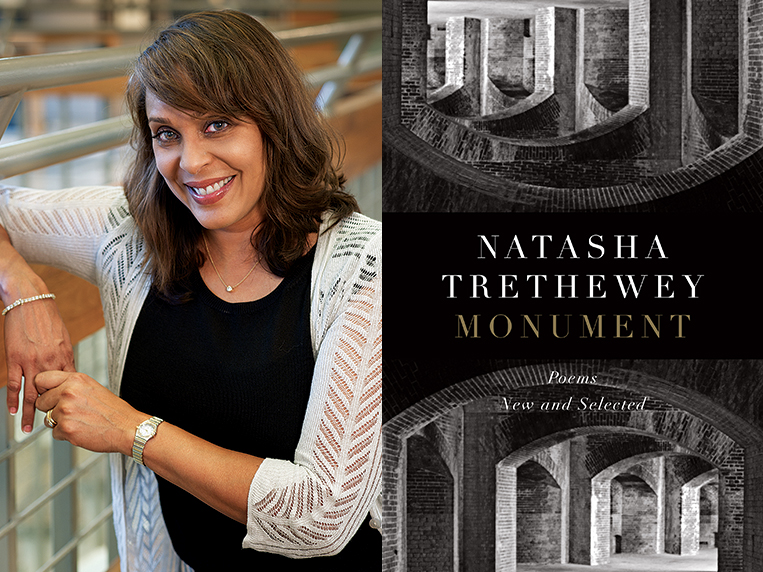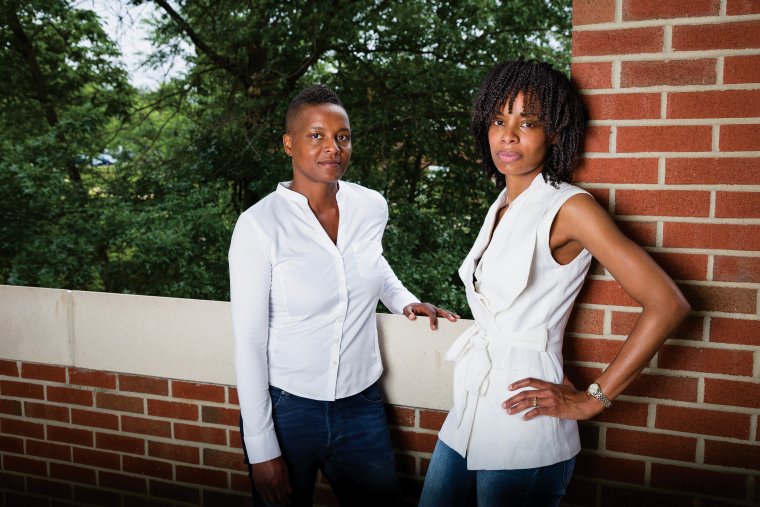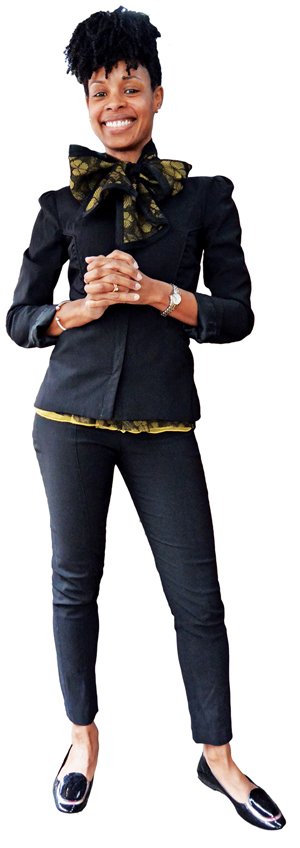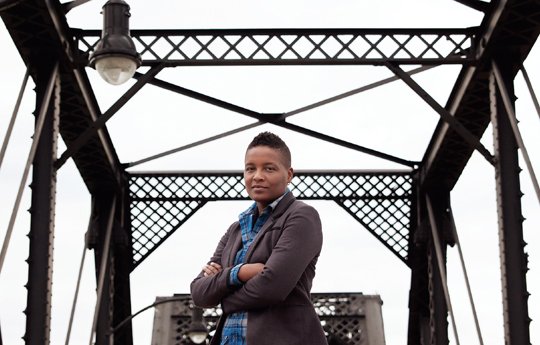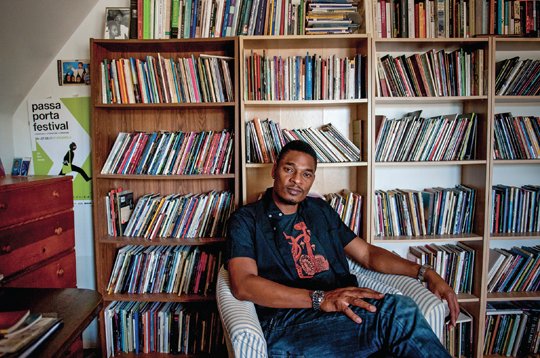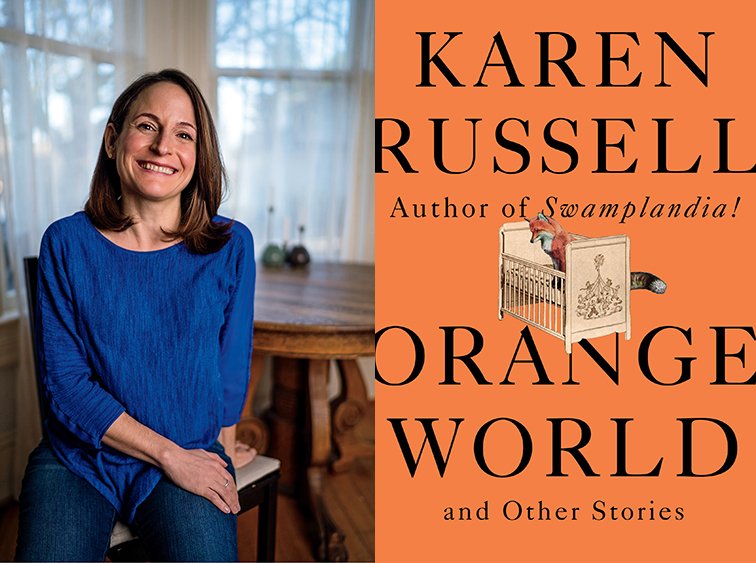Ten Questions for Sara Collins
This week’s installment of Ten Questions features Sara Collins, whose debut novel, The Confessions of Frannie Langton, is out today from Harper. Both a suspenseful gothic mystery and a historical novel, Collins’s debut tells the story of a slave’s journey from a Jamaican plantation to an English prison, where she is tried for a brutal double murder she cannot remember. “With as much psychological savvy as righteous wrath, Sara Collins twists together slave narrative, bildungsroman, love story, and crime novel to make something new,” wrote Emma Donoghue. Sara Collins grew up in Grand Cayman. She studied law at the London School of Economics and worked as a lawyer for seventeen years before earning a master’s degree in creative writing at Cambridge University, where she was the recipient of the 2015 Michael Holroyd Prize for Creative Writing. She lives in London.
1. How long did it take you to write The Confessions of Frannie Langton?
My agent signed me with only a partial manuscript, and I had to write feverishly in order to finish it in just under two years. But the novel had been simmering for all the decades I’d spent wondering why a Black woman had never been the star of her own gothic romance. My dissatisfaction about that state of affairs grew so strong over time that it finally nudged me in the direction of writing my own.
2. What was the most challenging thing about writing the book?
At times there was nothing more terrifying than the distance between the novel in my head and the one making its way onto the page. I had to force myself to accept the failure of my first attempts. I’m always terrified that the rough and rambling sentences that come out first, as a kind of advance party, will be all I can manage. They trick me into trying to polish them as I go. And that slows me down.
3. Where, when, and how often do you write?
Either at my desk overlooking a quiet canal patrolled by iguanas in Grand Cayman or at my kitchen table in London overlooking my courtyard garden, and now sometimes in bed, to avoid the intense back pain I get after sitting for long periods. When working on a novel, I write every day, 8:00 AM to 7:00 PM, following very strict routines: starting and finishing at the same time, and aiming to get a certain quota of work done. Over time I’ve developed a Pavlovian response to my rituals: When I take the first sip of coffee at 8:00 AM, my brain flips a switch and I’m in writing mode.
4. What was the most unexpected thing about the publication process?
I wrote the novel in isolation, but I’ve now done numerous radio and podcast interviews, panel and bookshop appearances, essays and columns. Writing requires withdrawal, publishing demands engagement. It’s the shock of wandering out of a tunnel onto a stage.
5. What are you reading right now?
I’m reading Clarie Messud’s The Woman Upstairs. The writing feels electric and alive, crackling with anger, which I think we should have more of in novels. One of my top reads of recent months was André Aciman’s Call Me By Your Name. I’m going to start John Banville’s The Book of Evidence next.
6. Which author, in your opinion, deserves wider recognition?
James Baldwin. He is unparalleled: as a writer, as an intellectual, as a man. Yes, he’s fairly widely recognized, but it should be wider.
7. What is one thing you’d do differently if you could have a do-over?
I would definitely take more days off.
8. What is the biggest impediment to your writing life?
When I’m so immersed in a project that I don’t want to look up, let alone talk to anyone, I feel like I’m being pulled between novel and family. What many people won’t admit is that it’s impossible to write a novel without a pinch of selfishness, and you have to beg your loved ones to forgive you for it.
9. What trait do you most value in an editor (or agent)?
Each of my editors, and my agent, saw straight through my manuscript to the novel I wanted to write, not the one I’d written.
10. What’s the best piece of writing advice you’ve ever heard?
I often quote Annie Lamott quoting the coach in Cool Runnings (a film I dislike, but which apparently produced this great line): “If you weren’t enough before the gold medal, you won’t be enough afterwards.”
Ten Questions for Xuan Juliana Wang
This week’s installment of Ten Questions features Xuan Juliana Wang, whose debut story collection, Home Remedies, is out today from Hogarth. In a dozen electrified stories, Wang captures the unheard voices of a new generation of Chinese youth via characters that are navigating their cultural heritage and the chaos and uncertainty of contemporary life, from a pair of synchronized divers at the Beijing Olympics on the verge of self-discovery to a young student in Paris who discovers the life-changing possibilities of a new wardrobe. As Justin Torres writes, Wang “is singing an incredibly complex song of hybridity and heart.” Xuan Juliana Wang was born in Heilongjiang, China, and grew up in Los Angeles. She was a Wallace Stegner Fellow at Stanford University and earned her MFA from Columbia University. She has received fellowships and awards from Yaddo, the MacDowell Colony, the Bread Loaf Writers’ Conference, Cite des Arts International, the Lower Manhattan Cultural Council, New York Foundation for the Arts, and the Elizabeth George Foundation. She is a fiction editor at Fence and teaches at UCLA.
1. How long did it take you to write the stories in Home Remedies?
All of my twenties and the early part of my thirties.
2. What was the most challenging thing about writing the book?
I would have to say the loneliness of falling out of step with society. When I’m out celebrating a friend who has just made a huge stride in their career, someone would ask me, “Hey how’s that book coming along?” Then having to tell them that I have a desk in an ex-FBI warehouse and I’ll be sitting there in the foreseeable future, occasionally looking out the window, trying to make imaginary people behave themselves.
3. Where, when, and how often do you write?
I keep a regular journal where I describe interesting things I’d seen or heard the day before as well as random plot ideas. That’s something I like to do every day, preferably first thing in the morning or right before bed. My ideal writing environment is a semi-public place, like a shared office, or a library as long as I can avoid making eye-contact with people around me. When I’m really getting going on an idea I am capable of sitting for eight hours a day, many days in a row. I was forced to play piano as a child so I have no trouble forcing myself to do anything.
4. What was the most unexpected thing about the publication process?
It made me feel a deep kinship with anyone who has ever published a book. I want to clutch them, look into their eyes and say, “I understand now.”
5. What are you reading right now?
King of the Mississippi by Mike Freedman. I just picked up Heads of the Colored People by Nafissa Thompson-Spires and it’s great! I’m putting off finishing The Unpassing by Chia Chia Lin because it’s so gorgeously written I am savoring it.
6. Which author, in your opinion, deserves wider recognition?
Wang Shuo. He’s like the Chinese Chuck Palahniuk. I wish he could be translated more and better.
7. What is one thing you’d change about the literary community and/or the publishing business?
I wish publishers would open up their own bookstores, or sell books in unexpected places, so people could interact with books in-person. There isn’t a single bookstore within a fifteen-mile radius of the city where I grew up in LA.
8. What is the biggest impediment to your writing life?
Health insurance.
9. Would you recommend writers pursue an MFA?
Yes. But choose wisely.
10. What’s the best piece of writing advice you’ve ever heard?
Victor Lavalle gave us a lot of practical advice in his workshop. The one I use the most often is: Take the best part of your story and move it to first page and start there. Challenge yourself to make the rest rise to the level of that.
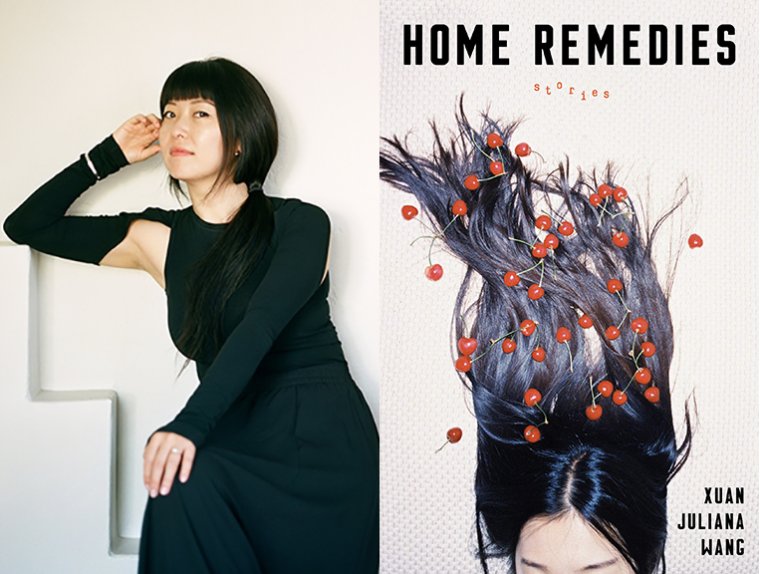
Xuan Juliana Wang, author of the story collection Home Remedies. (Credit: Ye Rin Mok)
Ten Questions for Julie Orringer
This week’s installment of Ten Questions features Julie Orringer, whose third book, the novel The Flight Portfolio, is out today from Knopf. Based on the true story of Varian Fry, a young New York journalist and editor who in 1940 was the head of the Emergency Rescue Committee, designed to protect artists and writers from being deported to Nazi concentration camps and to send intellectual treasures back to the United States, The Flight Portfolio returns to the same territory, Europe on the brink of World War II, that thrilled readers of Orringer’s debut novel, The Invisible Bridge. Andrew Sean Greer calls it “ambitious, meticulous, big-hearted, gorgeous, historical, suspenseful, everything you want a novel to be.” Orringer is also the author of the award-winning short story collection How to Breathe Underwater, which was a New York Times Notable Book. She lives in Brooklyn.
1. How long did it take you to write The Flight Portfolio?
Nine years, more or less. While researching my last novel, The Invisible Bridge, which also took place during the Second World War, I read about the American journalist Varian Fry’s heroic work in Marseille: His mission was to locate celebrated European artists who’d fled to France from the Nazi-occupied countries and arrange their safe passage to the States. The job was fraught with moral complications—given limited time and resources, who would Fry choose to save?—and the historical account seemed to miss certain essential elements, particularly those surrounding Fry’s personal life (he had a number of well-documented relationships with men, a fact that historians elided, denied, or shuddered away from, as if to suggest that it’s not acceptable to be a hero of the Holocaust if one also happens to be gay). Researching Fry’s life and mission took the better part of four years—a time during which I moved three times and gave birth to my two children—and writing and revision occupied the five years that followed. Which is not to suggest that no writing occurred during the initial research, nor that there was ever a time when the research ceased—it continued, in fact, through the last day I could change a word of the draft.
2. What was the most challenging thing about writing the book?
Undoubtedly it was the research into Fry’s work in Marseille, a detailed record of which exists in biographies, interviews, letters, ephemera, and even still in living memory: Fry’s last surviving associate, Justus Rosenberg, is a professor emeritus of languages and literature at Bard College, and was kind enough to speak to me about his experiences. Twenty-seven boxes of Fry’s letters, papers, photographs, and other writings reside in the Rare Books and Manuscripts collection at Columbia’s Butler Library; I spent many hours immersed in those files, learning what I could about what kept Fry up at night, what obsessed him by day, what he struggled with, how he triumphed, and how he thought about his own work years later. I spent a year at the Radcliffe Institute at Harvard, where Fry studied as an undergraduate; there I had the chance to examine his recently unsealed student records, which include not only his grade transcripts and his application, but also letters from his father, his professors, the dean, and various close associates, many of them arguing either for or against Fry’s expulsion from Harvard for a variety of infractions that included spotty attendance, raucous partying, destruction of school property, reckless driving, and, ultimately, the placing of a For Sale sign on Dean Greenough’s lawn. Then there were the dozens—hundreds, ultimately thousands—of Fry’s clients, whose lives and work I felt I must know before I wrote the book. And of course I had to go to Marseille, where I visited the places Fry lived and worked, at least those that still exist (the marvelous Villa Air Bel, where he lived with a group of Surrealist writers and artists, was razed decades ago). The nearly impossible task was to clear space among all that was known for what could not be known—space where I could make a narrative that would honor Fry’s experience but would move beyond what could have been recorded at the time.
3. Where, when, and how often do you write?
I write five or six days a week at the Brooklyn Writers’ Space. I’m married to another fiction writer, my former Iowa MFA classmate Ryan Harty, and, as I mentioned, we have two young children; we have a carefully worked-out schedule that allows each of us a couple of long writing days each week (eight hours or so) and a number of shorter ones (five hours). Often I write at night, too, especially if I’m starting something new or working on a short story or a nonfiction piece.
4. What was the most unexpected thing about the publication process?
The inestimable benefit of sharing a very early draft with my editor, Jordan Pavlin. Jordan edited my two previous books, but I’d never before shown her anything that hadn’t been revised six or seven times. This novel involved so much risk, and took so long to complete, that I felt I needed her insight and support long before I’d written three or four versions. Did the novel strike the right balance between history and fiction? Had I captured the characters’ essential struggles clearly? How to address problems of pacing, continuity, clarity? Jordan’s exacting readings—not just one, but three or four—echoed my own doubts and provided necessary perspective and reassurance. And her comments pulled no punches. She was scrupulously honest. She was rigorous. She challenged me to do better. And my desire to meet her standards was, as it always is, fueled as much by my ardent admiration for her as a human being as by my deep respect for her literary mind.
5. What trait do you most value in an editor?
See above.
6. What are you reading right now?
Susan Choi’s Trust Exercise, which cuts a little too close at times to my own 1980’s experience in a high school drama group—one that took itself at least as seriously as Choi’s Citywide Academy for the Performing Arts. She hits all the notes with dead-on precision: favoritism toward certain students by charismatic teachers, intrigue surrounding highly-charged relationships, endless quoting of Monty Python, jobs at TCBY, the dire importance of having a car and/or friends with cars, etc. But the true brilliance of the book is its structure: A first section in which the subjective experience of high school students is rendered with respect and utter seriousness; a second section that brings a questioning (and revenge-seeking) adult sensibility to bear upon the first; and a third section that sharpens the earlier sections into clearer resolution still, suggesting the persistent consequences of those seemingly trivial sophomore liaisons.
7. Which author, in your opinion, deserves wider recognition?
Here are three new writers whose work I’ve found risk-laced, challenging, and full of fierce delights: Ebony Flowers, Rona Jaffe-winning cartoonist and disciple of Lynda Barry, whose brilliant debut short story collection, Hot Comb, will be published by Drawn and Quarterly in June; shot through with tender and intelligent humor, it’s an incisive examination of cultural and familial tensions in black women’s lives. Domenica Phetteplace is another of my favorite new writers; her marvelous short story “Blue Cup,” a futurist skewering of commerce-driven life in the Bay Area, involves a young woman whose job requires her to deliver tailored social experiences to clients at an exclusive dining club; the story is narrated by the artificial intelligence software that co-inhabits her mind. And Anjali Sachdeva’s All the Names they Used for God is a story collection that merges the real and the supernatural with genre-breaking bravery, employing a prose so precise that you follow her into marvelous realms without question: Ice caves, exploding steel mill furnaces, an ocean inhabited by an elusive mermaid whose fleshy, tentacle-like hair still haunts my dreams.
8. What is one thing you’d change about the literary community and/or the publishing business?
I’d love to see more works in translation published in this country—for more publishing houses to commit seriously to the cultivation and dissemination of international literature. I admire the work of New York Review Books, Restless Books, and Europa Editions in this arena. I loved, for example, Restless Books’ recently published translation of Marcus Malte’s The Boy, a Prix Femina-winning novel about a young man who spent the first fourteen years of his life in mute isolation in the wilds of France. The story of this young man’s entry into the early twentieth-century world—first into a rural setting, then Paris, and finally the battlefields of the First World War—is the story of what makes us human, and casts our world in a stark new light. Even stories as place-specific as The Boy have much to reveal about all our lives; and, just as importantly, they illuminate and particularize the vast array of human experiences different from our own. One of literature’s great powers is its ability to act as a tonic against xenophobia; there’s never been a moment when that power has been more urgently needed.
9. What is the biggest impediment to your writing life?
The finite nature of the twenty-four-hour day. But places like the MacDowell Colony and Yaddo, the New York Public Library’s Cullman Center and the Radcliffe Institute for Advanced Study, seek to explode that limitation by removing barriers to creative freedom. At MacDowell, where every artist gets a secluded studio, meticulously prepared meals, and unlimited uninterrupted time to work, there’s a kind of magical speeding-up of the creative process. You don’t necessarily fail less often; you fail faster, and recover faster. The people who dedicate their professional lives to the running of those programs are literature’s great guardians and cultivators.
10. What’s the best piece of writing advice you’ve ever heard?
It would be impossible to identify the best, because I’ve been the fortunate recipient of much wonderful advice from writers like Marilynne Robinson, James Alan MacPherson, Tobias Wolff, Elizabeth Tallent, and John L’Heureux, for more years than I care to consider. But I can tell you about a piece of advice I chose not to take: A prominent writer once told me, at a barbecue at a friend’s house in Maine, that if I wanted to take myself seriously as a writer, I’d better reconsider my desire to have children. For each child I had, this writer told me, I was sacrificing a book. Now I can say with certainty that my writing life has been immeasurably enriched and transformed by having become a parent. And if parenthood is demanding, both of time and emotional energy—as of course it is—life with children reminds me always of why writing feels essential: At its best and most rigorous, it illuminates—both for writer and reader—the richness and complexity of the human world, and forces us to make a deep moral consideration of our role in it.
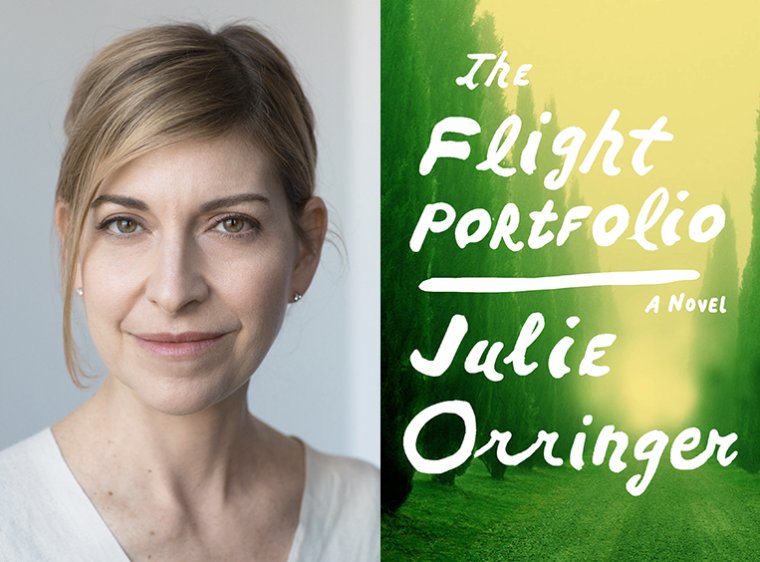
Julie Orringer, author of The Flight Portfolio. (Credit: Brigitte Lacombe)
Ten Questions for Namwali Serpell
This week’s installment of Ten Questions features Namwali Serpell, whose novel The Old Drift is out today from Hogarth. Blending historical fiction, fairy-tale fables, romance, and science fiction, The Old Drift tells a sweeping tale of Zambia, a small African country, as it comes into being, following the trials and tribulations of its people, whose stories are told by a mysterious swarm-like chorus that calls itself man’s greatest nemesis. In the words of Chinelo Okparanta, it is a “dazzling genre-bender of a novel, an astonishingly historical and futuristic feat.” Namwali Serpell teaches at the University of California in Berkeley. She won the 2015 Caine Prize for African Writing for her story “The Sack.” She received a Rona Jaffe Foundation Writers’ Award for women writers in 2011 and was selected for the Africa39, a 2014 Hay Festival project to indentify the best African writers under the age of forty. Her fiction and nonfiction has appeared in the New Yorker, McSweeney’s, the Believer, Tin House, Triple Canopy, Callaloo, n+1, Cabinet, the San Francisco Chronicle, the Guardian, and the New York Review of Books.
1. How long did it take you to write The Old Drift?
I’ve been writing it off and on since the year 2000. I worked on it in between getting my PhD; publishing my first work of literary criticism, a dozen stories, and a few essays and reviews; getting tenure; and writing a novel that went in a drawer. I concentrated exclusively on The Old Drift after I sold it based on a partial manuscript—about a third—in 2015. I finished in 2017.
2. What was the most challenging thing about writing the book?
Fact-checking. The novel is rife with speculative fiction—fairy tale, magical realism, science fiction—but I was anxious to get historical, scientific, and cultural details right, that the notes didn’t sound off. Because the novel is so sprawling, it was hard to verify everything. I’m grateful for my informants—family, friends, acquaintances, strangers, and the blessed internet.
3. Where, when, and how often do you write?
I’m too nomadic, or “movious” as we say in Zambia, to limit myself to a particular desk in a specific nook with a certain slant of light. I write from late morning to late afternoon, when most people are hungry or sleepy—I seem to find both states conducive to “flow,” as they call it. My writing frequency varies by genre. I can write nonfiction or scholarly prose for about five hours at a time, and as many days in a row as needed. I can write fiction for about three hours at a time, and it improves distinctly if I write every other day. My best work, regardless of genre, often happens in one big burst—an eight hour stretch, say, like a fugue. But I can’t prime my schedule or prepare myself for those eruptions. They come as they wish. I am left spent and grateful.
4. What was the most unexpected thing about the publication process?
The chasm between writing the book and marketing the book. It’s a rift in one’s psychology but also in logistics (who does what), and most shockingly, in value. There is simply no calculable relation between these two value systems: the literary and the financial, the good and the goods.
5. What are you reading right now?
Maurice Carlos Ruffin’s We Cast a Shadow. I’m excited because it draws on a longstanding preoccupation of mine: the recurrent fantasy of racial transformation in sci-fi.
6. Which author, in your opinion, deserves wider recognition?
María Luisa Bombal.
7. What is one thing you’d change about the literary community and/or the publishing business?
Blurbs. They tap into our most craven, gratuitous, and back-patting tendencies. End them.
8. What is the biggest impediment to your writing life?
The problem of money, of course.
9. What trait do you most value in an editor (or agent)?
Being able to recognize how things will best coincide—opportunities, ideas, words, people—and not forcing them, but setting up the space for them to do so. It goes by various names: “finger on the pulse,” “a sense of the zeitgest,” “savvy.” I think of it as a feel for kismet.
10. What’s the best piece of writing advice you’ve ever heard?
Amitav Ghosh once visited a graduate course I was taking. And he said of a writer (who shall remain nameless): “If everything is a jewel, nothing shines.”
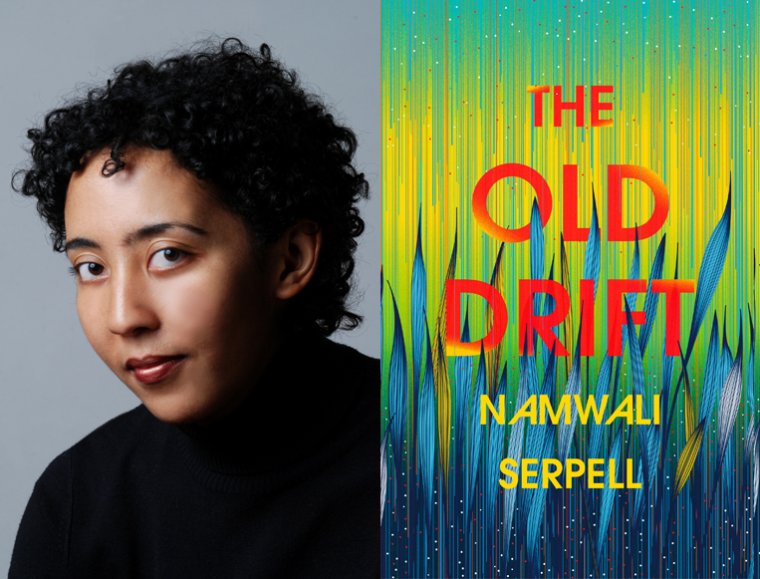
Namwali Serpell, author of The Old Drift. (Credit: Peg Skorpinski)
Ten Questions for Bryan Washington
This week’s installment of Ten Questions features Bryan Washington, whose debut story collection, Lot, is out today from Riverhead Books. Set in Houston, the stories in Lot spring from the life a young man, the son of a Black mother and a Latino father, who works at his family’s restaurant while navigating his relationships with his brother and sister and discovering his own sexual identity. Washington then widens his lens to explore the lives of others who live in the myriad neighborhoods of Houston, offering insight into what makes a community, a family, and a life. “Lot is the confession of a neighborhood,” writes Mat Johnson, “channeled through a literary prodigy.” Bryan Washington’s stories and essays have appeared in the New Yorker, the New York Times, BuzzFeed, Vulture, the Paris Review, Tin House, One Story, Bon Appetité, American Short Fiction, GQ, Fader, the Awl, and elsewhere. He lives in Houston.
1. How long did it take you to write the stories in Lot?
Three years-ish.
2. What was the most challenging thing about writing the book?
Description is always tricky for me, and that held up in every story.
3. Where, when, and how often do you write?
I can edit wherever, but I prefer to write new stuff in the mornings. And I write most days, if I’ve got a project going. But if I don’t then I won’t.
4. What was the most unexpected thing about the publication process?
Hearing back from folks about the galleys was really rad.
5. What are you reading right now?
Xuan Juliana Wang’s Home Remedies, Morgan Parker’s Magical Negro, Pitchaya Sidbanthad’s It Rains in Bangkok, Candice Carty-Williams’s Queenie, and Yuko Tsushima’s Territory of Light. Then there’s Ocean Vuong’s On Earth We Were Briefly Gorgeous, which is probably going to change everything.
6. Which author, in your opinion, deserves wider recognition?
More folks in the States should know about Gengoroh Tagame and My Brother’s Husband.
7. What is one thing you’d change about the literary community and/or the publishing business?
It’d be nice if the American literary community’s obsession with signal-boosting the optics of diversity were solidified into a tangible, fiscally remunerative reality for minority writers.
8. What is the biggest impediment to your writing life?
Living.
9. Would you recommend writers attend a writing program?
If you can go for free? Sure. But there are other ways.
10. What’s the best piece of writing advice you’ve ever heard?
Mat Johnson taught me a lot, and one of the most profound things he said was to just relax. Readers can sense when you’re tense.
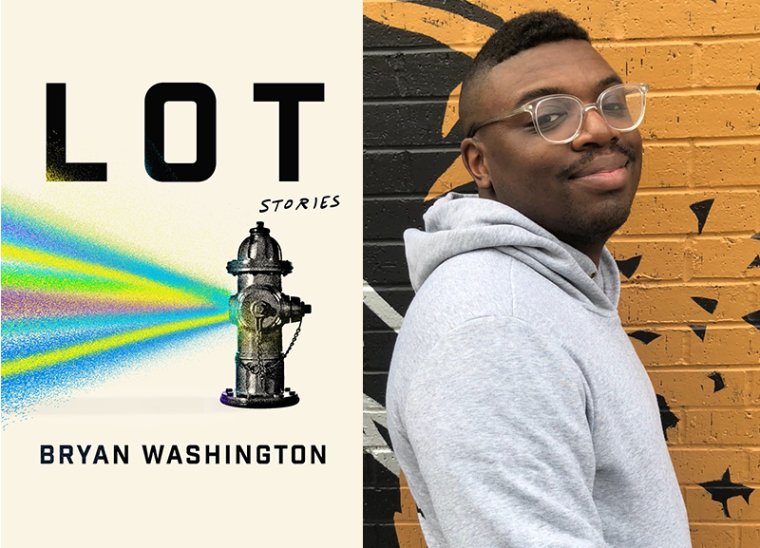
Bryan Washington, author of Lot. (Credit: David Gracia)
Ten Questions for Ed Pavlić
This week’s installment of Ten Questions features Ed Pavlić, whose novel Another Kind of Madness is out today from Milkweed Editions. The epic story of Ndiya Grayson, a young professional with a high-end job in a Chicago law-office who meets Shame Luther, a no-nonsense construction worker who plays jazz piano at night, Another Kind of Madness moves from Chicago’s South Side to the coast of Kenya as the pair navigate their pasts as well as their uncertain future. Of the novel Jeffrey Renard Allen writes, “In these pages, Black music sounds and surrounds experience like a mysterious house people long to live in but can’t find, a quest where they find themselves ever more deeply involved.” Widely published as a poet and scholar, Ed Pavlić is the author of the collection Visiting Hours at the Color Line, winner of the 2013 National Poetry Series, as well as ‘Who Can Afford to Improvise?’: James Baldwin and Black Music, the Lyric and the Listeners and Crossroads Modernism: Descent and Emergence in African American Literary Culture.
1. Where, when, and how often do you write?
I’ve always written in and around the gifts and demands of family, parenting, etc. I have no real literary credits that pre-date my life as a father and husband. In fact, often I’ve worked while pretty confused about which aspects of all of that were “gifts” and which were “demands,” demanding gifts in any case. I’ve also written in and around the work as a professor and administrator in universities. For many years I found I could compose and revise poems in the momentary midst of all of that overlapping life and labor. Most likely poems were the way I survived those overloads, kept track of enough of the mind and body, all those minds and bodies, so that I didn’t go permanently off the rails. So I could at least find my way back to the tracks when wrecks and crack-ups did—and they did, of course—occur.
Maybe writing was and is a way to address the displacements of an upwardly mobile, cross-racially identified, working-class man amid waves and undertows in an intensely segregated, hyper-racialized, and hierarchical bureaucratic world. Or maybe, for a working class consciousness like mine, writing is just another wave of displacement? Most likely it’s both. I guess we could file most of these thoughts under the “where” I write part of the question.
2. You write both poetry and prose; does your process differ for each form?
Essays and other longer works weren’t as immediately about or out of that tumble of pleasure and trouble, of placement, displacement and replacement, of the startling novelty and bone-bending drudgery of, say, early parenthood, or of showing up to work in the unbelievably bourgeois and indelibly white halls of academia. At least that work wasn’t doused in the texture of my tumbles and pleasures in the same way. So, I’ve written what might pass as prose, and lots of it, in times when I can work for extended periods, on days—at times weeks or even months—when I don’t have to totally leave that space tomorrow, where I didn’t arrive fresh to it today. So, if I’ve got four days “off” from the rest of the work-world, I can work away at what’s called prose on the middle days.
3. How long did it take you to write Another Kind of Madness?
I wrote Another Kind of Madness in a way unlike anything else I’d ever written, or done. I worked on the novel only in spaces where I had at least a month in which I could be with the work unencumbered by the demands of life and employment. I began it in the summer of 2009 when the kids were old enough (and my in-laws young enough) that they could be with the grandparents in Maryland for six weeks during the summer. Stacey went to work and I turned the front porch in Georgia into a writing retreat. Working “at home” in this way was something I’d almost never done. After that summer, I worked on the book in similar breaks of a month or two, but never again at home. Instead, I worked in rented, borrowed, or gifted spaces in Montreal, at the MacDowell Colony (twice), in Istanbul, in Mombasa, and in Lamu Town on the coast of Kenya, in France, and in the West Farms section of the Bronx, a few blocks south of the Bronx Zoo one summer.
During these strange times I floated by myself in mostly urban, unfamiliar spaces, writing a few hours a day and then spending the rest of the days and nights accompanied by the story on walks, at meals, in dreams, on errands, in reading books I found in those places, etc. I found that the story wouldn’t reveal itself amid the tumble of my life, would only appear when I could really sit, walk, and sleep with it, where it could accrue its reality in a textured and present—but also most often in a peripheral and angular—region of my attention. The pressure of my daily worlds seemed to obliterate that nimble angularity, but my comings and goings in those unfamiliar urban spaces allowed this story to happen. I remember showing up after eight months away from the book, opening a blank, unlined (yes, unlined: “free your lines, the mind will follow”) notebook and waiting for Shame, Ndiya, Junior, Colleen and them to let me know what had been happening since we last saw each other and, in return, I tried to be as honest with them as I could be about what had been happening with me. It was always as if, unknowingly, we had, in fictional-fact, been at some of the same parties.
4. What has been the most surprising thing about the publication process?
That it takes a village.
And, with this book, a novel, with this novel, how dense the space between the lines is with things (references, inferences) that I don’t remember creating. So many things that never appeared to me until the ARC came between the covers. At that point I could see it as a thing outside my body, and I noticed all kinds of new things there. That was a surprise, for sure; the book was a stranger to me in a way I didn’t expect. The poems aren’t that way, essays either. I’ve left copies of the ARC around the house and, when I walk past them, I’ll pick up the book and turn to a random page and begin reading at the first new paragraph, halfway trying to catch it actively changing, as if I can catch it coming up with something else it hadn’t told me about.
5. What is one thing you’d change about the literary community and/or the publishing business?
I’d love to see more recognition in and between writers of what happens in and around Black music, where singers are singing in an organic kind of tandem with tradition, in which songs bristle with depths and complexities quite beyond the capacities of any particular singer. And audiences seem to roll with that, we almost insist upon it. I don’t think we insist upon or even at times allow a similar kind of dimensionality with our sense of writers and writing. It happens in contemporary writing, of course; but I think it’s less obvious to readers than that similar dynamic is to listeners. Maybe readers even refuse it. Maybe I’m saying that I’d love the community of contemporary writers to read each other with the freedom and rigor (vigor) we bring to hearing the music we love the most. I struggle to do this myself. Maybe singers need to listen to each other with the freedom they read with? I don’t know.
6. What are you reading right now?
I’m always reading multiple books, always accompanied by music in the background and foreground. Right now I’m reading Singing in a Strange Land, Nick Salvatore’s biography of C. L. Franklin (Aretha’s father); David Ritz’s Respect: The Life of Aretha Franklin; Eve Dunbar’s Black Regions of the Imagination; and I just finished rereading Danielle McGuire’s At the Dark End of the Street: Black Women, Rape, and Resistance. My rereading of Jesmyn Ward’s Men We Reaped begins today. Meanwhile, I’ve been listening to five discs in the changer (Aretha’s double disc set, Amazing Grace: The Complete Recordings, Marvin’s What’s Going On, and Coltrane’s Both Directions at Once: The Lost Album) on endless loop for weeks. I’m working my way into writing something about the recently released film, Amazing Grace, that was made while Aretha was recording the album with James Cleveland and his choir in Los Angeles in January 1972. Aretha performs with absolutely stunning, epic power. It’s incredible. Easily the most powerful thing I saw / heard / felt on film in 2018.
I listen to and stream contemporary music mostly in the car. The latest song I’ve been repeating all around town is Summer Walker’s newly released “Riot,” from her EP Clear. So good. It’s like Sade’s “Is It a Crime” for the 21st century.
7. Which author, in your opinion, deserves wider recognition?
Well, so many of course. The word “author” almost means “deserves wider recognition.” Though not always. I’d say Christopher Gilbert, his Turning Into Dwelling. Also the second half of Adrienne Rich’s career, especially: Your Native Land, Your Life (1986), Time’s Power (1989), An Atlas of the Difficult World (1991), Dark Fields of the Republic (1995) and Midnight Salvage (1999). Adrienne Rich is obviously a widely recognized writer, but the woman who wrote these books—meaning those poems—is mostly unknown. Also I’d say the Ghanaian writer Kojo Laing, his masterpiece Search Sweet Country.
8. What is the biggest impediment to your writing life?
Racial terror. A feeling that—like how the finest silt settles on every plane in a space and then somehow constitutes an immobilizing weight—one is operating in a prison to which we’ve been trained to accommodate (meaning obliterate) ourselves. But, you can’t really write—at least not very well—about that, or at least I can’t. I need to catch it when it flashes into view, before it becomes something it’s not, which is usually all we know. The need to arrest that unknowing, at times excruciating yet still unfeeling, state that takes our steps elsewhere to where we’re walking.
So all of that and, I think, a kind of impatience that masquerades as procrastination.
9. What’s one thing you hope to accomplish that you haven’t yet?
I need to write my mother a letter.
10. What’s the best piece of writing advice you’ve ever heard?
In 1976, when James Baldwin told a writer’s group in the women’s prison at Riker’s Island: “One can change any situation, even though it may seem impossible. But it must happen inside you first. Only you know what you want. The first step is very, very lonely. But later you will find the people you need, who need you, who will be supportive.”
Over the last twenty-something years, I’ve found that to be absolutely true. I come back to that statement all the time.
Or maybe the best is, in 1970, when Baldwin told John Hall: “Nothing belongs to you…and you do what you can with the hand life dealt you.” I think if we can proceed with that in mind we can figure a few profiles of the ways, we do, in fact, belong to each other. I’m not talking about holding hands at sunset, I’m talking about a sense of mutual consequence that moves with the power (redemptive) of accuracy.
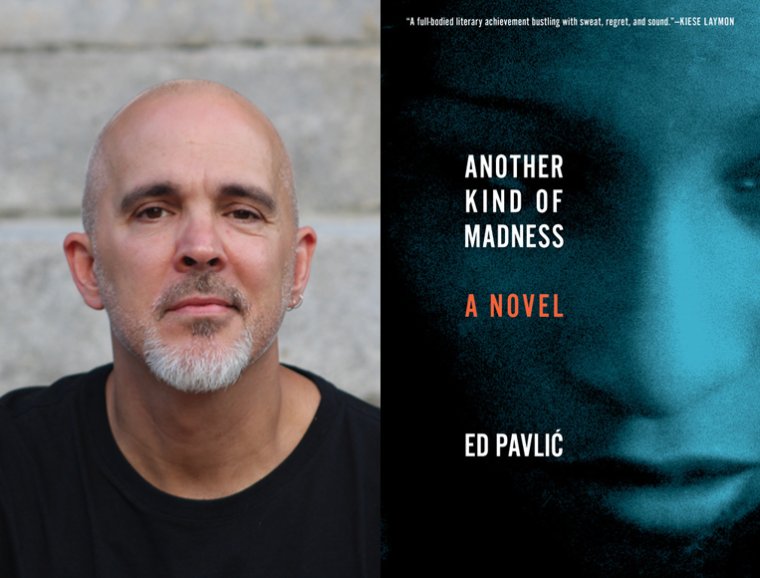
Ed Pavlić, author of Another Kind of Madness. (Credit: Suncana Pavlić)
Ten Questions for Helen Oyeyemi
This week’s installment of Ten Questions features Helen Oyeyemi, whose novel Gingerbread is out today from Riverhead Books. The story of three generations of women and the legacy of the Lee family’s famed gingerbread recipe (“devised by a person who became Harriet Lee’s great-great-great grandmother by saving Harriet’s great-great-great grandfather’s life”) Gingerbread follows its characters through encounters with jealousy, ambition, family grudges, work, wealth, and real estate. Ron Charles of the Washington Post calls the novel “a challenging, mind-bending exploration of class and female power heavily spiced with nutmeg and sweetened with molasses.” Helen Oyeyemi is the author of the story collection What Is Not Yours Is Not Yours, winner of the PEN Open Book Award, along with five novels—most recently Boy, Snow, Bird, which was a finalist for the 2014 Los Angeles Times Book Prize. She received a 2010 Somerset Maugham Award and a 2012 Hurston/Wright Legacy Award. In 2013 she was named one of Granta’s Best Young British Novelists.
1. How long did it take you to write Gingerbread?
About six months—two of them mostly fuelled by Honey Butter Chip consumption, and I think if those first two months were measured out in terms of daily portions of Honey Butter Chips recommended for a healthy lifestyle, that would adjust the writing time to six or seven years.
2. What was the most challenging thing about writing the book?
Getting started. I feel like I always say that, but this time around there were four false starts as opposed to the usual one or two.
3. Where, when, and how often do you write?
For some reason during my first reading of this question my brain added an additional word: ‘why’ do I write as part of the question…how scary. I usually write in bed, daily, until I’ve finished writing the book. But a good portion of Gingerbread was written sitting on the floor, in a chair with no legs but excellent back support, with a very low standing desk for my laptop. I’m still not sure what it was about the posture and the position that made some act of imaginative grace feel more possible—and I’m not saying I ended up pulling any off—but it might work for others, so I’d recommend it.
4. What was the most unexpected thing about the publication process?
How pretty the finished copy of the book looks, and how good it is to hold.
5. What are you reading right now?
I just finished Carleton Bulkin’s quicksilver-fine translation of Vladislav Vančura’s Marketa Lazarová, and you should read it too! It’s difficult to describe the narrative tone—tones, really—but this book’s combination of earthiness, the sublime, the infernal, and the wryly metafictional is the most involving I’ve come across in a while.
6. Which author, in your opinion, deserves wider recognition?
Kuzhali Manickavel! Prose like a thrown knife with gossamer wings. Funny, tender, piercing, marvelous.
7. What is one thing you’d change about the literary community and/or the publishing business?
I don’t see either as being in stasis; I suppose the best you can hope for are that the changes are the ones necessary for continued survival.
8. What is the biggest impediment to your writing life?
The thought of having to explain what I’ve done. Or have what I’ve done explained to me, ahhhhh.
9. What trait do you most value in an editor (or agent)?
An acute sense of the absurd.
10. What’s the best piece of writing advice you’ve ever heard?
To pay no attention to writing advice?
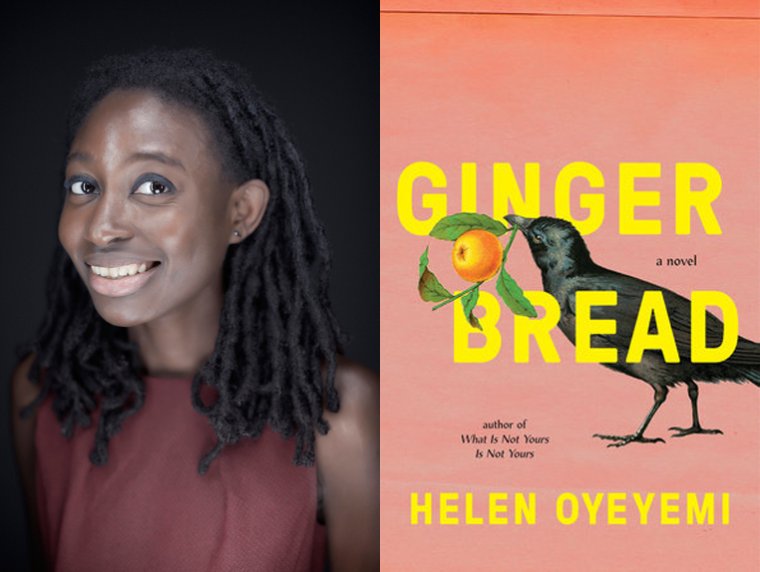
Helen Oyeyemi, author of Gingerbread. (Credit: Manchul Kim)
Gingerbread by Helen Oyeyemi
Helen Oyeyemi reads from her new novel, Gingerbread, published in March by Riverhead Books. Audio excerpted courtesy of Penguin Random House Audio.
Ten Questions for Brian Kimberling
This week’s installment of Ten Questions features Brian Kimberling, whose second novel, Goulash, is out today from Pantheon. A book that Tessa Hadley calls “a quirky, funny, melancholy portrait of a significant European moment,” is the story of Elliot Black, who escapes small-town Indiana by moving to Prague in the late 1990s, just as the Czech Republic is moving out of the shadow of communism, and Amanda, an English teacher from the United Kingdom with whom he falls in love. The couple explore the dark history and surprising wonders of their adopted city, eventually learning that the forces reshaping Prague are also at work on them. Brian Kimberling grew up in southern Indiana and spent several years working in the Czech Republic, Mexico, and Turkey before settling in England. He received an MA in creative writing at Bath Spa University in 2010. Snapper, his first novel, was published by Pantheon in 2013.
1. How long did it take you to write Goulash?
Goulash took me three and a half years. I swore up and down three years ago that there was no such thing as a “second novel” curse, that I didn’t feel under pressure, that everything was going to be alright. (My first novel, Snapper, was published in 2013). Yet many people take eight or ten novels to complete a second book if they complete it at all, and now I can see why.
2. What was the most challenging thing about writing the book?
Goulash is set in Prague, and although I lived there for four years, it is not my place or my culture or my people, and I didn’t want to be a brash, clumsy American stepping on all the pretty local wildflowers or the dead bodies underneath them. Goulash is being translated into Czech, which I hope is a sign that I got something right.
3. Where, when, and how often do you write?
In the kitchen, late morning or early afternoon, and sporadically. I write everything by hand, so later I have the dreary job of typing it all up and discovering that my word count is about half what I estimated.
4. What was the most unexpected thing about the publication process?
That it happened at all—twice now.
5. What are you reading right now?
Late in the Day by Tessa Hadley.
6. Which author, in your opinion, deserves wider recognition?
All of them! But to a select few we will also grant cash aplenty: Tessa Hadley, Lauren Z. Collins, the fearless Samantha Harvey.
7. What is one thing you’d change about the literary community and/or the publishing business?
The literary community is too small—I’d create lots more thoughtful and appreciative readers like the ones who read interviews in Poets & Writers Magazine.
8. What is the biggest impediment to your writing life?
My other life: the one comprising fatigue, childcare, rent, etc.
9. What trait do you most value in an editor (or agent)?
Is this a trick question? It’s like asking me to choose between children. I have one editor in the U.S. and one in the UK as well as an agent in the UK. All three of them have, I think, taken risks on my behalf. I can go months without hearing from any of them, but I never doubt their commitment.
10. What’s the best piece of writing advice you’ve ever heard?
Don’t shine. Don’t seek to shine. Burn. (Richard Mitchell)
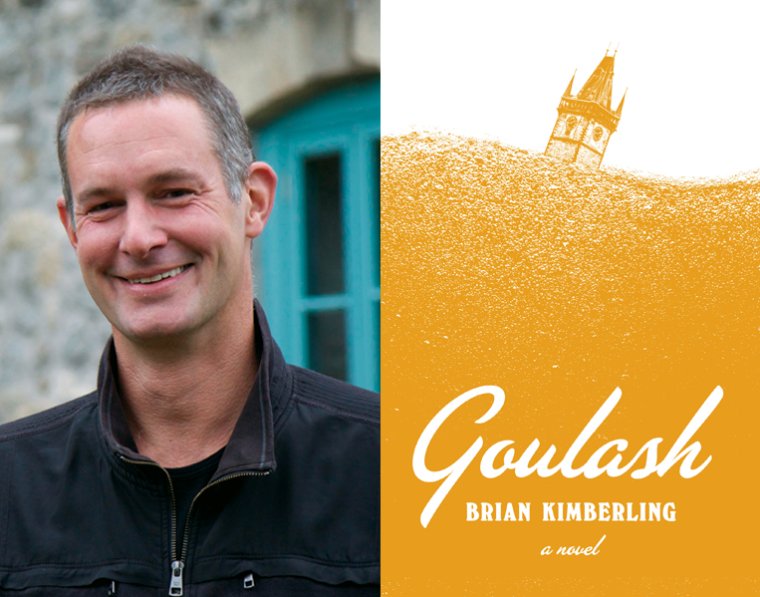
Brian Kimberling, author of Goulash. (Credit: Chris Banks)
Ten Questions for Lindsay Stern
This week’s installment of Ten Questions features Lindsay Stern, whose debut novel, The Study of Animal Languages, is out today from Viking. A book that Cynthia D’Aprix Sweeney calls “exuberant, wise, and darkly funny,” the novel follows a married couple of professors at an elite New England college who, while brilliant—he’s a philosopher, she’s a rising star in the emerging field of biolinguistics—barely seem capable of navigating their own lives. A send-up of academia and a psychological portrait of marriage, the novel is a comedy of errors that explores the limitations of language, the fragility of love, and the ways we misunderstand one another and ourselves. Lindsay Stern is a graduate of the Iowa Writers’ Workshop and the recipient of a Watson Fellowship and an Amy Award from Poets & Writers, Inc. She is currently pursuing a PhD in comparative literature at Yale University.
1. How long did it take you to write The Study of Animal Languages?
I wrote the novel’s long-abandoned first scene in September of 2013, in a guesthouse in Phnom Penh, and sent the final draft to my editor in late March of 2018. But I wasn’t writing continuously over those years. The first draft took about six months, and then—because I was teaching and applying to graduate school at the time—I set it aside for about a year, and picked it back up during my two years at the Writers’ Workshop in Iowa. Once my agent sold it, I worked on it in spurts for about another year and a half with my editor. I remember exactly where I was when she e-mailed us saying she thought it was ready: a Metro North train to New York. It pulled into Harlem’s 125th street station, and I practically floated out onto the platform.
2. What was the most challenging thing about writing the book?
Realizing I had to rewrite it. The nadir of the process came the morning after my first workshop at Iowa, after the brilliant Paul Harding had had his gentle but uncompromising way with my first draft. Light was coming through my window. I had that moment of bodiless amnesia. Then the memory of our two-hour discussion came trampling back, and all the air went out of my skull.
3. Where, when, and how often do you write?
Anywhere I can find a room of my own, green tea, and frozen peas. When I’m in the thick of a project it gets me up and to my desk by 7 AM. Because of other commitments I’ve had to take a break from that rhythm over the last few weeks, which is frustrating for me but not fatal to the work, as long as I keep the embers going internally.
4. What was the most unexpected thing about the publication process?
Its length. There’s a phenomenon in journalism that Nick Davies has called “churnalism”—you get the point—which has not infected book publishing, thank god. I had close to two years with my editor to wrestle The Study of Animal Languages into its final form.
5. What are you reading right now?
Nicholson Baker’s Vox.
6. Which author, in your opinion, deserves wider recognition?
She’s already a legend in Japan, but I think everyone should read Taeko Kono. Her story “Toddler Hunting” is a marvel of psychological exploration.
7. What is one thing you’d change about the literary community and/or the publishing business?
The fee to access Publishers Marketplace.
8. What is the biggest impediment to your writing life?
A tendency to forget that I have a limited time on earth to do it.
9. What trait do you most value in an editor (or agent)?
Clarity of thought. I was wildly fortunate to land an agent, Henry Dunow, who is both a gifted editor and mensch. My brilliant editor, Lindsey Schwoeri, also lavished attention on the manuscript. Because of them The Study of Animal Languages is a stronger, clearer book.
10. What’s the best piece of writing advice you’ve ever heard?
Go there. When the work takes you somewhere deep, it can be difficult not to swim back up out of fear or squeamishness. I did that in early drafts of the book. It took great teachers to show me that the novel was avoiding its true subject matter. So: Always go there.
Ten Questions for Shane McCrae
This week’s installment of Ten Questions features Shane McCrae, whose sixth poetry collection, The Gilded Auction Block, is out today from Farrar, Straus and Giroux. Employing and subverting traditional meter and form, the poems in the new book confront the 2016 presidential election in the United States from both personal and historical perspectives. The poems interrogate issues of identity, freedom, racism, oppression, and inheritance, using inventive line breaks and spacing to create a sense of disruption and shift, fissures in both text and feeling. McCrae is the author of five previous books, including most recently In the Language of My Captor (Wesleyan University Press, 2017), which won the 2018 Anisfield-Wolf Book Award in poetry and was a finalist for the National Book Award and the Los Angeles Times Book Prize; and The Animal Too Big to Kill (Persea Books, 2015), winner of the 2014 Lexi Rudnitsky Editor’s Choice Award. McCrae lives in New York City and is an assistant professor of writing at Columbia University.
1. How long did it take you to write The Gilded Auction Block?
I started writing the oldest poem in the book in 2014, and I wrote the newest poem in the book in 2018—so, four years. As with all my other books, I was revising it until the very last possible moment, which in this case was, I think, November 2018.
2. What was the most challenging thing about writing the book?
Maybe not giving up on the long narrative poem—“The Hell Poem”—that takes up a third of the book. I’m a poet! What do I know about narrative? Nothing! But I want to learn.
3. Where, when, and how often do you write?
I write everywhere I can, whenever I can, and as often as I can—I don’t have a set place or time.
4. What was the most unexpected thing about the publication process?
The Gilded Auction Block is my first book with Farrar, Straus and Giroux, and I wasn’t expecting how many opportunities—for readings, interviews, etc.—working with a press that size would enable. I’m grateful for every one of them.
5. What are you reading right now?
Oh my gosh, kind of a lot of things? I’ll narrow the list down to one book of poetry, one book of fiction, and one book of nonfiction. I’m reading Vahni Capildeo’s Venus as a Bear, Kathryn Davis’s The Silk Road, and Thomas Dilworth’s David Jones: Engraver, Solider, Painter, Poet.
6. Which author, in your opinion, deserves wider recognition?
G. C. Waldrep. I think he’s one of the best poets in America.
7. What is one thing you’d change about the literary community and/or the publishing business?
I would get rid of Twitter.
8. What is the biggest impediment to your writing life?
Fear, I suppose. I’m always trying to do something new, which is usually something I’m afraid of. But for the most part the new things I’m trying to do are only new in a small way—like “The Hell Poem.” I had never written a narrative poem before, so that was new to me. But it’s still strictly metrical, as all my poems are. Writing in free verse would be new to me in a big way, and I’m terrified to try.
9. What trait do you most value in an editor (or agent)?
Honesty and kindness.
10. What’s the best piece of writing advice you’ve ever heard?
The construction “there is/are” is weak. Lex Runciman gave me that advice.
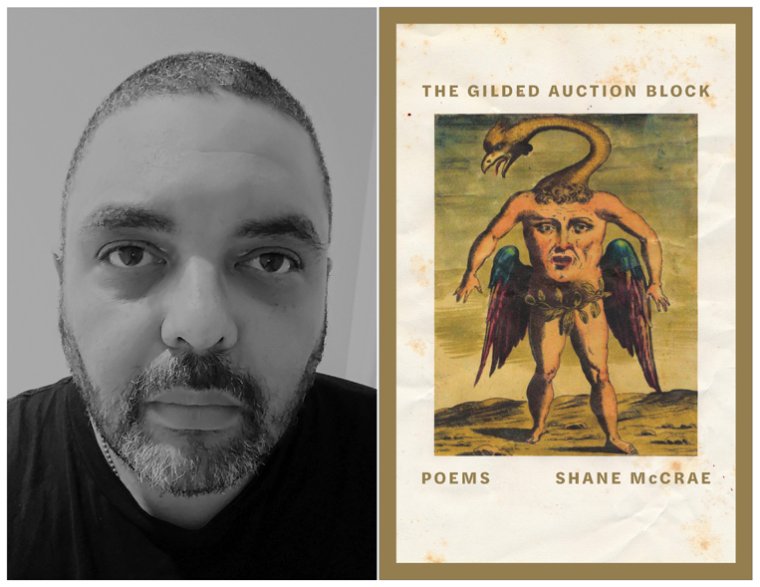
Shane McCrae, author of The Gilded Auction Block.
Ten Questions for Paige Ackerson-Kiely
This week’s installment of Ten Questions features Paige Ackerson-Kiely, whose third poetry collection, Dolefully, a Rampart Stands, is out today from Penguin Books. Set primarily in the rural northeastern United States, the poems in the new book explore poverty, captivity, violence, and the longing to disappear. Employing a range of different forms, from free verse to long prose poetry, the book considers the question of who our captors might be and examines the universal search for connection and freedom. As Michael Robbins writes at the Chicago Tribune, these poems “remind us to be absolutely shot through with anxiety and uncertainty and desire.” Ackerson-Kiely is the author of two previous poetry collections, My Love Is a Dead Arctic Explorer (Ahsahta Press, 2012) and In No One’s Land (Ahsahta Press, 2007). She lives in Peekskill, New York.
1. How long did it take you to write Dolefully, a Rampart Stands?
Once I saw the shape the poems I’d been fiddling with were making, not that long. Maybe six months? But some of the poems go way back—the earliest were written in 2010, the latest in 2018. The conversation between them was revealed to me in 2016, or thereabouts. I write a lot of stuff I end up scrapping.
2. What was the most challenging thing about writing the book?
I’m a slow-burn kind of person. It takes me a long time to commit. That doesn’t mean that I’m not working or feeling something in the intervening months or years, but it means that giving up is always within reach. The most challenging thing always is trusting that something is real / possible / important / will happen. So, in short, the length of time it takes to make a thing is always a challenge for me. The slow climb without much of a view. Trusting you will look out over the valley when you finally get there, breathless and exulted and maybe in love for a second.
3. Where, when, and how often do you write?
Since there are so few opportunities to experience a feeling of freedom in my life, I do not allow rules and regulations to dictate my writing—it’s one thing I can control. I’ve always been a striver, and it just hasn’t brought me the satisfaction I thought it would. Also, my livelihood has never depended on a publication record. So, I’m trying to be done with striving when I have the ability to make that choice. Listen, I am middle-aged, I’m not trying to be a big deal, why should I make writing poems, something I love (and how many things do you really get to love in this life?), into another opportunity to suffer? I write when I can, wherever I am, and I am trying to accept this commitment to lawlessness.
4. What was the most unexpected thing about the publication process?
Doomsday prepper that I am, it felt like a surprise that it happened at all! And of course, lucky. And the help of those involved—from first readers to Paul Slovak, my editor at Penguin—that attention and kindness has been amazing in ways that make me feel awkward and blushy and like doing better next time.
5. What are you reading right now?
Right now I am savoring an advanced copy of Allan Peterson’s new and selected, This Luminous. He is one of the great love poets of our time, and I will fight anyone who disagrees. I’m also rereading Nicholas Muellner’s The Amnesia Pavillions, an elegant and modest book I cannot learn enough from.
6. Which author, in your opinion, deserves wider recognition?
I mean, besides every living contemporary poet? God, I am enthusiastic about so much of what I read! It’s a great time to be alive, and all that. I return to Kerri Webster’s poetry often. Reading her makes me want to join a coven—to learn how to cast a spell like she does.
7. What is one thing you’d change about the literary community and/or the publishing business?
I wish I’d had more access as a kid, and I was a library kid through and through. My own kids were library kids. So the thing I’d want to change isn’t a function of the free market or the problem of any specific community. What I’d like to see is the U.S. government purchasing 1,500 copies of every book published in any given year (large presses and small), and distributing those copies among public and school libraries in every state. I can’t even begin to imagine how differently my life would have gone, as a confused teenager in rural New Hampshire, if I’d had access to contemporary poetry. I didn’t. And that’s criminal. It’s not just about me, but many other folks (especially in poor rural communities) interested in art. There just wasn’t anything. My parents worked hard and did their taxes by April 15th and paid for wars they didn’t agree with. Everyone I care about spent too many years looking for something else, some kind of external inspiration. It felt so good early on, like we would suss it out. But some gave up, and who can blame them? It was so hard to find, and the business of living can take everything from you. Wouldn’t it be great if, as a country, we could support our writers and artists in meaningful (by which I mean financial and otherwise) ways? To think of how that war money could be diverted to makers and others who need it to meet basic needs? To get the work of contemporary writers and artists into the hands of people who are hungry for it? They totally exist, they will always exist, and it is critical they are served.
8. What is the biggest impediment to your writing life?
I need to be kind of exhausted—I don’t know how else to put it—in order to steady myself on the page. I am curious about so many things! The Internet is a problem for a person like me. It’s like I need to get to the end of everything before I can plant myself. I have to know how mussels are harvested, I have to see all of Franky Larouselle’s work available online, walk the perimeter of my town four times, and feel some big feeling for someone (these are a few examples from today), before my mind is relaxed enough to do its own business.
9. What trait do you most value in an editor?
Oh, the human ones! Curiosity, devotion to beauty, vigorousness, humor, love of the underdog, an ability to call bullshit.
10. What’s the best piece of writing advice you’ve ever heard?
I remember when I was in my MFA program, a few of my mentors told me the most important part of being in a program would be the lasting friendships I would make. I’m sure that, jerk that I was/am, I disregarded this advice as pat. Guess what? It was totally true, for me at least. And you don’t have to go to a program—attending an MFA program is not part of this advice, though programs are great for many of us—but finding your writing soulmate: that is the best advice I ever received. And all the best writing advice since has come from my soulmate, Allison Titus. From figuring it out together. That creative relationship has been like a wish for a thousand wishes—I could not write or live without her. As I was advised.
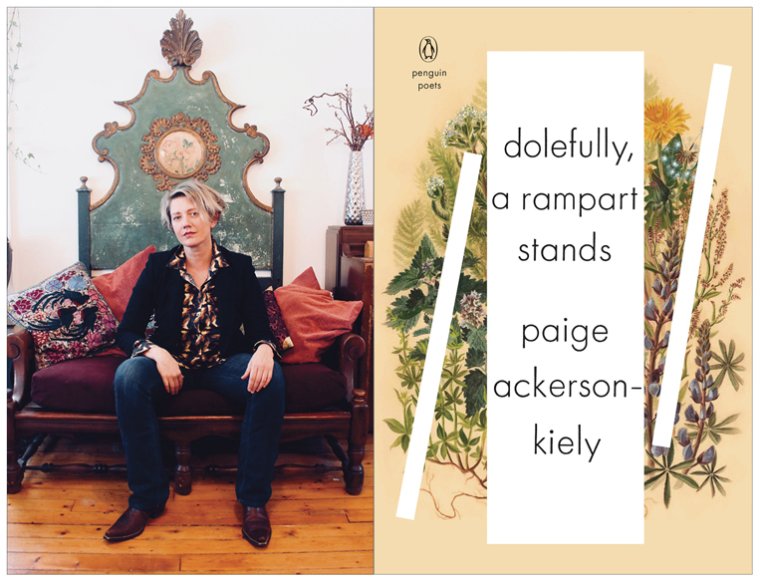
Paige Ackerson-Kiely, author of Dolefully, a Rampart Stands.
Ten Questions for Hala Alyan
This week’s installment of Ten Questions features Hala Alyan, whose fourth poetry collection, The Twenty-Ninth Year, is out today from Mariner Books. In wild, lyrical poems, Alyan examines the connections between physical and interior migration, occasioned by the age of twenty-nine, which, in Islamic and Western tradition, is a year of transformation and upheaval. Leaping from war-torn cities in the Middle East to an Oklahoma Olive Garden to a Brooklyn brownstone, Alyan’s poems chronicle a personal history shaped by displacement. “Alyan picks up the fragments of a broken past and reassembles them into a livable future made more dazzling for having known brokenness,” writes Kaveh Akbar. “This is poetry of the highest order.” Hala Alyan is an award-winning Palestinian American poet and novelist as well as a clinical psychologist. Her previous books include the novel Salt Houses (Houghton Mifflin Harcourt, 2017) and the poetry collections Hijra (Southern Illinois University Press, 2016), Four Cities (Black Lawrence Press, 2015), and Atrium (Three Rooms Press, 2012).
1. How long did it take you to write The Twenty-Ninth Year?
I wrote it in bits and pieces over a year, and then stitched it together into a coherent collection in a few weeks, which is usually how I work with poetry.
2. What was the most challenging thing about writing the book?
Much of it was written from a state of pain—psychic, emotional grief, a time in my life that involved a fair amount of evolution and “lying fallow,” as my friend put it. At times I found it difficult to write about an experience I was still in the middle of, which is why I had to wait to iron out the narrative until things felt more settled.
3. Where, when, and how often do you write?
I’m not picky about location. I make sure to write thirty minutes a day, though that generally is for fiction, which I have a harder time being disciplined about. In terms of poetry, I usually wait until I need to write, which makes for a really thrilling, cathartic experience of creation.
4. What was the most unexpected thing about the publication process?
Just how involved and long the process can be! How many beautiful, moving parts have to work together just to create a book, and how much you need dedication and love for the process from every single person involved.
5. What are you reading right now?
At the moment, I’m rereading Virgin by Analicia Sotelo as well as The Mars Room by Rachel Kushner.
6. Which author, in your opinion, deserves wider recognition?
That’s such a difficult question, because I wish all good writing (especially by writers of color) had equal recognition—an impossible want, I know. There’s several books coming out or recently out by women of color that I’m really hoping soak up a ton of recognition: Invasive Species by Marwa Helal, To Keep the Sun Alive by Rabeah Ghaffari and A Woman is No Man by Etaf Rum.
7. What is one thing you’d change about the literary community and/or the publishing business?
I wish the different parts of the community were more integrated. Starting off, I knew virtually nothing about the publishing industry, for instance, which seems like an oversight. I would love to have more interaction with different members of the writing, reading and publishing community—to know more about what publicists do, to talk to more booksellers and libraries, to really be reminded that we’re all in this together!
8. What is the biggest impediment to your writing life?
My easily distracted nature: laundry, walking the dog, making oatmeal. Although I also think that these are necessary parts to a writing life, as is work (for me) and procrastination and daydreaming.
9. What trait do you most value in an editor (or agent)?
A combination of honesty and empathy, which I’ve been lucky enough to find both in my agent and the editors I’ve worked with so far. I also like a bit of tough love, because it brings out the eager student in me.
10. What’s the best piece of writing advice you’ve ever heard?
I like to toss Anne Lamott’s Bird by Bird at anyone who is even remotely interested in writing. In particular, I love her approach to breaking down a massive writing task into small, digestible pieces, and finding joy in those pieces.
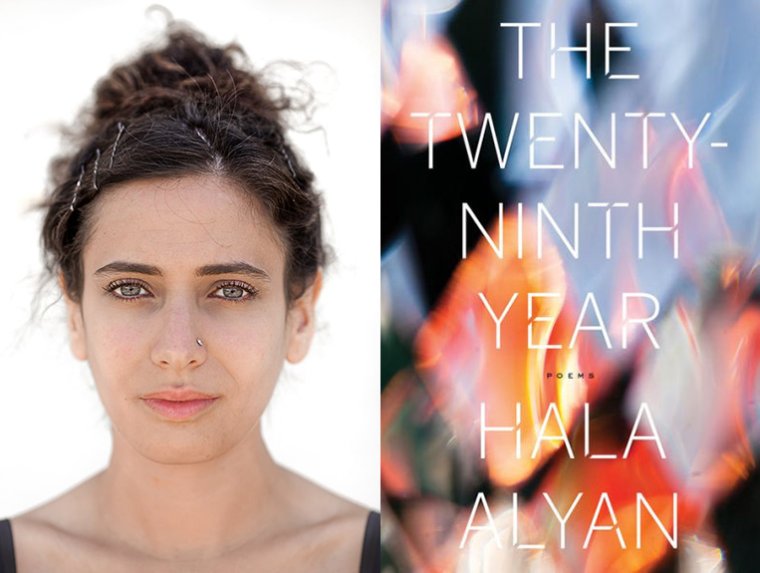
Hala Alyan, author of The Twenty-Ninth Year. (Credit: Bob Anderson)
First Fiction 2017
For our seventeenth annual roundup of the summer’s best debut fiction, we asked five established authors to introduce this year’s group of debut writers. Read the July/August 2017 issue of the magazine for interviews between Zinzi Clemmons and Danzy Senna, Hala Alyan and Mira Jacob, Jess Arndt and Maggie Nelson, Lisa Ko and Emily Raboteau, and Diksha Basu and Gary Shteyngart. But first, check out these exclusive readings and excerpts from their debut novels.
What We Lose (Viking, July) by Zinzi Clemmons
Salt Houses (Houghton Mifflin Harcourt, May) by Hala Alyan
Large Animals (Catapult, May) by Jess Arndt
The Leavers (Algonquin Books, May) by Lisa Ko
The Windfall (Crown, June) by Diksha Basu
What We Lose
by Zinzi Clemmons
My parents’ bedroom is arranged exactly the same as it always was. The big mahogany dresser sits opposite the bed, the doily still in place on the vanity. My mother’s little ring holders and perfume bottles still stand there. On top of all these old feminine relics, my father has set up his home office. His old IBM laptop sits atop the doily, a tangle of cords choking my mother’s silver makeup tray. His books are scattered around the tables, his clothes draped carelessly over the antique wing chair that my mother found on a trip to Quebec.
In the kitchen, my father switches on a small flat-screen TV that he’s installed on the wall opposite the stove. My mother never allowed TV in the kitchen, to encourage bonding during family dinners and focus during homework time. As a matter of fact, we never had more than one television while I was growing up—an old wood-paneled set that lived in the cold basement, carefully hidden from me and visitors in the main living areas of the house.
We order Chinese from the place around the corner, the same order that we’ve made for years: sesame chicken, vegetable fried rice, shrimp lo mein. As soon as they hear my father’s voice on the line, they put in the order; he doesn’t even have to ask for it. When he picks the order up, they ask after me. When my mother died, they started giving us extra sodas with our order, and he returns with two cans of pineapple soda, my favorite.
My father tells me that he’s been organizing at work, now that he’s the only black faculty member in the upper ranks of the administration.
I notice that he has started cutting his hair differently. It is shorter on the sides and disappearing in patches around the crown of his skull. He pulls himself up in his chair with noticeable effort. He had barely aged in the past twenty years, and suddenly, in the past year, he has inched closer to looking like his father, a stooped, lean, yellow-skinned man I’ve only seen in pictures.
“How have you been, Dad?” I say as we sit at the table.
The thought of losing my father lurks constantly in my mind now, shadowy, inexpressible, but bursting to the surface when, like now, I perceive the limits of his body. Something catches in my throat and I clench my jaw.
My father says that he has been keeping busy. He has been volunteering every month at the community garden on Christian Street, turning compost and watering kale.
“And I’m starting a petition to hire another black professor,” he says, stabbing his glazed chicken with a fire I haven’t seen in him in years.
He asks about Peter.
“I’m glad you’ve found someone you like,” he says.
“Love, Dad,” I say. “We’re in love.”
He pauses, stirring his noodles quizzically with his fork. “Why aren’t you eating?” he asks.
I stare at the food in front of me. It’s the closest thing to comfort food since my mother has been gone. The unique flavor of her curries and stews buried, forever, with her. The sight of the food appeals to me, but the smell, suddenly, is noxious; the wisp of steam emanating from it, scorching.
“Are you all right?”
All of a sudden, I have the feeling that I am sinking. I feel the pressure of my skin holding in my organs and blood vessels and fluids; the tickle of every hair that covers it. The feeling is so disorienting and overwhelming that I can no longer hold my head up. I push my dinner away from me. I walk calmly but quickly to the powder room, lift the toilet seat, and throw up.
From What We Lose by Zinzi Clemmons, published in July by Viking, an imprint of Penguin Publishing Group, a division of Penguin Random House LLC. Copyright © 2017 by Zinzi Clemmons.
(Photo: Nina Subin)Salt Houses
by Hala Alyan
On the street, she fumbles for a cigarette from her purse and smokes as she walks into the evening. She feels a sudden urge, now that she is outside the apartment, to clear her head. This is her favorite thing about the city—the ability it gives you to walk, to literally put space between your body and distress. In Kuwait, nobody walks anywhere.
Mimi lives in a quiet part of the city, mostly residential, with small, pretty apartments, each window like a glistening eye. The streetlamps are made of wrought iron, designs flanking either side of the bulbs. There is a minimalist sense of wealth in the neighborhood, children dressed simply, the women always adjusting scarves around their necks, their hair cut into perfectly symmetrical lines. Souad walks by the manicured lawns of a grammar school, empty and discarded for the summer. Next to it a gray-steepled church. She tries to imagine that, elsewhere, there is smoke and destroyed palaces and men carrying guns. It seems impossible.
The night is cool, and Souad wraps her cardigan tightly around her, crosses her arms. A shiver runs through her. She is nervous to see him, a familiar thrill that he always elicits in her. Even before last night.
Le Chat Rouge is a fifteen-minute walk from Mimi’s apartment, but within several blocks the streets begin to change, brownstones and Gothic-style latticework replaced with grungier alleyways, young Algerian men with long hair sitting on steps and drinking beer from cans. One eyes her and calls out, caressingly, something in French. She can make out the words for sweet and return. Bars line the streets with their neon signs and she walks directly across the Quartier Latin courtyard, her shoes clicking on the cobblestones.
“My mother’s going to call tomorrow,” she told Elie yesterday. She wasn’t sure why she said it, but it felt necessary. “They’re taking me to Amman.” In the near dark, Elie’s face was peculiarly lit, the sign making his skin look alien.
“You could stay here,” Elie said. He smiled mockingly. “You could get married.”
Souad had blinked, her lips still wet from the kiss. “Married?” She wasn’t being coy—she truthfully had no idea what Elie meant. Married to whom? For a long, awful moment, she thought Elie was suggesting she marry one of the other Lebanese men, that he was fobbing her off on a friend in pity.
“Yes.” Elie cocked his head, as though gauging the authenticity of her confusion. He smiled again, kinder this time. He closed his fingers around hers so that she was making a fist and he a larger one atop it. They both watched their hands silently for a few seconds, an awkward pose, more confrontational than romantic, as though he were preventing her from delivering a blow. It occurred to her that he was having a difficult time speaking. She felt her palm itch but didn’t move. Elie cleared his throat, and when he spoke, she had to lean in to hear him.
“You could marry me.”
Now, even in re-creating that moment, Souad feels the swoop in her stomach, her mouth drying. It is a thing she wants in the darkest, most furtive way, not realizing how badly until it was said aloud. Eighteen years old, a voice within her spoke, eighteen. Too young, too young. And her parents, her waiting life.
But the greater, arrogant part of Souad’s self growled as if woken. Her steps clacked with her want of it. The self swelled triumphantly—Shame, shame, she admonishes herself, thinking of the war, the invasion, the troops and fire, but she is delighted nonetheless.
From Salt Houses by Hala Alyan. Copyright © 2017 by Hala Alyan. Used by permission of Houghton Mifflin Harcourt Publishing Company. All rights reserved.
(Photo: Beowulf Sheehan)Large Animals
by Jess Arndt
In my sleep I was plagued by large animals—teams of grizzlies, timber wolves, gorillas even came in and out of the mist. Once the now extinct northern white rhino also stopped by. But none of them came as often or with such a ferocious sexual charge as what I, mangling Latin and English as usual, called the Walri. Lying there, I faced them as you would the inevitable. They were massive, tube-shaped, sometimes the feeling was only flesh and I couldn’t see the top of the cylinder that masqueraded as a head or tusks or eyes. Nonetheless I knew I was in their presence intuitively. There was no mistaking their skin; their smell was unmistakable too, as was their awful weight.
During these nights (the days seemed to disappear before they even started) I was living two miles from a military testing site. In the early morning and throughout the day the soft, dense sound of bombs filled the valley. It was comforting somehow. Otherwise I was entirely alone.
This seemed a precondition for the Walri—that I should be theirs and theirs only. on the rare occasion that I had an overnight visitor to my desert bungalow the Walri were never around. Then the bears would return in force, maybe even a large local animal like a mountain lion or goat, but no form’s density came close to walrusness. So I became wary and stopped inviting anyone out to visit at all.
The days, unmemorable, had a kind of habitual slide. I would wake up with the sun and begin cleaning the house. No matter how tightly I’d kept the doors shut the day before, dust and sand and even large pieces of mineral rock seemed to shove their way inside. I swept these into piles. Then the dishes that I barely remembered dirtying—some mornings it was as if the whole artillery of pots and pans had been used in the night by someone else—then the trash (again always full), then some coffee. Eight o’clock.
This work done, I sat in various chairs in the house following the bright but pale blades of light. I was drying out. oh, an LA friend said somewhat knowingly, from the booze? But I had alcohol with me, plenty of it. It wasn’t that. I moved as if preprogrammed. only later did I realize that my sleep was so soggy that it took strong desert sun to unshrivel me and since it was the middle of winter and the beams were perforce slanted, I’d take all of it I could find.
For lunch I got in my car and drove into town, to the empty parking lot of Las Palmas. There were many Mexican joints along the highway that also functioned as Main Street. I hadn’t bothered to try them out. Las Palmas, with its vacant booths, dusty cacti, and combination platter lunch special for $11.99 including $4 house margarita, was fine.
A waitress named Tamara worked there. She seemed like the only one. She wasn’t my type—so tall she bent over herself and a bona fide chain-smoker. Sometimes to order you’d have to exit your booth and find her puffing outside. A friend who had borrowed the bungalow before I did told me about Tamara and so if I had a crush at all it was an inherited one that even came with inherited guilt—from having taken her on once he could no longer visit her. Regardless, we barely spoke.
I had things I was supposed to be doing, more work than I could accomplish even if I
duct-taped my fists to my laptop, but none of it seemed relevant to my current state. In the afternoons I drove back home slowly, always stopping for six-packs of beer at the Circle K. I enjoyed the task. The beer evaporated once I stuck it in my fridge—it was there and then, it was gone.
My sleeping area was simple: a bed on a plywood platform. A wooden dresser. Built-in closets and a cement floor. At first I would wake up in the night from the sheer flattening silence of the desert. It was impossible that the world still existed elsewhere. After that initial jolt, relief.
Don’t you miss it? my same friend said during our weekly telephone chats. But I couldn’t explain the euphoria of walking up and down the chilly aisles of Stater Bros. In week-old sweatpants if I wanted, uncounted by life. Would I buy refried or whole beans? This brand or that? It didn’t matter, no one cared.
It was in these conditions that the Walri arrived.
* * *
I’d slept as usual for the first few hours, heavily, in a kind of coma state. Then had woken, I thought to pee. But lying there with the gritty sheets braided around me, the violet light that was created from the fly zapper, the desert cold that was entering through the gaps and cracks in the fire’s absence—I felt a new form of suffocation.
It wasn’t supernatural. I’d also had that. The sense of someone’s vast weight sitting on the bed with you or patting your body with ghostly hands. This breathless feeling was larger, as if I was uniformly surrounded by mammoth flesh.
Dream parts snagged at me. Slapping sounds and hose-like alien respiration. I felt I was wrestling within inches of what must be—since I couldn’t breathe—the end of my life. Now the lens of my dream panned backward and I saw my opponent in his entirety.
He lay (if that’s what you could call it) on my bed, thick and wrinkled, the creases in his hide so deep I could stick my arms between them. His teeth were yellow and as long as my legs.
“I’m sexually dormant,” I said aloud to him. “But I want to put my balls in someone’s face.”
Then somehow light was peeling everything back for dawn.
From Large Animals. Used with permission of Catapult. Copyright 2017 by Jess Arndt.
(Photo: Johanna Breiding)The Leavers
by Lisa Ko
The day before Deming Guo saw his mother for the last time, she surprised him at school. A navy blue hat sat low on her forehead, scarf around her neck like a big brown snake. “What are you waiting for, Kid? It’s cold out.”
He stood in the doorway of P.S. 33 as she zipped his coat so hard the collar pinched. “Did you get off work early?” It was four thirty, already dark, but she didn’t usually leave the nail salon until six.
They spoke, as always, in Fuzhounese. “Short shift. Michael said you had to stay late to get help on an assignment.” Her eyes narrowed behind her glasses, and he couldn’t tell if she bought it or not. Teachers didn’t call your mom when you got detention, only gave a form you had to return with a signature, which he forged. Michael, who never got detention, had left after eighth period, and Deming wanted to get back home with him, in front of the television, where, in the safety of a laugh track, he didn’t have to worry about letting anyone down.
Snow fell like clots of wet laundry. Deming and his mother walked up Jerome Avenue. In the back of a concrete courtyard three older boys were passing a blunt, coats unzipped, wearing neither backpacks nor hats, sweet smoke and slow laughter warming the thin February air. “I don’t want you to be like that,” she said. “I don’t want you to be like me. I didn’t even finish eighth grade.”
What a sweet idea, not finishing eighth grade. He could barely finish fifth. His teachers said it was an issue of focus, of not applying himself. Yet when he tripped Travis Bhopa in math class Deming had been as shocked as Travis was. “I’ll come to your school tomorrow,” his mother said, “talk to your teacher about that assignment.” He kept his arm against his mother’s, loved the scratchy sound of their jackets rubbing together. She wasn’t one of those TV moms, always hugging their kids or watching them with bemused smiles, but insisted on holding his hand when they crossed a busy street. Inside her gloves her hands were red and scraped, the skin angry and peeling, and every night before she went to sleep she rubbed a thick lotion onto her fingers and winced. Once he asked if it made them hurt less. She said only for a little while, and he wished there was a special lotion that could make new skin grow, a pair of superpower gloves.
Short and blocky, she wore loose jeans—never had he seen her in a dress—and her voice was so loud that when she called his name dogs would bark and other kids jerked around. When she saw his last report card he thought her shouting would set off the car alarms four stories below. But her laughter was as loud as her shouting, and there was no better, more gratifying sound than when she slapped her knees and cackled at something silly. She laughed at things that weren’t meant to be funny, like TV dramas and the swollen orchestral soundtracks that accompanied them, or, better yet, at things Deming said, like when he nailed the way their neighbor Tommie always went, “Not bad-not bad-not bad” when they passed him in the stairwell, an automatic response to a “Hello-how-are-you” that hadn’t yet been issued. Or the time she’d asked, flipping through TV stations, “Dancing with the Stars isn’t on?” and he had excavated Michael’s old paper mobile of the solar system and waltzed with it through the living room as she clapped. It was almost as good as getting cheered on by his friends.
When he had lived in Minjiang with his grandfather, Deming’s mother had explored New York by herself. There was a restlessness to her, an inability to be still or settled. She jiggled her legs, bounced her knees, cracked her knuckles, twirled her thumbs. She hated being cooped up in the apartment on a sunny day, paced the rooms from wall to wall to wall, a cigarette dangling from her mouth. “Who wants to go for a walk?” she would say. Her boyfriend Leon would tell her to relax, sit down. “Sit down? We’ve been sitting all day!” Deming would want to stay on the couch with Michael, but he couldn’t say no to her and they’d go out, no family but each other. He would have her to himself, an ambling walk in the park or along the river, making up stories about who lived in the apartments they saw from the outside—a family named Smith, five kids, father dead, mother addicted to bagels, he speculated the day they went to the Upper East Side. “To bagels?” she said. “What flavor bagel?” “Everything bagels,” he said, which made her giggle harder, until they were both bent over on Madison Avenue, laughing so hard no sounds were coming out, and his stomach hurt but he couldn’t stop laughing, old white people giving them stink eye for stopping in the middle of the sidewalk. Deming and his mother loved everything bagels, the sheer balls of it, the New York audacity that a bagel could proclaim to be everything, even if it was only topped with sesame seeds and poppy seeds and salt.
A bus lumbered past, spraying slush. The walk sign flashed on. “You know what I did today?” his mother said. “One lady, she had a callus the size of your nose on her heel. I had to scrape all that dead skin off. It took forever. And her tip was shit. You’ll never do that, if you’re careful.”
He dreaded this familiar refrain. His mother could curse, but the one time he’d let motherfucker bounce out in front of her, loving the way the syllables got meatbally in his mouth, she had slapped his arm and said he was better than that. Now he silently said the word to himself as he walked, one syllable per footstep.
“Did you think that when I was growing up, a small girl your age, I thought: hey, one day, I’m going to come all the way to New York so I can pick gao gao out of a stranger’s toe? That was not my plan.”
Always be prepared, she liked to say. Never rely on anyone else to give you things you could get yourself. She despised laziness, softness, people who were weak. She had few friends, but was true to the ones she had. She could hold a fierce grudge, would walk an extra three blocks to another grocery store because, two years ago, a cashier at the one around the corner had smirked at her lousy English. It was lousy, Deming agreed.
From The Leavers. Printed by permission of Algonquin Books. Copyright © 2017 by Lisa Ko.
(Photo: Bartosz Potocki)The Windfall
by Diksha Basu
The following week, on an unusually overcast September day, Mr. Jha pulled into the quiet lane of his new Gurgaon home. He had never been here by himself, he realized. Mrs. Jha was usually with him, and this summer Rupak had come with them a few times, and there were all the contractors and painters and builders buzzing around, working. He had never really appreciated the silence and the greenery before. Gurgaon felt still while the rest of Delhi throbbed.
The air was heavy with heat and the promise of rain. On the radio, a Bon Jovi song played. “It’s been raining since you left me,” the lyrics said. How funny, Mr. Jha thought. An Indian song would have to say, “It hasn’t rained since you left me.” Unless, of course, you were happy that they left you.
An electronic shoe-polishing machine in a large box was on the passenger seat of his Mercedes. He had strapped it in with the seat belt. It was beautiful. And it was expensive. It was not a planned purchase. This morning he had a breakfast meeting with two young men who were launching a website that would help you find handymen around Delhi, and they asked him to join their team as a consultant. He declined. He did not have time to take on any new work until they were done moving homes. And then they had to visit Rupak, so he was not going to have any free time until November or December. And then it would be the holiday season, so really it was best if he took the rest of the year off work.
The meeting was over breakfast at the luxurious Teresa’s Hotel in Connaught Place in central Delhi, and after filling himself up with mini croissants, fruit tarts, sliced cheeses, salami, coffee, and orange juice, Mr. Jha went for a stroll through the lobby and the other restaurants in the hotel. All the five-star hotels in the center of town were little oases of calm and cool. Mr. Jha was walking by the large windows that overlooked the swimming pool that was for guests only when he thought he would book a two-night stay here. He knew his wife loved the indulgence of nice hotels and he had recently read about what youngsters were calling a staycation—a vacation where you don’t leave the city or the home you usually live in, but you give yourself a few days to take a holiday. Of course, since he didn’t work much anymore, most days, weeks, months were a staycation, but how wonderful it would be to check into a hotel and have a lazy few days. Having room service—or, like they were called at Teresa’s, butlers—was a different sort of pleasure than having servants bringing you food and cleaning your home. Butlers showed that you had made the progression from servants to expensive appliances to uniformed men who ran the expensive appliances.
From The Windfall, published by Crown Publishing Group, a division of Penguin Random House LLC, in June. Copyright © 2017 by Diksha Basu.
(Photo: Mikey McCleary)First Fiction 2016
For our sixteenth annual roundup of the summer’s best debut fiction, we asked five established authors to introduce this year’s group of debut writers. Read the July/August 2016 issue of the magazine for interviews between Yaa Gyasi and Angela Flournoy, Masande Ntshanga and Naomi Jackson, Rumaan Alam and Emma Straub, Maryse Meijer and Lindsay Hunter, and Imbolo Mbue and Christina Baker Kline. But first, check out these exclusive readings and excerpts from their debut novels.
Homegoing (Knopf, June) by Yaa Gyasi
The Reactive (Two Dollar Radio, June) by Masande Ntshanga
Rich and Pretty (Ecco, June) by Rumaan Alam
Heartbreaker (Farrar, Straus and Giroux, July) by Maryse Meijer
Behold the Dreamers (Random House, August) by Imbolo Mbue
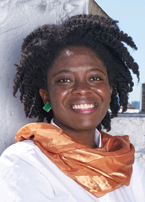
The night Effia Otcher was born into the musky heat of Fanteland, a fire raged through the woods just outside her father’s compound. It moved quickly, tearing a path for days. It lived off the air; it slept in caves and hid in trees; it burned, up and through, unconcerned with what wreckage it left behind, until it reached an Asante village. There, it disappeared, becoming one with the night.
Effia’s father, Cobbe Otcher, left his first wife, Baaba, with the new baby so that he might survey the damage to his yams, that most precious crop known far and wide to sustain families. Cobbe had lost seven yams, and he felt each loss as a blow to his own family. He knew then that the memory of the fire that burned, then fled, would haunt him, his children, and his children’s children for as long as the line continued. When he came back into Baaba’s hut to find Effia, the child of the night’s fire, shrieking into the air, he looked at his wife and said, “We will never again speak of what happened today.”
The villagers began to say that the baby was born of the fire, that this was the reason Baaba had no milk. Effia was nursed by Cobbe’s second wife, who had just given birth to a son three months before. Effia would not latch on, and when she did, her sharp gums would tear at the flesh around the woman’s nipples until she became afraid to feed the baby. Because of this, Effia grew thinner, skin on small bird- like bones, with a large black hole of a mouth that expelled a hungry crywhich could be heard throughout the village, even on the days Baaba did her best to smother it, covering the baby’s lips with the rough palm of her left hand.
“Love her,” Cobbe commanded, as though love were as simple an act as lifting food up from an iron plate and past one’s lips. At night, Baaba dreamed of leaving the baby in the dark forest so that the god Nyame could do with her as he pleased.
Effia grew older. The summer after her third birthday, Baaba had her first son. The boy’s name was Fiifi, and he was so fat that some- times, when Baaba wasn’t looking, Effia would roll him along the ground like a ball. The first day that Baaba let Effia hold him, she accidentally dropped him. The baby bounced on his buttocks, landed on his stomach, and looked up at everyone in the room, confused as to whether or not he should cry. He decided against it, but Baaba, who had been stirring banku, lifted her stirring stick and beat Effia across her bare back. Each time the stick lifted off the girl’s body, it would leave behind hot, sticky pieces of banku that burned into her flesh. By the time Baaba had finished, Effia was covered with sores, screaming and crying. From the floor, rolling this way and that on his belly, Fiifi looked at Effia with his saucer eyes but made no noise.
Cobbe came home to find his other wives attending to Effia’s wounds and understood immediately what had happened. He and Baaba fought well into the night. Effia could hear them through the thin walls of the hut where she lay on the floor, drifting in and out of a feverish sleep. In her dream, Cobbe was a lion and Baaba was a tree. The lion plucked the tree from the ground where it stood and slammed it back down. The tree stretched its branches in protest, and the lion ripped them off, one by one. The tree, horizontal, began to cry red ants that traveled down the thin cracks between its bark. The ants pooled on the soft earth around the top of the tree trunk.
And so the cycle began. Baaba beat Effia. Cobbe beat Baaba. By the time Effia had reached age ten, she could recite a history of the scars on her body. The summer of 1764, when Baaba broke yams across her back. The spring of 1767, when Baaba bashed her left foot with a rock, breaking her big toe so that it now always pointed away from the other toes. For each scar on Effia’s body, there was a companion scar on Baaba’ s, but that didn’t stop mother from beating daughter, father from beating mother.
Matters were only made worse by Effia’s blossoming beauty. When she was twelve, her breasts arrived, two lumps that sprung from her chest, as soft as mango flesh. The men of the village knew that first blood would soon follow, and they waited for the chance to ask Baaba and Cobbe for her hand. The gifts started. One man tapped palm wine better than anyone else in the village, but another’s fishing nets were never empty. Cobbe’s family feasted off Effia’s burgeoning woman- hood. Their bellies, their hands, were never empty.
Excerpted from HOMEGOING by Yaa Gyasi. Copyright © 2016 by Yaa Gyasi. Excerpted by permission of Knopf, a division of Penguin Random House LLC. All rights reserved. No part of this excerpt may be reproduced or reprinted without permission in writing from the publisher.
The Reactive
By Masande Ntshanga
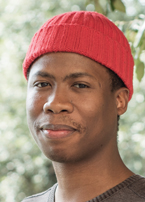
The way I got to know them, by the way, my two closest friends here, is that we met at one of the new HIV and drug-counseling sessions cropping up all over the city. We were in the basement parking lot of the free clinic in Wynberg. The seminar room upstairs had been locked up and taped shut, there’d been a mercury spill, and our group couldn’t meet in there on account of the vapors being toxic to human tissue. Instead, they arranged us in the basement parking lot, and in two weeks we got used to not being sent upstairs for meetings. I did, in any case, and that was enough for me in the beginning.
In those days, I attended the meetings alone. I’d catch a taxi from Obs over to Wynberg for an afternoon’s worth of counseling. By the end of my first month, when the seminar room had been swept once, and then twice, and then three times by a short man who wore a blue contamination meter over his chest, each time checking out clean, everyone decided they preferred it down below, and so that’s where we stayed.
Maybe we all want to be buried here, I said.
It had been the first time I’d spoken in group. Talking always took me a while, back then, but the remark succeeded in making a few of them laugh. It won me chuckles even from the old-timers, and later, I wrote down my first addiction story to share with the group. It was from a film I saw adapted from a book I wasn’t likely to read. Ruan and Cissie arrived on the following Wednesday.
I noticed them immediately. Something seemed to draw us in from our first meeting. In the parking lot, we eyeballed each other for a while before we spoke. During the coffee break, we stood by the serving table in front of a peeling Toyota bakkie, mumbling tentatively towards each other’s profiles. I learned that Cecelia was a teacher. She pulled week-long shifts at a daycare center just off Bridge Street in Mowbray, and she was there on account of the school’s accepting its first openly positive pupil. Ruan, who was leaning against the plastic table, gulping more than sipping at the coffee in his paper cup, said that he suffocated through his life by working on the top floor of his uncle’s computer firm. He was there to shop for a social issue they could use for their corporate responsibility strategy. He called it CRS, and Cissie and I had to ask him what he meant.
In the end, I guess I was impressed. I told them how I used to be a lab assistant at Peninsula Tech, and how in a way this was part of how I’d got to be sick with what I have.
When we sat back down again, we listened to the rest of the members assess each other’s nightmares. They passed them around with a familiar casualness. Mark knew about Ronelle’s school fees, for instance, and she knew about Linette’s hepatitis, and all of us knew that Linda had developed a spate of genital warts over September. She called them water warts, when she first told us, and, like most of her symptoms, she blamed them on the rain.
That day, when the discussion turned to drug abuse, as it always did during the last half-hour of our sessions, the three of us had nothing to add. I looked over at Ruan and caught him stashing a grin behind his fist, while on my other side, Cecelia blinked up at the ceiling. I didn’t need any more evidence for our kinship.
The meeting lasted the full two hours, and when it came to an end, I collected my proof of attendance and exchanged numbers with Ruan and Cecelia. I suppose we said our goodbyes at the entrance of the parking lot that day, and later, within that same week I think, we were huffing paint thinner together in my flat in Obs.
Excerpted from The Reactive by Masande Ntshanga. Copyright © 2016 by Masande Ntshanga. Excerpted by permission of Two Dollar Radio. All rights reserved. No part of this excerpt may be reproduced or reprinted without permission in writing from the publisher.
Rich and Pretty
By Rumaan Alam
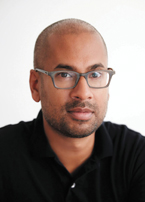
Lauren’s office is freezing. You could keep butter on the desk. You could perform surgery. Every woman in the office—they’re all women—keeps a cashmere sweater on the back of her chair. They sit, hands outstretched over computer keyboards like a bum’s over a flaming garbage can. The usual office noises: typing, telephones, people using indoor voices, the double ding of an elevator going down. For some reason, the double ding of the elevator going down is louder than the single ding of the elevator going up. There’s a metaphor in there, waiting to be untangled. They make cookbooks, these women. There’s no food, just stacks of paper and editorial assistants in glasses. She’s worked here for four years. It’s fine.
Today is different because today there’s a guy, an actual dude, in the office with them, not a photographer or stylist popping by for a meeting, as does happen: He’s
a temp, because Kristen is having a baby and her doctor put her on bed rest. Lauren isn’t totally clear on what Kristen does, but now there’s a dude doing it. He’s wearing a button-down shirt and jeans, and loafers, not sneakers, which implies a certain maturity. Lauren’s been trying to get him to notice her all day. She’s the second-prettiest woman in the office, so it isn’t hard. Hannah, the prettiest, has a vacant quality about her. She’s not stupid, exactly—in fact, she’s very competent—but she doesn’t have spark. She’s not interesting, just thin and blond, with heavy eyeglasses and a photograph of her French bulldog on her computer screen.
Lauren has it all planned out. She’ll walk past his desk a couple of times, which isn’t suspicious because his desk isn’t far from the kitchen, and the kitchen is where the coffee is, and by the third time, he’ll follow her in there, and she’ll make a wisecrack about the coffee, and he’ll say it’s not so bad, and they’ll talk, and exchange phone numbers, e-mail addresses, whatever, and then later they’ll leave the office at the same time, ride down together in the elevator and not talk because they both understand that the social contract dictates that sane people do not talk in elevators, and then he’ll let her go through the revolving door first, even though she’s pretty sure that etiquette has it that men precede women through revolving doors, and then they’ll both be standing on Broadway, and there will be traffic and that vague smell of charred, ethnic meat from the guy with the lunch cart on the corner, and he’ll suggest they get a drink, and she’ll say sure, and they’ll go to the Irish pub on Fifty-Fifth Street, because there’s nowhere else to go, and after two drinks they’ll be starving, and he’ll suggest they get dinner, but there’s nowhere to eat in this part of town, so they’ll take the train to Union Square and realize there’s nowhere to eat there either, and they’ll walk down into the East Village and find something, maybe ramen, or that Moroccan-y place that she always forgets she likes, and they’ll eat, and they’ll start touching each other, casually but deliberately, carefully, and the check will come and she’ll say let’s split it, and he’ll say no let me, even though he’s a temp and can’t make that much money, right? Then they’ll be drunk, so taking a cab seems wise and they’ll make out in the backseat, but just a little bit, and kind of laugh about it, too: stop to check their phones, or admire the view, or so he can explain that he lives with a roommate or a dog, or so she can tell him some stupid story about work that won’t mean anything to him anyway because it’s only his first day and he doesn’t know anyone’s name, let alone their personality quirks and the complexities of the office’s political and social ecosystem.
Then he’ll pay the driver, because they’ll go to his place—she doesn’t want to bring the temp back to her place—and it’ll be nice, or fine, or ugly, and he’ll open beers because all he has are beers, and she’ll pretend to drink hers even though she’s had enough, and he’ll excuse himself for a minute to go to the bathroom, but really it’s to brush his teeth, piss, maybe rub some wet toilet paper around his ass and under his balls. This is something Gabe had told her, years ago, that men do this, or at least, that he did. Unerotic, but somehow touching. Then the temp will come sit next to her on the couch, please let it be a couch and not a futon, and he’ll play with her hair a little before he kisses her, his mouth minty, hers beery. He’ll be out of his shirt, then, and he’s hard and hairy, but also a little soft at the belly, which she likes. She once slept with this guy Sean, whose torso, hairless and lean, freaked her out. It was like having sex with a female mannequin. The temp will push or pull her into his bedroom, just the right balance of aggression and respect, and the room will be fine, or ugly, and the bedsheets will be navy, as men’s bedsheets always are, and there will be venetian blinds, and lots of books on the nightstand because he’s temping at a publishing company so he must love to read. She’ll tug her shirt over her head, and he’ll pull at her bra, and they’ll be naked, and he’ll fumble around for a condom, and his dick will be long but not, crucially, thick, and it will be good, and then it will be over. They’ll laugh about how this whole thing is against the company’s sexual harassment policy. She’ll try to cover herself with the sheet, and he’ll do the same, suddenly embarrassed by his smaller, slightly sticky dick. When he’s out of the room, to get a beer, to piss, whatever, she’ll get dressed. He’ll call her a car service, because there are no yellow cabs wherever he lives. They’ll both spend the part of the night right before they fall asleep trying to figure out how to act around each other in the office tomorrow.
Or maybe not that. Maybe she’ll find a way to go up to him and say, what, exactly, Hey, do you like parties? Do you want to go to a party . . . tonight? No, the jeans and tie are fine. It’s not fancy. A party. A good party. Good open bar, for sure. Probably canapés, what are canapés exactly, whatever they are, there will probably be some. Last party, there were these balls of cornbread and shrimp, like deep fried, holy shit they were great. That was last year, I think. Anyway, there might be celebrities there. There will definitely be celebrities there. I once saw Bill Clinton at one of these parties. He’s skinnier than you’d think. Anyway, think about it, it’ll be a time, and by the way, I’m Lauren, I’m an associate editor here and you are? She can picture his conversation, the words coming to her so easily, as they do in fantasy but never in reality. They call it meeting cute, in movies, but it only happens in movies.
From Rich and Pretty by Rumaan Alam. Copyright © 2016 by Rumaan Alam. Excerpted by permission of Ecco, an imprint of HarperCollins Publishers. All rights reserved. No part of this excerpt may be reproduced or reprinted without permission in writing from the publisher.
Heartbreaker
By Maryse Meijer
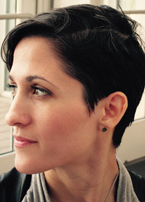
Daddy comes over on Thursdays. My husband and son are out watching movies where people blow each other up. They have burgers afterward and buf- falo wings and milkshakes and they talk about TV shows and girls and the latest bloody video game. At least that’s what I imagine they do. No way do they imagine what I am doing, sitting here at the kitchen table doing my math homework as Daddy microwaves the mac and cheese he brought over. We have three hours together and in these three hours I am twelve years old and my daddy is the most wonderful man in the world.
On craigslist I post the photo from my work website, the one with my hair scraped back in a ponytail, expos- ing my shiny forehead, my thin lips, my arms bursting from the sleeves of my blue blouse. Daughter seeks Father is all I write as a caption. In response I receive an avalanche of cell-phone numbers, chat invitations, and penis pics lifted from porn sites.
I delete all the emails except for Richard’s: Sweetheart, please call home. I sit for a moment hunched in my cubicle, sweating, before lifting the receiver and dialing his number.
Daddy? I whisper, hand up to cover my mouth so no one walking by can see it moving.
He doesn’t skip a beat. Sweetheart! he says. Did you see the photo? I ask.
Of course, he says.
I’m not better in person, I warn. You’re perfect, he assures me.
I’m married, I tell him. I have a kid. No problem, he insists.
I chew the inside of my cheek. There’s not going to be any sex, I say.
Absolutely not! he agrees.
I wait for him to say something creepy or disgusting, but he doesn’t. We make arrangements to meet at McDonald’s for dinner on Thursday.
Don’t kill me, I say, and he laughs.
Oh sweetheart, he says. What on earth?
I’m early. I don’t know what Daddy looks like and every time the door swings open my head jerks like a ball on a string. I convince myself I’m going to be stood up and that it will be better anyway if I am. But at seven on the dot he enters and he looks straight at me and waves.
Our usual, sweetheart? he says, loud enough for other people to hear, and I nod. He brings a tray of chicken nugget combos to my table. He kisses my cheek. The food steams in our hands as we look at each other; he seems about twenty, twenty-two, with chinos frayed at the bottoms and red hair and glasses and biceps as skinny as my wrist. Maybe someday he will be good- looking.
Extra barbecue sauce, just the way you like, he says, gesturing to my nuggets. I smile and take a bite. He asks me about school and I ask him about work and he is as interested in how I’m doing in gym class as I am in the stocks he’s trading at the office; we slip into our new roles as easily as knives into butter.
I almost forgot, he says. He reaches into the pocket of his jacket and pulls out a CD with a Christmas bow stuck on it. Just a little something, he adds, and hands it to me. I unstick the bow and turn the CD over in my hands: Britney Spears. I bounce, once, and my left butt cheek, which doesn’t quite fit on the plastic chair, bangs on the edge of the seat.
Oh Daddy, I say, touched because I k now he went into a store and asked what would be the right thing to get for his little girl, and he paid for it with his own money and put it in his pocket and found the gaudy bow to go with it and then brought it all the way here, to me, because he k new he would like me and already wanted to give me something, and this makes me want to give everything I have to him in return.
Apart from Thursday nights—and it’s always Thurs- days, always nights—we don’t communicate, except by email. Sometimes he’ll send me a note just to say, Have a great day!! or he’ll tell me what plans he has for dinner: Working late need a treat pizza sound good??? or he’ll hint at imagined happenings in my little-girl life: Don’t forget dentist today xoxoxoxo!! and Good luck on the history quiz I know you’ll do awesome!!!! I write back in equally breathless terms to report the results of the history quiz or the number of cavities rotting my teeth or to squeal over the impending pizza feast. These exchanges give me a high so intense my chest muscles spasm and when my boss calls and says to bring her such-and-such a document I hit print and out comes an email from Daddy, not the work document, and I giggle into my hand and hit print again.
He always arrives exactly fifteen minutes after my hus- band and son leave. I sit on the couch with the televi- sion on while he fumbles with the keys and the empty banged-up briefcase he always brings. Sweetheart! he says when he enters, and I yelp Daddy! and if I was maybe ten or twenty or, okay, thirty pounds lighter, I might run toward him, but as it is I wait on the couch for him to come over and k iss my hair. I’ll pour him a soda on the rocks and he’ll pour me some milk and we touch glasses and smile. If my husband calls I stand by the back door with my head down and say Uh-huh, yes, fine, all right, see you soon, no, nothing for me, thanks, I’m enjoying the leftovers, have fun, love you.
Excerpted from Heartbreaker by Maryse Meijer. Copyright © Maryse Meijer, 2016. Reprinted with permission of Farrar, Straus & Giroux. All rights reserved. No part of this excerpt may be reproduced or reprinted without permission in writing from the publisher.
Behold the Dreamers
By Imbolo Mbue
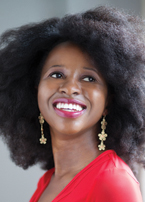
He’d never been asked to wear a suit to a job interview. Never been told to bring along a copy of his résumé. He hadn’t even owned a résumé until the previous week when he’d gone to the library on Thirty-fourth and Madison and a volunteer career counselor had written one for him, detailed his work history to suggest he was a man of grand accomplishments: farmer responsible for tilling land and growing healthy crops; street cleaner responsible for making sure the town of Limbe looked beautiful and pristine; dishwasher in Manhattan restaurant, in charge of ensuring patrons ate from clean and germ-free plates; livery cabdriver in the Bronx, responsible for taking passengers safely from place to place.
He’d never had to worry about whether his experience would be appropriate, whether his English would be perfect, whether he would succeed in coming across as intelligent enough. But today, dressed in the green double-breasted pinstripe suit he’d worn the day he entered America, his ability to impress a man he’d never met was all he could think about. Try as he might, he could do nothing but think about the questions he might be asked, the answers he would need to give, the way he would have to walk and talk and sit, the times he would need to speak or listen and nod, the things he would have to say or not say, the response he would need to give if asked about his legal status in the country. His throat went dry. His palms moistened. Unable to reach for his handkerchief in the packed downtown subway, he wiped both palms on his pants.
“Good morning, please,” he said to the security guard in the lobby when he arrived at Lehman Brothers. “My name is Jende Jonga. I am here for Mr. Edwards. Mr. Clark Edwards.”
The guard, goateed and freckled, asked for his ID, which he quickly pulled out of his brown bifold wallet. The man took it, examined it front and back, looked up at his face, looked down at his suit, smiled, and asked if he was trying to become a stockbroker or something.
Jende shook his head. “No,” he replied without smiling back. “A chauffeur.”
“Right on,” the guard said as he handed him a visitor pass. “Good luck with that.”
This time Jende smiled. “Thank you, my brother,” he said. “I really need all that good luck today.”
Alone in the elevator to the twenty-eighth floor, he inspected his fingernails (no dirt, thankfully). He adjusted his clip-on tie using the security mirror above his head; reexamined his teeth and found no visible remnants of the fried ripe plantains and beans he’d eaten for breakfast. He cleared his throat and wiped off whatever saliva had crusted on the sides of his lips. When the doors opened he straightened his shoulders and introduced himself to the receptionist, who, after responding with a nod and a display of extraordinarily white teeth, made a phone call and asked him to follow her. They walked through an open space where young men in blue shirts sat in cubicles with multiple screens, down a corridor, past another open space of cluttered cubicles and into a sunny office with a four-paneled glass window running from wall to wall and floor to ceiling, the thousand autumn-drenched trees and proud towers of Manhattan standing outside. For a second his mouth fell open, at the view outside—the likes of which he’d never seen—and the exquisiteness inside. There was a lounging section (black leather sofa, two black leather chairs, glass coffee table) to his right, an executive desk (oval, cherry, black leather reclining chair for the executive, two green leather armchairs for visitors) in the center, and a wall unit (cherry, glass doors, white folders in neat rows) to his left, in front of which Clark Edwards, in a dark suit, was standing and feeding sheets of paper into a pullout shredder.
“Please, sir, good morning,” Jende said, turning toward him and half-bowing.
“Have a seat,” Clark said without lifting his eyes from the shredder.
Jende hurried to the armchair on the left. He pulled a résumé from his folder and placed it in front of Clark’s seat, careful not to disturb the layers of white papers and Wall Street Journals strewn across the desk in a jumble. One of the Journal pages, peeking from beneath sheets of numbers and graphs, had the headline: “Whites’ Great Hope? Barack Obama and the Dream of a Color-blind America.” Jende leaned forward to read the story, fascinated as he was by the young ambitious senator, but immediately sat upright when he remembered where he was, why he was there, what was about to happen.
“Do you have any outstanding tickets you need to resolve?” Clark asked as he sat down.
“No, sir,” Jende replied.
“And you haven’t been in any serious accidents, right?”
“No, Mr. Edwards.”
Clark picked up the résumé from his desk, wrinkled and moist like the man whose history it held. His eyes remained on it for several seconds while Jende’s darted back and forth, from the Central Park treetops far beyond the window to the office walls lined with abstract paintings and portraits of white men wearing bow ties. He could feel beads of sweat rising out of his forehead.
“Well, Jende,” Clark said, putting the résumé down and leaning back in his chair. “Tell me about yourself.”
Excerpted from Behold the Dreamers by Imbolo Mbue. Copyright © 2016 by Imbolo Mbue. Reprinted with permission of Random House, a division of Penguin Random House LLC. All rights reserved. No part of this excerpt may be reproduced or reprinted without permission in writing from the publisher.
First Fiction 2016: Nine More Notable Debuts
As part of our sixteenth annual First Fiction roundup, in which five debut authors—Yaa Gyasi, Masande Ntshanga, Rumaan Alam, Maryse Meijer, and Imbolo Mbue—discuss their first books, we picked nine more notable debuts that fans of fiction should consider reading this summer.
Remarkable (BOA Editions, May) by Dinah Cox
Set primarily in Oklahoma, the remarkable (that’s right, remarkable) stories in Cox’s award-winning collection spotlight characters whose wit, resilience, and pathos are as vast as the Great Plains landscape they inhabit.
Anatomy of a Soldier (Knopf, May) by Harry Parker
A former officer in the British Army who lost his legs in Afghanistan in 2009, Parker delivers a riveting, provocative novel that captures his wartime experience in an unconventional way. Forty-five inanimate objects—including a helmet, boots, and weapons—act as narrators, together offering the reader a powerful new perspective on war.
Goodnight, Beautiful Women (Grove, June) by Anna Noyes
With language both sensuous and precise, these interconnected stories immerse us in the lives of women and girls in coastal Maine as they navigate familial intimacy, sexual awakening, and love’s indiscretions.
Grief Is the Thing With Feathers (Graywolf, June) by Max Porter
In the wake of his wife’s sudden death, a man is visited by Crow, a “sentimental bird” that settles into the man’s life and the lives of his children in an attempt to heal the wounded family. A nuanced meditation that not only breaks open the boundaries of what constitutes a novel, but also demonstrates through its fragmentary form the unique challenge of writing about grief.
A Hundred Thousand Worlds (Viking, June) by Bob Proehl
Valerie and her son embark on a road trip from New York to Los Angeles to reunite the nine-year-old with his estranged father, attending comic-book conventions along the way. Proehl weaves the comic-con worlds of monsters and superheroes into a complex family saga, a tribute to a mother’s love and the way we tell stories that shape our lives.
Lily and the Octopus (Simon & Schuster, June)
by Steven Rowley
Rowley’s novel centers on narrator Ted Flask and his aging companion—a dachshund named Lily—but readers who mistake this as a simple “boy and his dog” story are in for a profound and pleasant surprise. This powerful debut is a touching exploration of friendship and grief.
Pond (Riverhead Books, July)
by Claire-Louise Bennett
In this compelling, innovative debut, the interior reality of an unnamed narrator—a solitary young woman living on the outskirts of a small coastal village—is revealed through the details of everyday life, some rendered in long stretches of narrative and others in poetic fragments. Bennett’s unique portrait of a persona emerges with an intensity and vision not often seen, or felt, in a debut.
Champion of the World (Putnam, July) by Chad Dundas
Gangsters, bootlegging, and fixed competitions converge in the tumultuous world of 1920s American wrestling, which disgraced former lightweight champion Pepper Van Dean and his wife, Moira, must navigate in order to create the life they want. With crisp, muscular prose, this 470-page historical novel illuminates a time of rapid change in America.
Problems (Emily Books, July) by Jade Sharma
Raw, unrepentant, and biting with dark humor, Problems turns the addiction-redemption narrative inside out, as Sharma follows heroin hobbyist Maya through her increasingly chaotic life after the end of both her marriage and an affair.
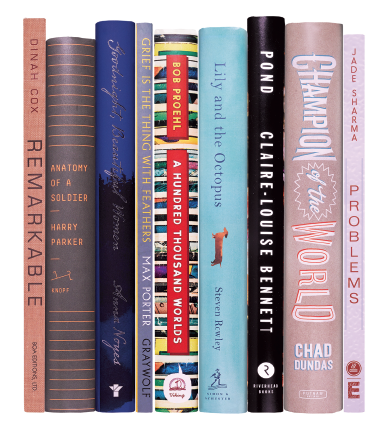
Ten Questions for Sarah McColl
This week’s installment of Ten Questions features Sarah McColl, whose memoir, Joy Enough, is out today from Liveright. “I loved my mother, and she died. Is that a story?” From the first sentences of her memoir, which Megan Stielstra calls “a stunningly beautiful and meditative map of loss,” McColl captures what it means to be a daughter. Through vivid memories, Joy Enough charts the dissolution of the author’s marriage alongside the impending loss of her mother, who is diagnosed with cancer. A book about love and grief, Joy Enough attempts to explain what people mean when they say, “You are just like your mother.” Sarah McColl was the founding editor in chief of Yahoo Food. A MacDowell fellow and Pushcart Prize nominee, her essays have appeared in the Paris Review, StoryQuarterly, McSweeney’s, and elsewhere. She holds an MFA from Sarah Lawrence and lives in Los Angeles.
1. How long did it take you to write Joy Enough?
For a long time I didn’t think I was writing a book. I thought I was writing essays, and then I was writing a thesis, and then I started thinking of it as my weird art project. I was so afraid to call it a book because I was afraid it wouldn’t be published, and then I would be a writer with an unpublished book in a drawer. Now I think at least one book in a drawer is a good thing. It means you’re doing the work. But I must have known there was something like a book there, whatever I called it, because I kept working on it, and I kept sending it out. That process of writing and revising took three years.
2. What was the most challenging thing about writing the book?
I didn’t know how to make memory conform to a narrative arc. There were discrete scenes and moments that were very vivid to me, but I struggled with how to connect one to another in some linear, continuous way. I remember expressing this frustration to one of my professors. She said, “Write the scene, hit return a few times, and keep going.” So that was my solution in the end. The return key.
3. Where, when, and how often do you write?
I participate with a group of writers in what we call “the 250s.” We have a shared Google doc with the days of the week marked out and a column for each writer. The goal is to write 250 words five days a week. The low word count is a mind trick to get you to sit down (it’s all about the mind tricks!) and then, hopefully, sail past 250 words. But if the writing is going badly, and you stop at 250, you still have some sense of accomplishment (again, mind trick). That’s the goal, mind you, and I do not consistently achieve this goal. Sometimes I walk around thinking about an essay for six months and then sit down and write a draft in one burst. I like the fuzzy, quiet quality of the mornings and the night. I have a small studio above the garage, but I also tend to write in bed a lot.
4. What was the most unexpected thing about the publication process?
I had no idea just how much buy-in a book requires. It’s not enough to have an agent champion a book and then for an editor to fall in love with it. The editor has to get everyone on board—sales, marketing, publicity. If your book finds a publisher, then it takes all those same people working on your behalf for a book to find its way in the world. Writing is such a solitary activity, but publishing is a completely different animal. I didn’t realize that at the outset. Sorry to get all “it takes a village,” but it really does, and I have pinched myself many times at how grateful I have felt in Liveright’s hands.
5. What are you reading right now?
I have a predictably overambitious new year’s resolution to read a book of poetry, a novel, a book of short stories, and a book of nonfiction each month. Right now I’m reading People Like You by Margaret Malone, which is dark and funny and sublime; Claire Fuller’s Bitter Orange, which feels marvelously escapist and lush and has been keeping me up too late; Sister Outsider by Audre Lorde, who needs no adjectives; and I’m anxiously awaiting Paige Ackerson-Kiely’s new book, Dolefully, a Rampart Stands.
6. Which author, in your opinion, deserves wider recognition?
Discovering and falling in love with an author is such a private activity. When you meet someone who loves the same writer you do, it becomes a kind of shorthand for a shared aesthetic or philosophical worldview. I nearly knocked over my wine glass with excitement when I met a woman who wanted to talk about Canadian author Elizabeth Smart as much as I did. That’s not wide recognition, but it’s a form of literary community, and that’s probably more lasting in the end.
7. Would you recommend writers pursue an MFA?
Getting my MFA was the best decision of my adult life, and I loved my program at Sarah Lawrence. I wanted to be able to teach at the college level, I knew what I wanted to work on, and I had some money saved to pay for part of it. But I think it depends what a writer is looking for in their creative life (structure, guidance, encouragement, time), the package offered by the school, and their long-term career goals. If you have the resources to devote two or three years to the world of language and ideas, I found it a powerful and blissful experience.
8. What is the biggest impediment to your writing life?
The mental space daily life demands. Buying a birthday present, calling the insurance company, grocery shopping, dishes, e-mail. This was captured so well in the comic The Mental Load, which focuses on parenthood but applies equally to keeping the lights on and the toilet paper replenished, if you ask me. This is why I love residencies. I honestly cannot believe how much more space I have in my brain when I am not thinking about how and what to feed myself three times a day.
9. What trait do you most value in agent?
I trust my agent, Grainne Fox, to always tell me the hard thing. That she does so with a soft touch and incomparable charm is proof she’s for me. I trust her implicitly, and we get on like a house on fire. That’s the foundation for any great relationship.
10. What’s the best piece of writing advice you’ve ever heard?
You must find pleasure in the work itself—doing the work. Otherwise, what’s the point?
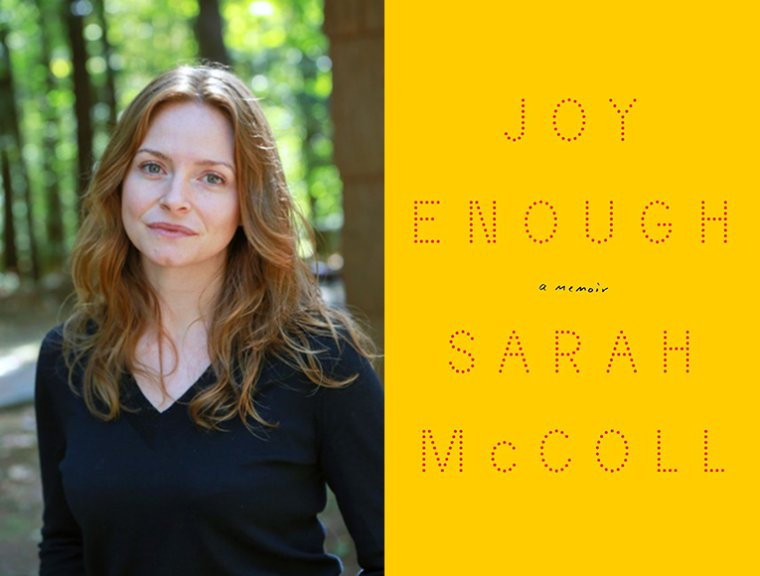
Sarah McColl, author of Joy Enough. (Credit: Joanna Eldredge Morrissey)
Ten Questions for Elisa Gabbert
This week’s installment of Ten Questions features Elisa Gabbert, whose essay collection The Word Pretty is just out from Black Ocean. Part of the press’s new Undercurrents series of literary nonfiction, the book combines personal essay, criticism, meditation, and craft to offer lyric and often humorous observations on a wide range of topics related to writing, reading, and life—from emojis and aphorisms to front matter, tangents, and Twitter. Gabbert is the author of the poetry collections The French Exit and L’Heure Bleue, or the Judy Poems; and a previous collection of essays, The Self Unstable. Her poems and essays have appeared in the New Yorker, the New York Times, A Public Space, the Paris Review, Guernica, and the Threepenny Review, among other publications, and she writes an advice column for writers, The Blunt Instrument, at Electric Literature. She lives in Denver.
1. Where, when, and how often do you write?
I just turned in a manuscript, another collection of essays, and the way I wrote that was very specific: For between one and three months, depending on my time constraints, I’d surround myself with, or submerse myself in, material on a topic—for example nuclear disasters, or “hysteria,” or memory—and read and watch films and think and take tons of notes. Then after a while the essay would start to take shape in my mind. I’d outline a structure, and then block off time to write it. As this process got systematized, I became more efficient; for the last essay I finished, I wrote most of it, about 5,000 words, in a single day. It was pretty much my ideal writing day: I got up relatively early on a Saturday morning and wrote until dark. Then I poured a drink and read over what I’d written. Of course I wouldn’t be able to do that if I didn’t give myself plenty of processing time. I can write 5,000 good words in a day, but I can only do that maybe once a month. I did most of the work for this book, the note-taking and the actual writing, sitting at the end of our dining room table. I try not to write at the same desk where I do my day job.
2. You write both poetry and prose; does your process differ for each form?
Yes. With prose, all I need is time to think and I can generate it pretty easily; a lot of my thoughts are already in prose. Poetry is harder. I feel like I have less material, and I can’t waste it, so it’s this delicate, concentrated operation not to screw it up. It feels like there’s some required resource I deplete. And I have to change my process entirely every three or four years if I’m going to write poems at all. Basically I come up with a form and then find a way to “translate” my thoughts into the form. It wasn’t always like that, but that’s the way it is now. I used to think in lines.
3. How long did it take you to write The Word Pretty?
I hadn’t set out to write a book, per se; I was just writing little essays until eventually they started to feel like a collection. But I think I wrote all of them between 2015 and 2017.
4. What has been the most surprising thing about the publication process?
I hope this doesn’t sound like faux humility, but I am surprised by the number of people who have bought it and read it already. I thought this was one for, like, eight to ten of my super-fans. We didn’t have a lot of time or money (read: any money) to promote it. What doesn’t surprise me is everyone commenting on how pretty it is. Black Ocean makes beautiful books.
5. What is one thing you’d change about the literary community and/or the publishing business?
One thing? I’d like to change a lot, but I wish both were less beholden to trends and the winner-take-all tendencies of hype and attention.
6. What are you reading right now?
I just finished reading Claudia Rankine’s Don’t Let Me Be Lonely cover to cover—I’d only read parts of it before—which got me thinking about the indirect, out-of-sequence nature of influence. My second book, The Self Unstable, looks the way it does (i.e. little chunks of essayistic, aphoristic, sometimes personal prose) in part because I’d just read a few collections of prose poetry I really liked. One was a chapbook by my friend Sam Starkweather, who was always talking about Don’t Let Me Be Lonely. This was years ago, before Claudia Rankine was a household name. I finally read the whole book and thought, “Oh! This was an influence on me!” Next I am planning to reread The Bell Jar, which I last read in high school, in preparation to write about the new Sylvia Plath story that is being published in January. I have an early copy of the story as a PDF, but I haven’t even opened the file yet. I’m terrified of it.
7. Which author, in your opinion, deserves wider recognition?
I didn’t invent Elizabeth Bowen but I just read her for the first time this year and she blew my mind. I’m always telling people to read this hilarious novella about Po Biz called Lucinella by Lore Segal, and Journey by Moonlight by Antal Szerb, one of the best novels I’ve ever read. Michael Joseph Walsh is a Korean American poet I love who doesn’t have a book yet. Also, some people will find this gauche, but my husband, John Cotter, writes beautiful essays that don’t get enough attention.
8. What is the biggest impediment to your writing life?
Not being independently wealthy, I guess? I have a job, so I can only work on writing stuff at night and on the weekends.
9. What’s one thing you hope to accomplish that you haven’t yet?
It would be nice to win some kind of major award—but that would really go against my brand, which is “I don’t win awards.”
10. What’s the best piece of writing advice you’ve ever heard?
The best writing advice is always “read stuff,” but you’ve heard that before, so here’s something more novel: My thesis advisor, a wonderful man named John Skoyles, once said in a workshop—I think he was repeating something he’d heard from another poet—that if a poem has the word “chocolate” in it, it should also have the word “disconsolate.” I took this advice literally at least once, but it also works as a metaphor: that is to say, a piece of writing should have internal resonances (which could occur at the level of the word or the phrase or the idea or even the implication) that work semantically like slant rhymes, parts that call back softly to other parts, that make a chime in your mind.
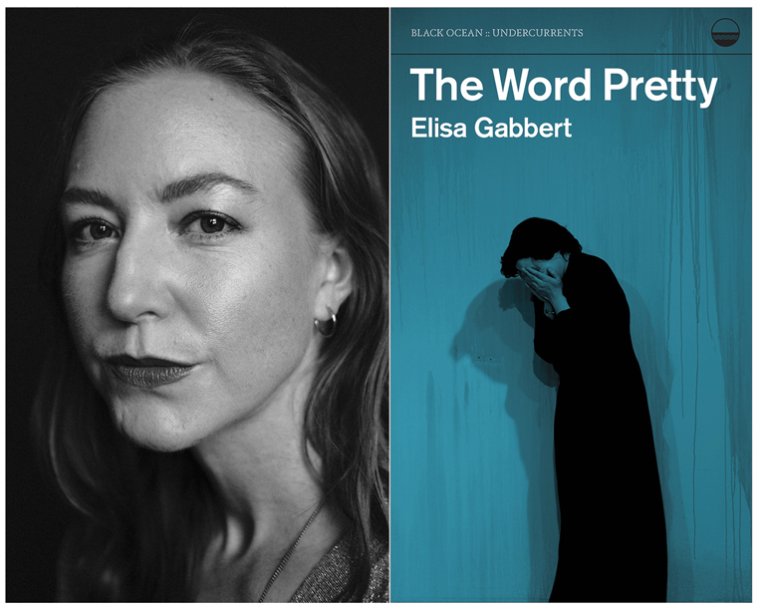
Elisa Gabbert, author of The Word Pretty. (Credit: Adalena Kavanagh)
Ten Questions for Guy Gunaratne
This week’s installment of Ten Questions features Guy Gunaratne, whose debut novel, In Our Mad and Furious City, is out today from MCD x FSG Originals. Inspired by the real-life murder of a British soldier at the hands of religious fanatics, Gunaratne’s novel explores class, racism, immigration, and the chaotic fringes of modern-day London. Longlisted for the 2018 Man Booker Prize and shortlisted for the Goldsmiths Prize and Gordon Burn Prize, In Our Mad and Furious City tells a story, Marlon James says, “so of this moment that you don’t even realize you’ve waited your whole life for it.” Gunaratne was born in London and has worked as a journalist and a documentary filmmaker covering human rights stories around the world. He divides his time between London and Malmö, Sweden.
1. Where, when, and how often do you write?
I write in my study, in Malmö. A large wooden desk, surrounded by books set where I left them. I write as much as I can, when I can. The most focused period tends to be early mornings, between 5 AM and 6 AM to 9 AM, and then in dribs and drabs throughout the day.
2. How long did it take you to write In Our Mad and Furious City?
The novel took about four years to write the initial manuscript and then another year with my editor. As someone who enjoys the solitary commitment of writing, I didn’t quite know what to expect in terms of collaborating on it. I’ve found the process to be rewarding and instructive.
3. What trait do you most value in an editor?
Patience, probably. And space. Once when working on In Our Mad and Furious City, my editor and I were working on a specific part of one character’s voice. She asked me to go away and think about a few specific things. She gave a list. “Just think,” she said. She gave me the time to simmer, which I think is important when making any significant change.
4. What was the most surprising thing about the publication process?
I try, sometimes with difficulty, not to be cynical about the relationship between art and industry. My hopefulness comes from knowing that there are usually enough dedicated people in any industry who are committed to doing good work. My surprise comes from finding out that I’d actually underestimated the amount of good people I’d meet during the process.
5. What is one thing you’d change about the literary community and/or the publishing business?
I think about this more as a reader than as a writer. I think we can all agree that homogeneity in any industry is unbearably boring. I’m interested in reading anything surprising, challenging, and provocative, in the best sense of the word. But I do wonder, at least with my experience thus far, how anything truly new, different, or challenging can ever come out of an industry that looks and acts so conservatively. There is still vitality here, and a desire to experiment with what gets published. The challenge is in encouraging those voices to keep on.
6. What are you reading right now?
I’m currently reading a nonfiction book called Rojava by Thomas Schmidinger, which is about the Kurds of Northern Syria. And I’ve finally got around to Samanta Schweblin’s Fever Dream.
7. Who is the most underrated author, in your opinion?
More people should be reading Machado de Assis and Nawal El Saadawi. But I think, more generally, people should be reading translated fiction. One of the beautiful things about the novel is its capacity to offer the reader a way to transgress beyond the parochial or familiar. It opens new territory to explore. At times it can even help confront learned biases that you wouldn’t have known were there. Many of my most surprising and enriching experiences have come from reading translated fiction.
8. What is the biggest impediment to your writing life?
Inevitably, there was always going to be a degree of friction because of the time I now commit to the public side of all this—the events, publicity, the travel. I think I underestimated how much all that would impact the other side, the writing side. Not to say I don’t like the public facing part. Engaging with readers, for example, I think is hugely rewarding. I find it a privilege, honestly. But I do find myself missing home quite a bit. I find that I need to have an extended period writing in once place in order to gather momentum. Sadly, I’ve been flitting back and forth, which doesn’t help.
9. What’s one thing you hope to accomplish that you haven’t yet?
I don’t have any external goals with my writing, not really. Right now I just want to write, publish, and keep writing. If I’m still writing novels in my sixties, it would mean that I would have attained something I had once thought impossible. Namely, a writer’s life.
10. What’s the best piece of writing advice you’ve ever heard?
I can’t remember who spoke about this, but there was something I heard early on which I get the sense has become more and more apparent as I continue to write. It’s simple really, it’s just that there is something about your own subconscious that is far more perceptive than whatever your conscious mind can conjure up. Being attentive to allowing that stuff to come through, to trust in allowing a degree of exploration as you write. This has become very important to me, and useful to know, too, any time I sit and stare at a blank page. You’ve got to get out of your own way.
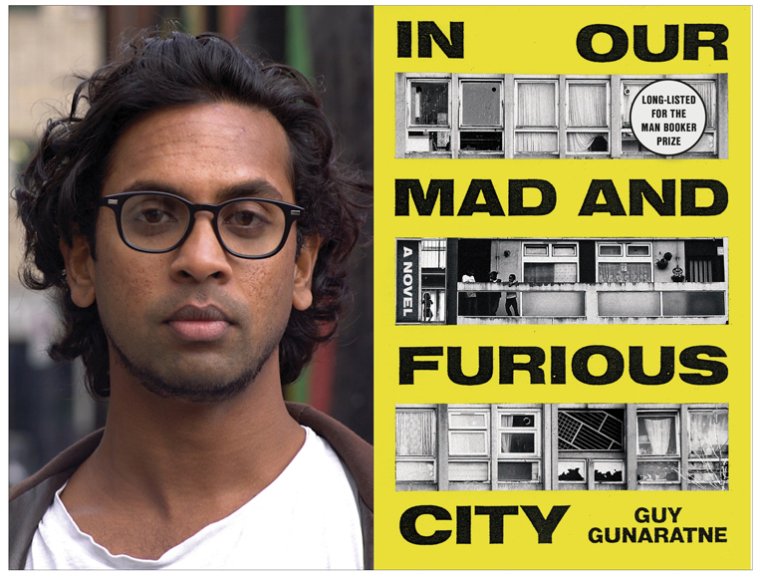
Guy Gunaratne, author of In Our Mad and Furious City. (Credit: Jai Stokes)
Ten Questions for Nuruddin Farah
This week’s installment of Ten Questions features Nuruddin Farah, whose new novel, North of Dawn, is out today from Riverhead Books. Inspired by true events, the novel follows a Somali couple living in Oslo, whose son becomes involved in jihadism in Somalia and eventually kills himself in a suicide attack. When the son’s wife and children move in with his parents in Oslo, the family finds itself confronted with questions of religion, extremism, xenophobia, displacement, and identity. Farah, who the New York Review of Books calls “the most important African novelist to emerge in the past twenty-five years,” is the author of four previous novels, most recently Hiding in Plain Sight (Riverhead, 2014), which have been translated into more than twenty languages and have won numerous awards, including the Neustadt International Prize for Literature. Born in Baidoa, Somalia, he currently lives in Cape Town.
1. Where, when, and how often do you write?
I write less and less when I am on the road, travelling, or in upstate New York, teaching. But when I am in Cape Town, where I reside for much of the year, I write daily for no less than six hours.
2. How long did it take you to write North of Dawn?
It took a lot of time—two years to do the research, and nearly a year and a half to whip the text into shape. I suppose that is the nature of research-based literary fiction.
3. What was the most surprising thing about the publication process?
That it takes up to a year or more for a book to be published after the author has submitted it.
4. What is one thing you’d change about the literary community and/or the publishing business?
It saddens me that the shelf life of literary fiction has been drastically reduced to a few months after publication, unless the said novel becomes a commercial success or is made into a movie or the author gains some notoriety.
5. What are you reading right now?
I am currently reading Kwame Anthony Appiah’s In My Father’s House, which is on the syllabus of a course about journalism and literature I am teaching at Bard College this semester.
6. Would you recommend that writers get an MFA?
Having never taken an MFA, I am in no position to speak to this.
7. What trait do you most value in an editor?
My favorite editors have been the editors who have shown me the weaknesses of the draft texts I submit and I am grateful to them when they do.
8. What is the biggest impediment to your writing life?
I have found traveling away from Cape Town, where I do much of my writing, has proven to be an impediment.
9. What’s one thing you hope to accomplish that you haven’t yet?
Taken as a whole, I am content with the body of work I’ve produced.
10. What’s the best piece of writing advice you’ve ever heard?
That no writing is good enough until you, as an author, make a small contribution, the size of a drop, into the ocean of the world’s literature.
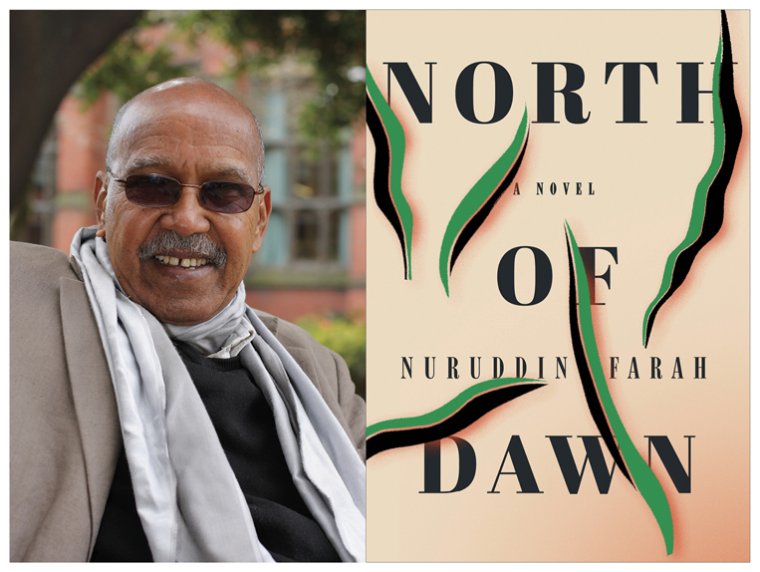
Nuruddin Farah, author of North of Dawn. (Credit: Jeffrey Wilson)
Ten Questions for Oyinkan Braithwaite
This week’s installment of Ten Questions features Oyinkan Braithwaite, whose debut novel, My Sister, the Serial Killer, is out today from Doubleday. A novel of violence and sibling rivalry, My Sister, the Serial Killer follows Ayoola, the murderer in the book’s title, and quiet, practical Korede, a nurse who cleans up her younger sister’s messes. (“I bet you didn’t know that bleach masks the smell of blood,” Korede says in the novel’s first pages.) The pair work reasonably well together until Ayoola sets her sights on a handsome doctor who has long been the object of Korede’s desire. In a starred review, Publishers Weekly called My Sister, the Serial Killer “as sharp as a knife…bitingly funny and brilliantly executed, with not a single word out of place.” A graduate of London’s Kingston University, where she earned a degree in creative writing and law, Braithwaite works as a freelance writer and editor in Lagos, Nigeria.
1. Where, when, and how often do you write?
Most of the time I type on my laptop, lying on my bed. Generally, I like to write when everyone is asleep and everywhere is quiet. But if I have to, I will write on my phone, standing up, in the middle of a party. I try to write every day. It is a fantastic practice, but not an easy one.
2. How long did it take you to write My Sister, the Serial Killer?
The entire writing and editing process took about seven months.
3. What was the most surprising thing about the publication process?
What has surprised me the most is how much takes place before a book is released. And how much of a book’s success is dependent on the publishers’ faith in the book. I have enjoyed far too much favour, warmth, encouragement and kindness from my agents and publishers, and from strangers—booksellers, book bloggers, etc.—people who do not know me, but are going out of their way to make sure that My Sister, the Serial Killer is a book that is read.
4. What is one thing you’d change about the literary community and/or the publishing business?
The publishing business is a business at the end of the day. The literary community, however, I believe could make a bit more of an effort to bring to the spotlight books that were well written and engaging but were, for all intents and purposes, unknown.
5. What are you reading right now?
We and Me by Saskia de Coster.
6. Who is the most underrated author, in your opinion?
It surprises me when I mention Robin Hobb’s name and people don’t immediately know who she is. Clearly, I don’t know the right people. The right people would know who Robin Hobb was. Also, her books should have a TV series, and/or a movie.
7. What trait do you most value in an editor?
Frankness. And perhaps kindness. I worked with two editors on this book—Margo from Doubleday and James from Atlantic Books—and it seemed to me that they were conscious of the potential difficulty of having two different views and stances; so they went out of their way to make the process smooth for me.
8. What is the biggest impediment to your writing life?
Social media! Social media is distracting and it invites too many voices into your head. The world is in the room with you and it can be difficult to stay true to yourself and to your creativity.
9. What’s one thing you hope to accomplish that you haven’t yet?
I would love to be involved in the writing and animating of a feature length animated movie. But I am still honing my skills, especially as far as animation goes; I am not very good yet!
10. What’s the best piece of writing advice you’ve ever heard?
“If I waited till I felt like writing , I’d never write at all.” —Ann Tyler. “Amateurs sit and wait for inspiration, the rest of us just get up and go to work.” I have learned that it isn’t wise to wait for inspiration; inspiration will meet me at my desk writing.
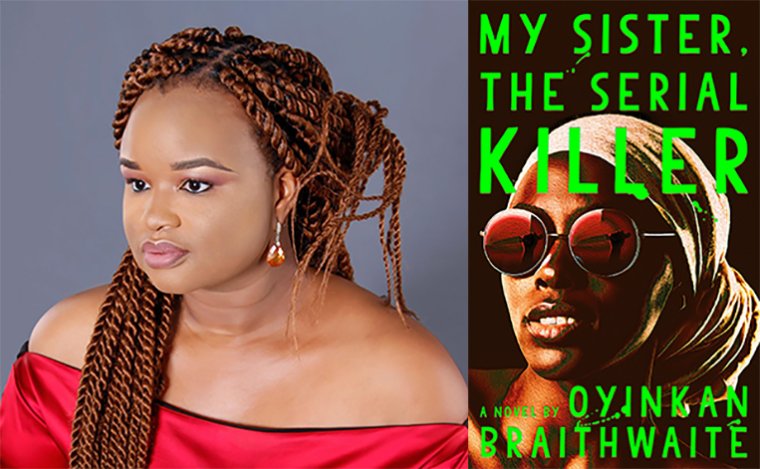
Oyinkan Braithwaite, author of My Sister, the Serial Killer. (Credit: Studio 24)
Ten Questions for Idra Novey
This week’s installment of Ten Questions features Idra Novey, whose new novel, Those Who Knew, is out today from Viking. Set in an unnamed island country, Those Who Know is the story of Lena, a college professor who knows all too well the secrets of a powerful senator whose young press secretary suddenly dies under mysterious circumstances. It is a novel about the cost of staying silent and the mixed rewards of speaking up in a divided country—a dramatic parable of power and silence and an uncanny portrait of a political leader befitting our times. Novey is the author of a previous novel, Ways to Disappear (Little, Brown, 2016), winner of the Brooklyn Eagles Prize and a finalist for the Los Angeles Times Book Prize for First Fiction, as well as two poetry collections: Exit, Civilian (University of Georgia Press, 2012) and The Next Country (Alice James Books, 2008). Her work has been translated into ten languages, and she has translated numerous authors from Spanish and Portuguese, most recently Clarice Lispector. She lives in Brooklyn, New York, with her family.
1. Where, when, and how often do you write?
I have the most clarity writing at home on the sofa in the early morning. Sometimes it is only one silent hour before everyone else in my apartment wakes up. On weekdays, if I’m not teaching and don’t have any other commitments, I try to get in another long stretch of writing after my children are off at school. Usually, I return to the same spot on the sofa and try to trick myself into focusing the way I did sitting in that same spot earlier in the morning.
2. How long did it take you to write Those Who Knew?
Four years. My earliest notes for the novel are from 2014 and I’ve written endless drafts of it since then.
3. What was the most surprising thing about the publication process?
I started this novel long before a man who bragged about groping women became president and the silencing of victims of sexual assault became an international conversation. It was startling to see the issues around power imbalances and assault I had been writing about every day suddenly all over the news, especially during the Kavanaugh hearing, when the patriarchal forces that protected Brett Kavanaugh mirrored so much of what occurs in Those Who Knew.
4. What is one thing you’d change about the literary community and/or the publishing business?
Translated authors are often relegated to a separate conversation in the United States. The number of translated authors reviewed and published in this country has steadily increased since I began translating fifteen years ago, but there remains an “America First” approach to how literature is discussed in this country, which is such a disservice to writing students and readers, especially now. To see how writers in other languages have written about deep divides in their countries can illuminate new ways to write and think about what is at stake in our country now.
5. What are you reading right now?
Rebecca Traister’s Good and Mad and alongside it The Tale of the Missing Man by Manzoor Ahtesham, translated by Ulrike Stark and Jason Grunebaum. I love juxtaposing reading at night from very different books and seeing what they might reveal about each other.
6. Who is the most underrated author, in your opinion?
Of the many I could name, Chilean writer Pedro Lemebel is among my favorites. He has an extraordinary novel available in English, The Tender Matador, translated by Katherine Silver. Every time I include The Tender Matador in a class, students end up clutching the book with both hands and commenting on how crazy it is that more readers don’t know about Lemebel.
7. What trait do you most value in an editor?
An openness to communication. I value so many of the strengths that my editor Laura Tisdel brought to Those Who Knew and also to my first novel, which she edited as well. But on a daily basis what I treasure most about our relationship is her willingness to talk through not only changes to the novel itself, but also the cover design, and all the decisions that come up while publishing a book.
8. What is the biggest impediment to your writing life?
Paralyzing doubt. I doubt every word of every sentence I put down. And when I manage to convince myself a sentence can stay for now, the next day when I reread it, I’m often overcome with doubt all over again about whether it’s necessary and whether what goes unsaid in the sentence has the right sort of tone and resonance.
9. What’s one thing you hope to accomplish that you haven’t yet?
To get through even half an hour of writing without feeling paralyzed with doubt would be a welcome experience in this lifetime.
10. What’s the best piece of writing advice you’ve ever heard?
A teacher once scribbled on a piece of writing I handed in, you should be optimistic. Optimistic about what? The note didn’t say, but that vague advice has stayed with me because it’s true: To sit down and write requires a degree of optimism. You have to trust that there is relief to be found in placing one word after another.
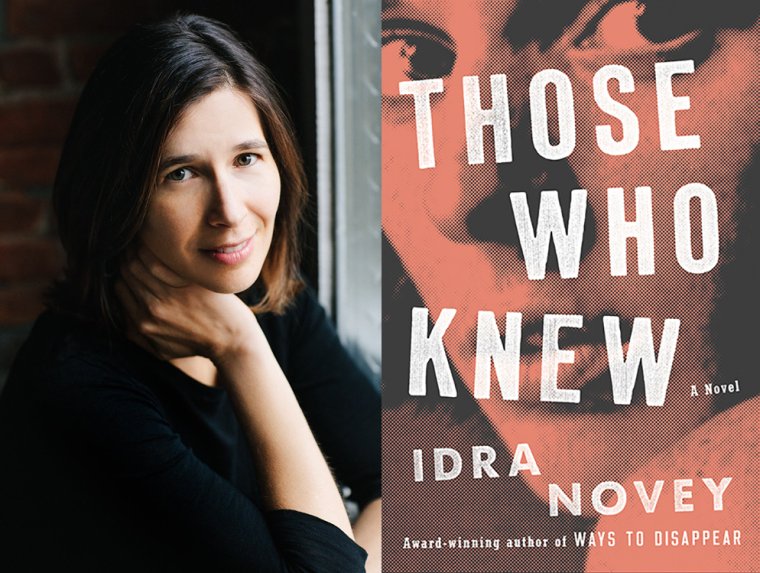
Idra Novey, author of Those Who Knew.
Ten Questions for Sherwin Bitsui
This week’s installment of Ten Questions features Sherwin Bitsui, whose new book of poetry, Dissolve, is out today from Copper Canyon Press. Bitsui was raised in White Cone, Arizona, on the Navajo Reservation, and Dissolve is imbued with Navajo history and tradition. The book is a long poem, an inventive and sweeping work that blurs the lines between past and present, urban and rural, landscape and waste, crisis and continuity, and leads readers on a dissonant and dreamlike journey through the American Southwest. Bitsui is the author of two previous poetry collections, including Shapeshift (University of Arizona Press, 2003) and Flood Song (Copper Canyon Press, 2009), which won the 2010 American Book Award in poetry. He lives in Arizona, where since 2013 he has served on the faculty of the Institute of American Indian Arts.
1. Where, when, and how often do you write?
I write best when I return from visiting my family on the reservation. The journey home feeds my creative process. I move between language, history, and worldviews—it’s always place between that gives me the most insight into my creative process.
2. How long did it take you to write Dissolve?
Dissolve took about seven years to complete. Most of those seven years I spent revising the poem. It was a challenge to harmonize all its layers and dimensions. I’m excited for people to read and experience this work.
3. What was the most surprising thing about the publication process?
The care and attention Copper Canyon Press gave to my creative process. They’ve been wonderful—and it’s not so much a surprise. I’m always grateful.
4. What is one thing you’d change about the literary community and/or the publishing business?
People should know more about the contributions Indigenous poets and writers have given to world poetry. There’s so much work out there, but many voices are seemingly still invisible to the general public. I would love for the literary world to stay open to all the poets from my community and not focus on only a few “representative” voices. It happens time and time again. Poets Heid Erdrich and Allison Hedge Coke have recently edited great anthologies that may give the larger public a glimpse of the diversity and range of contemporary Indigenous poetry.
5. What are you reading right now?
I’m reading poems by a few contemporary Chinese poets I’ve been asked to translate this week for a translation festival in China. This work is entirely new for me and I’m excited to learn more about poetry from this part of the world.
6. Who is the most underrated author, in your opinion?
There are people I like who deserve more attention—I wouldn’t call them “underrated,” they are incredible in their own right and will receive the attention they deserve. People should read more Indigenous writers. They are writing some of the most innovative and important work in contemporary literature.
7. What trait do you most value in an editor?
I value an editor’s ability to trust the poet. I’m fortunate to have great editors in who’ve been absolutely supportive of my poetic vision. I’ve never felt I had to compromise my artistic integrity. It’s a wonderful thing when one’s editor is also protective and supportive of one’s body of work and creative vision.
8. What is the biggest impediment to your writing life?
Social media.
9. What’s one thing you hope to accomplish that you haven’t yet?
I hope I continue to feel I can innovate upon previous creations. I want to blend all my poetic and visual work into a singular expression someday. I don’t know what this means. I’ll find out when I get there.
10. What’s the best piece of writing advice you’ve ever heard?
I’m grateful for the writers and artist who’ve advised me to maintain my creative and artistic integrity. My poems continue to reach new readers and I’m grateful they can trust that I will always want more from poetry than what is easily available and accessible. I want them to return to my books and feel they experience something new with each reading.
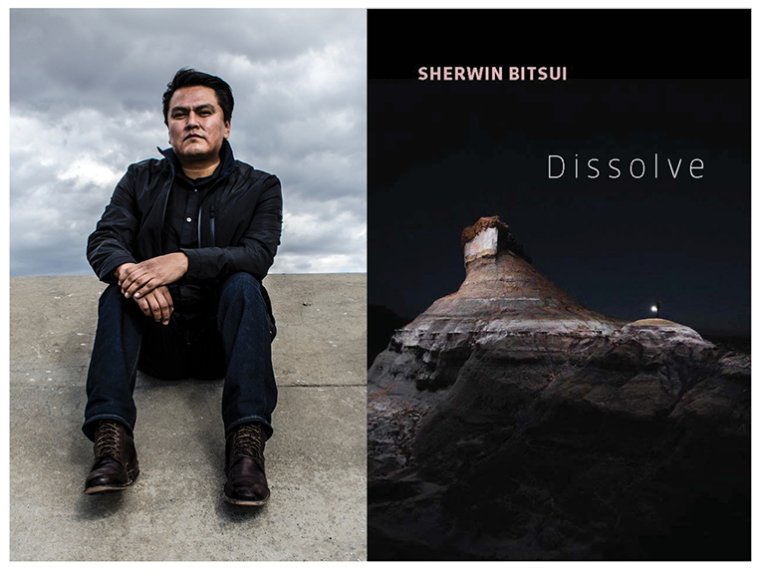
Sherwin Bitsui, author of Dissolve.
Road Trip: A Profile of Sherwin Bitsui
This isn’t really my landscape,” says Sherwin Bitsui as we head east on Interstate 10 through the Sonoran Desert. We’ve just left Tucson, and almost immediately the surroundings open up. No more southwestern tourist traps or neighborhoods heavy with generations of conflict among Mexicans, Native Americans, and whites. Around us, the mesquite and the cholla, with bursts of white spikes, grow in abundance along the highway. Aside from the road itself, the only other man-made objects in sight are the shrines—descansos in Spanish—commemorating tragic highway accidents.
While it may not be his preferred landscape, Bitsui has learned to appreciate it. “Especially with this sky, and when it rains,” he says.
Indeed, the land has just been blessed with rain for the first time in five months—half an inch in a matter of hours, which is rare for southern Arizona, where the average rainfall is twelve inches a year. The heavy downpour caused more than a few traffic mishaps in the city. Sirens blared as the drains flooded at every intersection. But past the city limits everything is calm: Large clouds hover over the Catalina Mountains and the Tucsons, and the land releases the soothing smell of wet earth.
It’s Bitsui who suggested conducting our interview while driving in a car. “It’s how I remember hearing stories when I was a child,” he says. “Riding in my father’s truck.”
And soon, Bitsui, whose second book of poetry, Flood Song, will be released this month by Copper Canyon Press, should be sitting back and enjoying the proverbial ride. Up to now, he’s been laboring over last-minute revisions and worrying a bit about how his work will be received. But Michael Wiegers, Copper Canyon’s executive editor, speaks with excitement and confidence when he characterizes Bitsui’s new book: “There’s a distinct music to Flood Song, an almost mournful high-desert mysticism at work among all the wonder and uncertainty he’s addressing. It’s an intensely visual book that jumps back and forth between the urban and the rural, the modern and the traditional, the personal and the tribal; its vision is sprawling and marvelously ambitious—the poem is in constant motion through landscape and time and cultures.”
The landscape that is Bitsui’s preference lies five hours to the north of Tucson, in the Navajo reservation where his family has lived “since time immemorial,” he says, tongue-in-cheek. “It’s difficult to convince people that my upbringing is not like the traumatic ones shown in books and documentaries about Native peoples,” Bitsui says. He points out a turkey vulture descending gracefully from above, and then launches into a story about having seen a caracara, also known as a Mexican eagle (“It’s really a falcon.”), for the first time. What amused him about it was that he spotted the bird in a parking lot, a place far removed from the romantic notions of land and nature that are so often imposed on his work by readers because he’s Native American.
“I have no control over how people perceive me. One time a white woman came to my reading and just cried in front of me,” he says. “She was reacting to my indigenousness, not my poetry, which isn’t even about reservation life.” There have been many other awkward exchanges: Once he was shown a picture of Geronimo and asked if he was related (“No. Geronimo is Apache.”), another time he was given tobacco. “What did that person think I was going to do, trade with it?” he asks, incredulously.
Bitsui shrugs these things off. At thirty-four, he’s more concerned about larger issues, like the fate of the next generation of Native Americans. He has been teaching writing workshops lately with ArtsReach, a Tucson-based program designed to provide Native American youth with avenues for creative expression. “The stories they tell,” Bitsui says sadly, shaking his head. “All violence and poverty.” Indeed, suicide among young Native American people has risen at an alarming rate over the last few years.
“I guess I’ve been fortunate,” he says. “I’m not a displaced Indian, my family lives on our land, and even though problems exist on my reservation, I had a happy upbringing compared with the ones these kids are dealing with.”
As it starts to drizzle again, the raindrops splattering on the windshield trigger his memories of monsoon season on the reservation. In the fall, the monsoons, with their heavy downpours and spectacular lightning shows, rejuvenate the landscape. “For some reason I also have this impression that up there the sun feels closer,” he says. “It must be the joy of being home, where the houses all face east and the taste of mutton always reminds me of the flavors of the land.” He ponders his words for a moment and then adds, “I suppose even I crave myth.”
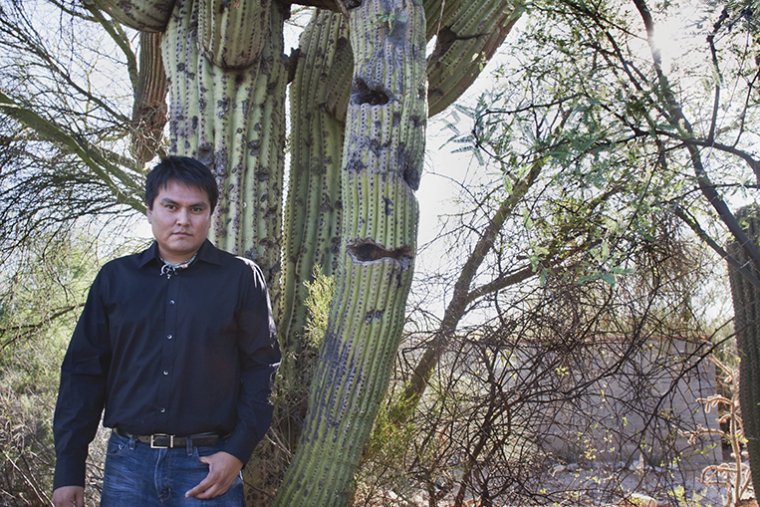
For Bitsui, the second of five children born to a carpenter and a teacher’s aide, living on the Navajo reservation meant the freedom to wander the land for hours, knowing he wasn’t trespassing. He would sit on the mesa for long stretches of time and meditate while listening to his Walkman. (His musical preference at the time was heavy metal. “It relaxed me,” he says, smiling.)
He was allergic to horses and to hay, so he didn’t become a ranch hand. Instead, he was introduced to the goat- and sheepherding life by his grandparents. It was hard work, but he enjoyed it and the company of his grandmother, especially during the summers, when he wasn’t getting bused to an elementary school outside of the reservation.
“School was the only thing I didn’t like while growing up,” he says. “It’s where I learned to become invisible among the white kids in order to survive.” He contrasts that tactic with the one most of the kids in the ArtsReach program resort to, which is to be loud and confrontational. “I guess neither one works,” he says.
For the past eight years, Tucson has been his home away from home, but adaptation was a shaky process. “When I first moved there,” he says, “it was my introduction to America. And it freaked me out.”
Bitsui initially left home in 1997, at the age of twenty-one, to attend the Institute for American Indian Arts (IAIA) in Santa Fe, New Mexico. “I loved it there,” he says. “We were from all sorts of tribes but we were all Indian, and aspiring artists.” Bitsui wanted to become a painter, to capture the colors and textures that had given him so much pleasure as a child. But he lacked the skill. “So I decided on the next best thing: poetry.”
This was an unusual choice for a boy who grew up in a place where the nearest library was over forty miles away. Books and writing were not completely absent on the reservation, just scarce. “There were many stories around,” says Bitsui. “These stories made me see into other worlds that no longer exist. Worlds that were made alive in the retelling.”
Under the tutelage of poet Arthur Sze, Bitsui found his voice. “I remember those first awful poems I wrote,” says Bitsui. “To this day I’m grateful to Arthur for being so patient, for believing in me.” The IAIA, however, didn’t fully prepare Bitsui for what a writing workshop would be like in a public university. With Sze’s encouragement, Bitsui applied for and was accepted to the prestigious writing program at the University of Arizona. He moved to Tucson in 2001, and when he arrived on campus, he had a flashback to his “invisible days” during his early education—feeling marginalized among the greater student population.
“I had a meltdown,” he says, refusing to elaborate, except to say that it was the first time he experienced culture shock. The faculty and students in the program were well meaning, but he rarely found workshops useful. His lyrical, elliptical style was neither personal nor anthropological; it resisted straightforward narrative and folkloric characterizations. Few readers understood what he was doing, and he began to feel claustrophobic in the often insular world of academia. “The communities writing programs promote are true gifts to poets and poetry,” he says. “But it was important for me to find poetry and attempt to define it on my own terms outside of venues where poetry is maintained.” So just as he was about to complete his MFA degree, Bitsui dropped out of the program.
“At the IAIA, I didn’t have to explain where I was coming from, let alone where I was headed to,” he says. But from the painful awareness of his otherness came a body of work that would form his first poetry collection.
University of Arizona Press acquisitions editor Patti Hartmann heard about Bitsui’s poetry from members of Native American literary circles, such as Ofelia Zepeda, a linguist, poet, and MacArthur fellow, who is also the editor of Sun Tracks, the press’s Native American literary series. Hartmann called Bitsui to ask if he had a manuscript. Although he hadn’t finished his MFA, he did have a manuscript completed, which he sent to Hartmann. After several revisions, she accepted the book for publication, and Shapeshift was published in 2003.
The first lines of Shapeshift—“Fourteen ninety-something, / something happened”—refer to the arrival of Columbus in America and the beginning of a major shift in Native American history, culture, and life. For Bitsui, the new millennium, a few years ago, marked a time to reflect on whether Native people were surviving and thriving or heading on a path toward extinction. And the poems in Shapeshift—a collection of mythical journeys, dream images, dead ends, and reservation realities—explore this subject.
“I also wanted to reclaim that word, shapeshift, which has a different connotation to us,” Bitsui says. “It doesn’t only signify physical transformation by power or magic; it also means spiritual or social transition into a new way of being.”
Reviewers received Shapeshift with both skepticism and excitement aroused by its stylistic risks. “Some people were baffled by the book because it did not work in a way that was palpable to certain trends in Native American poetics; others liked it because it was new and distinctive,” Bitsui says.
After the book’s release, Bitsui found himself drawn into the national poetry-reading circuit and onto the international stage. Besides traveling all over the country, he has been featured in the Fiftieth Esposizione Internazionale d’Arte at the Venice Biennial with the Indigenous Arts Action Alliance, and he’s been invited to Colombia to attend the International Poetry Festival of Medellín with Joy Harjo. Most recently he attended Poesiefestival Berlin, where he read alongside Rita Dove and John Yau.
“Every day’s a gift,” Bitsui says, pondering the opportunities he’s had. In 2006 he received news he’d won a prestigious forty-thousand-dollar Whiting Award. At the time, though, he was in the middle of writing an elegy for his cousin. Because his family was grieving, he didn’t want to encroach on their grief with his news, and neither did he understand the magnitude of the prize until he was sitting on the stage in New York City, listening to his work being praised.
When he returned, having made the trip alone, he attempted to describe for his grandmother this place he had visited, where crowds flowed through the streets and the buildings reached high into the sky. “Oh, you went to New York City,” she responded. Bitsui chuckles at the recollection.
![]()
As the new face of Native American literature, Bitsui takes his responsibility seriously, which is why he doesn’t turn down any offers to travel or read poetry or be interviewed. “Though I hope I’m not the only one being asked,” he says. He names two of his contemporaries, poets Santee Frazier and Orlando White, who released books earlier this year. Frazier published Dark Thirty with the University of Arizona Press, and White released Bone Light with Red Hen Press.
“I’m excited that there’s a new group out there, but I worry about what’s expected of us,” Bitsui says. He admits that one thing he’s been disappointed by in many of his presentations is the comparisons that audience members will make between him and the Native American superstar, Sherman Alexie.
“Sherman’s charismatic and funny,” Bitsui observes, “but there’s only one Sherman. The rest of us should be allowed to be who we are.”
![]()
When we finally arrive in Bisbee, it’s painfully obvious what happens when a place attempts not to change. This old copper-mining town tries to remain the same in order to cultivate tourism. The old brothel is now a hotel decorated to resemble a brothel, and the saloon’s decor includes stuffed javelina heads and hunting rifles. Most of the residents of Bisbee are white, as are the visitors. The original buildings along the main street now house expensive art galleries.
We take a walk to a copper mine, the entrance fenced to prevent tourists from leaning over the edge. “They say that one time water pooled at the bottom,” says Bitsui, “and that a flock of Canadian geese flying overhead detected it and swooped down for a drink. The water was toxic, poisoned. And the next day, the bottom of this mine glowed fluorescent white with the dead pile of birds.”
And as if on cue, it begins to rain again. “Perhaps that’s why I gave my second book that title,” Bitsui says. “The poem is a song that floods, ebbs, and is searching for a name. I feel that it’s a body of work that speaks a third language, combining Navajo sensibilities with English linearity.”
This poetic hybrid is also what attracted Wiegers to Bitusi’s work. “That was another word-of-mouth phone call,” Bitsui says of how Wiegers first contacted him. “I met Michael briefly at an Association of Writers & Writing Programs conference. I was introduced to him by Matthew Shenoda, the Coptic poet. And Michael eventually called me up out of the blue to ask if I had a second manuscript.”
Wiegers wanted to hear Bitsui off the page, so in 2007 he accepted an invitation to the Bread Loaf Writers’ Conference, where Bitsui was a fellow that year. “I arrived at the conference the day after he read,” Wiegers recalls, “so I pulled him aside and asked him to read a poem to me. We walked down to the pond, where I sat on a big rock while he told me nearly the entirety of the new manuscript, which was still in development. I was impressed, to say the least. I suggested to him that when he finished and was looking to publish the book, he’d have a ready ear in me.”
As we take cover in the local coffee shop, a musician starts to set up his equipment. We are determined to make it to the saloon to have a beer once the rain stops.
“With Flood Song I wanted to go back to my beginning as an aspiring painter,” Bitsui says. “I think of many of those poems as portraits with their own elliptical stories to tell.”
Bitsui says that his ideal readers are visual artists, who discover something of their techniques in his writing style. But he confesses that even his family members are puzzled by his poetry. “They’re waiting for me to write a poem they can understand,” he says, laughing.
In the meantime, Bitsui will continue to live in Tucson, where he has been most productive in his writing. And while he’s scratching out a living as a visiting poet in various tribal schools in the area, he’s also moving forward with other projects. He has decided to return to the University of Arizona to complete his MFA and to finish a screenplay he’s been struggling with since he received a fellowship last year from the Sundance Native Initiative to adapt one of his stories for film. Bitsui doesn’t consider himself a short story writer, but as a descendant of storytellers, he couldn’t refuse the opportunity. The Sundance programmer, N. Bird Runningwater, has been patiently waiting for Bitsui to turn in the script. “It’s not poetry, though, which is hard enough,” Bitsui says.
The beer at the saloon (more like a movie set) is anticlimactic, so after one drink we head back to Tucson, making a brief stop in Tombstone, home of the O.K. Corral. It’s Wyatt Earp Days in the town, and the locals are capitalizing on the occasion with a street fair selling cheap Native American jewelry and charging for a chance to ride in a covered wagon, old Wild West style.
“I once brought my grandmother here,” Bitsui says. “And I remembered her stories about riding in a wagon in the old days, so I asked her if she wanted to relive that memory by taking a wagon ride. She said, ‘Been there, done that. It’s not a very fun ride.’”
We find our way back to I-10, going west this time, riding off into what will become the sunset. It’s been a pleasure being on the road, talking story. But all good things must come to an end. Bitsui needs to return the car by sundown. It’s a rental.
Rigoberto González is a contributing editor of Poets & Writers Magazine.
(Photos by Jackie Alpers.)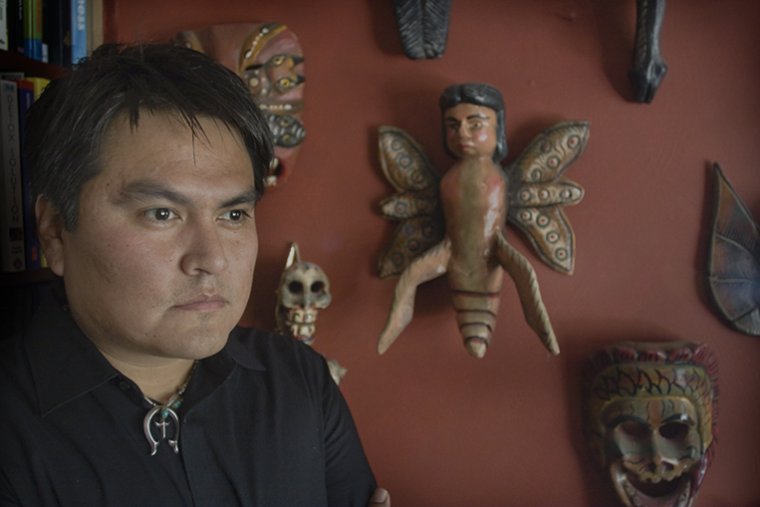
Ten Questions for Grady Chambers
This week’s installment of Ten Questions features Grady Chambers, whose debut poetry collection, North American Stadiums, was published this month by Milkweed Editions. The winner of the inaugural Max Ritvo Poetry Prize, the collection serves as a map to some of America’s more overlooked places of industry, specifically within the Midwest and central New York—places “bleached / pale by time and weather”—and as an exploration of the grace we might find in such spaces. Born and raised in Chicago, Chambers received an MFA from Syracuse University, was a Wallace Stegner Fellow at Stanford University, and has received fellowships from the Norman Mailer Center and the New York State Summer Writers Institute. His poems have appeared in Adroit Journal; Forklift, Ohio; Nashville Review; Ninth Letter; New Ohio Review; and elsewhere. He lives in Philadelphia.
1. Where, when, and how often do you write?
My routine seems to change every year or two, but for the past six months or so my tendency has been to write once a week, typically on Sundays, in a block of hours beginning around eight or nine in the morning and ending in the early afternoon, and most often at a coffee shop not far from my apartment.
2. How long did it take you to write North American Stadiums?
About six years, I think. The last poem in the book is the oldest, and I wrote the first draft of that poem on Memorial Day, 2012. It’s an interesting question because unlike someone setting out to write a novel, there was no real destination in mind. I didn’t (and probably this is true of writers of most books of poetry) set out to write North American Stadiums as such. The poems that comprise it are simply a curated selection from a much broader collection of writing that began in 2011 or so, when I began to be more strict with myself about making time to write. That the book contains the poems it does seems largely a result of my preferences and inclinations around the time I began thinking I should try and shape that growing stack of poems into a book. That was actually the scariest part in making this come together: the endless possible permutations of inclusion, exclusion, order; the fear of endless possibility.
3. What has been the most surprising thing about the publication process?
Probably the way it forces a different relationship to one’s manuscript and writing. By the time I was copyediting the book for the third or fourth time I was so wholly attentive to formatting, spelling, margins—all the aesthetics of language on a page—that I didn’t even feel like I was reading the poems anymore. Thanks to the awesome people at Milkweed Editions I had the unusual opportunity to create an audiobook version of the manuscript, and as I was traveling to the sound studio I was hit with a sudden fearful sense that I’d forgotten the sound and rhythm of the poems because I’d been so wrapped up in the copyediting. But that experience of doing the recording proved to be a great one: sitting down and reading it into a microphone, it was the first time that I was just able to simply read the book without looking at it through the lens of an editor. At that late stage, the book was in its final form, and all I had to do was read what was there. In doing so I felt again the rhythm and pacing and speed (or slowness) of the poems, not their marks and margins and format.
4. Where did you first get published?
The first piece of “creative writing” I wrote that actually ended up being bound between two covers were a few poems written as part of a high school English class. As I remember it, part of the final assignment for the class was for us to collectively make and bind a book (and of course produce the writing it contained). I’m fairly sure I used a phrase along the lines of, “from the lens of my itinerant being,” and it still makes me cringe to think about.
5. What are you reading right now?
I just finished Kawabata’s last and unfinished novel, Dandelions, and have been reading around in Turgenev’s great Sketches from a Hunter’s Notebook (though the title is sometimes translated differently) and Robin Becker’s wonderful new collection of poems, The Black Bear Inside Me.
6. If you were stuck on a desert island, which book would you want with you?
I can already envision this answer producing audible groans in some readers of this interview, but in all honesty I’d probably bring Moby Dick. I love the music of so much of that book, the rhythmic and sonic propulsion of Melville’s sentences, the astounding and way-ahead-of-its-time structure of his novel; and I think the book is deeply funny. I’ve mentioned how funny I find the book to a number of people, and that comment is usually met with a perplexed look, but I think there is great humor in the narrative distance between writer Melville and narrator Ishmael. Ishmael is, to me, a narrator who is totally over the top, and doesn’t have the self-awareness to recognize that quality in himself. But Melville certainly knew it, and I can imagine him laughing as he wrote some of Ishmael’s more grandiose meditations.
7. Who is the most underrated author, in your opinion?
I find it hard to say because I feel I have such a limited sense of how authors are perceived or rated by others. But a few collections that I think are amazing but that are maybe under-read—or at least don’t seem to be read much among writers my age—are David Ferry’s incredible book, Bewilderment, Ellen Bryant Voigt’s collection of sonnets, Kyrie, and Adrian C. Louis’s Ceremonies of the Damned. I don’t think these writers are underrated, but with so much out there and with this increasing thirst, it seems, for what’s new or what’s next, these are three books that come quickly to mind that are very worth returning to, each one remarkable in its own way.
8. What is the biggest impediment to your writing life?
I sleep very poorly, and that can sometimes really knock my days off course. That said, sleeplessness has also been beneficial to my writing life as, like it or not, my mind seems to be receptive to degrees of fear or strangeness or anxiety in those sleepless hours that come back in sometimes productive or interesting ways when I write.
9. What trait do you most value in your editor?
I’m not sure I have the perfect phrase for it, but something along the lines of “generative inquiry.” What I have in mind is a tendency on the part of a reader, when talking about a certain piece, to press on certain sections of the poem, to push me about the intent or meaning of a certain sequence. In doing so, they communicate their understanding of the poem and I am able to weigh it against my intention. This helps give me a sense of which sections or sequences feel flat or outside the orbit of images and ideas that the poem is working through and forces me to verbalize, and then try and put into words on the page, a sometimes originally cloudy intent.
10. What’s the best piece of writing advice you’ve ever heard?
It’s not quite advice, but the most important thing someone has said to me about writing, the thing that has had a tangible impact on my work, is what my friend Charif Shanahan (his collection Into Each Room We Enter Without Knowing is so good) said during a workshop a couple years ago. He asked the room, “What aren’t you writing about, and why?” Though maybe to some it seems a fairly obvious thing to ask oneself, it had a pretty significant impact on me. It helped me think about and re-examine the ways I defined myself as a writer, and encouraged me to look directly at, and at least attempt to write about, things that daily occupied my mind but for various reasons I previously had overlooked, shied away from, or not thought to write about.
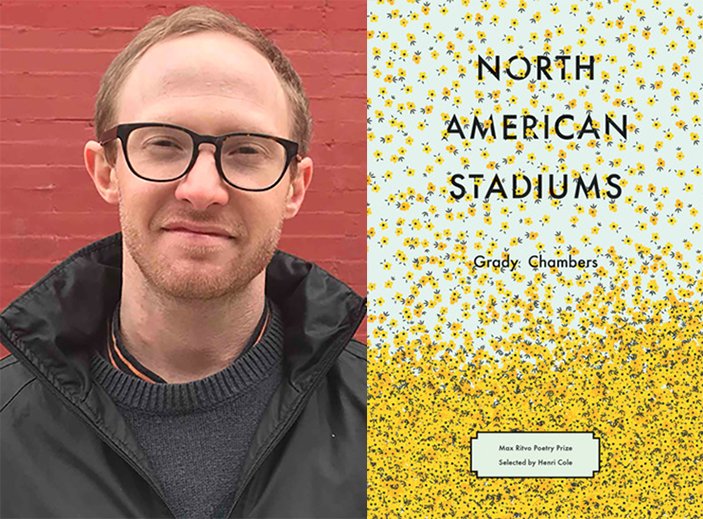
Grady Chambers, author of North American Stadiums.
Ten Questions for A. M. Homes
This week’s installment of Ten Questions features A. M. Homes, whose story collection Days of Awe, published today by Viking, “exposes the heart of an uneasy America…exploring our attachments to one another through characters who aren’t quite who they hoped to become, though there is no one else they can be.” Homes is the author of the memoir The Mistress’s Daughter and the novels This Book Will Save Your Life, Music for Torching, The End of Alice, In a Country of Mothers, and Jack, as well as the story collections The Safety of Objects and Things You Should Know. She lives in New York City.
1. How long did it take you to write the stories in Days of Awe?
The stories in this collection took twelve years—stories accrue over time. I don’t sit down to write a collection of stories. I have ideas for them that can take years to form and there is a compression to storytelling, the sense that the story is already in progress by the time the reader comes to it—which means that I, like, know what it’s all about before diving in.
And there’s also an editorial/curating process—we build the collection—so once I have six to eight stories I like, I start to think about the balance, of voices within the stories, about narrative threads, ideas that appear in multiple stories—and sometimes we put a few stories aside and I write one or two more. There’s a moment when you know it’s getting close—which is very exciting. For me that was last summer. I was in Oxford, England, and knew I had two stories to finish: “Days of Awe,” the title story, which I’d literally been carrying with me for almost ten years, and “The National Caged Bird Show,” which had been with me for almost two years. Finishing those was thrilling and they’re two of my favorites in the book.
2. Where, when, and how often do you write?
In a perfect world I write daily, starting at about 6 AM. I wake up early, I go into my office and start writing. And then around 1 PM I join the rest of the world.
But as we know it’s not a perfect world, so I often have to fight to carve out work time—a writer’s calendar should be empty—but when most of us look at an empty calendar we think, “Great time to make a dentist appointment.” So it’s a struggle, learning to say no to things.
3. What was the most surprising thing about the publication process?
How long it takes. The lead time is about a year.
4. Where did you first get published?
My first publications were in Folio, a student publication at American University, and the Sarah Lawrence Review and then On Our Backs, the first women-run erotica magazine, founded in 1984. They published a story of mine called “72 Hours on a Towel.”
5. What are you reading right now?
Red Notice: A True Story of High Finance, Murder, and One Man’s Fight for Justice by Bill Browder and The Largesse of the Sea Maiden by Denis Johnson. And I love reading history, I love biography. I’m a huge nonfiction fan.
6. If you were stuck on a desert island, which book would you want with you?
Kelly’s Textbook of Internal Medicine. I’m practical and I have a good enough imagination to otherwise entertain myself.
7. Who is the most underrated author, in your opinion?
Joyce Carol Oates.
8. What is the biggest impediment to your writing life?
Time.
9. What trait do you most value in your editor or agent?
Honesty and a sharp red pencil.
10. What’s the best piece of writing advice you’ve ever heard?
Write the truth according to the character—from Grace Paley, who was my teacher at Sarah Lawrence College.
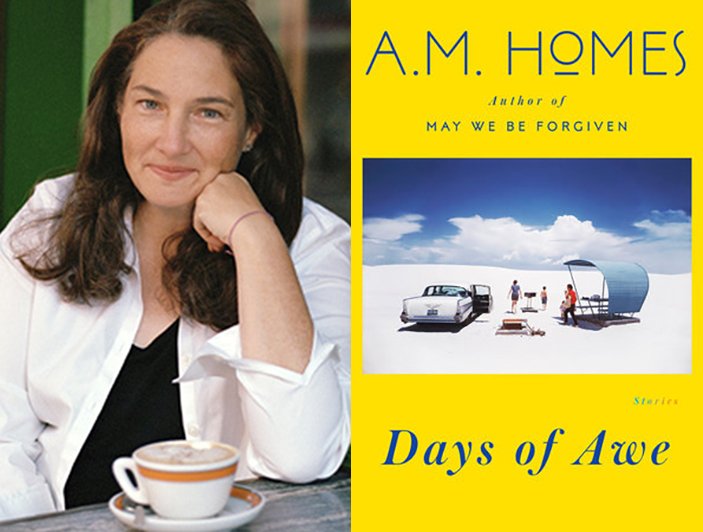
A. M. Homes, author of Days of Awe (Viking).
Ten Questions for Akil Kumarasamy
This week’s installment of Ten Questions features debut author Akil Kumarasamy, whose collection of linked stories, Half Gods, published today by Farrar, Straus and Giroux, “portrays with sharp clarity the ways in which parents, children, and friends act as unknowing mirrors to each other, revealing in their all-too-human weaknesses, hopes, and sorrows a connection to the divine.” Kumarasamy’s fiction has appeared in Harper’s Magazine, American Short Fiction, Boston Review, and elsewhere. She received her MFA from the University of Michigan, and has been a fiction fellow at the Fine Arts Work Center in Provincetown and the University of East Anglia.
1. Where, when, and how often do you write?
I usually write at home or at a café, but I’m pretty open to working anywhere. I don’t necessarily write every day; sometimes I just let an idea sit for a while, seep in my head. I might write ferociously for a week and then have a period where I don’t write at all. Maybe it’s a kind of mental crop rotation, giving the mind time to rest before the next creative burst. For Half Gods, I often wrote at night. I liked working while everyone else was sleeping. I think it made the act feel secretive, like I was tapping into some unknown frequency. Now I’m trying to write in the mornings. It feels more responsible.
2. How long did it take you to write Half Gods?
It took a few years of actual writing, but the earliest portion of the book was written in 2010.
3. What was the most surprising thing about the publication process?
How long the process takes! From selling the manuscript to the actual publication, it takes around a year and half. I’ve been working on a second book and feel pretty involved it, so it’s interesting now having to discuss Half Gods, which to me feels like a different version of myself.
4. Would you recommend writers pursue an MFA?
It definitely depends on what you’re looking for. There are many paths toward publication and getting an MFA is just one of them. It can possibly offer the time to fine-tune one’s craft, financial flexibility, and community.
5. What are you reading right now?
I’m reading Elena Ferrante’s My Brilliant Friend and Catherine Lacey’s Certain American States, which is out in August. It’s amazing.
6. If you were stuck on a desert island, which book would you want with you?
I would want a book on how to appreciate and thrive on a desert island while you are away from humanity and the appendix should have the directions on how to build a canoe when you/if you want to reconnect with the rest of the world. In other words, maybe some Chekov.
7. Who is the most underrated author, in your opinion?
Well think about how many wonderful books don’t get translated into English. The English language is currency.
8. What is the biggest impediment to your writing life?
It’s probably myself. What I think is possible.
9. What trait do you most value in your editor or agent?
Their unwavering belief in me. It feels extraordinary.
10. What’s the best piece of writing advice you’ve ever heard?
There’s no such thing as writer’s block. Sometimes you go to the computer and nothing valuable comes out and that’s okay. It’s all about how you see the writing process. You don’t need to call it writer’s block and you don’t need to feel guilty when you’re not sitting by the computer. The work requires so much of you that if the guilt doesn’t make you more productive, then the feeling is not worth it. You always have a choice in how you are going to perceive something.
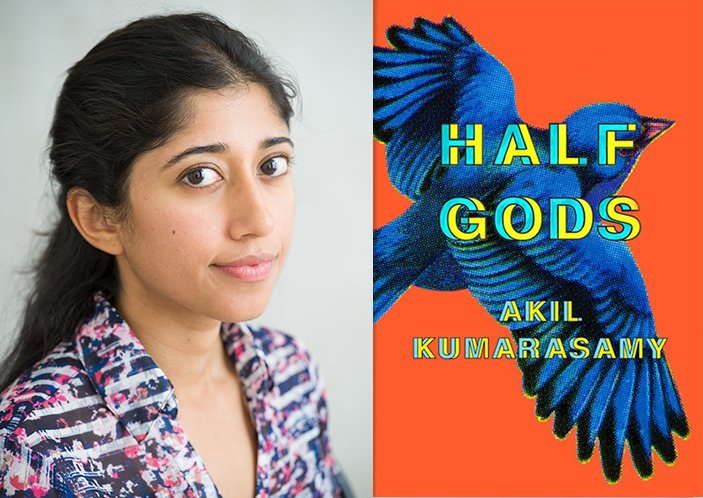
Akil Kumarasamy, author of Half Gods (Farrar, Straus and Giroux).
Ten Questions for Lee Martin
This week’s installment of Ten Questions features Lee Martin, whose new book, The Mutual UFO Network, published today by Dzanc Books, “explores the intricacies of relationships and the possibility for redemption in even the most complex misfits and loners.” It is his first story collection since his acclaimed debut, The Least You Need to Know, was published by Sarabande Books in 1996. Martin is also the author of three memoirs as well as the novels Quakertown (Penguin, 2001); The Bright Forever (Shaye Areheart, 2005), a finalist for the Pulitzer Prize in Fiction; River of Heaven (Shaye Areheart, 2008); Break the Skin (Crown, 2011); and Late One Night (Dzanc, 2015). He teaches in the MFA program at Ohio State University.
1. How long did it take you to write The Mutual UFO Network?
The earliest story in this collection was published in 1997, and the last one appeared in 2014. In the time since my first collection came out in 1996, I’ve published five novels, three memoirs, and a craft book, but I’ve also kept writing stories. There were times in that gap between 1996 and now when we could have tried to bring out a new collection, but I’m glad we waited until the book was truly a book rather than merely a random gathering of stories.
2. Where, when, and how often do you write?
I’m a morning writer, and I normally work in my writing room at home, sometimes with my senior editor, Stella the Cat, on my lap. She has claws, and she holds me to task. Lately, though, I’ve discovered another writing space. My wife works remotely for a hospital in our home area of southeastern Illinois. She has to be onsite four days out of each month, and, when I can, I go with her. I end up writing in the small public library I used when I was in high school. It pleases me to know I’m writing in a place where I once read so many other people’s books and dreamed of one day having a book of my own. Sometimes people stop by and tell me stories, and sometimes I use them. I try to write at least five days a week. I used to write every day, but, as I’ve gotten older, I’ve become more comfortable with rest and the way it can re-energize me. For the most part, we writers are introverts, and it can become easy to withdraw from the world. I’m lucky enough to be married to an extrovert, and the weekend is now our time to engage with life outside the writing space.
3. What was the most surprising thing about the publication process?
That I ever got published at all! Seriously, when I was starting out, I gathered so many rejections, I started to believe that door would never open for me. I couldn’t stop writing, though. It’s what gave me pleasure, and I knew even if I never got published, I’d still love moving words around on the page. That’s why I tell my students to keep doing what they love as long as they love it. As I began to publish books, I learned so much about the part of the process that doesn’t involve writing or editing. I’m talking about the behind-the-scenes work of publicity and marketing. Everything from how the sales reps work to cover design. I’m still amazed by the decisions that get made that can make or break a book before it even hits the shelves.
4. Where did you first get published?
I published my first story in 1987 in the literary journal Sonora Review. My first collection, The Least You Need to Know, was the first winner of the Mary McCarthy Prize from Sarabande Books, and it came out in 1996.
5. What are you reading right now?
I just finished a fascinating memoir by David Giffels called Furnishing Eternity. It’s about the author’s desire to build his own casket even though he has no immediate need for it. His aged father, an accomplished woodworker, sets out to help him. That’s the narrative spine, but the book is about so much more. With wit and warmth, Giffels explores aging and death and family and friendship. It’s a beautifully written book with not a trace of sentimentality.
6. If you were stuck on a desert island, which book would you want with you?
In our family room, there’s a length of an old door casing that my wife and I rescued from the debris of the farmhouse where my family lived when I was young. My wife turned it into this shelf, and we put old family photos and mementos on it. My mother was a teacher, and one of the things she left behind was the school bell she rang at the old country schools where she once taught. That bell sits on top of two books, To Kill a Mockingbird and The Great Gatsby. If I had to choose one to have with me on that desert island, it would probably be Gatsby. I reread it each year with continued admiration. I guess I’m a romantic at heart. The story of Daisy and Gatsby gets me every time.
7. Who is the most underrated author, in your opinion?
I’ve had the privilege of knowing a number of writers who would fall into that category. I’ve met them through their books, and sometimes I’ve been lucky enough to know them personally and to be able to call them my friends. I’m not trying to avoid the question. I’m only honestly stating the fact. I imagine there are literally thousands of writers who should be appreciated more than they are. These writers are doing work just as memorable and just as necessary as the big-name folks, but for whatever reason they haven’t broken out the way their more famous counterparts have.
8. What is the biggest impediment to your writing life?
I once told someone that any writer would gladly trade money for time. I’m not sure that’s true, but it feels true from where I sit. I’m a writer who has a hard time saying no to people, so I sometimes find my writing time being reduced due to things I’ve promised other writers, or my students, that I’ll do. I think of all the favors others did for me when I was just starting out—blurbs, letters of recommendation, etc.—and I try my best to keep giving back to the profession. As the years have gone on, I’ve begun to feel a slightly different pressure, and that’s the threat that comes from our “connected culture.” The internet, social media, e-mail, texts—they all demand that we always be available, and, if we let them, they can destroy the solitude and quiet writers need to immerse themselves fully in their work.
9. What trait do you most value in your editor or agent?
I like an editor and an agent who will tell me the truth about a manuscript, no matter how painful it may be for me to hear it. I like them to understand what I’m trying to accomplish and to be able to offer honest, but tactful, suggestions for what I need to do to fully realize my intentions. So honesty, insight, a collaborative spirit, a supportive presence, and, finally, a willingness to be a tireless champion of my work.
10. What’s the best piece of writing advice you’ve ever heard?
I see so many young writers who want to succeed immediately. They want to publish, they want to win awards, they want validation. In their desperation to attain that validation, they sometimes forget why they love to write. In every workshop I teach, I pass along a single piece of writing advice. It comes from Isak Dinesen who encouraged writers to, “Write a little every day, without hope, without despair.” We all fall prey to both hope and despair from time to time. Both seduce us into thinking about the end result of the work, and, consequently, we don’t pay attention to the process. If we can write a little with some degree of consistency and without agonizing over how good it will be, who will want to read it and praise it, etc., we can remember how much we love the mere act of putting words on the page. To be in the midst of that love is a wonderful thing. I’m firmly convinced that if we pay attention to the process, our journey will take us where we’re meant to be.
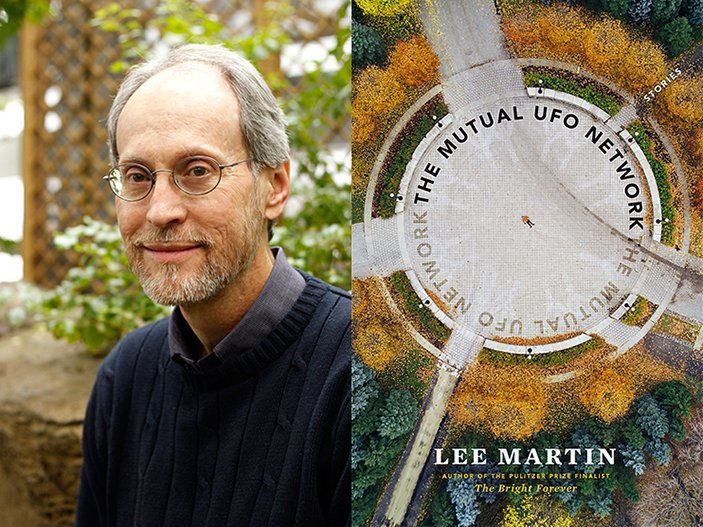
Lee Martin, author of The Mutual UFO Network.
Ten Questions for Lillian Li
This week’s installment of Ten Questions features Lillian Li, whose debut novel, Number One Chinese Restaurant, is out this month from Henry Holt. Loosely based on Li’s own waitressing experience at a Peking duck restaurant in northern Virginia, the novel follows the complicated lives and loves of the people working at the fictional Beijing Duck House in Rockville, Maryland. The multigenerational, multi-voiced, and darkly comic novel “practically thumps with heartache and dark humor,” says novelist Chang-rae Lee. “If a Chinese restaurant can be seen as a kind of cultural performance,” says Peter Ho Davies, “Lillian Li takes us behind the scenes.” Li received a BA from Princeton University and an MFA from the University of Michigan. She is the recipient of a Hopwood Award in Short Fiction and Glimmer Train’s New Writer Award, and her work has appeared in Guernica, Granta, and Jezebel. She lives in Ann Arbor, where she is a bookseller at Literati Bookstore and a lecturer at the University of Michigan’s Sweetland Center for Writing.
1. Where, when, and how often do you write?
I write wherever is free (so usually my apartment), and I tend to write whenever I can put it off no longer (so anywhere in the late afternoon to the pre-morning hours). I find that I’m disciplined in short bursts. So I can write every day and sustain that practice for a week. Then I pat myself on the back and forget to write for a week. Rinse and repeat.
2. How long did it take you to write Number One Chinese Restaurant?
About three years. Although the bulk of that time was spent completing just the first draft. I’m a faster reviser than I am a writer.
3. What has been the most surprising thing about the publication process?
How much I would grow to depend on my editor (Barbara Jones)! She taught me so much about writing, especially on the character and sentence-level. I hadn’t expected to find such mentorship, especially since the book had already been written, but I’m thrilled I did.
4. Where did you first get published?
I was first published as a Granta New Voice, which was an online feature started by their then–fiction editor Patrick Ryan. I recently ran into Patrick at a conference and had the privilege of gushing my gratitude at him.
5. What are you reading right now?
My Education by Susan Choi. A deeply sexy, emotionally turbulent book about a graduate student who falls for a notorious professor’s equally charismatic wife. Also Vanessa Hua’s A River of Stars, which comes out August 14. Hua writes about San Francisco Chinatown with such savvy and heart. Both books are also incredibly funny.
6. If you were stuck on a desert island, which book would you want with you?
Kitchen Confidential by Anthony Bourdain. I’ve read it so many times I’ve lost count, and his voice never ceases to thrill. So clearly it would be good company on a desert island.
7. Who is the most underrated author, in your opinion?
I don’t know about most underrated, but I wish more people talked about Jessica Hagedorn. Dogeaters remains one of the most awe-inspiring books I’ve ever read.
8. What is the biggest impediment to your writing life?
I only have myself to blame, but I also tend to let myself off the hook pretty easily.
9. What trait do you most value in your editor or agent?
A combination of a sharp tongue and a big heart.
10. What’s the best piece of writing advice you’ve ever heard?
Avoid the word “it” whenever possible. Which is to say, specificity whenever possible.
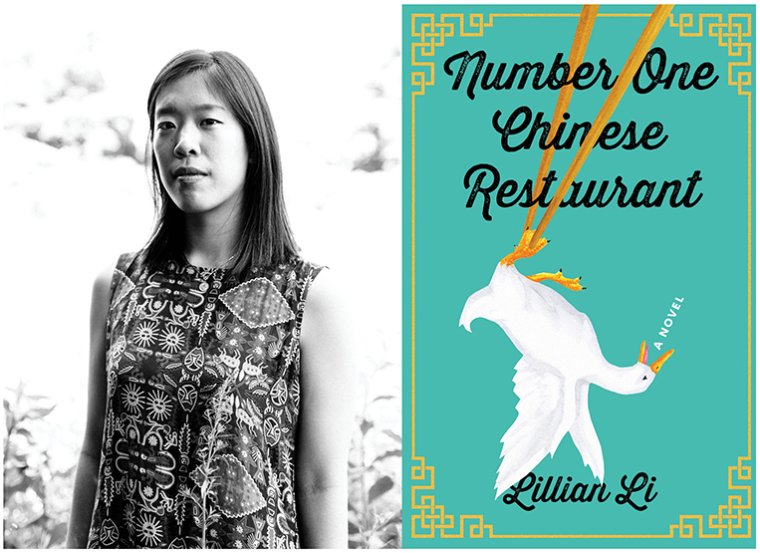
Lillian Li, author of Number One Chinese Restaurant. (Credit: Margarita Corporan)
Ten Questions for Akil Kumarasamy
This week’s installment of Ten Questions features debut author Akil Kumarasamy, whose collection of linked stories, Half Gods, published today by Farrar, Straus and Giroux, “portrays with sharp clarity the ways in which parents, children, and friends act as unknowing mirrors to each other, revealing in their all-too-human weaknesses, hopes, and sorrows a connection to the divine.” Kumarasamy’s fiction has appeared in Harper’s Magazine, American Short Fiction, Boston Review, and elsewhere. She received her MFA from the University of Michigan, and has been a fiction fellow at the Fine Arts Work Center in Provincetown and the University of East Anglia.
1. Where, when, and how often do you write?
I usually write at home or at a café, but I’m pretty open to working anywhere. I don’t necessarily write every day; sometimes I just let an idea sit for a while, seep in my head. I might write ferociously for a week and then have a period where I don’t write at all. Maybe it’s a kind of mental crop rotation, giving the mind time to rest before the next creative burst. For Half Gods, I often wrote at night. I liked working while everyone else was sleeping. I think it made the act feel secretive, like I was tapping into some unknown frequency. Now I’m trying to write in the mornings. It feels more responsible.
2. How long did it take you to write Half Gods?
It took a few years of actual writing, but the earliest portion of the book was written in 2010.
3. What was the most surprising thing about the publication process?
How long the process takes! From selling the manuscript to the actual publication, it takes around a year and half. I’ve been working on a second book and feel pretty involved it, so it’s interesting now having to discuss Half Gods, which to me feels like a different version of myself.
4. Would you recommend writers pursue an MFA?
It definitely depends on what you’re looking for. There are many paths toward publication and getting an MFA is just one of them. It can possibly offer the time to fine-tune one’s craft, financial flexibility, and community.
5. What are you reading right now?
I’m reading Elena Ferrante’s My Brilliant Friend and Catherine Lacey’s Certain American States, which is out in August. It’s amazing.
6. If you were stuck on a desert island, which book would you want with you?
I would want a book on how to appreciate and thrive on a desert island while you are away from humanity and the appendix should have the directions on how to build a canoe when you/if you want to reconnect with the rest of the world. In other words, maybe some Chekov.
7. Who is the most underrated author, in your opinion?
Well think about how many wonderful books don’t get translated into English. The English language is currency.
8. What is the biggest impediment to your writing life?
It’s probably myself. What I think is possible.
9. What trait do you most value in your editor or agent?
Their unwavering belief in me. It feels extraordinary.
10. What’s the best piece of writing advice you’ve ever heard?
There’s no such thing as writer’s block. Sometimes you go to the computer and nothing valuable comes out and that’s okay. It’s all about how you see the writing process. You don’t need to call it writer’s block and you don’t need to feel guilty when you’re not sitting by the computer. The work requires so much of you that if the guilt doesn’t make you more productive, then the feeling is not worth it. You always have a choice in how you are going to perceive something.

Akil Kumarasamy, author of Half Gods (Farrar, Straus and Giroux).
Ten Questions for Lee Martin
This week’s installment of Ten Questions features Lee Martin, whose new book, The Mutual UFO Network, published today by Dzanc Books, “explores the intricacies of relationships and the possibility for redemption in even the most complex misfits and loners.” It is his first story collection since his acclaimed debut, The Least You Need to Know, was published by Sarabande Books in 1996. Martin is also the author of three memoirs as well as the novels Quakertown (Penguin, 2001); The Bright Forever (Shaye Areheart, 2005), a finalist for the Pulitzer Prize in Fiction; River of Heaven (Shaye Areheart, 2008); Break the Skin (Crown, 2011); and Late One Night (Dzanc, 2015). He teaches in the MFA program at Ohio State University.
1. How long did it take you to write The Mutual UFO Network?
The earliest story in this collection was published in 1997, and the last one appeared in 2014. In the time since my first collection came out in 1996, I’ve published five novels, three memoirs, and a craft book, but I’ve also kept writing stories. There were times in that gap between 1996 and now when we could have tried to bring out a new collection, but I’m glad we waited until the book was truly a book rather than merely a random gathering of stories.
2. Where, when, and how often do you write?
I’m a morning writer, and I normally work in my writing room at home, sometimes with my senior editor, Stella the Cat, on my lap. She has claws, and she holds me to task. Lately, though, I’ve discovered another writing space. My wife works remotely for a hospital in our home area of southeastern Illinois. She has to be onsite four days out of each month, and, when I can, I go with her. I end up writing in the small public library I used when I was in high school. It pleases me to know I’m writing in a place where I once read so many other people’s books and dreamed of one day having a book of my own. Sometimes people stop by and tell me stories, and sometimes I use them. I try to write at least five days a week. I used to write every day, but, as I’ve gotten older, I’ve become more comfortable with rest and the way it can re-energize me. For the most part, we writers are introverts, and it can become easy to withdraw from the world. I’m lucky enough to be married to an extrovert, and the weekend is now our time to engage with life outside the writing space.
3. What was the most surprising thing about the publication process?
That I ever got published at all! Seriously, when I was starting out, I gathered so many rejections, I started to believe that door would never open for me. I couldn’t stop writing, though. It’s what gave me pleasure, and I knew even if I never got published, I’d still love moving words around on the page. That’s why I tell my students to keep doing what they love as long as they love it. As I began to publish books, I learned so much about the part of the process that doesn’t involve writing or editing. I’m talking about the behind-the-scenes work of publicity and marketing. Everything from how the sales reps work to cover design. I’m still amazed by the decisions that get made that can make or break a book before it even hits the shelves.
4. Where did you first get published?
I published my first story in 1987 in the literary journal Sonora Review. My first collection, The Least You Need to Know, was the first winner of the Mary McCarthy Prize from Sarabande Books, and it came out in 1996.
5. What are you reading right now?
I just finished a fascinating memoir by David Giffels called Furnishing Eternity. It’s about the author’s desire to build his own casket even though he has no immediate need for it. His aged father, an accomplished woodworker, sets out to help him. That’s the narrative spine, but the book is about so much more. With wit and warmth, Giffels explores aging and death and family and friendship. It’s a beautifully written book with not a trace of sentimentality.
6. If you were stuck on a desert island, which book would you want with you?
In our family room, there’s a length of an old door casing that my wife and I rescued from the debris of the farmhouse where my family lived when I was young. My wife turned it into this shelf, and we put old family photos and mementos on it. My mother was a teacher, and one of the things she left behind was the school bell she rang at the old country schools where she once taught. That bell sits on top of two books, To Kill a Mockingbird and The Great Gatsby. If I had to choose one to have with me on that desert island, it would probably be Gatsby. I reread it each year with continued admiration. I guess I’m a romantic at heart. The story of Daisy and Gatsby gets me every time.
7. Who is the most underrated author, in your opinion?
I’ve had the privilege of knowing a number of writers who would fall into that category. I’ve met them through their books, and sometimes I’ve been lucky enough to know them personally and to be able to call them my friends. I’m not trying to avoid the question. I’m only honestly stating the fact. I imagine there are literally thousands of writers who should be appreciated more than they are. These writers are doing work just as memorable and just as necessary as the big-name folks, but for whatever reason they haven’t broken out the way their more famous counterparts have.
8. What is the biggest impediment to your writing life?
I once told someone that any writer would gladly trade money for time. I’m not sure that’s true, but it feels true from where I sit. I’m a writer who has a hard time saying no to people, so I sometimes find my writing time being reduced due to things I’ve promised other writers, or my students, that I’ll do. I think of all the favors others did for me when I was just starting out—blurbs, letters of recommendation, etc.—and I try my best to keep giving back to the profession. As the years have gone on, I’ve begun to feel a slightly different pressure, and that’s the threat that comes from our “connected culture.” The internet, social media, e-mail, texts—they all demand that we always be available, and, if we let them, they can destroy the solitude and quiet writers need to immerse themselves fully in their work.
9. What trait do you most value in your editor or agent?
I like an editor and an agent who will tell me the truth about a manuscript, no matter how painful it may be for me to hear it. I like them to understand what I’m trying to accomplish and to be able to offer honest, but tactful, suggestions for what I need to do to fully realize my intentions. So honesty, insight, a collaborative spirit, a supportive presence, and, finally, a willingness to be a tireless champion of my work.
10. What’s the best piece of writing advice you’ve ever heard?
I see so many young writers who want to succeed immediately. They want to publish, they want to win awards, they want validation. In their desperation to attain that validation, they sometimes forget why they love to write. In every workshop I teach, I pass along a single piece of writing advice. It comes from Isak Dinesen who encouraged writers to, “Write a little every day, without hope, without despair.” We all fall prey to both hope and despair from time to time. Both seduce us into thinking about the end result of the work, and, consequently, we don’t pay attention to the process. If we can write a little with some degree of consistency and without agonizing over how good it will be, who will want to read it and praise it, etc., we can remember how much we love the mere act of putting words on the page. To be in the midst of that love is a wonderful thing. I’m firmly convinced that if we pay attention to the process, our journey will take us where we’re meant to be.

Lee Martin, author of The Mutual UFO Network.
Ten Questions for Christopher Kennedy
This week’s installment of Ten Questions features Christopher Kennedy, whose fifth poetry collection, Clues From the Animal Kingdom, is out today from BOA Editions. In the collection, Kennedy sifts through the detritus of the past to uncover the memories, images, and symbols that shape an individual’s consciousness. “There is joy and dread here, in every carefully considered line,” writes Dave Eggers about the book. Looking to the natural world for inspiration, Kennedy offers prose poems that offer, as George Saunders puts it, “a moving portrait of the human heart examining itself.” Christopher Kennedy is the author of four previous poetry collections, including Ennui Prophet (BOA Editions, 2011), and Encouragement for a Man Falling to His Death (BOA Editions, 2007), which received the Isabella Gardner Poetry Award. He has received fellowships from the National Endowment for the Arts and the New York Foundation for the Arts, and a grant from the Constance Saltonstall Foundation for the Arts. He is a professor of English at Syracuse University where he directs the MFA program in creative writing.
1. Where, when, and how often do you write?
I write anywhere I happen to be at any time of day, though I tend to write first drafts at night and revise during the day. I take breaks, sometimes for months, usually because I’m teaching and want to devote my energy to my students’ work, but when I’m writing, I write every day.
2. How long did it take you to write the poems in Clues From the Animal Kingdom?
There are some lines in the poems that are decades old, but I’d say most of the poems were written between 2007 and 2016. I tend to save old poems and scavenge from them when I’m stuck working on something newer. I trust that it’s all coming from the same source and can be reshaped to resolve whatever dilemma I’m facing.
3. What was the most surprising thing about the publication process?
I was surprised at the relationship between the poems in the collection. It feels as if it’s part poetry, part fiction, part memoir, in the sense that if you read it cover to cover there is a narrative arc, at least in the sense of moving from one emotional/psychological state to another, as well as temporal shifts that feel organic to a plot I never would have imagined would exist.
4. What is one thing you’d change about the literary community and/or the publishing business?
I have a fantasy that book publishers could find a way to form consortiums that would allow them to open their own bookstores. I miss being able to browse shelves and strike up conversations with knowledgable staff in a place devoted to books.
5. What are you reading right now?
Mostly I’m reading my students’ work, which impresses me on a daily basis, but I was on leave last semester, so I was able to read a lot over the spring and summer. Here’s a short list of books I read and recommend. Poetry: former students Grady Chambers and Jessica Poli’s book and chapbook, respectively, North American Stadiums and Canyons. Short story collections: Samantha Hunt’s The Dark Dark, Rebecca Schiff’s The Bed Moved, and Denis Johnson’s The Largesse of the Sea Maiden. Novels: Paula Saunders’s debut, The Distance Home, and Jonathan Dee’s The Locals. I also read some unpublished stories from a collection in process by Sarah Harwell, a wonderful poet and fiction writer. They’re linked stories set in an airport, and they’re fantastic.
6. If you were stuck on a desert island, which book would you want with you?
If I had a good dictionary, I’d have everything I need and lots of time to recreate everything I’ve ever read. That seems impractical, though, so I’d bring Denis Johnson’s The Incognito Lounge. It had a profound influence on me thirty-plus years ago, and every time I read it again, it holds up.
7. Who is the most underrated author, in your opinion?
I could name several, but Gary Lutz comes to mind immediately. One Gary Lutz sentence is worth a thousand pictures.
8. What is the biggest impediment to your writing life?
I don’t have any impediments other than my own psychology. For me, writing is a constant struggle between thinking I have nothing of any importance to say and believing that when I do have something to say I won’t be able to express it properly. I have three states of being: feeling doubt, manifesting a vague desire to say something that seems important, and writing toward ground zero of that desire.
9. What’s one thing you hope to accomplish that you haven’t yet?
I’d like to dunk a basketball, but I’d settle for writing more poems that are focused on the current socio-political scene. Some of my work has that emphasis, but I’d like to expand that part of my work.
10. What’s the best piece of writing advice you’ve ever heard?
Hayden Carruth wrote this in a letter to me several years ago: “The language of a poem is like a balloon, it must be stressed enough to make its shape full and taut, but not enough to make it explode.”
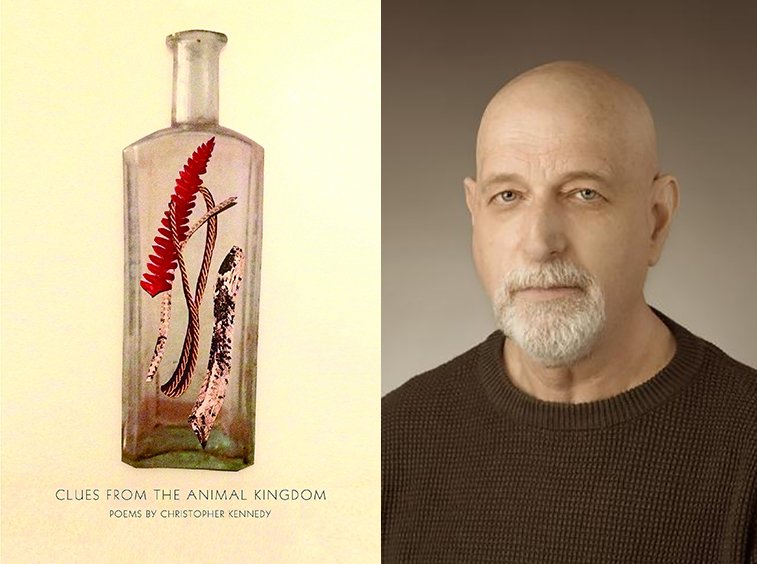
Christopher Kennedy, author of Clues From the Animal Kingdom. (Credit: David Broda)
Ten Questions for Emily Jungmin Yoon
This week’s installment of Ten Questions features Emily Jungmin Yoon, whose debut poetry collection, A Cruelty Special to Our Species, is out today from Ecco. In the collection, Yoon explores gender, race, and the history of sexual violence against women, focusing in particular on so-called comfort women—Koren women who worked in Japanese-occupied territories during World War II. Yoon was born in Busan in the Republic of Korea and received her BA at the University of Pennsylvania and an MFA in creative writing from New York University. She won the 2017 Tupelo Press Sunken Garden Chapbook Prize for her chapbook Ordinary Misfortunes, and has been the recipient of awards and fellowships from Ploughshares, the Association of Writers and Writing Programs, and the Poetry Foundation, among others. Yoon’s poems and translations have appeared in the New Yorker, POETRY, and the New York Times Magazine, and she serves as poetry editor for the Margins, the literary magazine of the Asian American Writers Workshop. She is currently pursuing a PhD in Korean literature at the University of Chicago.
1. Where, when, and how often do you write?
I write at home, usually late night. I find that poems in my head become louder when everything is quiet. I write rather sporadically now, so there isn’t a fixed schedule, but when I was writing the poems in A Cruelty Special to Our Species, I would write maybe three to five days a week.
2. How long did it take you to write A Cruelty Special to Our Species?
To completion, about four years, but a good chunk of the poems came in early 2015, in the last semester of my MFA program at NYU—that was a very fruitful period.
3. What has been the most surprising thing about the publication process?
That time goes by so quickly! It took a little more than a year for the book to be published after the signing of the contract, and I felt like I just couldn’t wait. But after rounds of proofreading and editing, a year had already passed.
4. Where did you first get published?
My first magazine publication was the Claremont Review, a Canadian magazine that publishes works by writers and artists in the age range of 13 to 19 from around the world. It was very exciting and encouraging to see my poems in print among others.’ I’m grateful for the space that CR provides young creators.
5. What are you reading right now?
I am reading the complete works of Kim Su-young’s poetry, from 1945 to 1968. His poetry influenced a lot of other poets, and I’m interested in his relationship to language, as he was writing post-liberation and when linguistic nationalism was rampant.
6. If you were stuck on a desert island, which book would you want with you?
Maybe an instructive book on how to survive in the wild…. But for joy, Li-Young Lee’s Rose. There are so many amazing books, but Rose was my first love in poetry.
7. Who is the most underrated author, in your opinion?
She’s more unrecognized than underrated, perhaps, but: Ronyoung Kim. She was the author of Clay Walls, which is the first novel written in the U.S. about Korean immigrant experience. Published in 1986, Clay Walls was the first Korean American novel. Not many people now seem to know about her or the book, though it was nominated for the Pulitzer.
8. What is the biggest impediment to your writing life?
Stress from non-writing work, for sure. I have to deliberately and strategically clear out space and time to not think about any of that and focus on reading and writing poetry.
9. What trait do you most value in your editor?
I appreciate Gabriella Doob and Dan Halpern for their warmth, support, and trust. They believe in my vision and are just wonderful people.
10. What’s the best piece of writing advice you’ve ever heard?
Jericho Brown said to our class at Aspen Words, “Be your ultra-self.” I tend to be pretty self-conscious when writing; I think it’s good to be concerned and careful about specific words and their implications, but sometimes it disrupts the flow. So I try to imagine what a bolder, wilder, and more carefree me would say. Any part that doesn’t sit right can be edited later.
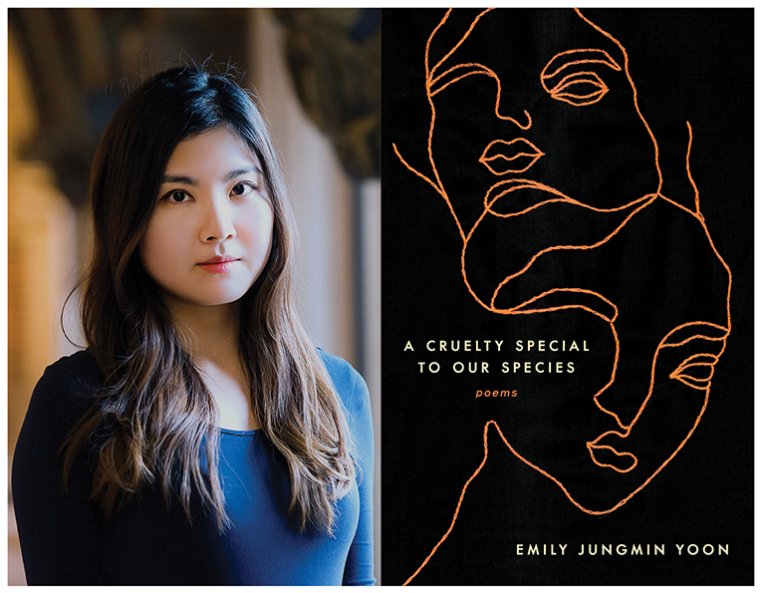
Emily Jungmin Yoon, author of A Cruelty Special to Our Species. (Credit: Jean Lechat)
Ten Questions for May-Lee Chai
This week’s installment of Ten Questions features May-Lee Chai, whose story collection Useful Phrases for Immigrants is out today from Blair, an imprint of Carolina Wren Press. Chai’s collection, which Edward P. Jones calls “a splendid gem” and Tayari Jones calls “essential reading,” is, at its essence, about migration—both physical and psychological, between cities and countries, among families and individuals. The stories are marked by complex and vividly rendered characters, Chinese American and Chinese women, men, and children who navigate relationships and the land, asking important questions about themselves, their families, and their culture. As Lisa Ko puts it, “You won’t forget these characters.” May-Lee Chai is the award-winning author of ten books, including the memoir Hapa Girl, the novel Tiger Girl, and her original translation from Chinese into English of Autobiography of Ba Jin. She is the recipient of an NEA fellowship and is an assistant professor in creative writing at San Francisco State University.
1. Where, when, and how often do you write?
When I first started writing as a student, I used to write after midnight, after all my work was done for the day. But now I find that too tiring. I can write only on days when I’m not teaching and when all my grading and reading are done. Otherwise, I can’t turn off my editing brain to reach my subconscious, creative thoughts.
2. How long did it take you to write Useful Phrases for Immigrants?
I had been working on some of the stories for four or five years before I decided to put together a collection. Some had already been published. Once I came up with my theme, I knew which ones should go together and how to revise the others.
3. What was the most surprising thing about the publication process?
I received the most beautiful blurb quote from Edward P. Jones. After that I thought, “I will never again receive an endorsement as wonderful, as meaningful, as generous as his. You can put this one on my tombstone!”
4. What is one thing you’d change about the literary community and/or the publishing business?
I wish it were easier for writers of color who don’t come from moneyed backgrounds to be heard and celebrated.
5. What are you reading right now?
Just finished reading Vanessa Hua’s novel A River of Stars, which is so good at taking a story that’s ripped from the headlines and then going deeper into the characters and their motivations, and I’m just starting Jamel Brinkley’s short story collection, A Lucky Man, which is full of heartbreak and longing and exquisitely crafted sentences.
6. Who is the most underrated author, in your opinion?
Sei Shonagon. She was a member of the Heian Court in 10th-century Japan and wrote a “pillowbook” of diary-like entries on daily life, rituals, human relationships, all kinds of opinionated, lyric-essay-like observations. Everyone should read her.
7. What trait do you most value in an editor?
My editor at Blair, Robin Miura, has the best editors’ traits: an eagle eye and a light hand.
8. What is the biggest impediment to your writing life?
The current political situation is the biggest impediment to my continued well-being as a woman of color in America, so that naturally impedes the writing. It takes time and energy to resist, and it takes time and energy to heal. That leaves relatively little time for everything else.
9. What’s one thing you hope to accomplish that you haven’t yet?
Peace of mind.
10. What’s the best piece of writing advice you’ve ever heard?
Writer Nona Caspers (The Fifth Woman) just visited my undergraduate class and told the students to learn to trust their subconscious. As an example, she said when something turns up in a writing exercise or in their notebooks, they should be willing to explore and unpack and develop what their subconscious is telling them is important. I thought that was great advice.
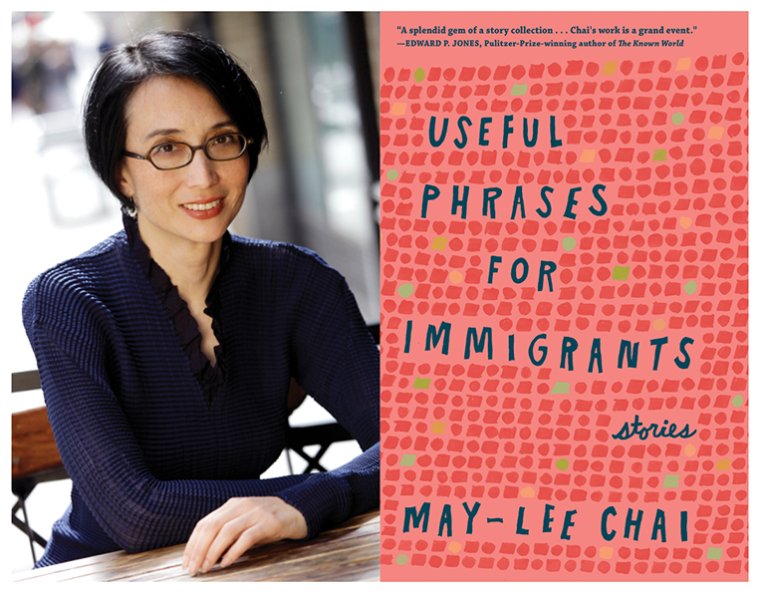
May-Lee Chai, author of Useful Phrases for Immigrants.
Ten Questions for Rosellen Brown
This week’s installment of Ten Questions features Rosellen Brown, whose eleventh book, The Lake on Fire, is out today from Sarabande Books. The novel is an epic family narrative that begins among nineteenth-century Jewish immigrants on a failing Wisconsin farm and follows the young protagonist, Chaya, and her brother Asher, who flee to industrialized Chicago with the hopes of finding a better life. Instead, they find themselves confronted with the extravagance of the World’s Fair, during which they depend on factory work and pickpocketing to survive. The Lake on Fire is a “keen examination of social class, family, love, and revolution in a historical time marked by a tumultuous social landscape.” Rosellen Brown is the author of the novels Civil Wars, Half a Heart, Tender Mercies, Before and After, and six other previous books. Her stories have appeared in O. Henry Prize Stories, Best American Short Stories , and Best Short Stories of the Century. She lives in Chicago, where she teaches in the MFA program at the School of the Art Institute of Chicago.
1. Where, when, and how often do you write?
Where depends almost entirely on the shifting light in my apartment that, most marvelously, sits sixteen stories up and a couple of blocks from constantly-changing Lake Michigan. So I follow the sun around and sit wherever it’s brightest (often with my cat on my lap). I sometimes wonder if I’d focus better if I had one desk, one room of my own, but I’m light-thirsty and this seems to work out pretty well. As for the “how often,” when my kids were little and I had to take advantage of every minute they were in school, I’ll admit I was a lot more disciplined; I published three books in three years. Like my waistline, I’m afraid things have slackened a little, but I still try to work every day that I’m not teaching and feel like I’m cheating when I don’t at least try, or on a dry day default to reading. It’s interesting that many people worry that reading while they’re writing might influence their work. On the contrary, I’ve always read just enough (of just about anything good) until I find myself thinking, hungrily, “I want to do that!” Then I put the book or the story away and get down to it, energized by envy.
2. Where did you first get published?
This is crazy to remember: The New York Times used to—I’m talking about the fifties—publish poetry, mostly pretty bad, on their editorial page and while I was in high school I sent them, and had accepted, a sonnet on the ghost of Thomas Wolfe. (I’m not talking about Tom Wolfe but the Thomas of Look Homeward, Angel: “Oh, lost and by the wind-grieved ghost…” and so on. A book not to be read when you’re older than sixteen.) In college, I had a few poems in little magazines and one in Mademoiselle and then my coup, never to be repeated: Poetry Magazine took a sestina of mine and published it in my senior year. A sestina is always a sort of tour de force; maybe if I tried that again, they’d take another poem! As for my fiction, I didn’t start writing that until later, moving gradually from poetry to prose poetry to some pretty unconventional fiction because I didn’t really know (or care about) “the rules.”
3. How long did it take you to write The Lake On Fire?
Oh, what a question! I just discovered, via an old letter that I happened upon, that I had begun talking about what became this book as long ago as 1987! I’m horrified. I published four books between that early hint of curiosity and my actually writing and revising it, so I was obviously not sidelined by that early—I’ll call it an itch. Somewhere along the way I wrote a first version that was set in New Hampshire. Of course, Chicago is at the center of the published novel. I could write a lot more than I have room for here about how long it takes me—and, I suspect, most writers—the coming together of two impulses to ignite a story, and that’s what happened when I moved here and learned so much about the city’s history. I sort of (but only sort of) wish I could find the original manuscript that never took fire but I have no idea what happened to it. (Good metaphor, given the name of the final book.)
4. What was the most surprising thing about the publication process?
How wonderfully attentive an independent (read: small but not powerless) press could be, if it’s seriously well-run. I got an almost instant response from Sarah Gorham, whose Sarabande has always been one of my favorites—none of that hanging around the (virtual) mailbox waiting for somebody in New York to say yea or nay because, I trust, she didn’t have to run things past an army of marketers and others before she could say “I love it!” And their marketing has been another surprise: Really attentive and responsive, Joanna Englert is all in, efficient, and enthusiastic. Though I had a good experience at Farrar, Straus and Giroux with their publicity and marketing for my book Before and After, this is far more personal and agile.
5. What trait do you most value in an editor?
Respect for my intentions and an absence of the need to prevail. A good ear, not always available even from editors who can talk about structure or motivation and so on but who can’t hear a rhythmically perfect (or imperfect) line. I’ve had two great editors: The first, John Glusman, was just starting his family when I worked with him on Before and After, which raises some hard questions about parental responsibility, and he was deeply attuned to what I was trying to do. And my current editor, Sarah Gorham, is herself a terrific poet and essayist who knows how to listen to the rhythm of my writing, which—as someone who herself began as a poet—I take very seriously.
6. What is one thing you’d change about the literary community and/or the publishing business?
I’m hardly alone in saying that—both understandably and unforgivably—the “legacy” publishers look at their numbers, past and projected, far more attentively than I think they consider the quality of books they deem marginal. They are, like their counterparts in the entertainment industry, more sheeplike than daring.
7. Who is the most underrated author, in your opinion?
Not under-rated—he gets great reviews and sometimes wins prizes—but I find too few people who know Charles Baxter’s stories and novels. I’m not sure why: Too quiet, maybe? Never brings down the house but writes with exquisite sensitivity and great good humor, with his passion for social justice sometimes stage center, sometimes lurking around the edges. I remember him saying, memorably and better than this, that what we need to do is make people less certain about their certainties.
8. If you were stuck on a desert island, which book would you want with you?
This is still a little too much like the “who are your favorite writers?” kind of question. I hate ranking writers because it’s so apples and oranges. Two of my favorite novels, for example, are William Maxwell’s So Long, See You Tomorrow and Evan Connell’s Mrs. Bridge. But then, what about Alice Munro’s The Beggar Maid, which I consider one of the most satisfying collections of (connected) stories I know? To the Lighthouse? And then, on another day, trying keep dry the suitcase I’d have rescued from whatever boat capsized and deposited me on that island, where do I put Max Frisch’s Man in the Holocene or Marilynn Robinson’s Houskeeping, novels so different you might want to find another name for their genres? And then there’s poetry. And then there’s nonfiction, at least half the entries in The Art of the Personal Essay. So many delights! How to choose? I refuse.
9. What is the biggest impediment to your writing life?
I’m a plodding, one-idea-at-a-time writer, unlike some of my friends, who are filled to overflowing with great projects jostling each other to be attended to. Then again, with eleven books behind me, I guess I shouldn’t complain. Entertainment Weekly, of all places, recently chose The Lake on Fire as one of their “20 Fall Books Not To Be Missed,” and they called me some very complimentary things, but it was kind of a backhanded compliment because they said people ought to get to know my name because I’d been flying under the radar. Then again, whoever compiled the list was probably in first grade (if that) when my last book came out so I guess that’s on me!
10. What’s the best piece of writing advice you’ve ever heard?
The only teacher with whom I ever took a fiction class, a fine and much undernoticed writer named George P. Elliott cautioned us, at a time when we young ‘uns were too easily snarky and judgmental, to be compassionate toward our characters. He cited a letter by Chekhov in which Chekhov suggested that, at most, we should admonish people whom we find wanting: “Look how you live, my friends. What a pity to live that way.” Hard to live up to and I fail often because cleverness is so much easier to reach for than sympathy, but I try to remember and, without too many compromises, act upon it.
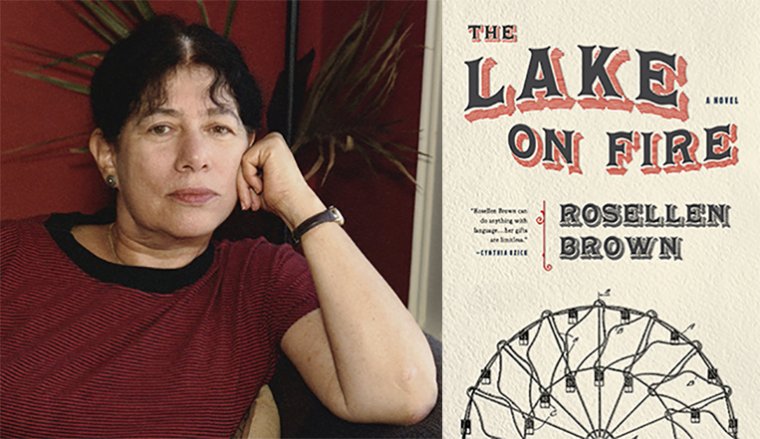
Rosellen Brown, author of The Lake on Fire.
Ten Questions for Claire Fuller
This week’s installment of Ten Questions features Claire Fuller, whose third novel, Bitter Orange, is out today from Tin House Books. A literary mystery, Bitter Orange is the story of Frances Jellico, who, in the summer of 1969, takes a job researching the architecture of a dilapidated mansion in the English countryside and finds a peephole underneath a floorboard in her new bathroom that gives her access to her neighbor’s private lives. Novelist Gabriel Tallent calls it “a twisty, thorny, darkly atmospheric page-turner.” Fuller, who didn’t start writing until she was forty, is the author of two previous books, Swimming Lessons (2017) and Our Endless Numbered Days (2015), both published by Tin House Books. She lives in Hampshire, England, with her husband and two children.
1. Where, when, and how often do you write?
I worked for so many years in a nine-to-five-thirty job that I can’t get out of that habit. I’m at my desk most days for most of the day, doing bits of novel writing, in between other bits of writing, answering e-mails, and reading. I try to keep weekends free of writing, but depending on where I am in the cycle of publishing that doesn’t always work.
2. How long did it take you to write Bitter Orange?
Almost exactly two years, and then some additional time for edits and so on. I keep a writing diary, just a line a day with my word count and whether the day has gone well or badly. Mostly it’s badly, but that helps to look back on when I’m writing the next one.
3. What was the most surprising thing about the publication process?
How long it can take from a publisher buying a novel to that book being on the shelves in bookshops. I’m not a very patient person and having to wait so long —nineteen months in one case—is not easy.
4. What is one thing you’d change about the literary community and/or the publishing business?
I’d like there to be less focus on one lead book a season by large publishers, and instead for them to spread their publicity and marketing budgets more broadly. Industrywide it seems that only a few books get a massive push, while lots of many brilliant novels that publishers have bought are left to either sink or swim by themselves.
5. What are you reading right now?
I’m reading Fever Dream by Samanta Schweblin, translated by Megan McDowell. It’s a sinister and strange story so mixed up and feverish that it’s hard to tell what’s real and what isn’t. Reading it is a wonderful distraction.
6. Who is the most underrated author, in your opinion?
I think Barbara Comyns could be better known. Her novels are wonderfully quirky, full of people who levitate or go mad from ergot poisoning. It’s hard to know whether she’s underrated—there are a lot of people who know her work, but probably lots more who don’t.
7. What trait do you most value in an editor?
I’m lucky to have two amazing editors: Juliet at Penguin in the UK, and Masie at Tin House in the US. They both work very differently, and although sometimes I’m sitting in the middle trying to sort out differing advice, I value hugely what they both have to say. Juliet is very good at the high-level view of a novel, while Masie and I will have long Skype conversations about whether a ‘sleeveless vest’ is actually a thing, whether US readers will have heard of Fuzzy Felt, or if Americans eat cauliflower cheese or cauliflower with cheese sauce. I love getting into the nitty-gritty of a novel, right down to the sentence and the word level.
8. What is the biggest impediment to your writing life?
My own procrastination. Reading all my reviews (and no, it’s not possible to stop). My untidy writing room. My cat, who I got in order to have a writer’s cat, but who loves my husband more than me. Reading other people’s brilliant novels (and no, I’m not going to stop).
9. What’s one thing you hope to accomplish that you haven’t yet?
Finish my fourth novel? Or just write the next damn sentence. When I’m only at 11,000 words all of it feels like an insurmountable task.
10. What’s the best piece of writing advice you’ve ever heard?
Write like “none of it happened, and all of it is true,” which, if I’ve got my source correct, is something Ann Patchett’s mother said.
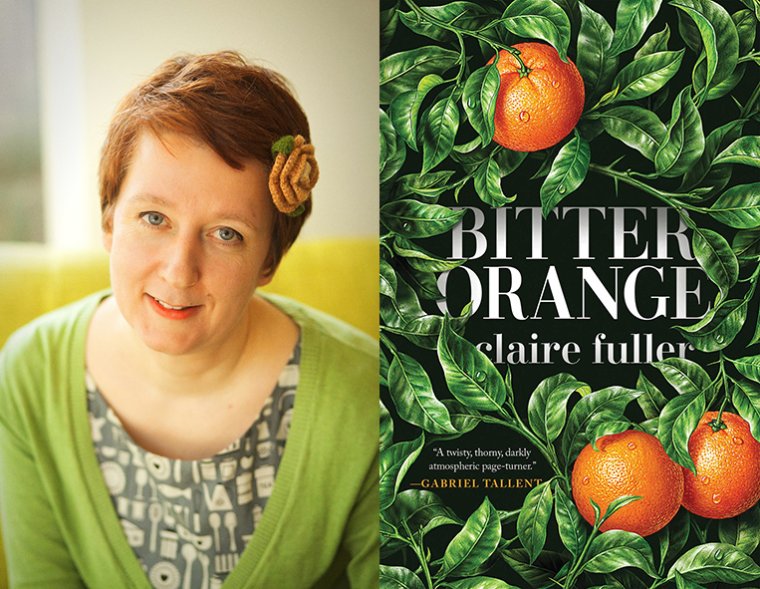
Claire Fuller, author of Bitter Orange. (Credit: Adrian Harvey)
Ten Questions for Amy Bonnaffons
This week’s installment of Ten Questions features Amy Bonnaffons, whose debut story collection, The Wrong Heaven, is out today from Little, Brown. In this collection of funny, strange, and inventive stories, whose “conflicted characters seek to solve their sexual and spiritual dilemmas in all the wrong places,” Bonnaffons writes about women, desire, and transformation through the lens of the fantastic. Bonnaffons received an MFA from New York University and is currently pursuing a PhD in creative writing at the University of Georgia. Her stories have been published in the Kenyon Review, the Sun, the Southampton Review, and elsewhere, and her story “Horse”—which juxtaposes one woman’s journey through IVF with her roommate’s transition from woman to animal—was performed by actresses Grace Gummer and Geraldine Hughes on This American Life.
1. Where, when, and how often do you write?
Ideally every day, for two hours or so in the morning, at home or at a nearby coffee shop. I do my best to stick to that schedule, but interruptions and hiatuses are common—due to the demands of life, work, and school, or the need to replenish myself creatively. I’ve been taking a long break for the past few months, reading and drawing a lot rather than pressuring myself to produce any new writing.
2. How long did it take you to write The Wrong Heaven?
The first story (“Doris and Katie”) was written in 2008; the most recent story is “Horse,” written in 2016. So I’ve been working on these stories for the last decade of my life—while also writing a novel, The Regrets, forthcoming from Little, Brown.
3. What has been the most surprising thing about the publication process?
How capable and nice everyone has been. I’d heard horror stories about publishing that made me anticipate encountering a lot of incompetent jerks—but everyone I’ve worked with has been really good at their jobs, and also just so darn likable. I want to invite them all over for a potluck where we get drunk and dork out about books.
4. Where did you first get published?
Word Riot and Kenyon Review Online.
5. What are you reading right now?
Gioconda Belli’s The Inhabited Woman; Hiromi Kawakami’s Record of a Night Too Brief; Colson Whitehead’s The Underground Railroad; Mallory Ortberg’s The Merry Spinster; Alice Walker’s In Search of Our Mothers’ Gardens. I just finished Sheila Heti’s Motherhood, Myriam Gurba’s Mean, and Brittney Cooper’s Eloquent Rage.
6. If you were stuck on a desert island, which book would you want with you?
Haruki Murakami’s The Wind-Up Bird Chronicle. I could read that book forever.
7. Who is the most underrated author, in your opinion?
I don’t really like to rate authors, because everything’s a matter of taste, and taste is political, and hierarchy has no place in the creative life. That said, there are some authors I’ve read recently and wondered, “WHY HAS NO ONE TOLD ME ABOUT THIS PERSON BEFORE? WHY IS THIS BOOK NOT ON EVERY SYLLABUS EVER?” Sometimes I’m just late to the party—but it’s also true that women, people of color, and authors from the Global South have to fight harder to find an audience. This is changing, but we’re not yet anywhere near where we should be.
The books I’m thinking of at the moment are Mrs. Caliban by Rachel Ingalls, The Palm-Wine Drinkard by Nigerian author Amos Tutuola, Gentleman Prefer Blondes by Anita Loos, and The Lost Lunar Baedeker by Mina Loy (why did no one make me read her in college?). I’m grateful to my professor Susan Rosenbaum to introducing me to Loy and Loos (check out her Mina Loy project), to Reginald McKnight for turning me on to Tutuola, and to Rivka Galchen’s book Little Labors, which made me run and check out Ingalls.
8. What is the biggest impediment to your writing life?
I’d like to say, “being super busy.” If I’m honest, I’m only medium busy, but I really like to sleep. A friend recently sent me a new-age astrology website that claimed to identify, based on birth date and time, “where in your body you generate energy.” When I entered my data it claimed that I am a rare type that “generates no energy,” should only work two to four hours per day, and needs at least ten hours of sleep per night. I’ve never felt so seen.
Seriously, though, aside from just finding the time, I think my biggest problem is pressuring myself to finish something when there’s just no energy in it. That just makes me beat myself up and get depressed. I’ve learned how to strategically take breaks and how to refresh my angle of approach when needed.
9. What trait do you most value in your editor?
Being able to pinpoint where the energy and heat is in the story, and reflecting that back to me. When you’re writing something long, like a novel, it’s easy to get lost in the weeds and to forget why you started writing in the first place. A good editor—be it friend, teacher, agent, or publishing-house professional—can show you where your work has pulse and where it doesn’t. It’s helpful sometimes if they have specific suggestions for how to get the rest of the manuscript back on track, but this isn’t always necessary. Usually, for me, once I’ve been re-oriented to what really matters, I can fix the problems myself. The two editors I’ve worked with at Little, Brown—Lee Boudreaux and Jean Garnett—have both been amazing in this respect, as has my agent, Henry Dunow, an excellent editor himself.
10. What’s the best piece of writing advice you’ve ever heard?
I’ve gotten many wonderful pieces of writing advice over the years from mentors, friends, and books. Most recently, I’ve been enormously helped by Lynda Barry—in particular by her suggestion to keep the hand moving at all times. Now, when I’m writing, I keep a sketchpad by my desk; when I pause my typing because I’m stumped, or because I need to ponder something further, I pick up a pencil and start doodling rather than staring blankly at my computer screen or looking out the window or checking my phone. I don’t know why this works, other than that it engages the right brain—but it does!
I’m coming to believe more and more that the whole body should be engaged in the writing process, and that drawing is a particularly useful way to connect brain and body and wake up the imagination. My hypothesis—currently being tested in my own pedagogical practice—is that creative writers should be encouraged to draw and diagram as well as to get words down on paper. It also helps to collaborate with folks in other media, as we do at the journal I edit, 7×7. Collaboration can encourage spontaneity and open up fresh perspectives on one’s work.
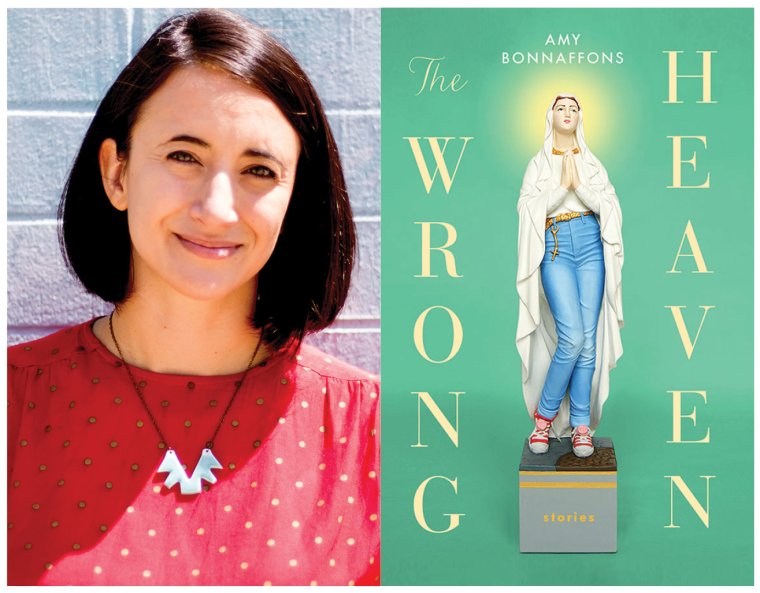
Amy Bonnaffons, author of The Wrong Heaven. (Credit: Kristen Bach)
Ten Questions for Keith Gessen
This week’s installment of Ten Questions features Keith Gessen, whose second novel, A Terrible Country, is out this month from Viking. A literary portrait of modern Russia, A Terrible Country tells the story of Andrei, a young academic living in New York who is called back to Moscow on the eve of the 2008 financial crisis to care for his grandmother. Once there, Andrei sees a country still grappling with the legacy of Soviet Russia and exhausted by Putin’s capitalism. “Gessen’s particular gift is his ability to effortlessly and charmingly engage with big ideas…while still managing to tell a moving and entertaining human story,” says George Saunders. “At a time when people are wondering whether art can rise to the current confusing poliltical moment, this novel is a reassurance from a wonderful and important writer.” Gessen is also the author of All the Sad Young Literary Men (Viking, 2008) and a founding editor of n+1. He is the editor of three nonfiction books and the translator or cotranslator, from Russian, of a collection of short stories, a book of poems, and a work of oral history, Nobel Prize-winner Svetlana Alexievich’s Voices From Chernobyl: The Oral History of a Nuclear Diaster (Dalkey Archive Press, 2005). A contributor to the New Yorker and the London Review of Books, Gessen teaches journalism at Columbia University.
1. How long did it take you to write A Terrible Country?
It took eight years. This is a little embarrassing to admit because it’s not like the book is a thousand pages long. At one point during the writing of it a friend who works in finance asked how long it would physically take to type a book if you knew all the words already, and the answer in my case, given how fast I type, was one week. And yet it still took eight years.
2. Where, when, and how often do you write?
If I’m writing, then the answer is whenever and however I can—in notebooks, on scraps of paper, whatever. I wrote large portions of this book in the Gmail app of my old Blackberry while on the subway. That was a great writing phone. Now I use “Notes” on the iPhone—am using it right now in fact—and of course compared to the old Blackberries the keyboard on the iPhone is bullshit. Progress isn’t always progressive.
3. What was the most surprising thing about the publication process?
It’s been ten years since I published my first/previous novel, so a lot has changed. One obvious thing is the number of new outlets that do interviews, podcasts, etc.—I thought I would find this annoying but actually I like it. I’ve met a bunch of great readers and writers already just through the various interviews.
4. Where did you first get published?
My first non-student publication was in AGNI. I sent a story to Sven Birkerts through my friend George Scialabba, and he took it. I was just out of grad school and wondering if anyone outside my workshop would ever read anything I wrote, so it was very encouraging.
5. What are you reading right now?
Sheila Heti’s Motherhood and Tony Wood’s forthcoming Russia Without Putin. Both excellent.
6. If you were stuck on a desert island, which book would you want with you?
A classic question but I find it hard to answer. Under what circumstances did I arrive on this island? Will I have an opportunity to seek revenge on the forces that put me here? And how long am I here for? Am I Lenin in Finland, just biding my time until I return, or Trotsky in Mexico, counting the days till my assassins arrive? Is this a difficult island to survive on—is it literally a desert?—or an easy one? Would I find it useful and heartening to read about someone in a similar situation, like Robinson Crusoe, or would I find it annoying because he had it so much easier? Finally, who owns the island? Do I need to pay rent?
7. Who is the most underrated author, in your opinion?
Rebecca Curtis. She should be a household name.
8. What is the biggest impediment to your writing life?
Sloth. Indecision. Inconstancy.
9. What trait do you most value in your editor or agent?
My editor at Viking, Allison Lorentzen, is amazing. She is brilliant and ruthless and thoughtful, all at once. I guess if there’s one particular trait, at the risk of sounding cheesy, it’s passion. Or commitment, to choose a more respectable-sounding word. Either way, it’s the ability to persevere in a very tough business, living with both constant pressure and constant disappointment. You can’t keep doing it and doing it well if you don’t care.
10. What’s the best piece of writing advice you’ve ever heard?
I once heard George Saunders tell a story about being edited at the New Yorker, where his editor kept asking him to cut a highly precise number of lines—18 lines, 25 lines. And George would go do it each time thinking that the editor had a very specific vision for his story. But then he realized the editor just wanted it to be shorter. And the advice here was: There’s almost no piece of writing that can’t be improved by removing 18, then 25, then 21 lines; i.e. you can almost always make something better by making it shorter. This interview being the rare exception to that rule.
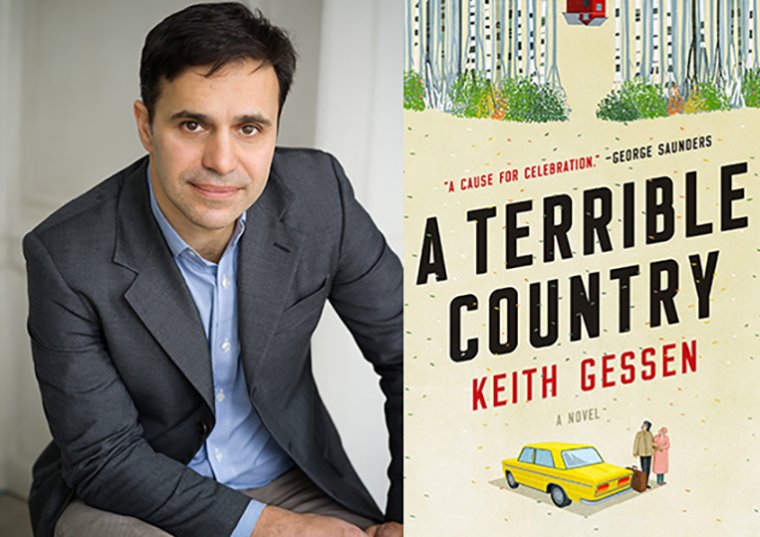
Keith Gessen, author of A Terrible Country (Viking).
Ten Questions for Alexia Arthurs
This week’s installment of Ten Questions features Alexia Arthurs, whose debut story collection, How to Love a Jamaican, is out today from Ballantine Books. Drawing on Arthurs’s own experiences growing up in Jamaica and moving with her family to Brooklyn, New York, at age twelve, the stories in this collection explore issues of race, class, gender, and family, and feature a cast of complex and richly drawn characters, from Jamaican immigrants in America to their families back home, from tight-knit island communities to the streets of New York City and small Midwestern college towns. Arthurs is a graduate of Hunter College in New York City and the Iowa Writers’ Workshop, and her stories have been published in the Virginia Quarterly Review, Vice, and the Paris Review, which awarded her the Plimpton Prize in 2017.
1. Where, when, and how often do you write?
I love lattes and coffee shop ambiance, but whenever I try to write in public, I regret it. Everything and everyone is too loud. I need to be in the privacy and quiet of my home, at my desk with a cup of tea. I drink lots of tea when I write. My magic hours are between 12 AM and 2 AM or until I absolutely can’t keep my eyes open anymore. If I’m working on something, I try to write as often as I can—every day, every other day, whenever I can. I can go weeks without writing if the material isn’t pressing. I can’t decide if my writing is better when I feel inspired, or if it’s the process that feels more pleasant.
2. How long did it take you to write How to Love a Jamaican?
I wrote the first story, “Slack,” during my first year of graduate school—this was late 2012 or early 2013. I finished the last story during the winter of 2017.
3. What has been the most surprising thing about the publication process?
Often writers talk about writing in an individualized way, our dreams and failures, but on the other end, it feels like a community project—it’s for the culture, for my culture. How to Love a Jamaican feels bigger than me. A surprising and beautiful realization. I’ve gotten messages from people who tell me that they were waiting on a book like mine.
4. Where did you first get published?
I published a short story called “Lobster Hand” in Small Axe.
5. What are you reading right now?
All the Names They Used for God by Anjali Sachdeva. It’s incredible. This is such a good year for short story collections.
6. If you were stuck on a desert island, which book would you want with you?
The Bible I’ve had since I was a teenager. It’s marked-up and worn, and it is one of the most precious things I own. I’m not religious anymore, or I’m still trying to figure out my relationship with religion, but my family is, and my father was a minister when I was growing up, so Biblical stories still hold personal relevance for me.
7. Who is the most underrated author, in your opinion?
Whenever I’m asked this question (if I’m asked this question again—I was asked this question last week) I’m going to name short story collections I love. We need to get more people reading story collections! I really admire You Are Having a Good Time by Amie Barrodale and Are You Here For What I’m Here For? by Brian Booker.
8. What is the biggest impediment to your writing life?
All of my feelings and daydreaming. It’s hard sometimes to sit still and trust the process. The other challenge is the pain of recognizing myself in my writing because my stories come from such a personal place. I don’t always feel like looking in a mirror.
9. What trait do you most value in your editor?
Kindness. Intelligence is nice, but kindness is lovelier. Andra Miller has both. I respect her as a person and as a thinker.
10. What’s the best piece of writing advice you’ve ever heard?
I took photographs in high school. There was a dark room, which now feels like a small miracle in a public high school in Brooklyn, New York. When I was graduating, my photography teacher, Mr. Solo, gave me a little book—The Mind’s Eye: Writings on Photography and Photographers by Henri Cartier-Bresson. He taped one of my photographs in one of the blank pages and wrote a note saying that he hoped I would stay involved in art-making wherever life took me. Not really advice, but encouragement, which for me is the same thing. I still have that book. What he did was one of the most generous things a teacher or anyone has ever done for me.
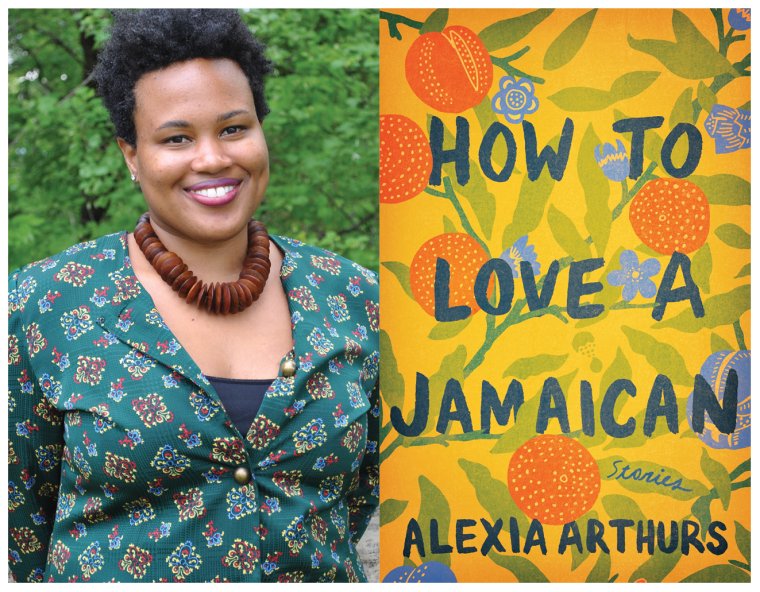
Alexia Arthurs, author of How to Love a Jamaican. (Credit: Kaylia Duncan)
Ten Questions for Sharlene Teo
This week’s installment of Ten Questions features Sharlene Teo, whose debut novel, Ponti, is out today from Simon & Schuster. Praised by Tash Aw as “not just a singular debut, but a milestone in Southeast Asian literature,” Ponti is the tale of three women in modern-day Singapore: Szu, a teenager living in a dark house on a cul-de-sac; her mother, Amisa, once a beautiful actress starring in a series of cult horror movies as a beautiful, cannibalistic monster, now a hack medium performing séances with her sister; and the privileged, acid-tongued Circe. Told from the perspective of each of the three women, Ponti explores the fraught themes of friendship, memory, and belonging. A Singaporean writer based in the UK, Teo is the winner of the inaugural Deborah Rogers Writers’ Award, the 2013 David T. K. Wong Creative Writing Fellowship, and the 2014 Sozopol Fiction Fellowship. Her writing has appeared in publications such as Esquire UK, Magma Poetry, and Eunoia Review.
1. Where, when, and how often do you write?
I write mostly at my desk, at home. Thinking best in the morning before the weight of the day and the effluvium of social media and the news cycle settles in. When I’m in the middle of a project I’ll work on it whenever I can. In between projects, or struggling to finish something unpleasant before I can get back to fiction writing (like now), I make cryptic notes that I have trouble decoding later, as often as I can. But I read all the time, which I think is a form of thinking novelistically.
2. How long did it take you to write Ponti?
The first, failed iteration took me two years: from 2012 to 2014. I restarted it and that draft took two years: 2014 to 2016. And then the editorial process.
3. What was the most surprising thing about the publication process?
How gently collaborative it’s been. My editors were exacting but never didactic. Postpublication, my publicist is a life buoy. And everything is out of my control since I handed in the final edits, including (this is hard to let go of) how people respond to it.
4. If you could go anywhere in the world for a writing retreat where would it be?
A really high-tech underwater retreat somewhere in the Pacific Ocean where you can see whales and jellyfish through the glass but any time you like you get taken back up to the surface to crystalline beaches. The food would be really good, fresh seafood, and everything would be sustainable and not exploitative in any way and there would be plenty of pasta available too.
5. What are you reading right now?
The Woman in the Dunes by Kobo Abe. It’s claustrophobic, terrifying, and has incredible narrative momentum. I know it’s been adapted into a film already, but right now as I read it I’m imagining it as a psychological thriller codirected by Kiyoshi Kurosawa, Jonathan Glazer, and Alfred Hitchcock.
6. Who is the most underrated author, in your opinion?
Mary Gaitskill. I feel like she’s always been fearless, way ahead of the curve.
7. Where did you first get published?
It must have been in a creative writing anthology in Singapore, for teenaged poets.
8. What is the biggest impediment to your writing life?
My crippling self-doubt and imposter syndrome. My Eeyorish tendencies. My over-analysis and constant need for approval and comparison.
9. What trait do you most value in your editor or agent?
Their perceptiveness, empathy, and patience.
10. What’s the best piece of writing advice you’ve ever heard?
The Anne Lamott classic: The first draft is the down draft; get the words down. The next draft is the up draft: Fix it up, somehow. Or also (I forgot where I heard this from) to doubt yourself means you’re on to the right thing. I find that reassuring.
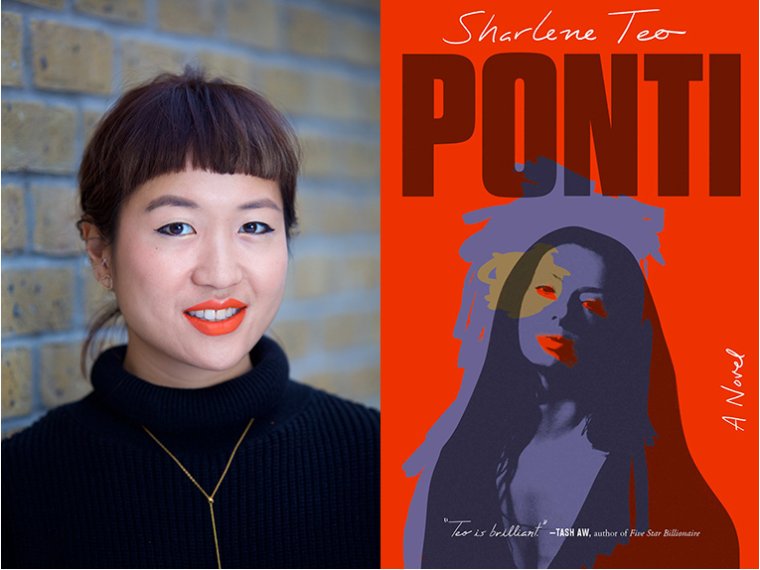
Sharlene Teo, author of Ponti. (Credit: Barney Poole)
Ten Questions for Jos Charles
This week’s installment of Ten Questions features Jos Charles, whose new poetry collection, feeld, is out today from Milkweed Editions. Charles’s second book is a lyrical unraveling of the circuitry of gender and speech. In an inventive transliteration of the English language that is uniquely her own—like Chaucer for the twenty-first century: “gendre is not the tran organe / gendre is yes a hemorage,” she writes—Charles reclaims the language of the past to write about trans experience. “Jos Charles rearranges the alphabet to survive its ferocity against her body,” writes Fady Joudah, who selected the collection as a winner of the National Poetry Series. “Where language is weaponized, feeld is a whistleblower, a reclamation of art’s domain.” Charles is the author of a previous poetry collection, Safe Space, published by Ahsahta Press in 2016, and is the recipient of a Ruth Lilly and Dorothy Sargent Rosenberg Fellowship and a Monique Wittig Writer’s Scholarship. She received an MFA from the University of Arizona and lives in Long Beach, California.
1. How long did it take you to write the poems in your new book?
I began writing many of the poems in feeld in 2014; I had a compiled set of them in 2016 and completed the edited, to-be-published version in 2017.
2. Where, when, and how often do you write?
When writing the poems that make up Safe Space, I was working retail and then an office job. So I would spend, on a productive weekday, one to two hours writing and editing and about two to three hours a day reading, researching, and taking notes. Weekends I was more intensive. With feeld, I was writing during an MFA program, which meant time was a little less discrete. I wrote an hour or two a day, edited for about two hours a day, and spent four or so hours reading and taking notes. I’ve maintained something close to that now. That said, there can be weeks I don’t write and weeks where I’m writing much more. I write at my laptop, phone, or in a notebook, and just about anywhere.
3. What was the most unexpected thing about the publication process?
The most unexpected thing is how people have found uses to my work. I say this not to self-negate, but to communicate the surprise, the praise, of people coming to find, leave, return to art.
4. Would you recommend writers pursue an MFA?
If you can get into a funded program, yes—it is better pay, hours, and easier than working retail. If you can afford to pay for an MFA, it seems you have access to most resources the MFA provides and your money would be better spent elsewhere—like paying for someone else to get an MFA. It seems to me not worth going in debt over.
5. What are you reading right now?
I recently reread Virginia Woolf’s The Waves and manuel arturo abreu’s transtrender, both of which are beautiful works. I recently subscribed to the Trans Women Writers Collective, which sends out a booklet of writing by a different trans woman writer each month. If you’re able, you ought to sign up for it.
6. Who is the most underrated author, in your opinion?
I frequently have been finding myself recommending Eduoárd Glissant’s poetry. Le Sel noir is a particularly astounding work.
7. What is one thing you’d change about the literary community and/or the publishing business?
Its problems are many and the same as the problems most everywhere else, just articulated in a “literary” way. I would, ideally, want the conditions that give rise to all these problems to be fundamentally removed. This would include “big” things like the United States government as it exists, has existed; profit, private ownership of public goods and labor. The old socialist hopes. It would also include those “smaller” things like behaviors and words and presumptions. In lieu of this, if not this, until this, I could see, as a kind of coping with these conditions, an extramarket or extragovernmental body that organizes material support for writers. A public fund where writers get together and try to decide what to do with the pharmaceutical, supermarket, and other such kinds of money that somehow found its way—through tax write offs, donations—to “the writing community,” to be distributed to the most vulnerable within that community. Of course, violences are not equal, so there would need to be some sort of weighted system to determine distribution of funds based on “quantifying” larger social exclusions. I imagine there’d be fewer prizes and grants and more public goods and services—like housing for writers without fixed addresses or legal support for incarcerated writers, online or mailed lending libraries. This would require middle-class, largely academic-situated writers to forgo their grants and, many having faced financial and housing instability before, unfortunately, to become adjacent to those horrors again. That’s what is at stake though. It’s a messy thought for a messy time.
8. What is the biggest impediment to your writing life?
I can’t think of any impediments unique to my writing life, only impediments that are obvious, manifold, to life in general that happen to additionally hinder my writing life: money, other people, myself.
9. What’s one thing you hope to accomplish that you haven’t yet?
I would like to one day run a local, worker’s paper. It would include creative work, organizational events, opinion pieces, and lots of collectivizing of labor, goods. It would also inevitably be time-consuming and a financial failure.
10. What’s the best piece of writing advice you’ve ever heard?
Saeed Jones once said—and I may very well be misquoting—poets don’t make money. If they have money, it came from somewhere that wasn’t, at least initially, directly their writing. Maybe support from parents, another job, or, if lucky, eventually and in addition, a grant here and there, an academic or nonprofit job. As someone who had been writing and publishing for close to ten years before making any money off of my writing, and then certainly not enough to sustain myself, it was good to hear at that time. Which is to say, in a system that doesn’t value writing, but only the marketing possibility of the writer and the written object, to write is the “success” itself. It’s both disheartening and astonishing. So you make a market of yourself and keep what you can off the books. Along the axes of familiar identarian violences, this is typical: You cross the street to walk over there, you shut up there to speak over here, you sell your wares to buy some shoes—and if not shoes, a coke; if not a coke, a book; if not a book, a bag of rice. And what isn’t your wares?
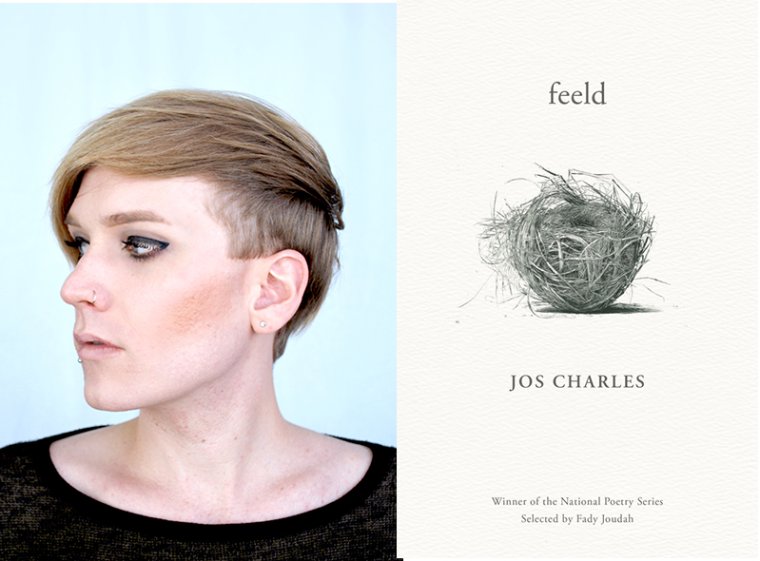
Jos Charles, author of feeld. (Credit: Cybele Knowles)
Ten Questions for Jasmine Gibson
This week’s installment of Ten Questions features Jasmine Gibson, whose debut poetry collection, Don’t Let Them See Me Like This, is out this month from Nightboat Books. In poems that inexorably tie the personal to the political, Gibson speaks to the disillusioned in moments of crisis, whether in the aftermath of Hurricane Katrina or in the long, slow echo of the Syrian civial war. “Reading this collection is like listening to love poems on a dock while watching transnational cargo ships on fire and sinking,” writes poet Tonga Eisen-Martin about the collection. “Here there are no gods of private causes. Just words dashing on our behalf, only a breath’s distance in front of the beast.” Gibson is also the author of the chapbook Drapetomania, released by Commune Editions in 2015, and coauthor, with Madison Van Oort, of the chapbook TimeTheft: A Love Story (The Elephants, 2018). Originally from Philadelphia, Gibson lives in Brooklyn, New York.
1. How long did it take you to write Don’t Let Them See Me Like This?
The book was written over the course of three years. It has changed a lot from what it was originally supposed to be. I thought it would only be two years of work, which is what it was at first. Different things happened, choices made, no love lost, and now it’s a three-year-old maenad waiting to be born.
2. Where, when, and how often do you write?
When I first started writing about five years ago, I would go to this specific bar in Manhattan’s West Village and do a whole ritual. I’d get my paycheck, get a book from St.Mark’s Bookstore, then a banh mi, and then four margaritas in I’d start writing in the darkness of the bar. I did this ritualistically: a specific day, a specific time, a specific bar, alone in the dark. I don’t do this anymore. I like writing in the sun, in bed, in the middle or after kissing. I’m a true Leo, I love love, and writing is like love. It’s painful sometimes, but it really burns you in a way that everyday stuff doesn’t really do. It reminds me of this Bobby Womack quote I saw once: “I live for love. I’ve always been tortured by love. I don’t mind the pain. I want to be the king of pain.” And in a way I, too, love to be the King of Pain, Queen of Ache.
3. What was the most surprising thing about the publication process?
Everyone says time, but babies come when they want to come, that’s what books are like. I’d say the most surprising thing is how the publication process really makes your world smaller and prepares you for postpartum from your book. It gives you a little taste into the way people think about you and your work. It’s really truth telling.
4. Where did you first get published?
I got published first by Commune Editions. They were, at that time, the only people to really dig my work before anyone else.
5. What are you reading right now?
Raquel Salas Rivera’s Lo terciario / The Tertiary, Reek Bell’s A Great Act, and Claude McKay’s A Long Way From Home.
6. Who is the most underrated author, in your opinion?
Authors outside of institutions. That’s where the most interesting work is coming from. With institutions, it’s always this bait-and-switch thing that happens that puts a straight jacket on people’s work.
7. What is the biggest impediment to your writing life?
Myself, sometimes I’m unsure, sometimes I’m hubris. I think when I wrote TimeTheft: A Love Story with Madison Van Oort, I was able to balance out my own thoughts with her level headedness.
8. What is one thing you’d change about the literary community and/or the publishing business?
My most genuine response would be that it was more accessible to voices that are pushed to the margins. But also I think this response gets perverted by the publishing and literary community, which is why you have “special”(fetish) issues to talk about subjects that are just normal ways of living for a lot of people. So, I’d say: more incendiary small presses and zine makers to the front.
9. When you’re not writing, what do you like to do?
I like to hangout with friends, drink, talk to my mom and sister, and go on dates with my partner. I like reading about strange factoids and record shopping.
10. What’s the best piece of writing advice you’ve ever heard?
There is none really, either it’s classicist or unfeasible. I think sincerity is important to the process of writing, because the work really can speak for itself, and no one can pimp that out. So, mine is this: Get in where you fit in, and where you don’t, break it.
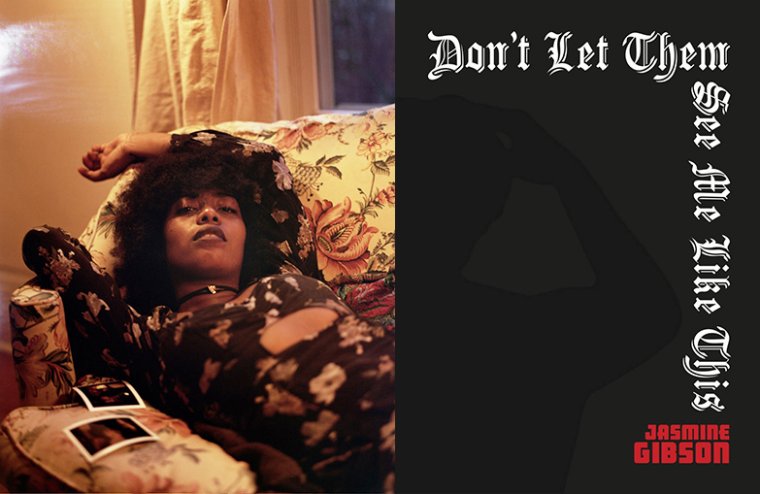
Jasmine Gibson, author of Don’t Let Them See Me Like This. (Credit: Sean D. Henry-Smith)
Ten Questions for J. M. Holmes
This week’s installment of Ten Questions features J. M. Holmes, whose debut story collection, How Are You Going to Save Yourself, is out today from Little, Brown. This linked collection follows a decade in the lives of Dub, Rolls, Rye, and Gio, four young friends coming of age in Pawtucket, Rhode Island, grappling with the complexities of family history and class; the discovery of sex, drugs, and desire; and the struggle to liberate themselves from the legacies left to them as Black men in America. Holmes is, as Rebecca Makkai puts it, “not just a new voice but a new force: honest, urgent, compelling, often hilarious, and more often gut-wrenching.” Born in Denver and raised in Rhode Island, Holmes is a graduate of the Iowa Writers’ Workshop, and his stories have appeared in the Paris Review, the White Review, and H.O.W. He lives in Milwaukee, Wisconsin, and is currently at work on a novel.
1. Where, when, and how often do you write?
Starting with a simple question and I can’t even answer this one. I used to write at night a lot, very late when everything is quiet. I’m not much of a morning person. Lately, I’ve been writing on my phone at work when it’s slow and we don’t have any tickets in the kitchen—sacrilege, I know.
2. How long did it take you to write How Are You Going to Save Yourself?
Some of the stories are revamped versions of pieces I wrote as an undergrad, so I guess seven years. It pains me to say that since it makes those 250 pages seem really small. The bulk of the collection was written between 2015 and 2016, though.
3. What has been the most surprising thing about the publication process?
How little control I have over it. It is a terrifying process to release your literary babies into the world, where anybody can say anything they want about them. Also, just how long it takes from sale to shelf—slowest seventeen months of my life.
4. Where did you first get published?
I got published in some student publications as an undergrad, but the first time I got paid for anything literary was the Paris Review. (Shameless shout out to Anna, my agent. She’s dope.)
5. What are you reading right now?
Currently, I’m reading Tao: The Watercourse Way by Alan Watts and Ohio by Stephen Markley. They are very different books. The former is probably in conjunction with my answer to the publication process question. Trying to fill the Zen reserves (even though it definitely doesn’t work like that) before this process really takes off.
6. If you were stuck on a desert island, which book would you want with you?
You mean if I couldn’t have any albums? Cause music would be the first piece of art I took with me—probably [Kendrick Lamar’s] Section.80 or Channel Orange. And am I stranded for an indefinite amount of time? Cause if not I’d probably pick something long enough to keep me occupied until I’m rescued. Enough deflecting; tough question. Maybe The Brothers Karamazov. I feel like that book would satisfy my philosophy itch and still give me a plot to escape through. I’ve only read it in its entirety once, but the excerpts I’ve read here and there since then keep revealing new things to me.
7. Who is the most underrated author in your opinion?
Claude McKay or Breece D’J Pancake. The latter cause he took his own life so young and has a small body of work. The former, I don’t really know, maybe because he was writing at a time when there were a lot of literary sharks in the water—Zora Neale Hurston, James Baldwin, Richard Wright. But either way, they both deserve to be on ELA curriculums in the United States.
8. What is the biggest impediment to your writing life?
Paying rent.
9. What trait do you most value in your editor?
Attention to detail. I know it sounds like an obvious one, but Ben George is a meticulous dude when it comes to the written word. We’ve had debates over single words. He was also instrumental in helping me hammer out all the age and time continuities in the book.
10. What is the best piece of writing advice you’ve ever heard?
Almost everything Amity Gaige has ever told me probably ranks up there. When I was graduating from college she told me to go get a job and live a little. She said, “Learn how to write and have a job and if you’re still writing and yearning to write, you’ll be fine. You’ll be a writer.” Either that or, “Don’t write drunk too often, you’ll lose the sound of your own voice.” Her husband might’ve said that one, actually. Either way, they both come from her section and they’re both true.
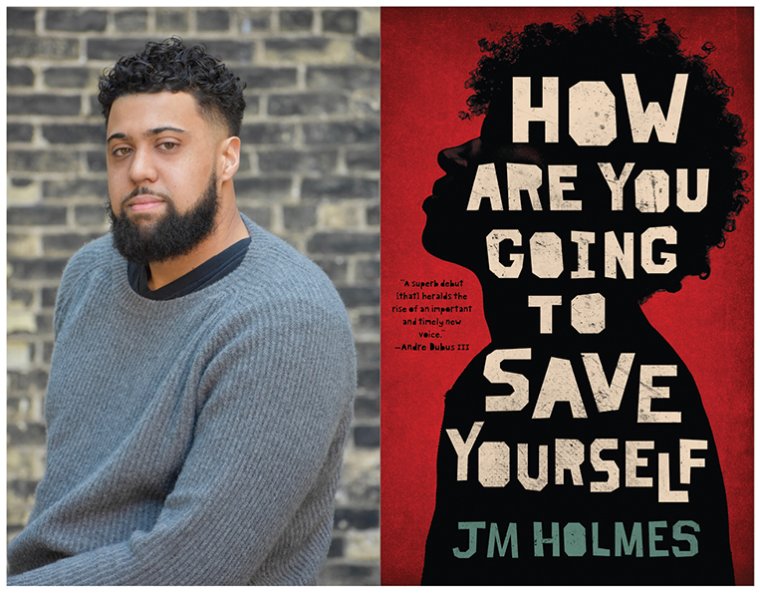
J. M. Holmes, author of How Are You Going to Save Yourself. (Credit: Julie Keresztes)
Ten Questions for Claire Fuller
This week’s installment of Ten Questions features Claire Fuller, whose third novel, Bitter Orange, is out today from Tin House Books. A literary mystery, Bitter Orange is the story of Frances Jellico, who, in the summer of 1969, takes a job researching the architecture of a dilapidated mansion in the English countryside and finds a peephole underneath a floorboard in her new bathroom that gives her access to her neighbor’s private lives. Novelist Gabriel Tallent calls it “a twisty, thorny, darkly atmospheric page-turner.” Fuller, who didn’t start writing until she was forty, is the author of two previous books, Swimming Lessons (2017) and Our Endless Numbered Days (2015), both published by Tin House Books. She lives in Hampshire, England, with her husband and two children.
1. Where, when, and how often do you write?
I worked for so many years in a nine-to-five-thirty job that I can’t get out of that habit. I’m at my desk most days for most of the day, doing bits of novel writing, in between other bits of writing, answering e-mails, and reading. I try to keep weekends free of writing, but depending on where I am in the cycle of publishing that doesn’t always work.
2. How long did it take you to write Bitter Orange?
Almost exactly two years, and then some additional time for edits and so on. I keep a writing diary, just a line a day with my word count and whether the day has gone well or badly. Mostly it’s badly, but that helps to look back on when I’m writing the next one.
3. What was the most surprising thing about the publication process?
How long it can take from a publisher buying a novel to that book being on the shelves in bookshops. I’m not a very patient person and having to wait so long —nineteen months in one case—is not easy.
4. What is one thing you’d change about the literary community and/or the publishing business?
I’d like there to be less focus on one lead book a season by large publishers, and instead for them to spread their publicity and marketing budgets more broadly. Industrywide it seems that only a few books get a massive push, while lots of many brilliant novels that publishers have bought are left to either sink or swim by themselves.
5. What are you reading right now?
I’m reading Fever Dream by Samanta Schweblin, translated by Megan McDowell. It’s a sinister and strange story so mixed up and feverish that it’s hard to tell what’s real and what isn’t. Reading it is a wonderful distraction.
6. Who is the most underrated author, in your opinion?
I think Barbara Comyns could be better known. Her novels are wonderfully quirky, full of people who levitate or go mad from ergot poisoning. It’s hard to know whether she’s underrated—there are a lot of people who know her work, but probably lots more who don’t.
7. What trait do you most value in an editor?
I’m lucky to have two amazing editors: Juliet at Penguin in the UK, and Masie at Tin House in the US. They both work very differently, and although sometimes I’m sitting in the middle trying to sort out differing advice, I value hugely what they both have to say. Juliet is very good at the high-level view of a novel, while Masie and I will have long Skype conversations about whether a ‘sleeveless vest’ is actually a thing, whether US readers will have heard of Fuzzy Felt, or if Americans eat cauliflower cheese or cauliflower with cheese sauce. I love getting into the nitty-gritty of a novel, right down to the sentence and the word level.
8. What is the biggest impediment to your writing life?
My own procrastination. Reading all my reviews (and no, it’s not possible to stop). My untidy writing room. My cat, who I got in order to have a writer’s cat, but who loves my husband more than me. Reading other people’s brilliant novels (and no, I’m not going to stop).
9. What’s one thing you hope to accomplish that you haven’t yet?
Finish my fourth novel? Or just write the next damn sentence. When I’m only at 11,000 words all of it feels like an insurmountable task.
10. What’s the best piece of writing advice you’ve ever heard?
Write like “none of it happened, and all of it is true,” which, if I’ve got my source correct, is something Ann Patchett’s mother said.

Claire Fuller, author of Bitter Orange. (Credit: Adrian Harvey)
Ten Questions for Catherine Lacey
This week’s installment of Ten Questions features Catherine Lacey, whose new story collection, Certain American States, is out today from Farrar, Straus and Giroux. Lacey’s formidable range as a fiction writer is on full display in a dozen short stories populated by ordinary people seeking the extraordinary, from a young New Yorker trying to decipher a series of urgent, mysterious messages on a stranger’s phone (“ur heck box”) to a nameless man recently fired by “The Company” who wakes up in a purgatory of linens and pillows (“The Grand Claremont Hotel”). Lacey is the author of the novels The Answers (2017) and Nobody Is Ever Missing (2014), both published by FSG. She has won a Whiting Award, was a finalist for the NYPL’s Young Lions Fiction Award, and was named one of Granta’s Best Young American Novelists in 2017. Her novels have been translated into French, Italian, Spanish, Dutch, and German. With Forsyth Harmon, she coauthored a nonfiction book, The Art of the Affair, published by Bloomsbury last year. Born in Mississippi, she lives in Chicago.
1. How long did it take you to write the stories in Certain American States?
The oldest story in Certain American States was written in 2012, and the newest was finished in early 2018. But I also wrote two novels during those six years, and I wrote several other stories that I did not include in the collection.
2. Where, when, and how often do you write?
I write every day, usually first thing in the morning until lunch, unless there are extenuating circumstances. Writing regularly has always been the primary way I’ve avoided a nervous breakdown, so it’s unclear to me whether it’s a joyful or medicinal activity. It’s probably both.
3. What was the most unexpected thing about the publication process?
Being translated was a shock to me. It continues to be a shock. Based on reception, it seems my novels are better in Italian than English.
4. When did you realize you wanted to be a writer?
There are two senses in which a person is a writer; only one of them matters. The more important sense is that you are a person who writes. I don’t recall making the decision to be that writer; I was always writing. The second sense is that you somehow convince other people to pay you to write. I was slow to accept that I wanted to be that sort of writer, or rather I was slow to believe that it was even an option for me, so the moment I realized I had that desire is similarly difficult to track.
5. What are you reading right now?
Mules and Men by Zora Neale Hurston.
6. Who is the most underrated author, in your opinion?
Unfortunately, it’s probably someone I’ve never read. The amount of books that were either not written or not published because the authors did not believe anyone would ever care, or could not find the people who would care, is staggering.
7. What is one thing you’d change about the literary community and/or the publishing business?
I wish American publishers would pursue more work in translation, especially from smaller countries.
8. What is the biggest impediment to your writing life?
Wanting to read all the time. Illness. The weather. My own overwrought tendency toward nostalgia.
9. What’s one thing you hope to accomplish that you haven’t yet?
It’s always the next book. I don’t think beyond the book I’m writing and I’m always writing one.
10. What’s the best piece of writing advice you’ve ever heard?
You can only do a day’s work in a day.
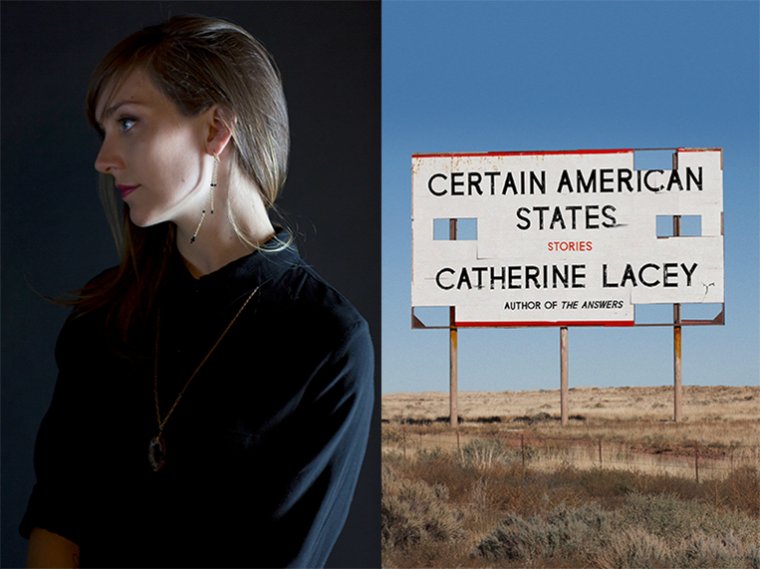
Catherine Lacey, author of Certain American States. (Credit: Willy Somma)
The Written Image: The Art of the Affair
Creative people are drawn to each other, as notorious for falling in love as they are for driving each other insane,” writes novelist Catherine Lacey in her latest book, The Art of the Affair: An Illustrated History of Love, Sex, and Artistic Influence. “Seen a certain way, the history of art and literature is a history of all this love.” Throughout the book, out this month from Bloomsbury, Lacey maps many romantic entanglements, collaborations, and friendships between some of the most famous writers and artists of the twentieth century. Accompanied by Forsyth Harmon’s vivid watercolors of each writer and artist, the book spans many disciplines, with anecdotes about the legendary salons of Gertrude Stein, the modern-dance luminaries Martha Graham and Merce Cunningham, and denizens of the jazz world of Ella Fitzgerald.
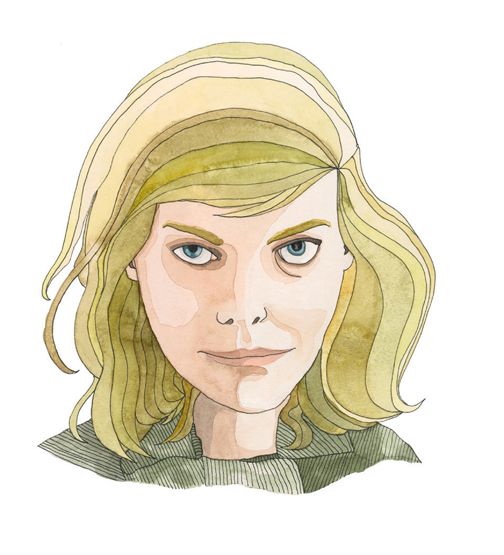
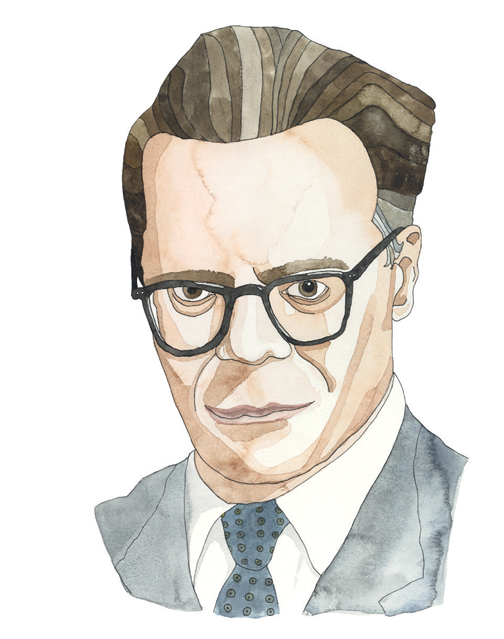
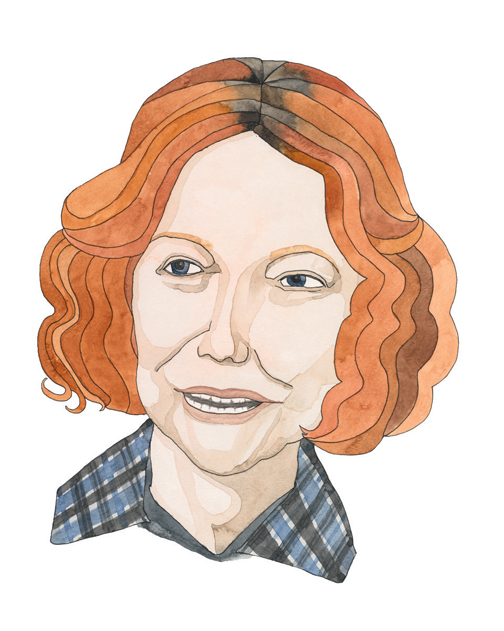
Lacey excavated these connections by reading artist biographies, obituaries, articles, and letters. While many of the liaisons discussed in the book are well known—like the fraught affair between Oscar Wilde and Lord Alfred Douglas and the rocky marriage between Zelda and F. Scott Fitzgerald—Lacey also constellates seemingly disparate sets of artists whose lives happened to intersect: how, for instance, Pablo Picasso once met and drew on the hands of the heiress and writer Caroline Blackwood (above left), who later fell in love with the poet Robert Lowell (center), who then divorced the writer and critic Elizabeth Hardwick (right), who once profiled the singer Billie Holiday, who in turn had an affair with the filmmaker Orson Welles, and so on. The book is a reminder that art is not created in a vacuum, but arises out of the chemistry, envy, and camaraderie among those who love and create it.
Ten Questions for Amitava Kumar
This week’s installment of Ten Questions features Amitava Kumar, whose new novel, Immigrant, Montana, is out today from Knopf. This coming-of-age novel tells the story of Kailash, a young Indian immigrant who arrives in New York City in 1990 to study post-colonialism. What follows is a series of romantic entanglements, a trip to Montana, and the intellectual and personal awakenings of a young man exploring what it means to be home—or be without one. “In this land that was someone else’s country,” Kailash says, “I did not have a place to stand.” Kumar, who grew up in Patna, India, is the author of several books of nonfiction, including the essay collection Lunch With a Bigot: The Writer and the World (Duke University Press, 2015), and a novel, Nobody Does the Right Thing (Duke University Press, 2010). His journalism has appeared in the New Yorker, the New York Times, Granta, Guernica, Harper’s, the Nation, NPR, and elsewhere, and he has received fellowships in literature from the Guggenheim Foundation and the Ford Foundation. He is a board member of the Asian American Writers Workshop and lives in upstate New York, where he is the Helen D. Lockwood professor of English at Vassar College.
1. Where, when, and how often do you write?
I write in my study. My house is right across the street from Vassar College but my study is at the back of the house and overlooks a creek. After my kids have left for school, I sit down to write and then go walking beside the water. I write every day and walk every day.
2. How long did it take you to write Immigrant, Montana?
Decades. Or, I wrote the opening scene on a train when I was going to interview for my first job, as an assistant professor at a university. Other books happened. I wrote other scenes and it wasn’t till three years ago, during a residency at Yaddo, that things fell into place.
3. What has been the most surprising thing about the publication process?
How easy it becomes once you have an agent. My last agent was sick and in the hospital when I finished my novel. He was dying. I couldn’t bother him, of course, so I sent out the book on my own. There were no takers. One of the editors made me wait for months on end. Another asked a friend whether my agent was really in the hospital. When my agent died, I acquired another agent. I had a book deal within three days.
4. Where did you first get published?
I’m old. I have been writing and publishing for such a long time that it’s difficult to remember. A part of this novel was first published years ago in a newspaper in India. But in terms of my career, to be honest, I felt I had really published when I got into the pages of Granta. Why? Because it had been a dream for so long.
5. What are you reading right now?
I’m about a hundred pages into Preti Taneja’s We That Are Young. Taneja is very alert to social hierarchies but one of the other fascinating things about the book is that it is a rewriting of King Lear and set in modern-day India. I’ve just finished reading Lisa Halliday’s Asymmetry, a fascinating book for different reasons. What intrigued me most was the structure. I’m going to Milan next month, where Halliday lives, and if I bump into her I want to shower her with compliments and questions.
6. If you were stuck on a desert island, which book would you want with you?
I must confess that there are any number of big books that I haven’t read. The enforced stay on a desert island might just be the ticket. I’d be able to finally read Ulysses or Moby Dick or War and Peace.
7. Who is the most underrated author, in your opinion?
You know, one of the writers I always want to tell my students about is David Markson. This is Not a Novel is a masterpiece of formal invention. I’m surprised that when the world discusses Indian writing, the name of A. K. Ramanujan doesn’t come up more often. His poetry as well as his translations should have earned him a place in the pantheon.
8. What is the biggest impediment to your writing life?
Not what but who. Mark Zuckerberg. I’m kidding—but not really.
9. What trait do you most value in your editor or agent?
In my editor, the talent for seeing things whole: You are entering a room, or stepping on a stair, but you know always where you are in the house. And in my agent, who moves very fast, the ability to remind me about the virtue of patience.
10. What’s the best piece of writing advice you’ve ever heard?
This isn’t very original. But I can’t tell you how often I’ve been consoled or encouraged by that old line from E. L. Doctorow: “Writing a book is like driving a car at night. You only see as far as your headlights go, but you can make the whole trip that way.”
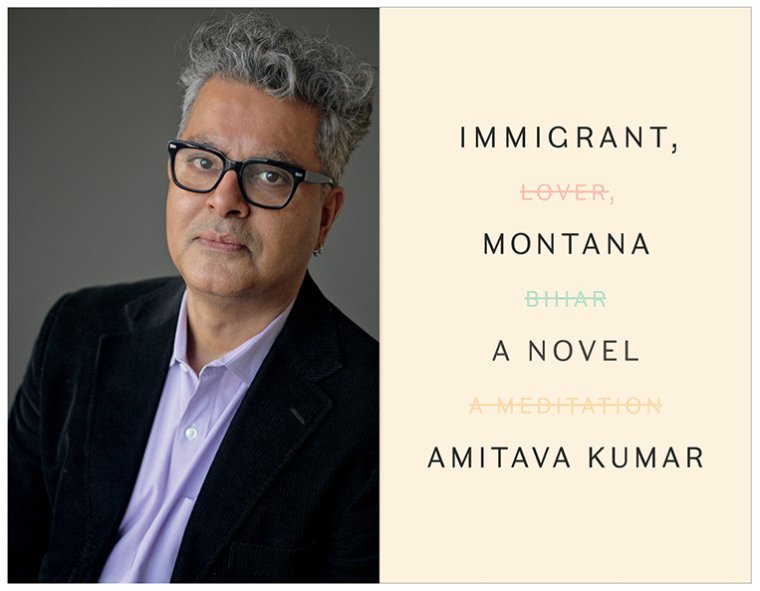
Amitava Kumar, author of Immigrant, Montana. (Credit: Michael Lionstar)
Ten Questions for Emily Jungmin Yoon
This week’s installment of Ten Questions features Emily Jungmin Yoon, whose debut poetry collection, A Cruelty Special to Our Species, is out today from Ecco. In the collection, Yoon explores gender, race, and the history of sexual violence against women, focusing in particular on so-called comfort women—Koren women who worked in Japanese-occupied territories during World War II. Yoon was born in Busan in the Republic of Korea and received her BA at the University of Pennsylvania and an MFA in creative writing from New York University. She won the 2017 Tupelo Press Sunken Garden Chapbook Prize for her chapbook Ordinary Misfortunes, and has been the recipient of awards and fellowships from Ploughshares, the Association of Writers and Writing Programs, and the Poetry Foundation, among others. Yoon’s poems and translations have appeared in the New Yorker, POETRY, and the New York Times Magazine, and she serves as poetry editor for the Margins, the literary magazine of the Asian American Writers Workshop. She is currently pursuing a PhD in Korean literature at the University of Chicago.
1. Where, when, and how often do you write?
I write at home, usually late night. I find that poems in my head become louder when everything is quiet. I write rather sporadically now, so there isn’t a fixed schedule, but when I was writing the poems in A Cruelty Special to Our Species, I would write maybe three to five days a week.
2. How long did it take you to write A Cruelty Special to Our Species?
To completion, about four years, but a good chunk of the poems came in early 2015, in the last semester of my MFA program at NYU—that was a very fruitful period.
3. What has been the most surprising thing about the publication process?
That time goes by so quickly! It took a little more than a year for the book to be published after the signing of the contract, and I felt like I just couldn’t wait. But after rounds of proofreading and editing, a year had already passed.
4. Where did you first get published?
My first magazine publication was the Claremont Review, a Canadian magazine that publishes works by writers and artists in the age range of 13 to 19 from around the world. It was very exciting and encouraging to see my poems in print among others.’ I’m grateful for the space that CR provides young creators.
5. What are you reading right now?
I am reading the complete works of Kim Su-young’s poetry, from 1945 to 1968. His poetry influenced a lot of other poets, and I’m interested in his relationship to language, as he was writing post-liberation and when linguistic nationalism was rampant.
6. If you were stuck on a desert island, which book would you want with you?
Maybe an instructive book on how to survive in the wild…. But for joy, Li-Young Lee’s Rose. There are so many amazing books, but Rose was my first love in poetry.
7. Who is the most underrated author, in your opinion?
She’s more unrecognized than underrated, perhaps, but: Ronyoung Kim. She was the author of Clay Walls, which is the first novel written in the U.S. about Korean immigrant experience. Published in 1986, Clay Walls was the first Korean American novel. Not many people now seem to know about her or the book, though it was nominated for the Pulitzer.
8. What is the biggest impediment to your writing life?
Stress from non-writing work, for sure. I have to deliberately and strategically clear out space and time to not think about any of that and focus on reading and writing poetry.
9. What trait do you most value in your editor?
I appreciate Gabriella Doob and Dan Halpern for their warmth, support, and trust. They believe in my vision and are just wonderful people.
10. What’s the best piece of writing advice you’ve ever heard?
Jericho Brown said to our class at Aspen Words, “Be your ultra-self.” I tend to be pretty self-conscious when writing; I think it’s good to be concerned and careful about specific words and their implications, but sometimes it disrupts the flow. So I try to imagine what a bolder, wilder, and more carefree me would say. Any part that doesn’t sit right can be edited later.

Emily Jungmin Yoon, author of A Cruelty Special to Our Species. (Credit: Jean Lechat)
Ten Questions for Amitava Kumar
This week’s installment of Ten Questions features Amitava Kumar, whose new novel, Immigrant, Montana, is out today from Knopf. This coming-of-age novel tells the story of Kailash, a young Indian immigrant who arrives in New York City in 1990 to study post-colonialism. What follows is a series of romantic entanglements, a trip to Montana, and the intellectual and personal awakenings of a young man exploring what it means to be home—or be without one. “In this land that was someone else’s country,” Kailash says, “I did not have a place to stand.” Kumar, who grew up in Patna, India, is the author of several books of nonfiction, including the essay collection Lunch With a Bigot: The Writer and the World (Duke University Press, 2015), and a novel, Nobody Does the Right Thing (Duke University Press, 2010). His journalism has appeared in the New Yorker, the New York Times, Granta, Guernica, Harper’s, the Nation, NPR, and elsewhere, and he has received fellowships in literature from the Guggenheim Foundation and the Ford Foundation. He is a board member of the Asian American Writers Workshop and lives in upstate New York, where he is the Helen D. Lockwood professor of English at Vassar College.
1. Where, when, and how often do you write?
I write in my study. My house is right across the street from Vassar College but my study is at the back of the house and overlooks a creek. After my kids have left for school, I sit down to write and then go walking beside the water. I write every day and walk every day.
2. How long did it take you to write Immigrant, Montana?
Decades. Or, I wrote the opening scene on a train when I was going to interview for my first job, as an assistant professor at a university. Other books happened. I wrote other scenes and it wasn’t till three years ago, during a residency at Yaddo, that things fell into place.
3. What has been the most surprising thing about the publication process?
How easy it becomes once you have an agent. My last agent was sick and in the hospital when I finished my novel. He was dying. I couldn’t bother him, of course, so I sent out the book on my own. There were no takers. One of the editors made me wait for months on end. Another asked a friend whether my agent was really in the hospital. When my agent died, I acquired another agent. I had a book deal within three days.
4. Where did you first get published?
I’m old. I have been writing and publishing for such a long time that it’s difficult to remember. A part of this novel was first published years ago in a newspaper in India. But in terms of my career, to be honest, I felt I had really published when I got into the pages of Granta. Why? Because it had been a dream for so long.
5. What are you reading right now?
I’m about a hundred pages into Preti Taneja’s We That Are Young. Taneja is very alert to social hierarchies but one of the other fascinating things about the book is that it is a rewriting of King Lear and set in modern-day India. I’ve just finished reading Lisa Halliday’s Asymmetry, a fascinating book for different reasons. What intrigued me most was the structure. I’m going to Milan next month, where Halliday lives, and if I bump into her I want to shower her with compliments and questions.
6. If you were stuck on a desert island, which book would you want with you?
I must confess that there are any number of big books that I haven’t read. The enforced stay on a desert island might just be the ticket. I’d be able to finally read Ulysses or Moby Dick or War and Peace.
7. Who is the most underrated author, in your opinion?
You know, one of the writers I always want to tell my students about is David Markson. This is Not a Novel is a masterpiece of formal invention. I’m surprised that when the world discusses Indian writing, the name of A. K. Ramanujan doesn’t come up more often. His poetry as well as his translations should have earned him a place in the pantheon.
8. What is the biggest impediment to your writing life?
Not what but who. Mark Zuckerberg. I’m kidding—but not really.
9. What trait do you most value in your editor or agent?
In my editor, the talent for seeing things whole: You are entering a room, or stepping on a stair, but you know always where you are in the house. And in my agent, who moves very fast, the ability to remind me about the virtue of patience.
10. What’s the best piece of writing advice you’ve ever heard?
This isn’t very original. But I can’t tell you how often I’ve been consoled or encouraged by that old line from E. L. Doctorow: “Writing a book is like driving a car at night. You only see as far as your headlights go, but you can make the whole trip that way.”

Amitava Kumar, author of Immigrant, Montana. (Credit: Michael Lionstar)
Ten Questions for Idra Novey
This week’s installment of Ten Questions features Idra Novey, whose new novel, Those Who Knew, is out today from Viking. Set in an unnamed island country, Those Who Know is the story of Lena, a college professor who knows all too well the secrets of a powerful senator whose young press secretary suddenly dies under mysterious circumstances. It is a novel about the cost of staying silent and the mixed rewards of speaking up in a divided country—a dramatic parable of power and silence and an uncanny portrait of a political leader befitting our times. Novey is the author of a previous novel, Ways to Disappear (Little, Brown, 2016), winner of the Brooklyn Eagles Prize and a finalist for the Los Angeles Times Book Prize for First Fiction, as well as two poetry collections: Exit, Civilian (University of Georgia Press, 2012) and The Next Country (Alice James Books, 2008). Her work has been translated into ten languages, and she has translated numerous authors from Spanish and Portuguese, most recently Clarice Lispector. She lives in Brooklyn, New York, with her family.
1. Where, when, and how often do you write?
I have the most clarity writing at home on the sofa in the early morning. Sometimes it is only one silent hour before everyone else in my apartment wakes up. On weekdays, if I’m not teaching and don’t have any other commitments, I try to get in another long stretch of writing after my children are off at school. Usually, I return to the same spot on the sofa and try to trick myself into focusing the way I did sitting in that same spot earlier in the morning.
2. How long did it take you to write Those Who Knew?
Four years. My earliest notes for the novel are from 2014 and I’ve written endless drafts of it since then.
3. What was the most surprising thing about the publication process?
I started this novel long before a man who bragged about groping women became president and the silencing of victims of sexual assault became an international conversation. It was startling to see the issues around power imbalances and assault I had been writing about every day suddenly all over the news, especially during the Kavanaugh hearing, when the patriarchal forces that protected Brett Kavanaugh mirrored so much of what occurs in Those Who Knew.
4. What is one thing you’d change about the literary community and/or the publishing business?
Translated authors are often relegated to a separate conversation in the United States. The number of translated authors reviewed and published in this country has steadily increased since I began translating fifteen years ago, but there remains an “America First” approach to how literature is discussed in this country, which is such a disservice to writing students and readers, especially now. To see how writers in other languages have written about deep divides in their countries can illuminate new ways to write and think about what is at stake in our country now.
5. What are you reading right now?
Rebecca Traister’s Good and Mad and alongside it The Tale of the Missing Man by Manzoor Ahtesham, translated by Ulrike Stark and Jason Grunebaum. I love juxtaposing reading at night from very different books and seeing what they might reveal about each other.
6. Who is the most underrated author, in your opinion?
Of the many I could name, Chilean writer Pedro Lemebel is among my favorites. He has an extraordinary novel available in English, The Tender Matador, translated by Katherine Silver. Every time I include The Tender Matador in a class, students end up clutching the book with both hands and commenting on how crazy it is that more readers don’t know about Lemebel.
7. What trait do you most value in an editor?
An openness to communication. I value so many of the strengths that my editor Laura Tisdel brought to Those Who Knew and also to my first novel, which she edited as well. But on a daily basis what I treasure most about our relationship is her willingness to talk through not only changes to the novel itself, but also the cover design, and all the decisions that come up while publishing a book.
8. What is the biggest impediment to your writing life?
Paralyzing doubt. I doubt every word of every sentence I put down. And when I manage to convince myself a sentence can stay for now, the next day when I reread it, I’m often overcome with doubt all over again about whether it’s necessary and whether what goes unsaid in the sentence has the right sort of tone and resonance.
9. What’s one thing you hope to accomplish that you haven’t yet?
To get through even half an hour of writing without feeling paralyzed with doubt would be a welcome experience in this lifetime.
10. What’s the best piece of writing advice you’ve ever heard?
A teacher once scribbled on a piece of writing I handed in, you should be optimistic. Optimistic about what? The note didn’t say, but that vague advice has stayed with me because it’s true: To sit down and write requires a degree of optimism. You have to trust that there is relief to be found in placing one word after another.

Idra Novey, author of Those Who Knew.
Ten Questions for Andrea Gibson
This week’s installment of Ten Questions features Andrea Gibson, whose new poetry collection, Lord of the Butterflies, is out today from Button Poetry. Exploring questions of gender, identity, love, loss, family, and politics, the poems in Gibson’s book “seamlessly spin hopelessness into hope, fire back at social norms, and challenge what it means to be human,” writes Them magazine. An LGBTQ activist and one of the most celebrated spoken-word poets in the country, Gibson (who uses gender-neutral pronouns) began their career in poetry in 1999 with a break-up poem performed at an open mic in Boulder, Colorado; since then they have gone on to win four Denver Grand Slam titles and in 2008 won the first-ever Woman of the World Poetry Slam. Gibson has performed on stages throughout the country, is the author of four previous books of poetry, and has released seven spoken-word albums. They live in Boulder.
1. Where, when, and how often do you write?
I tour quite a bit and struggle to find time to write on the road. When I’m not touring I write constantly, sometimes up to ten hours each day as it’s the most fulfilling and nourishing blessing in my life. I write at home, in any room where I can close a door behind me and have privacy because I most often write out loud, sometimes yelling, sometimes whispering at the walls, and that’s an awkward (and comical) thing to have anyone witness. I very rarely write sitting still. I pace and pace until the poem finds its way to the page.
2. How long did it take you to write Lord of the Butterflies?
It was written over the course of two years, the first poems sparked by the massacre at the Pulse Nightclub in Orlando, and others by the election of Trump. Like many writers, I’ve never in my life created so much as I have in response to our current political climate. I actually had to contact the editor several times to see if I could add one more poem to the book, as I was writing so much up until the final due date.
3. What was the most surprising thing about the publication process?
This is my first book published with Button Poetry and it’s been fascinating to watch what goes into putting out a book with a publishing company that has such a large online/video/social media presence. I’d admired Button’s model for quite a while, specifically because of how many youth have fallen in love with poetry because of them, and I’ve been mesmerized by all of the different mediums they highlight in the release process.
4. What is one thing you’d change about the literary community and/or the publishing business?
I’ll speak to something I’ve seen significant positive changes in over the years, something I’d like to see continue to keep changing for the better—and that’s the publication of writers who might have been previously classified as “slam poets” or “spoken word artists.” To be skilled in the art of performing one’s poem doesn’t negate how powerfully that poem can live on the page. Great poets like Danez Smith are proving that both spaces can be mastered by an artist, and it’s been beautiful to watch more and more people recognize that.
5. What are you reading right now?
I’ve been reading a lot of poetry—currently Jeanann Verlee’s Prey and Lino Annunciacion’s The Way We Move Through Water. I also just finished Peter Rock’s novel My Abandonment, which I picked up after reading it was one of Hanya Yanagihara’s favorite books. And I’m finally, after many recommendations, reading Lidia Yuknavitch’s The Chronology of Water.
6. Who is the most underrated author, in your opinion?
The first who comes to mind is Donte Collins, mostly because I think this author could win every prize there is to win and still be deserving of more. When I first heard Donte read I was stunned, pummeled by beauty, like that twenty-minute reading would be enough light to sustain me for a year.
7. What trait do you most value in an editor?
The ability to be blunt. As harsh as it may sound it’s really important for me to know I have an editor who is willing to say, “Take this entire poem out of the manuscript.” And that’s not to say I don’t have feelings when that happens, but that kind of honesty helps me feel significantly more solid about what I’m putting out.
8. What is the biggest impediment to your writing life?
I’m a very slow writer. Some wouldn’t think so because I put out new work quite often, but that’s only because of the number of hours I spend writing. It’s not rare for me to spend twelve solid hours going over and over a single stanza.
9. What’s one thing you hope to accomplish that you haven’t yet?
It’s a dream of mine to one day write a musical. When I’m writing poems I almost always write to music, and I collaborate with musicians often during live performances. I’ve always been hyper focused on how the words and rhythm live out loud, and I’m constantly writing songs in my head. I think it would be a magical experience to collaborate on a production that features so many different artists.
10. What’s the best piece of writing advice you’ve ever heard?
“Write what you are terrified to write.” When I was first given that advice I struggled to write for almost a year because I wasn’t yet ready to write what I was afraid to write, and I didn’t want to waste my time writing anything else. These days, I consider that advice every time I begin a poem. I pay attention to what requires courage to say, and I do my best to try to say it.
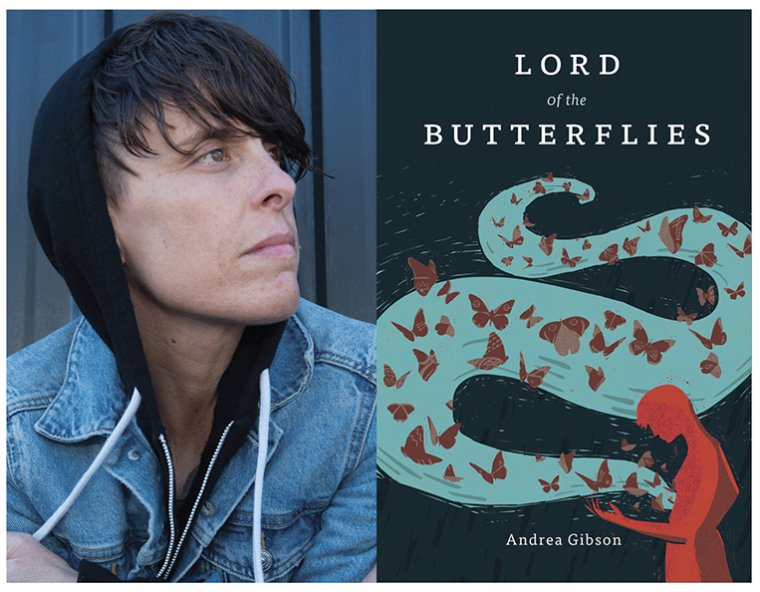
Andrea Gibson, author of Lord of the Butterflies.

Andrea Gibson, author of Lord of the Butterflies.
Ten Questions for Oyinkan Braithwaite
This week’s installment of Ten Questions features Oyinkan Braithwaite, whose debut novel, My Sister, the Serial Killer, is out today from Doubleday. A novel of violence and sibling rivalry, My Sister, the Serial Killer follows Ayoola, the murderer in the book’s title, and quiet, practical Korede, a nurse who cleans up her younger sister’s messes. (“I bet you didn’t know that bleach masks the smell of blood,” Korede says in the novel’s first pages.) The pair work reasonably well together until Ayoola sets her sights on a handsome doctor who has long been the object of Korede’s desire. In a starred review, Publishers Weekly called My Sister, the Serial Killer “as sharp as a knife…bitingly funny and brilliantly executed, with not a single word out of place.” A graduate of London’s Kingston University, where she earned a degree in creative writing and law, Braithwaite works as a freelance writer and editor in Lagos, Nigeria.
1. Where, when, and how often do you write?
Most of the time I type on my laptop, lying on my bed. Generally, I like to write when everyone is asleep and everywhere is quiet. But if I have to, I will write on my phone, standing up, in the middle of a party. I try to write every day. It is a fantastic practice, but not an easy one.
2. How long did it take you to write My Sister, the Serial Killer?
The entire writing and editing process took about seven months.
3. What was the most surprising thing about the publication process?
What has surprised me the most is how much takes place before a book is released. And how much of a book’s success is dependent on the publishers’ faith in the book. I have enjoyed far too much favour, warmth, encouragement and kindness from my agents and publishers, and from strangers—booksellers, book bloggers, etc.—people who do not know me, but are going out of their way to make sure that My Sister, the Serial Killer is a book that is read.
4. What is one thing you’d change about the literary community and/or the publishing business?
The publishing business is a business at the end of the day. The literary community, however, I believe could make a bit more of an effort to bring to the spotlight books that were well written and engaging but were, for all intents and purposes, unknown.
5. What are you reading right now?
We and Me by Saskia de Coster.
6. Who is the most underrated author, in your opinion?
It surprises me when I mention Robin Hobb’s name and people don’t immediately know who she is. Clearly, I don’t know the right people. The right people would know who Robin Hobb was. Also, her books should have a TV series, and/or a movie.
7. What trait do you most value in an editor?
Frankness. And perhaps kindness. I worked with two editors on this book—Margo from Doubleday and James from Atlantic Books—and it seemed to me that they were conscious of the potential difficulty of having two different views and stances; so they went out of their way to make the process smooth for me.
8. What is the biggest impediment to your writing life?
Social media! Social media is distracting and it invites too many voices into your head. The world is in the room with you and it can be difficult to stay true to yourself and to your creativity.
9. What’s one thing you hope to accomplish that you haven’t yet?
I would love to be involved in the writing and animating of a feature length animated movie. But I am still honing my skills, especially as far as animation goes; I am not very good yet!
10. What’s the best piece of writing advice you’ve ever heard?
“If I waited till I felt like writing , I’d never write at all.” —Ann Tyler. “Amateurs sit and wait for inspiration, the rest of us just get up and go to work.” I have learned that it isn’t wise to wait for inspiration; inspiration will meet me at my desk writing.

Oyinkan Braithwaite, author of My Sister, the Serial Killer. (Credit: Studio 24)
Ten Questions for Nuruddin Farah
This week’s installment of Ten Questions features Nuruddin Farah, whose new novel, North of Dawn, is out today from Riverhead Books. Inspired by true events, the novel follows a Somali couple living in Oslo, whose son becomes involved in jihadism in Somalia and eventually kills himself in a suicide attack. When the son’s wife and children move in with his parents in Oslo, the family finds itself confronted with questions of religion, extremism, xenophobia, displacement, and identity. Farah, who the New York Review of Books calls “the most important African novelist to emerge in the past twenty-five years,” is the author of four previous novels, most recently Hiding in Plain Sight (Riverhead, 2014), which have been translated into more than twenty languages and have won numerous awards, including the Neustadt International Prize for Literature. Born in Baidoa, Somalia, he currently lives in Cape Town.
1. Where, when, and how often do you write?
I write less and less when I am on the road, travelling, or in upstate New York, teaching. But when I am in Cape Town, where I reside for much of the year, I write daily for no less than six hours.
2. How long did it take you to write North of Dawn?
It took a lot of time—two years to do the research, and nearly a year and a half to whip the text into shape. I suppose that is the nature of research-based literary fiction.
3. What was the most surprising thing about the publication process?
That it takes up to a year or more for a book to be published after the author has submitted it.
4. What is one thing you’d change about the literary community and/or the publishing business?
It saddens me that the shelf life of literary fiction has been drastically reduced to a few months after publication, unless the said novel becomes a commercial success or is made into a movie or the author gains some notoriety.
5. What are you reading right now?
I am currently reading Kwame Anthony Appiah’s In My Father’s House, which is on the syllabus of a course about journalism and literature I am teaching at Bard College this semester.
6. Would you recommend that writers get an MFA?
Having never taken an MFA, I am in no position to speak to this.
7. What trait do you most value in an editor?
My favorite editors have been the editors who have shown me the weaknesses of the draft texts I submit and I am grateful to them when they do.
8. What is the biggest impediment to your writing life?
I have found traveling away from Cape Town, where I do much of my writing, has proven to be an impediment.
9. What’s one thing you hope to accomplish that you haven’t yet?
Taken as a whole, I am content with the body of work I’ve produced.
10. What’s the best piece of writing advice you’ve ever heard?
That no writing is good enough until you, as an author, make a small contribution, the size of a drop, into the ocean of the world’s literature.

Nuruddin Farah, author of North of Dawn. (Credit: Jeffrey Wilson)
Ten Questions for Andrea Gibson
This week’s installment of Ten Questions features Andrea Gibson, whose new poetry collection, Lord of the Butterflies, is out today from Button Poetry. Exploring questions of gender, identity, love, loss, family, and politics, the poems in Gibson’s book “seamlessly spin hopelessness into hope, fire back at social norms, and challenge what it means to be human,” writes Them magazine. An LGBTQ activist and one of the most celebrated spoken-word poets in the country, Gibson (who uses gender-neutral pronouns) began their career in poetry in 1999 with a break-up poem performed at an open mic in Boulder, Colorado; since then they have gone on to win four Denver Grand Slam titles and in 2008 won the first-ever Woman of the World Poetry Slam. Gibson has performed on stages throughout the country, is the author of four previous books of poetry, and has released seven spoken-word albums. They live in Boulder.
1. Where, when, and how often do you write?
I tour quite a bit and struggle to find time to write on the road. When I’m not touring I write constantly, sometimes up to ten hours each day as it’s the most fulfilling and nourishing blessing in my life. I write at home, in any room where I can close a door behind me and have privacy because I most often write out loud, sometimes yelling, sometimes whispering at the walls, and that’s an awkward (and comical) thing to have anyone witness. I very rarely write sitting still. I pace and pace until the poem finds its way to the page.
2. How long did it take you to write Lord of the Butterflies?
It was written over the course of two years, the first poems sparked by the massacre at the Pulse Nightclub in Orlando, and others by the election of Trump. Like many writers, I’ve never in my life created so much as I have in response to our current political climate. I actually had to contact the editor several times to see if I could add one more poem to the book, as I was writing so much up until the final due date.
3. What was the most surprising thing about the publication process?
This is my first book published with Button Poetry and it’s been fascinating to watch what goes into putting out a book with a publishing company that has such a large online/video/social media presence. I’d admired Button’s model for quite a while, specifically because of how many youth have fallen in love with poetry because of them, and I’ve been mesmerized by all of the different mediums they highlight in the release process.
4. What is one thing you’d change about the literary community and/or the publishing business?
I’ll speak to something I’ve seen significant positive changes in over the years, something I’d like to see continue to keep changing for the better—and that’s the publication of writers who might have been previously classified as “slam poets” or “spoken word artists.” To be skilled in the art of performing one’s poem doesn’t negate how powerfully that poem can live on the page. Great poets like Danez Smith are proving that both spaces can be mastered by an artist, and it’s been beautiful to watch more and more people recognize that.
5. What are you reading right now?
I’ve been reading a lot of poetry—currently Jeanann Verlee’s Prey and Lino Annunciacion’s The Way We Move Through Water. I also just finished Peter Rock’s novel My Abandonment, which I picked up after reading it was one of Hanya Yanagihara’s favorite books. And I’m finally, after many recommendations, reading Lidia Yuknavitch’s The Chronology of Water.
6. Who is the most underrated author, in your opinion?
The first who comes to mind is Donte Collins, mostly because I think this author could win every prize there is to win and still be deserving of more. When I first heard Donte read I was stunned, pummeled by beauty, like that twenty-minute reading would be enough light to sustain me for a year.
7. What trait do you most value in an editor?
The ability to be blunt. As harsh as it may sound it’s really important for me to know I have an editor who is willing to say, “Take this entire poem out of the manuscript.” And that’s not to say I don’t have feelings when that happens, but that kind of honesty helps me feel significantly more solid about what I’m putting out.
8. What is the biggest impediment to your writing life?
I’m a very slow writer. Some wouldn’t think so because I put out new work quite often, but that’s only because of the number of hours I spend writing. It’s not rare for me to spend twelve solid hours going over and over a single stanza.
9. What’s one thing you hope to accomplish that you haven’t yet?
It’s a dream of mine to one day write a musical. When I’m writing poems I almost always write to music, and I collaborate with musicians often during live performances. I’ve always been hyper focused on how the words and rhythm live out loud, and I’m constantly writing songs in my head. I think it would be a magical experience to collaborate on a production that features so many different artists.
10. What’s the best piece of writing advice you’ve ever heard?
“Write what you are terrified to write.” When I was first given that advice I struggled to write for almost a year because I wasn’t yet ready to write what I was afraid to write, and I didn’t want to waste my time writing anything else. These days, I consider that advice every time I begin a poem. I pay attention to what requires courage to say, and I do my best to try to say it.

Andrea Gibson, author of Lord of the Butterflies.

Andrea Gibson, author of Lord of the Butterflies.
Ten Questions for Wesley Yang
This week’s installment of Ten Questions features Wesley Yang, whose debut essay collection, The Souls of Yellow Folk, is out today from W. W. Norton. A mix of reporting, sociology, and personal history, The Souls of Yellow Folk collects thirteen essays on race and gender in America today. Titled after The Souls of Black Folk, W. E. B. Du Bois’s classic 1903 collection, Yang’s book takes the reader “deep into the discomfort zones of racial and political discourse,” novelist Karan Mahajan writes. In addition to essays on race and whiteness, The Souls of Yellow Folk includes profile pieces on Seung-Hui Cho, the shooter who killed more than two dozen people at Virginia Tech in 2007; political scientist Francis Fukuyama; historian Tony Judt; and Internet activist Aaron Swartz. Yang has written for the New York Times, Harper’s, the Los Angeles Times, the Boston Globe, New York magazine, the New Republic, Tablet, and n+1. He lives in Montreal.
1. Where, when, and how often do you write?
I write every day at one of two public libraries in Montreal.
2. How long did it take you to write the essays in The Souls of Yellow Folk?
The essays collected in The Souls of Yellow Folk were written over the course of ten years.
3. What was the most surprising thing about the publication process?
This was the first book I’ve ever published so I had no expectations. I just took everything as it came and accepted it just as it was.
4. What is one thing you’d change about the literary community and/or the publishing business?
See above.
5. What are you reading right now?
The Love Affairs of Nathaniel P. by Adelle Waldman.
6. Who is the most underrated author, in your opinion?
Really hard to say. I’m a big fan of Heinrich Kleist, who isn’t universally taught and known.
7. Where was your very first publication?
I worked for a weekly newspaper in East Brunswick, New Jersey, when I graduated from Rutgers. My first publication that wasn’t straight news for a New Jersey local paper was a review of a biography of Albert Speer for Salon.
8. What is the biggest impediment to your writing life?
Family life and raising a child requires a writer to organize his workflow in a way that is at odds with the way writing happens, at least for me. I’ve made partial strides in this direction but many remain to be made.
9. What’s one thing you hope to accomplish that you haven’t yet?
This collection is a miscellany of previously published essays. Still haven’t written a book that is a single free-standing work.
10. What’s the best piece of writing advice you’ve ever heard?
Writing is a form of manual labor and should be approached in that spirit.
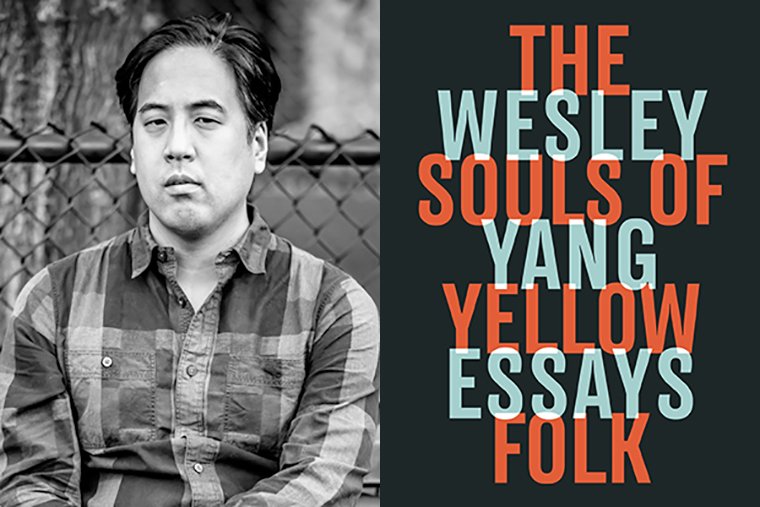
Wesley Yang, author of The Souls of Yellow Folk. (Credit: Rich Woodson)
Ten Questions for Claire Fuller
This week’s installment of Ten Questions features Claire Fuller, whose third novel, Bitter Orange, is out today from Tin House Books. A literary mystery, Bitter Orange is the story of Frances Jellico, who, in the summer of 1969, takes a job researching the architecture of a dilapidated mansion in the English countryside and finds a peephole underneath a floorboard in her new bathroom that gives her access to her neighbor’s private lives. Novelist Gabriel Tallent calls it “a twisty, thorny, darkly atmospheric page-turner.” Fuller, who didn’t start writing until she was forty, is the author of two previous books, Swimming Lessons (2017) and Our Endless Numbered Days (2015), both published by Tin House Books. She lives in Hampshire, England, with her husband and two children.
1. Where, when, and how often do you write?
I worked for so many years in a nine-to-five-thirty job that I can’t get out of that habit. I’m at my desk most days for most of the day, doing bits of novel writing, in between other bits of writing, answering e-mails, and reading. I try to keep weekends free of writing, but depending on where I am in the cycle of publishing that doesn’t always work.
2. How long did it take you to write Bitter Orange?
Almost exactly two years, and then some additional time for edits and so on. I keep a writing diary, just a line a day with my word count and whether the day has gone well or badly. Mostly it’s badly, but that helps to look back on when I’m writing the next one.
3. What was the most surprising thing about the publication process?
How long it can take from a publisher buying a novel to that book being on the shelves in bookshops. I’m not a very patient person and having to wait so long —nineteen months in one case—is not easy.
4. What is one thing you’d change about the literary community and/or the publishing business?
I’d like there to be less focus on one lead book a season by large publishers, and instead for them to spread their publicity and marketing budgets more broadly. Industrywide it seems that only a few books get a massive push, while lots of many brilliant novels that publishers have bought are left to either sink or swim by themselves.
5. What are you reading right now?
I’m reading Fever Dream by Samanta Schweblin, translated by Megan McDowell. It’s a sinister and strange story so mixed up and feverish that it’s hard to tell what’s real and what isn’t. Reading it is a wonderful distraction.
6. Who is the most underrated author, in your opinion?
I think Barbara Comyns could be better known. Her novels are wonderfully quirky, full of people who levitate or go mad from ergot poisoning. It’s hard to know whether she’s underrated—there are a lot of people who know her work, but probably lots more who don’t.
7. What trait do you most value in an editor?
I’m lucky to have two amazing editors: Juliet at Penguin in the UK, and Masie at Tin House in the US. They both work very differently, and although sometimes I’m sitting in the middle trying to sort out differing advice, I value hugely what they both have to say. Juliet is very good at the high-level view of a novel, while Masie and I will have long Skype conversations about whether a ‘sleeveless vest’ is actually a thing, whether US readers will have heard of Fuzzy Felt, or if Americans eat cauliflower cheese or cauliflower with cheese sauce. I love getting into the nitty-gritty of a novel, right down to the sentence and the word level.
8. What is the biggest impediment to your writing life?
My own procrastination. Reading all my reviews (and no, it’s not possible to stop). My untidy writing room. My cat, who I got in order to have a writer’s cat, but who loves my husband more than me. Reading other people’s brilliant novels (and no, I’m not going to stop).
9. What’s one thing you hope to accomplish that you haven’t yet?
Finish my fourth novel? Or just write the next damn sentence. When I’m only at 11,000 words all of it feels like an insurmountable task.
10. What’s the best piece of writing advice you’ve ever heard?
Write like “none of it happened, and all of it is true,” which, if I’ve got my source correct, is something Ann Patchett’s mother said.

Claire Fuller, author of Bitter Orange. (Credit: Adrian Harvey)
Ten Questions for Laura Sims
This week’s installment of Ten Questions features Laura Sims, whose first novel, Looker, is out today from Scribner. “A tightly coiled novel about the poison of resentment,” in the words of Idra Novey, Looker descends into the increasingly unhinged mind of a woman whose obsession with her neighbor unravels after an altercation with the beautiful actress at an annual block party. Earning comparisons to the voice of Ottessa Moshfegh and the psychological fascinations of Paula Hawkins, Sims’s novel dissects our image-obsessed, media-saturated culture while offering a compelling story of a sympathetic character on the edge. Sims is the author of four books of poetry, most recently Staying Alive (Ugly Duckling Presse, 2016), and the editor of Fare Forward: Letters From David Markson (powerHouse Books, 2014). She lives outside of New York City with her family.
1. How long did it take you to write Looker?
About three years, off and on. I wrote the first sixty pages or so by hand, in a kind of frenzy, after hearing my narrator’s voice speak what would become the novel’s first line. Then I wrote it in bursts whenever I could. I was juggling it with teaching, library science grad school, and other writing projects at the time, but towards the end of that period it became my focal point.
2. Where, when, and how often do you write?
I try to write every weekday morning, when I have the most energy, from about 8AM to 11 AM. I write at home, in my upstairs office/guest room, at the library, or at a local co-working space. I like mixing it up to stave off tedium…and the threat of sleep. Working from home can definitely be dangerous in that regard; sometimes I need to leave the house to keep myself focused and motivated.
3. What was the most unexpected thing about the publication process?
How much happens before the book comes out, and how it requires an incredibly dedicated team of people to bring a single book into the world. My own experience with publishing poetry in the small press world hadn’t prepared me for that; publishing with an indie press is also reliant on a team but that team could consist of one or two (motivated, saintly) people, wearing all sorts of hats. But in the case of commercial literary fiction, you have an agent, an editor, a marketing team, a publicist, proofreaders, lawyers, and so on, and things start to wind up at least six months before the book’s publication date. It’s a whirlwind!
4. Would you recommend writers pursue an MFA?
This is a tricky question for me. I have an MFA, and I’m very grateful to have it because it “certified” me to teach at the college level, as I’ve done for many years. But when my students ask me that same question, I pause and consider the individual. If it’s something they feel they absolutely have to do, and I can see that it feels necessary to them, then I tell them to go for it. If they see it as a way to spend two years focusing on their writing and it won’t put them into massive debt, then I say go for it. If they think it will secure some sort of future path as a writer and/or writing professor, though, that’s a longer discussion. It’s hard to get published, and teaching jobs are scarce even if you publish well. I don’t think an MFA is necessary, but at the same time it can be a good way to connect with other writers, get regular feedback, and grow as a writer. You can also do that out in the real world, though, through community workshops and just plain old life experience.
5. What are you reading right now?
Kudos by Rachel Cusk. I love this trilogy of hers so much, I wish it would go on forever. I don’t know what she’s going to do next, but those last three books are gorgeous and important and also, somewhat magically, fun to read. I also recently read Circe by Madeline Miller, I have to add. Another beautifully written, wonderfully entertaining book, just as good as her first, Song of Achilles. I’ve been recommending all three of these to everyone I know lately.
6. Which author, in your opinion, deserves wider recognition?
The novelist David Markson. He’s been something of a cult figure for many years, but he’s never had a breakthrough moment in the way that other “difficult” writers like W. G. Sebald have. In any case, his last four books, This Is Not a Novel, Reader’s Block, Vanishing Point, and The Last Novel, form a combined masterpiece of formal innovation and emotional resonance that have informed and influenced my writing (and life) since I began reading him in 2004. Reading Markson was a truly life-changing experience for me, and I can’t say that about many novels, even ones I’ve dearly loved.
7. What is one thing you’d change about the literary community and/or the publishing business?
The one thing I’d change is, I think, changing already: the insularity of the literary and publishing world. Thanks to the advent of social media, blogs, etc., more of the reading public participates in a discussion that was once controlled by a select few. Booksellers, bloggers, librarians, and bookstagrammers now have a lot of say in how a book is received, and mainstream publishers have had to adapt in response. I was impressed, during the pre-publication process for Looker, at how skillfully the marketing team at Scribner used Instagram and Twitter, multiple giveaways on Goodreads and elsewhere, and good old-fashioned hand-to-hand and face-to-face marketing to get the word out about my book.
8. What is the biggest impediment to your writing life?
Right now, just before my novel’s due to come out, the biggest impediment is…the novel that’s about to come out! No, it’s actually all of the necessary business and noise that swirls around having a book come out, all of which I’m happy to do and grateful for, but all of which is also distracting me from the essential business of sitting down and working on my next novel-in-progress. I want to blame my smartphone, but really the impediment is me.
9. What’s one thing you hope to accomplish that you haven’t yet?
I’d like to finish my MLS degree before the year is out! I’ve been inching along towards that goal for several years now, and am currently on hiatus, but I just have a few classes to finish before I can join the corps of working librarians.
10. What’s the best piece of writing advice you’ve ever heard?
At one point in my life, when I was juggling more things at once, trying to “do it all,” the best piece of advice came from the aforementioned novelist David Markson, who was a dear friend and told me, “Do your own fucking work!” By that he meant I should stop spending my time on smaller, largely self-assigned writing pieces, or class prep, or other things, and devote myself more fully to doing my own writing. It really did help me take a look at how I was spending my time—this advice came from someone at the end of his life, mind you. I started to say “no” to things when I could, and because of that my life is more streamlined now than it was, say, five or ten years ago. It helped me really zero in on Looker and finish it, in fact. Another excellent piece of advice was something that Richard Ford said to my husband when he met him after a reading: “Be at your station.” The two quotes go well together, actually: Butt in chair, do the work. It’s the most basic and important writing advice there is.
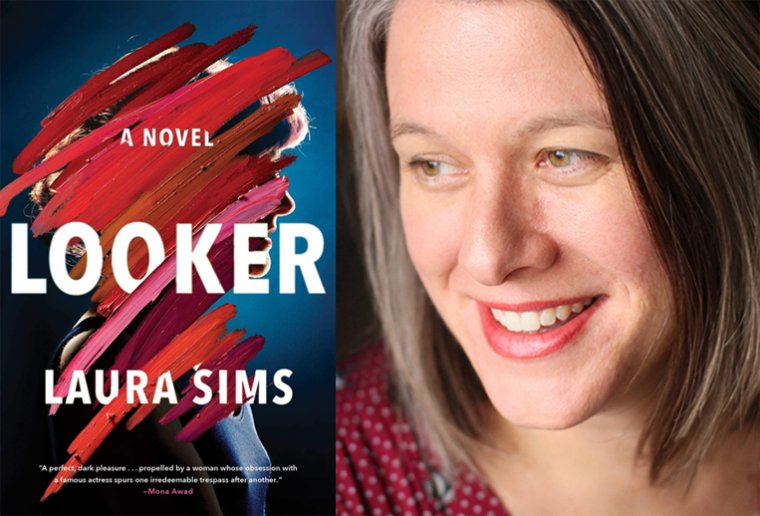
Laura Sims, author of Looker. (Credit: Jen Lee)
Ten Questions for Juliet Lapidos
This week’s installment of Ten Questions features Juliet Lapidos, whose debut novel, Talent, is out today from Little, Brown. Talent is the story of Anna Brisker, a twenty-nine-year-old graduate student in English who is uninspired by—and desperately struggling to finish—her dissertation: an intellectual history of inspiration. But when she strikes up a friendship with the niece of Frederick Langley, the legendary short story writer who suffered from a supposedly fatal case of writer’s block, Anna finds a perfect case study for her dissertation. Helen Oyeyemi calls Talent a “deliciously funny, sharp, and sincere inquiry into the factors underpinning our valuations of art, labor, ourselves, and each other.” Juliet Lapidos is a senior editor at the Atlantic. Previously she was the editor of the op-ed and the Sunday Opinion sections at the Los Angeles Times, a culture editor at Slate, and an editor of the New York Times Opinion section. She has written for the Atlantic, the New York Times Book Review, McSweeney’s Internet Tendency, and the websites of the New Yorker and the New Republic.
1. How long did it take you to write Talent?
About six years, though in my defense I had a full-time job (as a journalist) that whole time. Mostly I wrote on weekends.
2. What was the most challenging thing about writing the book?
When I started, I thought I knew how to write. Turns out, I was wrong. I basically taught myself as I went. I found it especially difficult to figure out how to make time move. In an early draft, I wrote a dinner scene in which I described everything—making plans, sitting down to eat, the waiter’s arrival, looking over the menu, ordering…. It took me a while to understand what I could leave unsaid.
3. Where, when, and how often do you write?
I write mostly from home, mostly from bed, on weekends, as often as I can. But since starting a family, “can” is quite rare.
4. What was the most unexpected thing about the publication process?
The book industry gets a lot of flak but I found everyone at Little, Brown (and Borough Press, my U.K. publisher) both kind and dedicated.
5. What are you reading right now?
The Golden Ass by Apuleius
6. Which author, in your opinion, deserves wider recognition?
Sheridan Le Fanu, whose Uncle Silas is creepy, sophisticated, and memorable, yet oddly overlooked in classrooms. Or, if we’re talking living authors: Monica Youn. Blackacre is a masterpiece that—IMHO—can convince people who think they don’t like modern poetry that they do, in fact, like modern poetry.
7. What is one thing you’d change about the literary community and/or the publishing business?
Subservience to Hollywood. Too many people seem to aspire to have their books “optioned.”
8. What is the biggest impediment to your writing life?
My job and my child compete for first place on the impediments list.
9. What trait do you most value in an editor (or agent)?
I suppose the real answer is honesty, but that’s dull, so I’ll say: Tolerance of ambiguity. I think a lot of contemporary editors, myself included, push too much for clarity when sometimes a little muddiness is just the thing.
10. What’s the best piece of writing advice you’ve ever heard?
It’s actually a corporate slogan: Just do it.
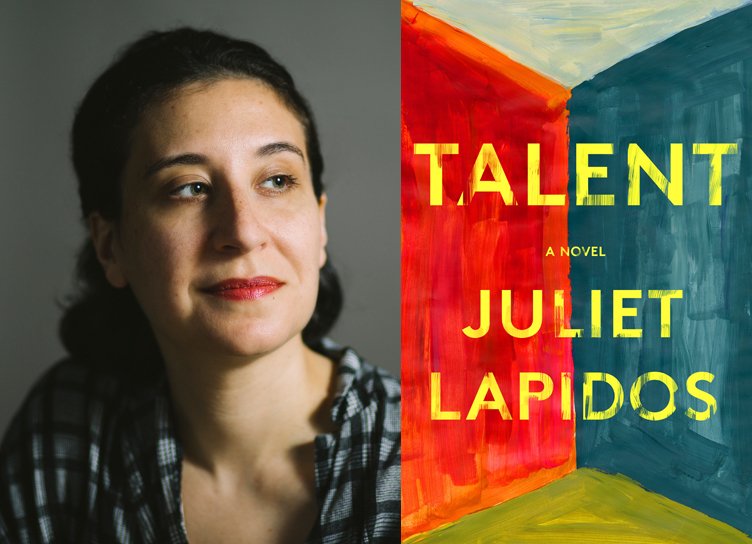
Juliet Lapidos, author of Talent. (Credit: Lauren Pisano)
Ten Questions for Sarah McColl
This week’s installment of Ten Questions features Sarah McColl, whose memoir, Joy Enough, is out today from Liveright. “I loved my mother, and she died. Is that a story?” From the first sentences of her memoir, which Megan Stielstra calls “a stunningly beautiful and meditative map of loss,” McColl captures what it means to be a daughter. Through vivid memories, Joy Enough charts the dissolution of the author’s marriage alongside the impending loss of her mother, who is diagnosed with cancer. A book about love and grief, Joy Enough attempts to explain what people mean when they say, “You are just like your mother.” Sarah McColl was the founding editor in chief of Yahoo Food. A MacDowell fellow and Pushcart Prize nominee, her essays have appeared in the Paris Review, StoryQuarterly, McSweeney’s, and elsewhere. She holds an MFA from Sarah Lawrence and lives in Los Angeles.
1. How long did it take you to write Joy Enough?
For a long time I didn’t think I was writing a book. I thought I was writing essays, and then I was writing a thesis, and then I started thinking of it as my weird art project. I was so afraid to call it a book because I was afraid it wouldn’t be published, and then I would be a writer with an unpublished book in a drawer. Now I think at least one book in a drawer is a good thing. It means you’re doing the work. But I must have known there was something like a book there, whatever I called it, because I kept working on it, and I kept sending it out. That process of writing and revising took three years.
2. What was the most challenging thing about writing the book?
I didn’t know how to make memory conform to a narrative arc. There were discrete scenes and moments that were very vivid to me, but I struggled with how to connect one to another in some linear, continuous way. I remember expressing this frustration to one of my professors. She said, “Write the scene, hit return a few times, and keep going.” So that was my solution in the end. The return key.
3. Where, when, and how often do you write?
I participate with a group of writers in what we call “the 250s.” We have a shared Google doc with the days of the week marked out and a column for each writer. The goal is to write 250 words five days a week. The low word count is a mind trick to get you to sit down (it’s all about the mind tricks!) and then, hopefully, sail past 250 words. But if the writing is going badly, and you stop at 250, you still have some sense of accomplishment (again, mind trick). That’s the goal, mind you, and I do not consistently achieve this goal. Sometimes I walk around thinking about an essay for six months and then sit down and write a draft in one burst. I like the fuzzy, quiet quality of the mornings and the night. I have a small studio above the garage, but I also tend to write in bed a lot.
4. What was the most unexpected thing about the publication process?
I had no idea just how much buy-in a book requires. It’s not enough to have an agent champion a book and then for an editor to fall in love with it. The editor has to get everyone on board—sales, marketing, publicity. If your book finds a publisher, then it takes all those same people working on your behalf for a book to find its way in the world. Writing is such a solitary activity, but publishing is a completely different animal. I didn’t realize that at the outset. Sorry to get all “it takes a village,” but it really does, and I have pinched myself many times at how grateful I have felt in Liveright’s hands.
5. What are you reading right now?
I have a predictably overambitious new year’s resolution to read a book of poetry, a novel, a book of short stories, and a book of nonfiction each month. Right now I’m reading People Like You by Margaret Malone, which is dark and funny and sublime; Claire Fuller’s Bitter Orange, which feels marvelously escapist and lush and has been keeping me up too late; Sister Outsider by Audre Lorde, who needs no adjectives; and I’m anxiously awaiting Paige Ackerson-Kiely’s new book, Dolefully, a Rampart Stands.
6. Which author, in your opinion, deserves wider recognition?
Discovering and falling in love with an author is such a private activity. When you meet someone who loves the same writer you do, it becomes a kind of shorthand for a shared aesthetic or philosophical worldview. I nearly knocked over my wine glass with excitement when I met a woman who wanted to talk about Canadian author Elizabeth Smart as much as I did. That’s not wide recognition, but it’s a form of literary community, and that’s probably more lasting in the end.
7. Would you recommend writers pursue an MFA?
Getting my MFA was the best decision of my adult life, and I loved my program at Sarah Lawrence. I wanted to be able to teach at the college level, I knew what I wanted to work on, and I had some money saved to pay for part of it. But I think it depends what a writer is looking for in their creative life (structure, guidance, encouragement, time), the package offered by the school, and their long-term career goals. If you have the resources to devote two or three years to the world of language and ideas, I found it a powerful and blissful experience.
8. What is the biggest impediment to your writing life?
The mental space daily life demands. Buying a birthday present, calling the insurance company, grocery shopping, dishes, e-mail. This was captured so well in the comic The Mental Load, which focuses on parenthood but applies equally to keeping the lights on and the toilet paper replenished, if you ask me. This is why I love residencies. I honestly cannot believe how much more space I have in my brain when I am not thinking about how and what to feed myself three times a day.
9. What trait do you most value in agent?
I trust my agent, Grainne Fox, to always tell me the hard thing. That she does so with a soft touch and incomparable charm is proof she’s for me. I trust her implicitly, and we get on like a house on fire. That’s the foundation for any great relationship.
10. What’s the best piece of writing advice you’ve ever heard?
You must find pleasure in the work itself—doing the work. Otherwise, what’s the point?

Sarah McColl, author of Joy Enough. (Credit: Joanna Eldredge Morrissey)
Ten Questions for Hala Alyan
This week’s installment of Ten Questions features Hala Alyan, whose fourth poetry collection, The Twenty-Ninth Year, is out today from Mariner Books. In wild, lyrical poems, Alyan examines the connections between physical and interior migration, occasioned by the age of twenty-nine, which, in Islamic and Western tradition, is a year of transformation and upheaval. Leaping from war-torn cities in the Middle East to an Oklahoma Olive Garden to a Brooklyn brownstone, Alyan’s poems chronicle a personal history shaped by displacement. “Alyan picks up the fragments of a broken past and reassembles them into a livable future made more dazzling for having known brokenness,” writes Kaveh Akbar. “This is poetry of the highest order.” Hala Alyan is an award-winning Palestinian American poet and novelist as well as a clinical psychologist. Her previous books include the novel Salt Houses (Houghton Mifflin Harcourt, 2017) and the poetry collections Hijra (Southern Illinois University Press, 2016), Four Cities (Black Lawrence Press, 2015), and Atrium (Three Rooms Press, 2012).
1. How long did it take you to write The Twenty-Ninth Year?
I wrote it in bits and pieces over a year, and then stitched it together into a coherent collection in a few weeks, which is usually how I work with poetry.
2. What was the most challenging thing about writing the book?
Much of it was written from a state of pain—psychic, emotional grief, a time in my life that involved a fair amount of evolution and “lying fallow,” as my friend put it. At times I found it difficult to write about an experience I was still in the middle of, which is why I had to wait to iron out the narrative until things felt more settled.
3. Where, when, and how often do you write?
I’m not picky about location. I make sure to write thirty minutes a day, though that generally is for fiction, which I have a harder time being disciplined about. In terms of poetry, I usually wait until I need to write, which makes for a really thrilling, cathartic experience of creation.
4. What was the most unexpected thing about the publication process?
Just how involved and long the process can be! How many beautiful, moving parts have to work together just to create a book, and how much you need dedication and love for the process from every single person involved.
5. What are you reading right now?
At the moment, I’m rereading Virgin by Analicia Sotelo as well as The Mars Room by Rachel Kushner.
6. Which author, in your opinion, deserves wider recognition?
That’s such a difficult question, because I wish all good writing (especially by writers of color) had equal recognition—an impossible want, I know. There’s several books coming out or recently out by women of color that I’m really hoping soak up a ton of recognition: Invasive Species by Marwa Helal, To Keep the Sun Alive by Rabeah Ghaffari and A Woman is No Man by Etaf Rum.
7. What is one thing you’d change about the literary community and/or the publishing business?
I wish the different parts of the community were more integrated. Starting off, I knew virtually nothing about the publishing industry, for instance, which seems like an oversight. I would love to have more interaction with different members of the writing, reading and publishing community—to know more about what publicists do, to talk to more booksellers and libraries, to really be reminded that we’re all in this together!
8. What is the biggest impediment to your writing life?
My easily distracted nature: laundry, walking the dog, making oatmeal. Although I also think that these are necessary parts to a writing life, as is work (for me) and procrastination and daydreaming.
9. What trait do you most value in an editor (or agent)?
A combination of honesty and empathy, which I’ve been lucky enough to find both in my agent and the editors I’ve worked with so far. I also like a bit of tough love, because it brings out the eager student in me.
10. What’s the best piece of writing advice you’ve ever heard?
I like to toss Anne Lamott’s Bird by Bird at anyone who is even remotely interested in writing. In particular, I love her approach to breaking down a massive writing task into small, digestible pieces, and finding joy in those pieces.

Hala Alyan, author of The Twenty-Ninth Year. (Credit: Bob Anderson)
Ten Questions for Juliet Lapidos
This week’s installment of Ten Questions features Juliet Lapidos, whose debut novel, Talent, is out today from Little, Brown. Talent is the story of Anna Brisker, a twenty-nine-year-old graduate student in English who is uninspired by—and desperately struggling to finish—her dissertation: an intellectual history of inspiration. But when she strikes up a friendship with the niece of Frederick Langley, the legendary short story writer who suffered from a supposedly fatal case of writer’s block, Anna finds a perfect case study for her dissertation. Helen Oyeyemi calls Talent a “deliciously funny, sharp, and sincere inquiry into the factors underpinning our valuations of art, labor, ourselves, and each other.” Juliet Lapidos is a senior editor at the Atlantic. Previously she was the editor of the op-ed and the Sunday Opinion sections at the Los Angeles Times, a culture editor at Slate, and an editor of the New York Times Opinion section. She has written for the Atlantic, the New York Times Book Review, McSweeney’s Internet Tendency, and the websites of the New Yorker and the New Republic.
1. How long did it take you to write Talent?
About six years, though in my defense I had a full-time job (as a journalist) that whole time. Mostly I wrote on weekends.
2. What was the most challenging thing about writing the book?
When I started, I thought I knew how to write. Turns out, I was wrong. I basically taught myself as I went. I found it especially difficult to figure out how to make time move. In an early draft, I wrote a dinner scene in which I described everything—making plans, sitting down to eat, the waiter’s arrival, looking over the menu, ordering…. It took me a while to understand what I could leave unsaid.
3. Where, when, and how often do you write?
I write mostly from home, mostly from bed, on weekends, as often as I can. But since starting a family, “can” is quite rare.
4. What was the most unexpected thing about the publication process?
The book industry gets a lot of flak but I found everyone at Little, Brown (and Borough Press, my U.K. publisher) both kind and dedicated.
5. What are you reading right now?
The Golden Ass by Apuleius
6. Which author, in your opinion, deserves wider recognition?
Sheridan Le Fanu, whose Uncle Silas is creepy, sophisticated, and memorable, yet oddly overlooked in classrooms. Or, if we’re talking living authors: Monica Youn. Blackacre is a masterpiece that—IMHO—can convince people who think they don’t like modern poetry that they do, in fact, like modern poetry.
7. What is one thing you’d change about the literary community and/or the publishing business?
Subservience to Hollywood. Too many people seem to aspire to have their books “optioned.”
8. What is the biggest impediment to your writing life?
My job and my child compete for first place on the impediments list.
9. What trait do you most value in an editor (or agent)?
I suppose the real answer is honesty, but that’s dull, so I’ll say: Tolerance of ambiguity. I think a lot of contemporary editors, myself included, push too much for clarity when sometimes a little muddiness is just the thing.
10. What’s the best piece of writing advice you’ve ever heard?
It’s actually a corporate slogan: Just do it.

Juliet Lapidos, author of Talent. (Credit: Lauren Pisano)
Ten Questions for Juliet Lapidos
This week’s installment of Ten Questions features Juliet Lapidos, whose debut novel, Talent, is out today from Little, Brown. Talent is the story of Anna Brisker, a twenty-nine-year-old graduate student in English who is uninspired by—and desperately struggling to finish—her dissertation: an intellectual history of inspiration. But when she strikes up a friendship with the niece of Frederick Langley, the legendary short story writer who suffered from a supposedly fatal case of writer’s block, Anna finds a perfect case study for her dissertation. Helen Oyeyemi calls Talent a “deliciously funny, sharp, and sincere inquiry into the factors underpinning our valuations of art, labor, ourselves, and each other.” Juliet Lapidos is a senior editor at the Atlantic. Previously she was the editor of the op-ed and the Sunday Opinion sections at the Los Angeles Times, a culture editor at Slate, and an editor of the New York Times Opinion section. She has written for the Atlantic, the New York Times Book Review, McSweeney’s Internet Tendency, and the websites of the New Yorker and the New Republic.
1. How long did it take you to write Talent?
About six years, though in my defense I had a full-time job (as a journalist) that whole time. Mostly I wrote on weekends.
2. What was the most challenging thing about writing the book?
When I started, I thought I knew how to write. Turns out, I was wrong. I basically taught myself as I went. I found it especially difficult to figure out how to make time move. In an early draft, I wrote a dinner scene in which I described everything—making plans, sitting down to eat, the waiter’s arrival, looking over the menu, ordering…. It took me a while to understand what I could leave unsaid.
3. Where, when, and how often do you write?
I write mostly from home, mostly from bed, on weekends, as often as I can. But since starting a family, “can” is quite rare.
4. What was the most unexpected thing about the publication process?
The book industry gets a lot of flak but I found everyone at Little, Brown (and Borough Press, my U.K. publisher) both kind and dedicated.
5. What are you reading right now?
The Golden Ass by Apuleius
6. Which author, in your opinion, deserves wider recognition?
Sheridan Le Fanu, whose Uncle Silas is creepy, sophisticated, and memorable, yet oddly overlooked in classrooms. Or, if we’re talking living authors: Monica Youn. Blackacre is a masterpiece that—IMHO—can convince people who think they don’t like modern poetry that they do, in fact, like modern poetry.
7. What is one thing you’d change about the literary community and/or the publishing business?
Subservience to Hollywood. Too many people seem to aspire to have their books “optioned.”
8. What is the biggest impediment to your writing life?
My job and my child compete for first place on the impediments list.
9. What trait do you most value in an editor (or agent)?
I suppose the real answer is honesty, but that’s dull, so I’ll say: Tolerance of ambiguity. I think a lot of contemporary editors, myself included, push too much for clarity when sometimes a little muddiness is just the thing.
10. What’s the best piece of writing advice you’ve ever heard?
It’s actually a corporate slogan: Just do it.

Juliet Lapidos, author of Talent. (Credit: Lauren Pisano)
Ten Questions for Laura Sims
This week’s installment of Ten Questions features Laura Sims, whose first novel, Looker, is out today from Scribner. “A tightly coiled novel about the poison of resentment,” in the words of Idra Novey, Looker descends into the increasingly unhinged mind of a woman whose obsession with her neighbor unravels after an altercation with the beautiful actress at an annual block party. Earning comparisons to the voice of Ottessa Moshfegh and the psychological fascinations of Paula Hawkins, Sims’s novel dissects our image-obsessed, media-saturated culture while offering a compelling story of a sympathetic character on the edge. Sims is the author of four books of poetry, most recently Staying Alive (Ugly Duckling Presse, 2016), and the editor of Fare Forward: Letters From David Markson (powerHouse Books, 2014). She lives outside of New York City with her family.
1. How long did it take you to write Looker?
About three years, off and on. I wrote the first sixty pages or so by hand, in a kind of frenzy, after hearing my narrator’s voice speak what would become the novel’s first line. Then I wrote it in bursts whenever I could. I was juggling it with teaching, library science grad school, and other writing projects at the time, but towards the end of that period it became my focal point.
2. Where, when, and how often do you write?
I try to write every weekday morning, when I have the most energy, from about 8AM to 11 AM. I write at home, in my upstairs office/guest room, at the library, or at a local co-working space. I like mixing it up to stave off tedium…and the threat of sleep. Working from home can definitely be dangerous in that regard; sometimes I need to leave the house to keep myself focused and motivated.
3. What was the most unexpected thing about the publication process?
How much happens before the book comes out, and how it requires an incredibly dedicated team of people to bring a single book into the world. My own experience with publishing poetry in the small press world hadn’t prepared me for that; publishing with an indie press is also reliant on a team but that team could consist of one or two (motivated, saintly) people, wearing all sorts of hats. But in the case of commercial literary fiction, you have an agent, an editor, a marketing team, a publicist, proofreaders, lawyers, and so on, and things start to wind up at least six months before the book’s publication date. It’s a whirlwind!
4. Would you recommend writers pursue an MFA?
This is a tricky question for me. I have an MFA, and I’m very grateful to have it because it “certified” me to teach at the college level, as I’ve done for many years. But when my students ask me that same question, I pause and consider the individual. If it’s something they feel they absolutely have to do, and I can see that it feels necessary to them, then I tell them to go for it. If they see it as a way to spend two years focusing on their writing and it won’t put them into massive debt, then I say go for it. If they think it will secure some sort of future path as a writer and/or writing professor, though, that’s a longer discussion. It’s hard to get published, and teaching jobs are scarce even if you publish well. I don’t think an MFA is necessary, but at the same time it can be a good way to connect with other writers, get regular feedback, and grow as a writer. You can also do that out in the real world, though, through community workshops and just plain old life experience.
5. What are you reading right now?
Kudos by Rachel Cusk. I love this trilogy of hers so much, I wish it would go on forever. I don’t know what she’s going to do next, but those last three books are gorgeous and important and also, somewhat magically, fun to read. I also recently read Circe by Madeline Miller, I have to add. Another beautifully written, wonderfully entertaining book, just as good as her first, Song of Achilles. I’ve been recommending all three of these to everyone I know lately.
6. Which author, in your opinion, deserves wider recognition?
The novelist David Markson. He’s been something of a cult figure for many years, but he’s never had a breakthrough moment in the way that other “difficult” writers like W. G. Sebald have. In any case, his last four books, This Is Not a Novel, Reader’s Block, Vanishing Point, and The Last Novel, form a combined masterpiece of formal innovation and emotional resonance that have informed and influenced my writing (and life) since I began reading him in 2004. Reading Markson was a truly life-changing experience for me, and I can’t say that about many novels, even ones I’ve dearly loved.
7. What is one thing you’d change about the literary community and/or the publishing business?
The one thing I’d change is, I think, changing already: the insularity of the literary and publishing world. Thanks to the advent of social media, blogs, etc., more of the reading public participates in a discussion that was once controlled by a select few. Booksellers, bloggers, librarians, and bookstagrammers now have a lot of say in how a book is received, and mainstream publishers have had to adapt in response. I was impressed, during the pre-publication process for Looker, at how skillfully the marketing team at Scribner used Instagram and Twitter, multiple giveaways on Goodreads and elsewhere, and good old-fashioned hand-to-hand and face-to-face marketing to get the word out about my book.
8. What is the biggest impediment to your writing life?
Right now, just before my novel’s due to come out, the biggest impediment is…the novel that’s about to come out! No, it’s actually all of the necessary business and noise that swirls around having a book come out, all of which I’m happy to do and grateful for, but all of which is also distracting me from the essential business of sitting down and working on my next novel-in-progress. I want to blame my smartphone, but really the impediment is me.
9. What’s one thing you hope to accomplish that you haven’t yet?
I’d like to finish my MLS degree before the year is out! I’ve been inching along towards that goal for several years now, and am currently on hiatus, but I just have a few classes to finish before I can join the corps of working librarians.
10. What’s the best piece of writing advice you’ve ever heard?
At one point in my life, when I was juggling more things at once, trying to “do it all,” the best piece of advice came from the aforementioned novelist David Markson, who was a dear friend and told me, “Do your own fucking work!” By that he meant I should stop spending my time on smaller, largely self-assigned writing pieces, or class prep, or other things, and devote myself more fully to doing my own writing. It really did help me take a look at how I was spending my time—this advice came from someone at the end of his life, mind you. I started to say “no” to things when I could, and because of that my life is more streamlined now than it was, say, five or ten years ago. It helped me really zero in on Looker and finish it, in fact. Another excellent piece of advice was something that Richard Ford said to my husband when he met him after a reading: “Be at your station.” The two quotes go well together, actually: Butt in chair, do the work. It’s the most basic and important writing advice there is.

Laura Sims, author of Looker. (Credit: Jen Lee)
Ten Questions for Shane McCrae
This week’s installment of Ten Questions features Shane McCrae, whose sixth poetry collection, The Gilded Auction Block, is out today from Farrar, Straus and Giroux. Employing and subverting traditional meter and form, the poems in the new book confront the 2016 presidential election in the United States from both personal and historical perspectives. The poems interrogate issues of identity, freedom, racism, oppression, and inheritance, using inventive line breaks and spacing to create a sense of disruption and shift, fissures in both text and feeling. McCrae is the author of five previous books, including most recently In the Language of My Captor (Wesleyan University Press, 2017), which won the 2018 Anisfield-Wolf Book Award in poetry and was a finalist for the National Book Award and the Los Angeles Times Book Prize; and The Animal Too Big to Kill (Persea Books, 2015), winner of the 2014 Lexi Rudnitsky Editor’s Choice Award. McCrae lives in New York City and is an assistant professor of writing at Columbia University.
1. How long did it take you to write The Gilded Auction Block?
I started writing the oldest poem in the book in 2014, and I wrote the newest poem in the book in 2018—so, four years. As with all my other books, I was revising it until the very last possible moment, which in this case was, I think, November 2018.
2. What was the most challenging thing about writing the book?
Maybe not giving up on the long narrative poem—“The Hell Poem”—that takes up a third of the book. I’m a poet! What do I know about narrative? Nothing! But I want to learn.
3. Where, when, and how often do you write?
I write everywhere I can, whenever I can, and as often as I can—I don’t have a set place or time.
4. What was the most unexpected thing about the publication process?
The Gilded Auction Block is my first book with Farrar, Straus and Giroux, and I wasn’t expecting how many opportunities—for readings, interviews, etc.—working with a press that size would enable. I’m grateful for every one of them.
5. What are you reading right now?
Oh my gosh, kind of a lot of things? I’ll narrow the list down to one book of poetry, one book of fiction, and one book of nonfiction. I’m reading Vahni Capildeo’s Venus as a Bear, Kathryn Davis’s The Silk Road, and Thomas Dilworth’s David Jones: Engraver, Solider, Painter, Poet.
6. Which author, in your opinion, deserves wider recognition?
G. C. Waldrep. I think he’s one of the best poets in America.
7. What is one thing you’d change about the literary community and/or the publishing business?
I would get rid of Twitter.
8. What is the biggest impediment to your writing life?
Fear, I suppose. I’m always trying to do something new, which is usually something I’m afraid of. But for the most part the new things I’m trying to do are only new in a small way—like “The Hell Poem.” I had never written a narrative poem before, so that was new to me. But it’s still strictly metrical, as all my poems are. Writing in free verse would be new to me in a big way, and I’m terrified to try.
9. What trait do you most value in an editor (or agent)?
Honesty and kindness.
10. What’s the best piece of writing advice you’ve ever heard?
The construction “there is/are” is weak. Lex Runciman gave me that advice.

Shane McCrae, author of The Gilded Auction Block.
Ten Questions for Paige Ackerson-Kiely
This week’s installment of Ten Questions features Paige Ackerson-Kiely, whose third poetry collection, Dolefully, a Rampart Stands, is out today from Penguin Books. Set primarily in the rural northeastern United States, the poems in the new book explore poverty, captivity, violence, and the longing to disappear. Employing a range of different forms, from free verse to long prose poetry, the book considers the question of who our captors might be and examines the universal search for connection and freedom. As Michael Robbins writes at the Chicago Tribune, these poems “remind us to be absolutely shot through with anxiety and uncertainty and desire.” Ackerson-Kiely is the author of two previous poetry collections, My Love Is a Dead Arctic Explorer (Ahsahta Press, 2012) and In No One’s Land (Ahsahta Press, 2007). She lives in Peekskill, New York.
1. How long did it take you to write Dolefully, a Rampart Stands?
Once I saw the shape the poems I’d been fiddling with were making, not that long. Maybe six months? But some of the poems go way back—the earliest were written in 2010, the latest in 2018. The conversation between them was revealed to me in 2016, or thereabouts. I write a lot of stuff I end up scrapping.
2. What was the most challenging thing about writing the book?
I’m a slow-burn kind of person. It takes me a long time to commit. That doesn’t mean that I’m not working or feeling something in the intervening months or years, but it means that giving up is always within reach. The most challenging thing always is trusting that something is real / possible / important / will happen. So, in short, the length of time it takes to make a thing is always a challenge for me. The slow climb without much of a view. Trusting you will look out over the valley when you finally get there, breathless and exulted and maybe in love for a second.
3. Where, when, and how often do you write?
Since there are so few opportunities to experience a feeling of freedom in my life, I do not allow rules and regulations to dictate my writing—it’s one thing I can control. I’ve always been a striver, and it just hasn’t brought me the satisfaction I thought it would. Also, my livelihood has never depended on a publication record. So, I’m trying to be done with striving when I have the ability to make that choice. Listen, I am middle-aged, I’m not trying to be a big deal, why should I make writing poems, something I love (and how many things do you really get to love in this life?), into another opportunity to suffer? I write when I can, wherever I am, and I am trying to accept this commitment to lawlessness.
4. What was the most unexpected thing about the publication process?
Doomsday prepper that I am, it felt like a surprise that it happened at all! And of course, lucky. And the help of those involved—from first readers to Paul Slovak, my editor at Penguin—that attention and kindness has been amazing in ways that make me feel awkward and blushy and like doing better next time.
5. What are you reading right now?
Right now I am savoring an advanced copy of Allan Peterson’s new and selected, This Luminous. He is one of the great love poets of our time, and I will fight anyone who disagrees. I’m also rereading Nicholas Muellner’s The Amnesia Pavillions, an elegant and modest book I cannot learn enough from.
6. Which author, in your opinion, deserves wider recognition?
I mean, besides every living contemporary poet? God, I am enthusiastic about so much of what I read! It’s a great time to be alive, and all that. I return to Kerri Webster’s poetry often. Reading her makes me want to join a coven—to learn how to cast a spell like she does.
7. What is one thing you’d change about the literary community and/or the publishing business?
I wish I’d had more access as a kid, and I was a library kid through and through. My own kids were library kids. So the thing I’d want to change isn’t a function of the free market or the problem of any specific community. What I’d like to see is the U.S. government purchasing 1,500 copies of every book published in any given year (large presses and small), and distributing those copies among public and school libraries in every state. I can’t even begin to imagine how differently my life would have gone, as a confused teenager in rural New Hampshire, if I’d had access to contemporary poetry. I didn’t. And that’s criminal. It’s not just about me, but many other folks (especially in poor rural communities) interested in art. There just wasn’t anything. My parents worked hard and did their taxes by April 15th and paid for wars they didn’t agree with. Everyone I care about spent too many years looking for something else, some kind of external inspiration. It felt so good early on, like we would suss it out. But some gave up, and who can blame them? It was so hard to find, and the business of living can take everything from you. Wouldn’t it be great if, as a country, we could support our writers and artists in meaningful (by which I mean financial and otherwise) ways? To think of how that war money could be diverted to makers and others who need it to meet basic needs? To get the work of contemporary writers and artists into the hands of people who are hungry for it? They totally exist, they will always exist, and it is critical they are served.
8. What is the biggest impediment to your writing life?
I need to be kind of exhausted—I don’t know how else to put it—in order to steady myself on the page. I am curious about so many things! The Internet is a problem for a person like me. It’s like I need to get to the end of everything before I can plant myself. I have to know how mussels are harvested, I have to see all of Franky Larouselle’s work available online, walk the perimeter of my town four times, and feel some big feeling for someone (these are a few examples from today), before my mind is relaxed enough to do its own business.
9. What trait do you most value in an editor?
Oh, the human ones! Curiosity, devotion to beauty, vigorousness, humor, love of the underdog, an ability to call bullshit.
10. What’s the best piece of writing advice you’ve ever heard?
I remember when I was in my MFA program, a few of my mentors told me the most important part of being in a program would be the lasting friendships I would make. I’m sure that, jerk that I was/am, I disregarded this advice as pat. Guess what? It was totally true, for me at least. And you don’t have to go to a program—attending an MFA program is not part of this advice, though programs are great for many of us—but finding your writing soulmate: that is the best advice I ever received. And all the best writing advice since has come from my soulmate, Allison Titus. From figuring it out together. That creative relationship has been like a wish for a thousand wishes—I could not write or live without her. As I was advised.

Paige Ackerson-Kiely, author of Dolefully, a Rampart Stands.
Ten Questions for Lindsay Stern
This week’s installment of Ten Questions features Lindsay Stern, whose debut novel, The Study of Animal Languages, is out today from Viking. A book that Cynthia D’Aprix Sweeney calls “exuberant, wise, and darkly funny,” the novel follows a married couple of professors at an elite New England college who, while brilliant—he’s a philosopher, she’s a rising star in the emerging field of biolinguistics—barely seem capable of navigating their own lives. A send-up of academia and a psychological portrait of marriage, the novel is a comedy of errors that explores the limitations of language, the fragility of love, and the ways we misunderstand one another and ourselves. Lindsay Stern is a graduate of the Iowa Writers’ Workshop and the recipient of a Watson Fellowship and an Amy Award from Poets & Writers, Inc. She is currently pursuing a PhD in comparative literature at Yale University.
1. How long did it take you to write The Study of Animal Languages?
I wrote the novel’s long-abandoned first scene in September of 2013, in a guesthouse in Phnom Penh, and sent the final draft to my editor in late March of 2018. But I wasn’t writing continuously over those years. The first draft took about six months, and then—because I was teaching and applying to graduate school at the time—I set it aside for about a year, and picked it back up during my two years at the Writers’ Workshop in Iowa. Once my agent sold it, I worked on it in spurts for about another year and a half with my editor. I remember exactly where I was when she e-mailed us saying she thought it was ready: a Metro North train to New York. It pulled into Harlem’s 125th street station, and I practically floated out onto the platform.
2. What was the most challenging thing about writing the book?
Realizing I had to rewrite it. The nadir of the process came the morning after my first workshop at Iowa, after the brilliant Paul Harding had had his gentle but uncompromising way with my first draft. Light was coming through my window. I had that moment of bodiless amnesia. Then the memory of our two-hour discussion came trampling back, and all the air went out of my skull.
3. Where, when, and how often do you write?
Anywhere I can find a room of my own, green tea, and frozen peas. When I’m in the thick of a project it gets me up and to my desk by 7 AM. Because of other commitments I’ve had to take a break from that rhythm over the last few weeks, which is frustrating for me but not fatal to the work, as long as I keep the embers going internally.
4. What was the most unexpected thing about the publication process?
Its length. There’s a phenomenon in journalism that Nick Davies has called “churnalism”—you get the point—which has not infected book publishing, thank god. I had close to two years with my editor to wrestle The Study of Animal Languages into its final form.
5. What are you reading right now?
Nicholson Baker’s Vox.
6. Which author, in your opinion, deserves wider recognition?
She’s already a legend in Japan, but I think everyone should read Taeko Kono. Her story “Toddler Hunting” is a marvel of psychological exploration.
7. What is one thing you’d change about the literary community and/or the publishing business?
The fee to access Publishers Marketplace.
8. What is the biggest impediment to your writing life?
A tendency to forget that I have a limited time on earth to do it.
9. What trait do you most value in an editor (or agent)?
Clarity of thought. I was wildly fortunate to land an agent, Henry Dunow, who is both a gifted editor and mensch. My brilliant editor, Lindsey Schwoeri, also lavished attention on the manuscript. Because of them The Study of Animal Languages is a stronger, clearer book.
10. What’s the best piece of writing advice you’ve ever heard?
Go there. When the work takes you somewhere deep, it can be difficult not to swim back up out of fear or squeamishness. I did that in early drafts of the book. It took great teachers to show me that the novel was avoiding its true subject matter. So: Always go there.
Ten Questions for Shane McCrae
This week’s installment of Ten Questions features Shane McCrae, whose sixth poetry collection, The Gilded Auction Block, is out today from Farrar, Straus and Giroux. Employing and subverting traditional meter and form, the poems in the new book confront the 2016 presidential election in the United States from both personal and historical perspectives. The poems interrogate issues of identity, freedom, racism, oppression, and inheritance, using inventive line breaks and spacing to create a sense of disruption and shift, fissures in both text and feeling. McCrae is the author of five previous books, including most recently In the Language of My Captor (Wesleyan University Press, 2017), which won the 2018 Anisfield-Wolf Book Award in poetry and was a finalist for the National Book Award and the Los Angeles Times Book Prize; and The Animal Too Big to Kill (Persea Books, 2015), winner of the 2014 Lexi Rudnitsky Editor’s Choice Award. McCrae lives in New York City and is an assistant professor of writing at Columbia University.
1. How long did it take you to write The Gilded Auction Block?
I started writing the oldest poem in the book in 2014, and I wrote the newest poem in the book in 2018—so, four years. As with all my other books, I was revising it until the very last possible moment, which in this case was, I think, November 2018.
2. What was the most challenging thing about writing the book?
Maybe not giving up on the long narrative poem—“The Hell Poem”—that takes up a third of the book. I’m a poet! What do I know about narrative? Nothing! But I want to learn.
3. Where, when, and how often do you write?
I write everywhere I can, whenever I can, and as often as I can—I don’t have a set place or time.
4. What was the most unexpected thing about the publication process?
The Gilded Auction Block is my first book with Farrar, Straus and Giroux, and I wasn’t expecting how many opportunities—for readings, interviews, etc.—working with a press that size would enable. I’m grateful for every one of them.
5. What are you reading right now?
Oh my gosh, kind of a lot of things? I’ll narrow the list down to one book of poetry, one book of fiction, and one book of nonfiction. I’m reading Vahni Capildeo’s Venus as a Bear, Kathryn Davis’s The Silk Road, and Thomas Dilworth’s David Jones: Engraver, Solider, Painter, Poet.
6. Which author, in your opinion, deserves wider recognition?
G. C. Waldrep. I think he’s one of the best poets in America.
7. What is one thing you’d change about the literary community and/or the publishing business?
I would get rid of Twitter.
8. What is the biggest impediment to your writing life?
Fear, I suppose. I’m always trying to do something new, which is usually something I’m afraid of. But for the most part the new things I’m trying to do are only new in a small way—like “The Hell Poem.” I had never written a narrative poem before, so that was new to me. But it’s still strictly metrical, as all my poems are. Writing in free verse would be new to me in a big way, and I’m terrified to try.
9. What trait do you most value in an editor (or agent)?
Honesty and kindness.
10. What’s the best piece of writing advice you’ve ever heard?
The construction “there is/are” is weak. Lex Runciman gave me that advice.

Shane McCrae, author of The Gilded Auction Block.
Ten Questions for Brian Kimberling
This week’s installment of Ten Questions features Brian Kimberling, whose second novel, Goulash, is out today from Pantheon. A book that Tessa Hadley calls “a quirky, funny, melancholy portrait of a significant European moment,” is the story of Elliot Black, who escapes small-town Indiana by moving to Prague in the late 1990s, just as the Czech Republic is moving out of the shadow of communism, and Amanda, an English teacher from the United Kingdom with whom he falls in love. The couple explore the dark history and surprising wonders of their adopted city, eventually learning that the forces reshaping Prague are also at work on them. Brian Kimberling grew up in southern Indiana and spent several years working in the Czech Republic, Mexico, and Turkey before settling in England. He received an MA in creative writing at Bath Spa University in 2010. Snapper, his first novel, was published by Pantheon in 2013.
1. How long did it take you to write Goulash?
Goulash took me three and a half years. I swore up and down three years ago that there was no such thing as a “second novel” curse, that I didn’t feel under pressure, that everything was going to be alright. (My first novel, Snapper, was published in 2013). Yet many people take eight or ten novels to complete a second book if they complete it at all, and now I can see why.
2. What was the most challenging thing about writing the book?
Goulash is set in Prague, and although I lived there for four years, it is not my place or my culture or my people, and I didn’t want to be a brash, clumsy American stepping on all the pretty local wildflowers or the dead bodies underneath them. Goulash is being translated into Czech, which I hope is a sign that I got something right.
3. Where, when, and how often do you write?
In the kitchen, late morning or early afternoon, and sporadically. I write everything by hand, so later I have the dreary job of typing it all up and discovering that my word count is about half what I estimated.
4. What was the most unexpected thing about the publication process?
That it happened at all—twice now.
5. What are you reading right now?
Late in the Day by Tessa Hadley.
6. Which author, in your opinion, deserves wider recognition?
All of them! But to a select few we will also grant cash aplenty: Tessa Hadley, Lauren Z. Collins, the fearless Samantha Harvey.
7. What is one thing you’d change about the literary community and/or the publishing business?
The literary community is too small—I’d create lots more thoughtful and appreciative readers like the ones who read interviews in Poets & Writers Magazine.
8. What is the biggest impediment to your writing life?
My other life: the one comprising fatigue, childcare, rent, etc.
9. What trait do you most value in an editor (or agent)?
Is this a trick question? It’s like asking me to choose between children. I have one editor in the U.S. and one in the UK as well as an agent in the UK. All three of them have, I think, taken risks on my behalf. I can go months without hearing from any of them, but I never doubt their commitment.
10. What’s the best piece of writing advice you’ve ever heard?
Don’t shine. Don’t seek to shine. Burn. (Richard Mitchell)

Brian Kimberling, author of Goulash. (Credit: Chris Banks)
Ten Questions for Lindsay Stern
This week’s installment of Ten Questions features Lindsay Stern, whose debut novel, The Study of Animal Languages, is out today from Viking. A book that Cynthia D’Aprix Sweeney calls “exuberant, wise, and darkly funny,” the novel follows a married couple of professors at an elite New England college who, while brilliant—he’s a philosopher, she’s a rising star in the emerging field of biolinguistics—barely seem capable of navigating their own lives. A send-up of academia and a psychological portrait of marriage, the novel is a comedy of errors that explores the limitations of language, the fragility of love, and the ways we misunderstand one another and ourselves. Lindsay Stern is a graduate of the Iowa Writers’ Workshop and the recipient of a Watson Fellowship and an Amy Award from Poets & Writers, Inc. She is currently pursuing a PhD in comparative literature at Yale University.
1. How long did it take you to write The Study of Animal Languages?
I wrote the novel’s long-abandoned first scene in September of 2013, in a guesthouse in Phnom Penh, and sent the final draft to my editor in late March of 2018. But I wasn’t writing continuously over those years. The first draft took about six months, and then—because I was teaching and applying to graduate school at the time—I set it aside for about a year, and picked it back up during my two years at the Writers’ Workshop in Iowa. Once my agent sold it, I worked on it in spurts for about another year and a half with my editor. I remember exactly where I was when she e-mailed us saying she thought it was ready: a Metro North train to New York. It pulled into Harlem’s 125th street station, and I practically floated out onto the platform.
2. What was the most challenging thing about writing the book?
Realizing I had to rewrite it. The nadir of the process came the morning after my first workshop at Iowa, after the brilliant Paul Harding had had his gentle but uncompromising way with my first draft. Light was coming through my window. I had that moment of bodiless amnesia. Then the memory of our two-hour discussion came trampling back, and all the air went out of my skull.
3. Where, when, and how often do you write?
Anywhere I can find a room of my own, green tea, and frozen peas. When I’m in the thick of a project it gets me up and to my desk by 7 AM. Because of other commitments I’ve had to take a break from that rhythm over the last few weeks, which is frustrating for me but not fatal to the work, as long as I keep the embers going internally.
4. What was the most unexpected thing about the publication process?
Its length. There’s a phenomenon in journalism that Nick Davies has called “churnalism”—you get the point—which has not infected book publishing, thank god. I had close to two years with my editor to wrestle The Study of Animal Languages into its final form.
5. What are you reading right now?
Nicholson Baker’s Vox.
6. Which author, in your opinion, deserves wider recognition?
She’s already a legend in Japan, but I think everyone should read Taeko Kono. Her story “Toddler Hunting” is a marvel of psychological exploration.
7. What is one thing you’d change about the literary community and/or the publishing business?
The fee to access Publishers Marketplace.
8. What is the biggest impediment to your writing life?
A tendency to forget that I have a limited time on earth to do it.
9. What trait do you most value in an editor (or agent)?
Clarity of thought. I was wildly fortunate to land an agent, Henry Dunow, who is both a gifted editor and mensch. My brilliant editor, Lindsey Schwoeri, also lavished attention on the manuscript. Because of them The Study of Animal Languages is a stronger, clearer book.
10. What’s the best piece of writing advice you’ve ever heard?
Go there. When the work takes you somewhere deep, it can be difficult not to swim back up out of fear or squeamishness. I did that in early drafts of the book. It took great teachers to show me that the novel was avoiding its true subject matter. So: Always go there.
Ten Questions for Helen Oyeyemi
This week’s installment of Ten Questions features Helen Oyeyemi, whose novel Gingerbread is out today from Riverhead Books. The story of three generations of women and the legacy of the Lee family’s famed gingerbread recipe (“devised by a person who became Harriet Lee’s great-great-great grandmother by saving Harriet’s great-great-great grandfather’s life”) Gingerbread follows its characters through encounters with jealousy, ambition, family grudges, work, wealth, and real estate. Ron Charles of the Washington Post calls the novel “a challenging, mind-bending exploration of class and female power heavily spiced with nutmeg and sweetened with molasses.” Helen Oyeyemi is the author of the story collection What Is Not Yours Is Not Yours, winner of the PEN Open Book Award, along with five novels—most recently Boy, Snow, Bird, which was a finalist for the 2014 Los Angeles Times Book Prize. She received a 2010 Somerset Maugham Award and a 2012 Hurston/Wright Legacy Award. In 2013 she was named one of Granta’s Best Young British Novelists.
1. How long did it take you to write Gingerbread?
About six months—two of them mostly fuelled by Honey Butter Chip consumption, and I think if those first two months were measured out in terms of daily portions of Honey Butter Chips recommended for a healthy lifestyle, that would adjust the writing time to six or seven years.
2. What was the most challenging thing about writing the book?
Getting started. I feel like I always say that, but this time around there were four false starts as opposed to the usual one or two.
3. Where, when, and how often do you write?
For some reason during my first reading of this question my brain added an additional word: ‘why’ do I write as part of the question…how scary. I usually write in bed, daily, until I’ve finished writing the book. But a good portion of Gingerbread was written sitting on the floor, in a chair with no legs but excellent back support, with a very low standing desk for my laptop. I’m still not sure what it was about the posture and the position that made some act of imaginative grace feel more possible—and I’m not saying I ended up pulling any off—but it might work for others, so I’d recommend it.
4. What was the most unexpected thing about the publication process?
How pretty the finished copy of the book looks, and how good it is to hold.
5. What are you reading right now?
I just finished Carleton Bulkin’s quicksilver-fine translation of Vladislav Vančura’s Marketa Lazarová, and you should read it too! It’s difficult to describe the narrative tone—tones, really—but this book’s combination of earthiness, the sublime, the infernal, and the wryly metafictional is the most involving I’ve come across in a while.
6. Which author, in your opinion, deserves wider recognition?
Kuzhali Manickavel! Prose like a thrown knife with gossamer wings. Funny, tender, piercing, marvelous.
7. What is one thing you’d change about the literary community and/or the publishing business?
I don’t see either as being in stasis; I suppose the best you can hope for are that the changes are the ones necessary for continued survival.
8. What is the biggest impediment to your writing life?
The thought of having to explain what I’ve done. Or have what I’ve done explained to me, ahhhhh.
9. What trait do you most value in an editor (or agent)?
An acute sense of the absurd.
10. What’s the best piece of writing advice you’ve ever heard?
To pay no attention to writing advice?

Helen Oyeyemi, author of Gingerbread. (Credit: Manchul Kim)
Gingerbread by Helen Oyeyemi
Helen Oyeyemi reads from her new novel, Gingerbread, published in March by Riverhead Books. Audio excerpted courtesy of Penguin Random House Audio.
Ten Questions for Brian Kimberling
This week’s installment of Ten Questions features Brian Kimberling, whose second novel, Goulash, is out today from Pantheon. A book that Tessa Hadley calls “a quirky, funny, melancholy portrait of a significant European moment,” is the story of Elliot Black, who escapes small-town Indiana by moving to Prague in the late 1990s, just as the Czech Republic is moving out of the shadow of communism, and Amanda, an English teacher from the United Kingdom with whom he falls in love. The couple explore the dark history and surprising wonders of their adopted city, eventually learning that the forces reshaping Prague are also at work on them. Brian Kimberling grew up in southern Indiana and spent several years working in the Czech Republic, Mexico, and Turkey before settling in England. He received an MA in creative writing at Bath Spa University in 2010. Snapper, his first novel, was published by Pantheon in 2013.
1. How long did it take you to write Goulash?
Goulash took me three and a half years. I swore up and down three years ago that there was no such thing as a “second novel” curse, that I didn’t feel under pressure, that everything was going to be alright. (My first novel, Snapper, was published in 2013). Yet many people take eight or ten novels to complete a second book if they complete it at all, and now I can see why.
2. What was the most challenging thing about writing the book?
Goulash is set in Prague, and although I lived there for four years, it is not my place or my culture or my people, and I didn’t want to be a brash, clumsy American stepping on all the pretty local wildflowers or the dead bodies underneath them. Goulash is being translated into Czech, which I hope is a sign that I got something right.
3. Where, when, and how often do you write?
In the kitchen, late morning or early afternoon, and sporadically. I write everything by hand, so later I have the dreary job of typing it all up and discovering that my word count is about half what I estimated.
4. What was the most unexpected thing about the publication process?
That it happened at all—twice now.
5. What are you reading right now?
Late in the Day by Tessa Hadley.
6. Which author, in your opinion, deserves wider recognition?
All of them! But to a select few we will also grant cash aplenty: Tessa Hadley, Lauren Z. Collins, the fearless Samantha Harvey.
7. What is one thing you’d change about the literary community and/or the publishing business?
The literary community is too small—I’d create lots more thoughtful and appreciative readers like the ones who read interviews in Poets & Writers Magazine.
8. What is the biggest impediment to your writing life?
My other life: the one comprising fatigue, childcare, rent, etc.
9. What trait do you most value in an editor (or agent)?
Is this a trick question? It’s like asking me to choose between children. I have one editor in the U.S. and one in the UK as well as an agent in the UK. All three of them have, I think, taken risks on my behalf. I can go months without hearing from any of them, but I never doubt their commitment.
10. What’s the best piece of writing advice you’ve ever heard?
Don’t shine. Don’t seek to shine. Burn. (Richard Mitchell)

Brian Kimberling, author of Goulash. (Credit: Chris Banks)
Ten Questions for Helen Oyeyemi
This week’s installment of Ten Questions features Helen Oyeyemi, whose novel Gingerbread is out today from Riverhead Books. The story of three generations of women and the legacy of the Lee family’s famed gingerbread recipe (“devised by a person who became Harriet Lee’s great-great-great grandmother by saving Harriet’s great-great-great grandfather’s life”) Gingerbread follows its characters through encounters with jealousy, ambition, family grudges, work, wealth, and real estate. Ron Charles of the Washington Post calls the novel “a challenging, mind-bending exploration of class and female power heavily spiced with nutmeg and sweetened with molasses.” Helen Oyeyemi is the author of the story collection What Is Not Yours Is Not Yours, winner of the PEN Open Book Award, along with five novels—most recently Boy, Snow, Bird, which was a finalist for the 2014 Los Angeles Times Book Prize. She received a 2010 Somerset Maugham Award and a 2012 Hurston/Wright Legacy Award. In 2013 she was named one of Granta’s Best Young British Novelists.
1. How long did it take you to write Gingerbread?
About six months—two of them mostly fuelled by Honey Butter Chip consumption, and I think if those first two months were measured out in terms of daily portions of Honey Butter Chips recommended for a healthy lifestyle, that would adjust the writing time to six or seven years.
2. What was the most challenging thing about writing the book?
Getting started. I feel like I always say that, but this time around there were four false starts as opposed to the usual one or two.
3. Where, when, and how often do you write?
For some reason during my first reading of this question my brain added an additional word: ‘why’ do I write as part of the question…how scary. I usually write in bed, daily, until I’ve finished writing the book. But a good portion of Gingerbread was written sitting on the floor, in a chair with no legs but excellent back support, with a very low standing desk for my laptop. I’m still not sure what it was about the posture and the position that made some act of imaginative grace feel more possible—and I’m not saying I ended up pulling any off—but it might work for others, so I’d recommend it.
4. What was the most unexpected thing about the publication process?
How pretty the finished copy of the book looks, and how good it is to hold.
5. What are you reading right now?
I just finished Carleton Bulkin’s quicksilver-fine translation of Vladislav Vančura’s Marketa Lazarová, and you should read it too! It’s difficult to describe the narrative tone—tones, really—but this book’s combination of earthiness, the sublime, the infernal, and the wryly metafictional is the most involving I’ve come across in a while.
6. Which author, in your opinion, deserves wider recognition?
Kuzhali Manickavel! Prose like a thrown knife with gossamer wings. Funny, tender, piercing, marvelous.
7. What is one thing you’d change about the literary community and/or the publishing business?
I don’t see either as being in stasis; I suppose the best you can hope for are that the changes are the ones necessary for continued survival.
8. What is the biggest impediment to your writing life?
The thought of having to explain what I’ve done. Or have what I’ve done explained to me, ahhhhh.
9. What trait do you most value in an editor (or agent)?
An acute sense of the absurd.
10. What’s the best piece of writing advice you’ve ever heard?
To pay no attention to writing advice?

Helen Oyeyemi, author of Gingerbread. (Credit: Manchul Kim)
Gingerbread by Helen Oyeyemi
Helen Oyeyemi reads from her new novel, Gingerbread, published in March by Riverhead Books. Audio excerpted courtesy of Penguin Random House Audio.
Ten Questions for Ed Pavlić
This week’s installment of Ten Questions features Ed Pavlić, whose novel Another Kind of Madness is out today from Milkweed Editions. The epic story of Ndiya Grayson, a young professional with a high-end job in a Chicago law-office who meets Shame Luther, a no-nonsense construction worker who plays jazz piano at night, Another Kind of Madness moves from Chicago’s South Side to the coast of Kenya as the pair navigate their pasts as well as their uncertain future. Of the novel Jeffrey Renard Allen writes, “In these pages, Black music sounds and surrounds experience like a mysterious house people long to live in but can’t find, a quest where they find themselves ever more deeply involved.” Widely published as a poet and scholar, Ed Pavlić is the author of the collection Visiting Hours at the Color Line, winner of the 2013 National Poetry Series, as well as ‘Who Can Afford to Improvise?’: James Baldwin and Black Music, the Lyric and the Listeners and Crossroads Modernism: Descent and Emergence in African American Literary Culture.
1. Where, when, and how often do you write?
I’ve always written in and around the gifts and demands of family, parenting, etc. I have no real literary credits that pre-date my life as a father and husband. In fact, often I’ve worked while pretty confused about which aspects of all of that were “gifts” and which were “demands,” demanding gifts in any case. I’ve also written in and around the work as a professor and administrator in universities. For many years I found I could compose and revise poems in the momentary midst of all of that overlapping life and labor. Most likely poems were the way I survived those overloads, kept track of enough of the mind and body, all those minds and bodies, so that I didn’t go permanently off the rails. So I could at least find my way back to the tracks when wrecks and crack-ups did—and they did, of course—occur.
Maybe writing was and is a way to address the displacements of an upwardly mobile, cross-racially identified, working-class man amid waves and undertows in an intensely segregated, hyper-racialized, and hierarchical bureaucratic world. Or maybe, for a working class consciousness like mine, writing is just another wave of displacement? Most likely it’s both. I guess we could file most of these thoughts under the “where” I write part of the question.
2. You write both poetry and prose; does your process differ for each form?
Essays and other longer works weren’t as immediately about or out of that tumble of pleasure and trouble, of placement, displacement and replacement, of the startling novelty and bone-bending drudgery of, say, early parenthood, or of showing up to work in the unbelievably bourgeois and indelibly white halls of academia. At least that work wasn’t doused in the texture of my tumbles and pleasures in the same way. So, I’ve written what might pass as prose, and lots of it, in times when I can work for extended periods, on days—at times weeks or even months—when I don’t have to totally leave that space tomorrow, where I didn’t arrive fresh to it today. So, if I’ve got four days “off” from the rest of the work-world, I can work away at what’s called prose on the middle days.
3. How long did it take you to write Another Kind of Madness?
I wrote Another Kind of Madness in a way unlike anything else I’d ever written, or done. I worked on the novel only in spaces where I had at least a month in which I could be with the work unencumbered by the demands of life and employment. I began it in the summer of 2009 when the kids were old enough (and my in-laws young enough) that they could be with the grandparents in Maryland for six weeks during the summer. Stacey went to work and I turned the front porch in Georgia into a writing retreat. Working “at home” in this way was something I’d almost never done. After that summer, I worked on the book in similar breaks of a month or two, but never again at home. Instead, I worked in rented, borrowed, or gifted spaces in Montreal, at the MacDowell Colony (twice), in Istanbul, in Mombasa, and in Lamu Town on the coast of Kenya, in France, and in the West Farms section of the Bronx, a few blocks south of the Bronx Zoo one summer.
During these strange times I floated by myself in mostly urban, unfamiliar spaces, writing a few hours a day and then spending the rest of the days and nights accompanied by the story on walks, at meals, in dreams, on errands, in reading books I found in those places, etc. I found that the story wouldn’t reveal itself amid the tumble of my life, would only appear when I could really sit, walk, and sleep with it, where it could accrue its reality in a textured and present—but also most often in a peripheral and angular—region of my attention. The pressure of my daily worlds seemed to obliterate that nimble angularity, but my comings and goings in those unfamiliar urban spaces allowed this story to happen. I remember showing up after eight months away from the book, opening a blank, unlined (yes, unlined: “free your lines, the mind will follow”) notebook and waiting for Shame, Ndiya, Junior, Colleen and them to let me know what had been happening since we last saw each other and, in return, I tried to be as honest with them as I could be about what had been happening with me. It was always as if, unknowingly, we had, in fictional-fact, been at some of the same parties.
4. What has been the most surprising thing about the publication process?
That it takes a village.
And, with this book, a novel, with this novel, how dense the space between the lines is with things (references, inferences) that I don’t remember creating. So many things that never appeared to me until the ARC came between the covers. At that point I could see it as a thing outside my body, and I noticed all kinds of new things there. That was a surprise, for sure; the book was a stranger to me in a way I didn’t expect. The poems aren’t that way, essays either. I’ve left copies of the ARC around the house and, when I walk past them, I’ll pick up the book and turn to a random page and begin reading at the first new paragraph, halfway trying to catch it actively changing, as if I can catch it coming up with something else it hadn’t told me about.
5. What is one thing you’d change about the literary community and/or the publishing business?
I’d love to see more recognition in and between writers of what happens in and around Black music, where singers are singing in an organic kind of tandem with tradition, in which songs bristle with depths and complexities quite beyond the capacities of any particular singer. And audiences seem to roll with that, we almost insist upon it. I don’t think we insist upon or even at times allow a similar kind of dimensionality with our sense of writers and writing. It happens in contemporary writing, of course; but I think it’s less obvious to readers than that similar dynamic is to listeners. Maybe readers even refuse it. Maybe I’m saying that I’d love the community of contemporary writers to read each other with the freedom and rigor (vigor) we bring to hearing the music we love the most. I struggle to do this myself. Maybe singers need to listen to each other with the freedom they read with? I don’t know.
6. What are you reading right now?
I’m always reading multiple books, always accompanied by music in the background and foreground. Right now I’m reading Singing in a Strange Land, Nick Salvatore’s biography of C. L. Franklin (Aretha’s father); David Ritz’s Respect: The Life of Aretha Franklin; Eve Dunbar’s Black Regions of the Imagination; and I just finished rereading Danielle McGuire’s At the Dark End of the Street: Black Women, Rape, and Resistance. My rereading of Jesmyn Ward’s Men We Reaped begins today. Meanwhile, I’ve been listening to five discs in the changer (Aretha’s double disc set, Amazing Grace: The Complete Recordings, Marvin’s What’s Going On, and Coltrane’s Both Directions at Once: The Lost Album) on endless loop for weeks. I’m working my way into writing something about the recently released film, Amazing Grace, that was made while Aretha was recording the album with James Cleveland and his choir in Los Angeles in January 1972. Aretha performs with absolutely stunning, epic power. It’s incredible. Easily the most powerful thing I saw / heard / felt on film in 2018.
I listen to and stream contemporary music mostly in the car. The latest song I’ve been repeating all around town is Summer Walker’s newly released “Riot,” from her EP Clear. So good. It’s like Sade’s “Is It a Crime” for the 21st century.
7. Which author, in your opinion, deserves wider recognition?
Well, so many of course. The word “author” almost means “deserves wider recognition.” Though not always. I’d say Christopher Gilbert, his Turning Into Dwelling. Also the second half of Adrienne Rich’s career, especially: Your Native Land, Your Life (1986), Time’s Power (1989), An Atlas of the Difficult World (1991), Dark Fields of the Republic (1995) and Midnight Salvage (1999). Adrienne Rich is obviously a widely recognized writer, but the woman who wrote these books—meaning those poems—is mostly unknown. Also I’d say the Ghanaian writer Kojo Laing, his masterpiece Search Sweet Country.
8. What is the biggest impediment to your writing life?
Racial terror. A feeling that—like how the finest silt settles on every plane in a space and then somehow constitutes an immobilizing weight—one is operating in a prison to which we’ve been trained to accommodate (meaning obliterate) ourselves. But, you can’t really write—at least not very well—about that, or at least I can’t. I need to catch it when it flashes into view, before it becomes something it’s not, which is usually all we know. The need to arrest that unknowing, at times excruciating yet still unfeeling, state that takes our steps elsewhere to where we’re walking.
So all of that and, I think, a kind of impatience that masquerades as procrastination.
9. What’s one thing you hope to accomplish that you haven’t yet?
I need to write my mother a letter.
10. What’s the best piece of writing advice you’ve ever heard?
In 1976, when James Baldwin told a writer’s group in the women’s prison at Riker’s Island: “One can change any situation, even though it may seem impossible. But it must happen inside you first. Only you know what you want. The first step is very, very lonely. But later you will find the people you need, who need you, who will be supportive.”
Over the last twenty-something years, I’ve found that to be absolutely true. I come back to that statement all the time.
Or maybe the best is, in 1970, when Baldwin told John Hall: “Nothing belongs to you…and you do what you can with the hand life dealt you.” I think if we can proceed with that in mind we can figure a few profiles of the ways, we do, in fact, belong to each other. I’m not talking about holding hands at sunset, I’m talking about a sense of mutual consequence that moves with the power (redemptive) of accuracy.

Ed Pavlić, author of Another Kind of Madness. (Credit: Suncana Pavlić)
Ten Questions for Bryan Washington
This week’s installment of Ten Questions features Bryan Washington, whose debut story collection, Lot, is out today from Riverhead Books. Set in Houston, the stories in Lot spring from the life a young man, the son of a Black mother and a Latino father, who works at his family’s restaurant while navigating his relationships with his brother and sister and discovering his own sexual identity. Washington then widens his lens to explore the lives of others who live in the myriad neighborhoods of Houston, offering insight into what makes a community, a family, and a life. “Lot is the confession of a neighborhood,” writes Mat Johnson, “channeled through a literary prodigy.” Bryan Washington’s stories and essays have appeared in the New Yorker, the New York Times, BuzzFeed, Vulture, the Paris Review, Tin House, One Story, Bon Appetité, American Short Fiction, GQ, Fader, the Awl, and elsewhere. He lives in Houston.
1. How long did it take you to write the stories in Lot?
Three years-ish.
2. What was the most challenging thing about writing the book?
Description is always tricky for me, and that held up in every story.
3. Where, when, and how often do you write?
I can edit wherever, but I prefer to write new stuff in the mornings. And I write most days, if I’ve got a project going. But if I don’t then I won’t.
4. What was the most unexpected thing about the publication process?
Hearing back from folks about the galleys was really rad.
5. What are you reading right now?
Xuan Juliana Wang’s Home Remedies, Morgan Parker’s Magical Negro, Pitchaya Sidbanthad’s It Rains in Bangkok, Candice Carty-Williams’s Queenie, and Yuko Tsushima’s Territory of Light. Then there’s Ocean Vuong’s On Earth We Were Briefly Gorgeous, which is probably going to change everything.
6. Which author, in your opinion, deserves wider recognition?
More folks in the States should know about Gengoroh Tagame and My Brother’s Husband.
7. What is one thing you’d change about the literary community and/or the publishing business?
It’d be nice if the American literary community’s obsession with signal-boosting the optics of diversity were solidified into a tangible, fiscally remunerative reality for minority writers.
8. What is the biggest impediment to your writing life?
Living.
9. Would you recommend writers attend a writing program?
If you can go for free? Sure. But there are other ways.
10. What’s the best piece of writing advice you’ve ever heard?
Mat Johnson taught me a lot, and one of the most profound things he said was to just relax. Readers can sense when you’re tense.

Bryan Washington, author of Lot. (Credit: David Gracia)
Ten Questions for Ed Pavlić
This week’s installment of Ten Questions features Ed Pavlić, whose novel Another Kind of Madness is out today from Milkweed Editions. The epic story of Ndiya Grayson, a young professional with a high-end job in a Chicago law-office who meets Shame Luther, a no-nonsense construction worker who plays jazz piano at night, Another Kind of Madness moves from Chicago’s South Side to the coast of Kenya as the pair navigate their pasts as well as their uncertain future. Of the novel Jeffrey Renard Allen writes, “In these pages, Black music sounds and surrounds experience like a mysterious house people long to live in but can’t find, a quest where they find themselves ever more deeply involved.” Widely published as a poet and scholar, Ed Pavlić is the author of the collection Visiting Hours at the Color Line, winner of the 2013 National Poetry Series, as well as ‘Who Can Afford to Improvise?’: James Baldwin and Black Music, the Lyric and the Listeners and Crossroads Modernism: Descent and Emergence in African American Literary Culture.
1. Where, when, and how often do you write?
I’ve always written in and around the gifts and demands of family, parenting, etc. I have no real literary credits that pre-date my life as a father and husband. In fact, often I’ve worked while pretty confused about which aspects of all of that were “gifts” and which were “demands,” demanding gifts in any case. I’ve also written in and around the work as a professor and administrator in universities. For many years I found I could compose and revise poems in the momentary midst of all of that overlapping life and labor. Most likely poems were the way I survived those overloads, kept track of enough of the mind and body, all those minds and bodies, so that I didn’t go permanently off the rails. So I could at least find my way back to the tracks when wrecks and crack-ups did—and they did, of course—occur.
Maybe writing was and is a way to address the displacements of an upwardly mobile, cross-racially identified, working-class man amid waves and undertows in an intensely segregated, hyper-racialized, and hierarchical bureaucratic world. Or maybe, for a working class consciousness like mine, writing is just another wave of displacement? Most likely it’s both. I guess we could file most of these thoughts under the “where” I write part of the question.
2. You write both poetry and prose; does your process differ for each form?
Essays and other longer works weren’t as immediately about or out of that tumble of pleasure and trouble, of placement, displacement and replacement, of the startling novelty and bone-bending drudgery of, say, early parenthood, or of showing up to work in the unbelievably bourgeois and indelibly white halls of academia. At least that work wasn’t doused in the texture of my tumbles and pleasures in the same way. So, I’ve written what might pass as prose, and lots of it, in times when I can work for extended periods, on days—at times weeks or even months—when I don’t have to totally leave that space tomorrow, where I didn’t arrive fresh to it today. So, if I’ve got four days “off” from the rest of the work-world, I can work away at what’s called prose on the middle days.
3. How long did it take you to write Another Kind of Madness?
I wrote Another Kind of Madness in a way unlike anything else I’d ever written, or done. I worked on the novel only in spaces where I had at least a month in which I could be with the work unencumbered by the demands of life and employment. I began it in the summer of 2009 when the kids were old enough (and my in-laws young enough) that they could be with the grandparents in Maryland for six weeks during the summer. Stacey went to work and I turned the front porch in Georgia into a writing retreat. Working “at home” in this way was something I’d almost never done. After that summer, I worked on the book in similar breaks of a month or two, but never again at home. Instead, I worked in rented, borrowed, or gifted spaces in Montreal, at the MacDowell Colony (twice), in Istanbul, in Mombasa, and in Lamu Town on the coast of Kenya, in France, and in the West Farms section of the Bronx, a few blocks south of the Bronx Zoo one summer.
During these strange times I floated by myself in mostly urban, unfamiliar spaces, writing a few hours a day and then spending the rest of the days and nights accompanied by the story on walks, at meals, in dreams, on errands, in reading books I found in those places, etc. I found that the story wouldn’t reveal itself amid the tumble of my life, would only appear when I could really sit, walk, and sleep with it, where it could accrue its reality in a textured and present—but also most often in a peripheral and angular—region of my attention. The pressure of my daily worlds seemed to obliterate that nimble angularity, but my comings and goings in those unfamiliar urban spaces allowed this story to happen. I remember showing up after eight months away from the book, opening a blank, unlined (yes, unlined: “free your lines, the mind will follow”) notebook and waiting for Shame, Ndiya, Junior, Colleen and them to let me know what had been happening since we last saw each other and, in return, I tried to be as honest with them as I could be about what had been happening with me. It was always as if, unknowingly, we had, in fictional-fact, been at some of the same parties.
4. What has been the most surprising thing about the publication process?
That it takes a village.
And, with this book, a novel, with this novel, how dense the space between the lines is with things (references, inferences) that I don’t remember creating. So many things that never appeared to me until the ARC came between the covers. At that point I could see it as a thing outside my body, and I noticed all kinds of new things there. That was a surprise, for sure; the book was a stranger to me in a way I didn’t expect. The poems aren’t that way, essays either. I’ve left copies of the ARC around the house and, when I walk past them, I’ll pick up the book and turn to a random page and begin reading at the first new paragraph, halfway trying to catch it actively changing, as if I can catch it coming up with something else it hadn’t told me about.
5. What is one thing you’d change about the literary community and/or the publishing business?
I’d love to see more recognition in and between writers of what happens in and around Black music, where singers are singing in an organic kind of tandem with tradition, in which songs bristle with depths and complexities quite beyond the capacities of any particular singer. And audiences seem to roll with that, we almost insist upon it. I don’t think we insist upon or even at times allow a similar kind of dimensionality with our sense of writers and writing. It happens in contemporary writing, of course; but I think it’s less obvious to readers than that similar dynamic is to listeners. Maybe readers even refuse it. Maybe I’m saying that I’d love the community of contemporary writers to read each other with the freedom and rigor (vigor) we bring to hearing the music we love the most. I struggle to do this myself. Maybe singers need to listen to each other with the freedom they read with? I don’t know.
6. What are you reading right now?
I’m always reading multiple books, always accompanied by music in the background and foreground. Right now I’m reading Singing in a Strange Land, Nick Salvatore’s biography of C. L. Franklin (Aretha’s father); David Ritz’s Respect: The Life of Aretha Franklin; Eve Dunbar’s Black Regions of the Imagination; and I just finished rereading Danielle McGuire’s At the Dark End of the Street: Black Women, Rape, and Resistance. My rereading of Jesmyn Ward’s Men We Reaped begins today. Meanwhile, I’ve been listening to five discs in the changer (Aretha’s double disc set, Amazing Grace: The Complete Recordings, Marvin’s What’s Going On, and Coltrane’s Both Directions at Once: The Lost Album) on endless loop for weeks. I’m working my way into writing something about the recently released film, Amazing Grace, that was made while Aretha was recording the album with James Cleveland and his choir in Los Angeles in January 1972. Aretha performs with absolutely stunning, epic power. It’s incredible. Easily the most powerful thing I saw / heard / felt on film in 2018.
I listen to and stream contemporary music mostly in the car. The latest song I’ve been repeating all around town is Summer Walker’s newly released “Riot,” from her EP Clear. So good. It’s like Sade’s “Is It a Crime” for the 21st century.
7. Which author, in your opinion, deserves wider recognition?
Well, so many of course. The word “author” almost means “deserves wider recognition.” Though not always. I’d say Christopher Gilbert, his Turning Into Dwelling. Also the second half of Adrienne Rich’s career, especially: Your Native Land, Your Life (1986), Time’s Power (1989), An Atlas of the Difficult World (1991), Dark Fields of the Republic (1995) and Midnight Salvage (1999). Adrienne Rich is obviously a widely recognized writer, but the woman who wrote these books—meaning those poems—is mostly unknown. Also I’d say the Ghanaian writer Kojo Laing, his masterpiece Search Sweet Country.
8. What is the biggest impediment to your writing life?
Racial terror. A feeling that—like how the finest silt settles on every plane in a space and then somehow constitutes an immobilizing weight—one is operating in a prison to which we’ve been trained to accommodate (meaning obliterate) ourselves. But, you can’t really write—at least not very well—about that, or at least I can’t. I need to catch it when it flashes into view, before it becomes something it’s not, which is usually all we know. The need to arrest that unknowing, at times excruciating yet still unfeeling, state that takes our steps elsewhere to where we’re walking.
So all of that and, I think, a kind of impatience that masquerades as procrastination.
9. What’s one thing you hope to accomplish that you haven’t yet?
I need to write my mother a letter.
10. What’s the best piece of writing advice you’ve ever heard?
In 1976, when James Baldwin told a writer’s group in the women’s prison at Riker’s Island: “One can change any situation, even though it may seem impossible. But it must happen inside you first. Only you know what you want. The first step is very, very lonely. But later you will find the people you need, who need you, who will be supportive.”
Over the last twenty-something years, I’ve found that to be absolutely true. I come back to that statement all the time.
Or maybe the best is, in 1970, when Baldwin told John Hall: “Nothing belongs to you…and you do what you can with the hand life dealt you.” I think if we can proceed with that in mind we can figure a few profiles of the ways, we do, in fact, belong to each other. I’m not talking about holding hands at sunset, I’m talking about a sense of mutual consequence that moves with the power (redemptive) of accuracy.

Ed Pavlić, author of Another Kind of Madness. (Credit: Suncana Pavlić)
Ten Questions for Geffrey Davis
This week’s installment of Ten Questions features Geffrey Davis, whose second poetry collection, Night Angler, is out today from BOA Editions. The book, which won the 2018 James Laughlin Award from the Academy of American Poets, is both a love letter to a son and a meditation on parenthood, family, race, and loss. “The poems in Geffrey Davis’s Night Angler sing in both ecstatic joy and tremendous lament,” writes Oliver de la Paz. “Poetry and prayer have never shared so close a breath.” Davis is the author of a previous poetry collection, Revising the Storm (BOA Editions, 2014), which won the 2013 A. Poulin Jr. Poetry Prize and was a finalist for the 2015 Hurston/Wright Legacy Award for Poetry. Davis has won the Anne Halley Poetry Prize, the Dogwood Prize in Poetry, the Wabash Prize for Poetry, an Academy of American Poets Prize, and fellowships from Bread Loaf, Cave Canem, and the Vermont Studio Center. A native of the Pacific Northwest, Davis teaches for the University of Arkansas MFA in Creative Writing & Translation and the Rainier Writing Workshop low-residency MFA program at Pacific Lutheran University.
1. How long did it take you to write Night Angler?
It took me almost four years to have a full first draft of this book—and then another year or so of revisions and restructuring to get it ready for production.
2. What was the most challenging thing about writing the book?
In the middle of drafting the poems that would become this collection, I realized I was essentially working on a book-length love letter to my son, though not all the pieces address the child directly—one that chronicled and questioned and sometimes intervened upon certain (parental) desires for breaking cycles and discovering new rituals for family. While the stakes and timeliness of the book’s address meant that I couldn’t have waited to write the book, I had no idea of when/how to place it into my son’s hands once it was finished. However, just days after advance copies of Night Angler arrived, as sometimes children have the grace of doing, he simply took that impossible in/decision out of my hands. I was taking a late afternoon nap and woke to him reading aloud to my wife from the book. It’s been a long time since I’ve tried that hard to fight back tears so that the voice across from me would keep speaking.
3. Where, when, and how often do you write?
My writing practice tends to be pretty unpredictable, pretty sporadic, and is usually dictated by a particular image, observation, question, etc. seeming louder or more urgent than the general noise of the day—or than the night. Lately, I’ve been writing more often in the middle of the night.
4. What was the most unexpected thing about the publication process?
That the ending of it rang so clear—to me, anyway. With my first book, Revising the Storm, although I was submitting it to prizes, I still felt like someone had tapped me on the shoulder while in the middle of working and asked to publish it. I was so grateful to Dorianne Laux, who selected it for the 2013 A. Poulin, Jr. Poetry Prize, and to BOA Editions for inviting me to recognize that book’s doneness. Who knows what would have happened to its shape and voice had I been allowed to keep at it like I was prepared to!? Because I deeply needed that collaboration the first time around, I wasn’t expecting to feel the ending of Night Angler for myself, and definitely not as unmistakably as I did.
5. What are you reading right now?
I’ve been reading more graphic novels and science fiction lately. I loved Victor LaValle’s Destroyer (an adaptation of Mary Shelley’s Frankenstein) and am finishing N. K. Jemisin’s The Stone Sky, the third book in her Broken Earth series.
6. Which author, in your opinion, deserves wider recognition?
I’m always excited to put a Julia Kasdorf book into people’s hands, especially her collection Poetry in America, and I love talking with new people about Lyrae Van Clief-Stefanon’s Open Interval.
7. What is one thing you’d change about the literary community and/or the publishing business?
I appreciate interviews like this for the opportunity to discuss process and reveal struggles, but I wish our books, as art objects, had better ways of showing more of the practice and work and failure that go into making them.
8. What is the biggest impediment to your writing life?
Time. And presence—in particular, distinguishing between the importance of staying present in moments of lived connection and the urge for investigating new possible poetic connections.
9. What trait do you most value in an editor?
Articulating precisely what about a piece of writing they believe in, and why.
10. What’s the best piece of writing advice you’ve ever heard?
As an undergraduate writer, the poet David Biespiel invited me to understand that there are things a poem needs that will not feel poetic.
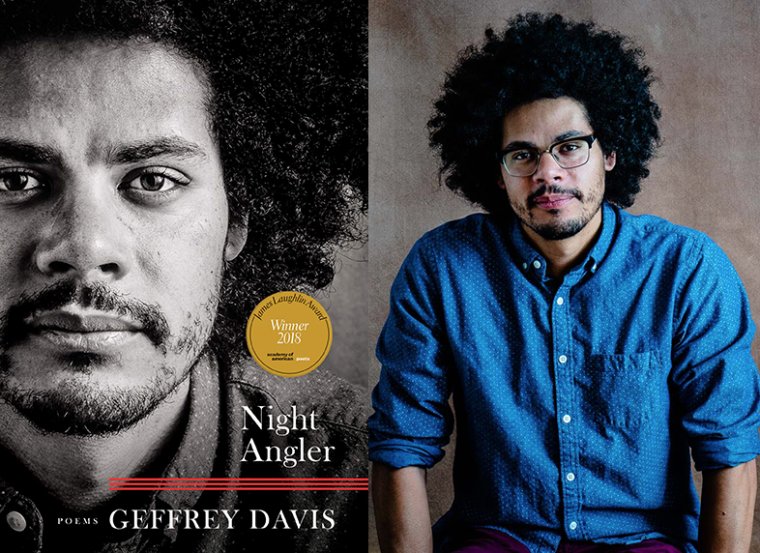
Geffrey Davis, author of Night Angler.
Ten Questions for Alison C. Rollins
This week’s installment of Ten Questions features Alison C. Rollins, whose debut poetry collection, Library of Small Catastrophes, is out today from Copper Canyon Press. Drawing on Jorge Luis Borges’s fascination with the library, Rollins uses the concept of the archive to uncover and investigate ideas of loss, progress, and decay. As Terrance Hayes writes of the book, “The small and large darknesses catalogued here make this a book of remarkable depth.” Rollins was born and raised in St. Louis and currently works as a librarian for the School of the Art Institute of Chicago. Her poems have appeared or are forthcoming in American Poetry Review, Hayden’s Ferry Review, Missouri Review, Poetry, and elsewhere. A Cave Canem and Callaloo Fellow, she was a 2016 recipient of the Poetry Foundation’s Ruth Lilly and Dorothy Sargent Rosenberg Fellowship.
1. How long did it take you to write Library of Small Catastrophes?
The poems in Library of Small Catastrophes were written over a three-to-four-year span. However, I would venture to assert that the book has taken a lifetime to write in terms of the necessity to live, experience, read, and hone my craft over time. Robert Hayden in the poem “The Tattooed Man” has the phrase: “all art is pain suffered and outlived.” While I don’t hope to glorify suffering in the service of artistic practice I do think it is important to celebrate living, awareness, observation, and the act of being present in the world. Many of the poems in this book are based on experiences that I have witnessed or been a part of and I had to live them and be present within them to in turn translate them into poems. I want to equally highlight time and labor because this sort of question can in some ways place greater value on Library of Small Catastrophes as a product rather than on the living required to make the physical object of a book. I don’t seek to glorify suffering but living requires exposure to both joy and pain (in often highly unbalanced ways for certain bodies in the context of the United States). I wish to celebrate living and to do so not always in relationship to measured productivity or a finished product such as a book.
2. What was the most challenging thing about writing the book?
It was challenging to accept that with the birth of the book all the other seemingly limitless possibilities for the project in turn died. There is a certain finitude to publishing a book that makes me a little uncomfortable in the sense that the work becomes a fairly static thing. I can’t continue to edit, reorder, change the cover art, etc. To go back to question one, I try to privilege the concept of being in process over something that is finalized. In Parable of the Sower Octavia Butler writes, “The only lasting truth is change.” If Butler is right, which I think she is, we all need to work towards increasing our tolerance to change.
3. Where, when, and how often do you write?
A large majority of the poems in Library of Small Catastrophes were written during the day at work in libraries. I don’t have a daily writing practice or formal schedule. I read on the bus ride to work and I write in stolen moments while at work. Much of my writing is in direct contact with other forms of labor that I am directly engaged in. Writing retreats have been especially helpful to me to carve out writing-intensive periods where I can focus.
4. What was the most unexpected thing about the publication process?
Having to contextualize the book from a marketing and press standpoint was something that was not initially on my radar. I hadn’t really thought of the skill necessary to step back and frame the work within the context of a blurb or a synopsis. It is a really interesting and rather separate endeavor from writing the actual individual poems that came to make up the collection. To articulately explain what you see the overall project as functioning to do can be oddly challenging and unexpected at the end of the publication process.
5. What are you reading right now?
I just finished Marian Engel’s Bear, Alexander Chee’s How to Write an Autobiographical Novel, and Kiese Laymon’s Heavy. I’m currently reading Renee Gladman’s Juice, Audre Lorde’s Zami: A New Spelling of My Name, and Ilya Kaminsky’s Deaf Republic. I am a librarian and voracious reader so this literally changes every other day.
6. Which author, in your opinion, deserves wider recognition?
This question depends a lot on context, realities about how literary canons function, systemic inequity, as well as how “wider recognition” is being defined and measured. This is a very difficult question to answer but I will offer in response the names of three poets: CM Burroughs, M. NourbeSe Philip, and Dawn Lundy Martin. I will also say Phillis Wheatley for good measure.
7. What is one thing you’d change about the literary community and/or the publishing business?
I am probably a lofty romantic but I wish people in the “literary community” extended more grace to one another and more often than not embraced curiosity and awe as lifestyles. I wish that people read more widely and embodied a belief that there is space at the table for everyone—and in turn found this notion to be freeing rather than threatening. While I realize sales-driven approaches and the economics of the publishing industry are arguably necessary evils, I wish that as an industry we didn’t underestimate readers and their capacity or desire for strong innovative writing. I would argue that all people are hungry for access to beautiful words, fresh ideas, and moving storytelling. Lastly, I am surely imperfect but I genuinely strive on a fundamental level to be a kind person. I don’t think extending grace to myself and others should result in my being viewed as any less talented, intellectual, and critically rigorous. We could all use more kindness.
8. What is the biggest impediment to your writing life?
Time. In How to Write an Autobiographical Novel Alexander Chee writes, “Time is our mink, our Lexus, our mansion. In a room full of writers of various kinds, time is probably the only thing that can provoke widespread envy, more than acclaim. Acclaim, which of course means access to money, which then becomes time.” I could not agree more.
9. What trait do you most value in an editor?
I value most an editor with an expansive imagination. More specifically, I appreciate an editor that does not succumb to a limited imagination in terms of my identity/subject/position in the world and what that means in relationship to my writing and the potential readers of my work.
10. What’s the best piece of writing advice you’ve ever heard?
Terrance Hayes relayed the Thelonious Monk quote, “A genius is the one most like himself” during a craft talk at a writing retreat that I attended a few years ago. It truly resonated with me because without sounding cliché I think writing should be connected to the constant ever-evolving work of discovering, (re)imagining, and (re)claiming one’s own selfhood.
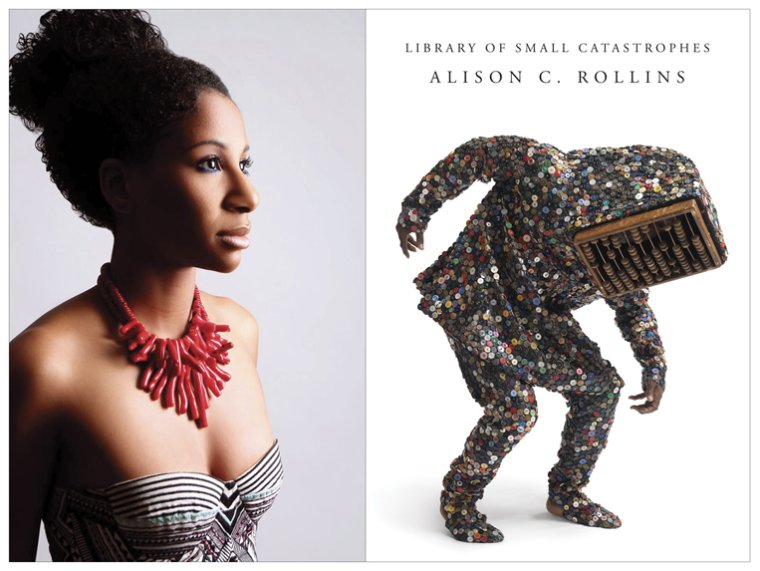
Alison C. Rollins, author of Library of Small Catastrophes. (Credit: Maya Ayanna Darasaw)
Ten Questions for Kenji C. Liu
This week’s installment of Ten Questions features Kenji C. Liu, whose second poetry collection, Monsters I Have Been, is out today from Alice James Books. Using an invented method he calls “frankenpo” (or Frankenstein poetry), Liu takes an existing text and remixes it, resurrecting older work to create new poetry that investigates the intersections between toxic masculinity, violence, and marginalization. A book that Douglas Kearney calls “sharp, protean, dextrous, and discontent,” Liu’s collection “shows where the bodies have been buried, and that many won’t stay dead. No doubt, this book is alive as hell.” Kenji C. Liu is the author of a previous poetry collection, Map of an Onion (Inlandia Institute, 2016), winner of the 2015 Hillary Gravendyk Poetry Prize, and two chapbooks. His poems have appeared in American Poetry Review, Apogee, Barrow Street, the Progressive, the Rumpus, and other publications. A Kundiman fellow and an alumnus of the VONA/Voices workhop, the Community of Writers at Squaw Valley, and the Djerassi Resident Artist Program, he lives in Los Angeles.
1. How long did it take you to write Monsters I Have Been?
It took about three years, coming on the heels of my first collection. I was trying to figure out what to do next, and received some great advice from Jaswinder Bolina while at the Kundiman retreat. He suggested I pick a line or idea from my first collection that still felt juicy and go all the way down the rabbit hole with it. I did, and Monsters I Have Been is a direct result.
2. What was the most challenging thing about writing the book?
Since the book looks at various types of masculinities, I had to seriously reflect on how to write responsibly about gender. Toxic and conventional masculinities were easier, considering that there are always fresh examples in the news ad nauseam, though I did also try to give them some complexity without excusing away their violence. Unconventional masculinities were more challenging because I didn’t want to replicate dominant forms of representational violence. So I decided to approach these via some of the ways I’ve experienced being racially gendered, misgendered, and sexualized as an Asian American man.
3. Where, when, and how often do you write?
What’s kept me going is a semi-underground, e-mail–based writing accountability group where you sign up to write every day for a month. Recently I haven’t had time for it, but for many years I joined in for months at a time. When I participate, I write everywhere and anytime, often just a sentence or line per day. I might be at work, in transit, or even stranger places. After doing this consistently for years, writing feels like a habit, something you do every day like brushing your teeth. Writing becomes less “special,” which I consider to be a good thing.
4. What was the most unexpected thing about the publication process?
There wasn’t anything in particular about the publication process, but the DIY digital marketing campaign I undertook to promote the book ahead of publication created some unexpected results. Drawing on my experience in design and marketing, I decided to focus on an Instagram account (@monstersihavebeen) dedicated solely to the themes of the book, which cross-posted to Facebook and Twitter. I found this created a lot of advance interest, and really helped me gauge the book’s audience ahead of time.
5. What are you reading right now?
The Inheritance of Haunting by Heidi Andrea Restrepo Rhodes, 2018 winner of the Andrés Montoya Poetry Prize; I Even Regret Night, poems of Lalbihari Sharma, an indentured Indian servant in the Caribbean, translated by Rajiv Mohabir; American Sutra, on religious freedom and Japanese American Buddhists imprisoned in U.S. concentration camps during World War II, by Duncan Ryuken Williams; and Oculus by Sally Wen Mao.
6. Which authors, in your opinion, deserve wider recognition?
Vickie Vértiz, Muriel Leung, Sesshu Foster, Angela Peñaredondo, Mia Ayumi Malhotra.
7. What is one thing you’d change about the literary community and/or the publishing business?
I experience my corner of the poetry community as very generous and caring, but I have many issues with professionalizing poetry as a career with certain prizes and residencies you “have to” achieve—it can make people greedy, competitive, and encourage a perception of the world based on lack. I think the poetry community works better when it is cooperative and generous. Poetry shouldn’t be just another capitalist product.
8. What is the biggest impediment to your writing life?
Money and time.
9. What trait do you most value in an editor?
I need to sense that they understand what my project is trying to do at a fundamental level. Alice James Books seems to have had that understanding immediately, which I’m grateful for because Monsters I Have Been might take some time for the reader’s brain to adjust to if you have conventional expectations of poetry. If an editor, press, reviewer, or anyone else doesn’t seem to understand the project, it’s clearly not a good fit.
10. What’s the best piece of writing advice you’ve ever heard?
What I actually think of is a writing prompt I received from the poet Suheir Hammad many years ago. She asked us to write about a traumatic experience, and also to find something in the environment of the memory that was beautiful. For me, I think this has translated into ongoing writing advice—to look for beauty and grace even in the challenging material, whenever possible.
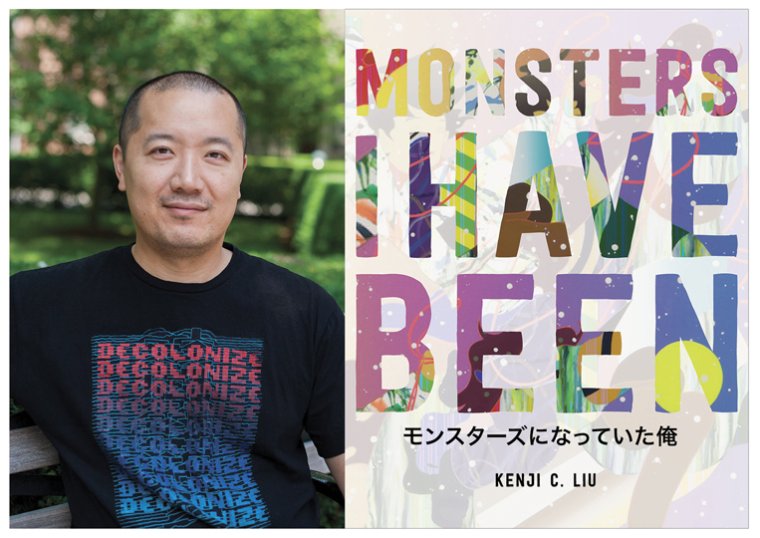
Kenji C. Liu, author of Monsters I Have Been. (Credit: Margarita Corporan)
Ten Questions for Gala Mukomolova
This week’s installment of Ten Questions features Gala Mukomolova, whose debut poetry collection, Without Protection, is out today from Coffee House Press. Mukomolova, who arrived with her family in New York when she was ten years old as a Jewish refugee from Russia, weaves together personal narrative and fable in her poems to interrogate ideas of identity, family, sexuality, and violence. Taking inspiration from Slavic folklore, several of Mukomolova’s poems reimagine the story of Vasilyssa, the young girl left to fend for herself against the witch Baba Yaga, to explore the ways in which a queer immigrant woman situates herself in a new country, navigating trauma, homophobia, displacement, and desire. Mukomolova earned an MFA from the University of Michigan and is the author of the chapbook One Above One Below: Positions & Lamentations (YesYes Books, 2018). Her poems and essays have appeared in Poetry, PEN American, PANK, and elsewhere, and in 2016 she won the 92 Street Y Discovery/Boston Review Poetry Prize. She also writes horoscopes and articles on astrology for NYLON.
1. How long did it take you to write Without Protection?
Without Protection took me anywhere between four and six years to write. Primarily because the Vasilyssa poems were originally from a separate project. Although, in hindsight, I can see how they were gathering together like a coven that would eventually conjure up the rest of the book.
2. What was the most challenging thing about writing the book?
Living through it was the most challenging thing. I wrote this book through some of the hardest, darkest moments in my young life. I wrote it through dealing with my father’s death and my long-term girlfriend’s departure. I wrote it through the pain of opening my heart again and through the inevitable heartbreak that resulted. Sometimes writing these poems was a reminder that I was still alive and sometimes I resented the reminder.
3. Where, when, and how often do you write?
I write all the time but I often do it for work which, if you don’t know, really gets in the way of what some might call the poet’s call. My astrology writings are a place where I exercise my creative freedoms, and I write articles sometimes twice a week. I’m surprised at what lyricism NYLON lets me publish. I’m grateful for it. Otherwise, when I’m avoiding admin work or emotional work, a poem will come to me. Sometimes every week or so, sometimes nothing for months.
4. What was the most unexpected thing about the publication process?
How I stopped being able to see the book. I felt almost blind to it. I had to look at each edited line individually like a bird fallen from the nest that I had to tenderly brush off and return.
5. What are you reading right now?
Marwa Helal’s Invasive species, Yanyi’s Year of Blue Water, Elaine Castillo’s America Is Not the Heart, Agnes Martin’s Writings, Melody Beattie’s The New Codependency, and Jessica Dore’s Tarot Card of the Day Twitter posts.
6. Which author, in your opinion, deserves wider recognition?
francine j. harris is a poetic genius with a smoky quartz for a heart and she should have many awards and many readers and possibly a temple devoted to her where one leaves sweet little offerings.
7. What is one thing you’d change about the literary community and/or the publishing business?
I’m not in the publishing business and don’t feel I have enough information to speak to that but in terms of the literary community, one thing I would change is the obsession people at large seem to develop with that one good white man. The moment one good white man appears to exist, people are ready to tattoo that man’s poems all over their bodies and eat their words like holy wafers.
8. What is the biggest impediment to your writing life?
Coming from financial precarity, living without a net, and spending most of my time hustling to makes ends meet is a pretty huge impediment. That and all the dissociation—but sometimes it does work in my favor, like when the paper swallows me like a genie bottle.
9. What trait do you most value in an editor?
The ability to approach the poem, not as they would want it but as they have perceived you, the writer, aiming to approach it. An editor who crafts a new lens for each writer they work with.
10. What’s the best piece of writing advice you’ve ever heard?
If what you’re writing begins to scare you, don’t stop—it’s about to get real good.
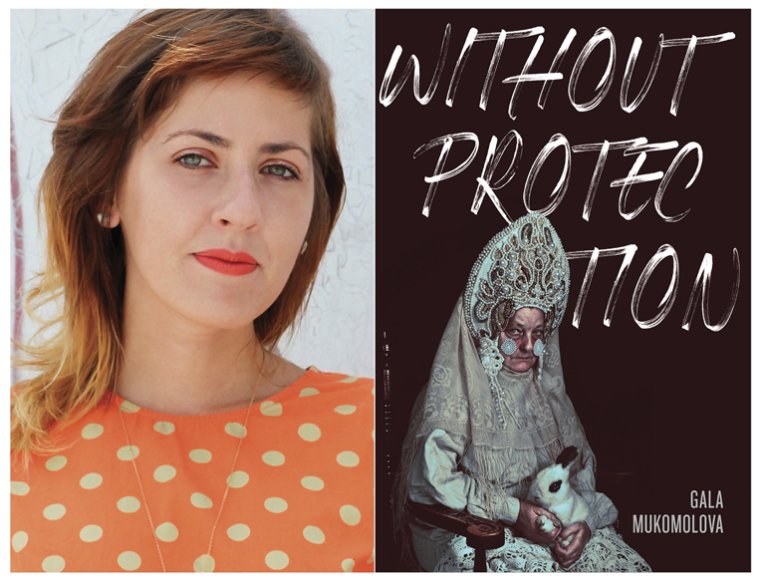
Gala Mukomolova, author of Without Protection.
Ten Questions for Emily Skaja
This week’s installment of Ten Questions features Emily Skaja, whose debut poetry collection, Brute, is out today from Graywolf Press. The winner of the 2018 Walt Whitman Award from the Academy of American Poets—an annual prize for a first book of poems that includes $5,000, publication, and a six-week residency at the Civitella Ranieri Foundation in Umbria, Italy—Skaja’s debut is an elegy to the end of a relationship that confronts love, loss, violence, grief, and rage. “What do we do with brokenness?” asks prize judge Joy Harjo, who selected the winning manuscript. “We document it, as Skaja has done in Brute. We sing of the brokenness as we emerge from it. We sing the holy objects, the white moths that fly from our mouths, and we stand with the new, wet earth that has been created with our terrible songs.” Emily Skaja grew up in rural Illinois and is a graduate of the MFA program at Purdue University. Her poems have been published in Best New Poets, Blackbird, Crazyhorse, FIELD, and Gulf Coast. She lives in Memphis.
1. How long did it take you to write Brute?
Five years. I started writing the poems in Brute in 2012. About three years into it, I had a book-length manuscript, but it felt incomplete to me. I wound up cutting or revising more than half of it, and then I spent another two years rethinking, rewriting, and rearranging it before I fully understood what shape it should take. In that time, I changed so much as a person that the manuscript began to feel closed off to me. Trying to write back into it was like being in conversation with a ghost of myself—a voice that draped itself in my clothes and spoke about my experiences, but from the point of view of someone who was a few steps removed from me. I found that in order to keep working on the book, I had to write my way back into it in a way that honored the time and distance that separated the new self from the ghost. As a result, there are a lot of poems in the book in which I address my younger self and try to reassemble her memories with the wisdom of recovery.
2. What was the most challenging thing about writing the book?
There’s a lot of mystery in my writing process, and I have the suspicion that I’m doing all the steps out of order. At the outset, I never know where any project is going. I start with a pile of drafts and look for signs of my own obsessions, and then I try to understand why I keep returning to a particular idea, feeling, or image. No matter how many times I reassure myself that I am, in fact, in charge of this process, I always feel as if I’m the last person to understand what I’m writing toward. It’s only in revision that I can see how consistently I’ve written about a particular idea, and then I can revise and cut and rework the poems as needed. Writing Brute was a painful process of self-discovery because my analysis of the obsessions in the manuscript required me to address parts of myself and my past that still felt raw. Initially, I believed that I was just writing a series of sad love poems, and then about halfway through drafting the book I realized that I was writing about grief and power and self-abandonment and rage. The poems are about my own experiences with abusive relationships, so changing my mind about the book also meant changing my mind about my life, and that proved to be very difficult.
3. Where, when, and how often do you write?
I write late at night at a big table I once painted bright orange during some heady HGTV-evangelist period of my life. I go through irregular seasons of writing. Something will trigger a writing cycle and I will work on fifteen poems in a row, and then I’ll experience a long, fallow period where I have no impulse to write at all. My strategy is to feed the fallow period with heavy reading. I try to be patient with myself when I’m not writing, but I’m much less forgiving if I’m behind on reading.
4. What was the most unexpected thing about the publication process?
The most surprising and gratifying part so far has been gaining a community of sympathetic readers. For a long time, I was writing these poems from a place of shame, so it has meant so much to me to hear from other people who have shared the same experiences or felt an emotional resonance with these poems.
5. What are you reading right now?
I’m reading Notes to Self by Emilie Pine, The Far Field by Madhuri Vijay, Deaf Republic by Ilya Kaminsky, and Build Yourself a Boat by Camonghne Felix. I recently finished Long Live the Tribe of Fatherless Girls by T Kira Madden, which I loved so much I know I will read it a second time. I also loved The Water Cure by Sophie Mackintosh and Milkman by Anna Burns.
6. Which author, in your opinion, deserves wider recognition?
Ingrid Rojas Contreras, whose brilliant essay “All Good Science Fiction Begins This Way” I have admired and taught for years, and who recently published a novel I also loved, Fruit of the Drunken Tree.
7. What is one thing you’d change about the literary community and/or the publishing business?
I would like to see more widespread initiatives to support writers of color, especially women and nonbinary writers.
8. What is the biggest impediment to your writing process?
I think my own brain is my worst impediment. I spend a few hours every day so consumed by dread that I can’t make myself do anything, so I sometimes daydream about all the amazing projects I could finish if I could reallocate those dread hours.
9. What trait do you most value in an editor?
I love to work with editors who can look at a line or a poem that isn’t quite right and help investigate what its curiosities are or what ideas it’s trying to find its way into.
10. What’s the best piece of writing advice you’ve ever heard?
The wonderful Don Platt once advised me to “go hard into the weird and stay there.”
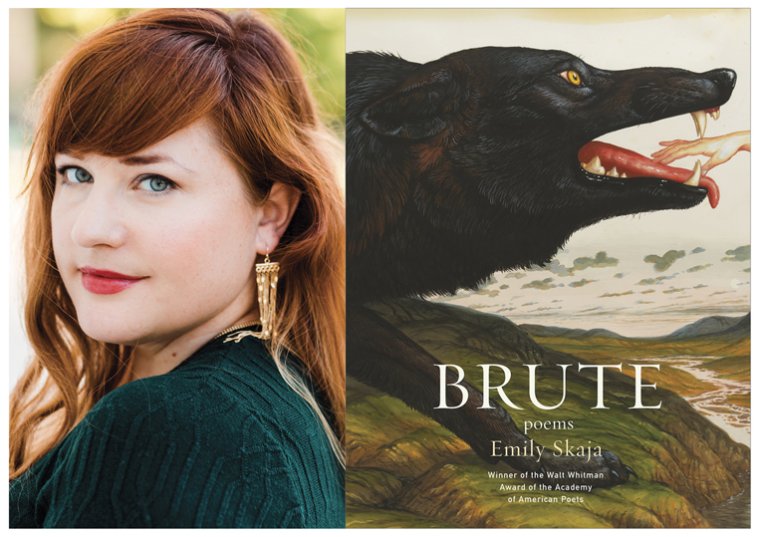
Emily Skaja, author of Brute. (Credit: Kaitlyn Stoddard Photography)
Deaf Republic by Ilya Kaminsky
Ilya Kaminsky reads three poems from his new collection, Deaf Republic, published in March by Graywolf Press.
Read “Still Dancing: An Interview With Ilya Kaminsky” by Garth Greenwell in the March/April 2019 issue of Poets & Writers Magazine.
Ten Questions for Emily Skaja
This week’s installment of Ten Questions features Emily Skaja, whose debut poetry collection, Brute, is out today from Graywolf Press. The winner of the 2018 Walt Whitman Award from the Academy of American Poets—an annual prize for a first book of poems that includes $5,000, publication, and a six-week residency at the Civitella Ranieri Foundation in Umbria, Italy—Skaja’s debut is an elegy to the end of a relationship that confronts love, loss, violence, grief, and rage. “What do we do with brokenness?” asks prize judge Joy Harjo, who selected the winning manuscript. “We document it, as Skaja has done in Brute. We sing of the brokenness as we emerge from it. We sing the holy objects, the white moths that fly from our mouths, and we stand with the new, wet earth that has been created with our terrible songs.” Emily Skaja grew up in rural Illinois and is a graduate of the MFA program at Purdue University. Her poems have been published in Best New Poets, Blackbird, Crazyhorse, FIELD, and Gulf Coast. She lives in Memphis.
1. How long did it take you to write Brute?
Five years. I started writing the poems in Brute in 2012. About three years into it, I had a book-length manuscript, but it felt incomplete to me. I wound up cutting or revising more than half of it, and then I spent another two years rethinking, rewriting, and rearranging it before I fully understood what shape it should take. In that time, I changed so much as a person that the manuscript began to feel closed off to me. Trying to write back into it was like being in conversation with a ghost of myself—a voice that draped itself in my clothes and spoke about my experiences, but from the point of view of someone who was a few steps removed from me. I found that in order to keep working on the book, I had to write my way back into it in a way that honored the time and distance that separated the new self from the ghost. As a result, there are a lot of poems in the book in which I address my younger self and try to reassemble her memories with the wisdom of recovery.
2. What was the most challenging thing about writing the book?
There’s a lot of mystery in my writing process, and I have the suspicion that I’m doing all the steps out of order. At the outset, I never know where any project is going. I start with a pile of drafts and look for signs of my own obsessions, and then I try to understand why I keep returning to a particular idea, feeling, or image. No matter how many times I reassure myself that I am, in fact, in charge of this process, I always feel as if I’m the last person to understand what I’m writing toward. It’s only in revision that I can see how consistently I’ve written about a particular idea, and then I can revise and cut and rework the poems as needed. Writing Brute was a painful process of self-discovery because my analysis of the obsessions in the manuscript required me to address parts of myself and my past that still felt raw. Initially, I believed that I was just writing a series of sad love poems, and then about halfway through drafting the book I realized that I was writing about grief and power and self-abandonment and rage. The poems are about my own experiences with abusive relationships, so changing my mind about the book also meant changing my mind about my life, and that proved to be very difficult.
3. Where, when, and how often do you write?
I write late at night at a big table I once painted bright orange during some heady HGTV-evangelist period of my life. I go through irregular seasons of writing. Something will trigger a writing cycle and I will work on fifteen poems in a row, and then I’ll experience a long, fallow period where I have no impulse to write at all. My strategy is to feed the fallow period with heavy reading. I try to be patient with myself when I’m not writing, but I’m much less forgiving if I’m behind on reading.
4. What was the most unexpected thing about the publication process?
The most surprising and gratifying part so far has been gaining a community of sympathetic readers. For a long time, I was writing these poems from a place of shame, so it has meant so much to me to hear from other people who have shared the same experiences or felt an emotional resonance with these poems.
5. What are you reading right now?
I’m reading Notes to Self by Emilie Pine, The Far Field by Madhuri Vijay, Deaf Republic by Ilya Kaminsky, and Build Yourself a Boat by Camonghne Felix. I recently finished Long Live the Tribe of Fatherless Girls by T Kira Madden, which I loved so much I know I will read it a second time. I also loved The Water Cure by Sophie Mackintosh and Milkman by Anna Burns.
6. Which author, in your opinion, deserves wider recognition?
Ingrid Rojas Contreras, whose brilliant essay “All Good Science Fiction Begins This Way” I have admired and taught for years, and who recently published a novel I also loved, Fruit of the Drunken Tree.
7. What is one thing you’d change about the literary community and/or the publishing business?
I would like to see more widespread initiatives to support writers of color, especially women and nonbinary writers.
8. What is the biggest impediment to your writing process?
I think my own brain is my worst impediment. I spend a few hours every day so consumed by dread that I can’t make myself do anything, so I sometimes daydream about all the amazing projects I could finish if I could reallocate those dread hours.
9. What trait do you most value in an editor?
I love to work with editors who can look at a line or a poem that isn’t quite right and help investigate what its curiosities are or what ideas it’s trying to find its way into.
10. What’s the best piece of writing advice you’ve ever heard?
The wonderful Don Platt once advised me to “go hard into the weird and stay there.”

Emily Skaja, author of Brute. (Credit: Kaitlyn Stoddard Photography)
Deaf Republic by Ilya Kaminsky
Ilya Kaminsky reads three poems from his new collection, Deaf Republic, published in March by Graywolf Press.
Read “Still Dancing: An Interview With Ilya Kaminsky” by Garth Greenwell in the March/April 2019 issue of Poets & Writers Magazine.
Ten Questions for Gala Mukomolova
This week’s installment of Ten Questions features Gala Mukomolova, whose debut poetry collection, Without Protection, is out today from Coffee House Press. Mukomolova, who arrived with her family in New York when she was ten years old as a Jewish refugee from Russia, weaves together personal narrative and fable in her poems to interrogate ideas of identity, family, sexuality, and violence. Taking inspiration from Slavic folklore, several of Mukomolova’s poems reimagine the story of Vasilyssa, the young girl left to fend for herself against the witch Baba Yaga, to explore the ways in which a queer immigrant woman situates herself in a new country, navigating trauma, homophobia, displacement, and desire. Mukomolova earned an MFA from the University of Michigan and is the author of the chapbook One Above One Below: Positions & Lamentations (YesYes Books, 2018). Her poems and essays have appeared in Poetry, PEN American, PANK, and elsewhere, and in 2016 she won the 92 Street Y Discovery/Boston Review Poetry Prize. She also writes horoscopes and articles on astrology for NYLON.
1. How long did it take you to write Without Protection?
Without Protection took me anywhere between four and six years to write. Primarily because the Vasilyssa poems were originally from a separate project. Although, in hindsight, I can see how they were gathering together like a coven that would eventually conjure up the rest of the book.
2. What was the most challenging thing about writing the book?
Living through it was the most challenging thing. I wrote this book through some of the hardest, darkest moments in my young life. I wrote it through dealing with my father’s death and my long-term girlfriend’s departure. I wrote it through the pain of opening my heart again and through the inevitable heartbreak that resulted. Sometimes writing these poems was a reminder that I was still alive and sometimes I resented the reminder.
3. Where, when, and how often do you write?
I write all the time but I often do it for work which, if you don’t know, really gets in the way of what some might call the poet’s call. My astrology writings are a place where I exercise my creative freedoms, and I write articles sometimes twice a week. I’m surprised at what lyricism NYLON lets me publish. I’m grateful for it. Otherwise, when I’m avoiding admin work or emotional work, a poem will come to me. Sometimes every week or so, sometimes nothing for months.
4. What was the most unexpected thing about the publication process?
How I stopped being able to see the book. I felt almost blind to it. I had to look at each edited line individually like a bird fallen from the nest that I had to tenderly brush off and return.
5. What are you reading right now?
Marwa Helal’s Invasive species, Yanyi’s Year of Blue Water, Elaine Castillo’s America Is Not the Heart, Agnes Martin’s Writings, Melody Beattie’s The New Codependency, and Jessica Dore’s Tarot Card of the Day Twitter posts.
6. Which author, in your opinion, deserves wider recognition?
francine j. harris is a poetic genius with a smoky quartz for a heart and she should have many awards and many readers and possibly a temple devoted to her where one leaves sweet little offerings.
7. What is one thing you’d change about the literary community and/or the publishing business?
I’m not in the publishing business and don’t feel I have enough information to speak to that but in terms of the literary community, one thing I would change is the obsession people at large seem to develop with that one good white man. The moment one good white man appears to exist, people are ready to tattoo that man’s poems all over their bodies and eat their words like holy wafers.
8. What is the biggest impediment to your writing life?
Coming from financial precarity, living without a net, and spending most of my time hustling to makes ends meet is a pretty huge impediment. That and all the dissociation—but sometimes it does work in my favor, like when the paper swallows me like a genie bottle.
9. What trait do you most value in an editor?
The ability to approach the poem, not as they would want it but as they have perceived you, the writer, aiming to approach it. An editor who crafts a new lens for each writer they work with.
10. What’s the best piece of writing advice you’ve ever heard?
If what you’re writing begins to scare you, don’t stop—it’s about to get real good.

Gala Mukomolova, author of Without Protection.
Ten Questions for Emily Skaja
This week’s installment of Ten Questions features Emily Skaja, whose debut poetry collection, Brute, is out today from Graywolf Press. The winner of the 2018 Walt Whitman Award from the Academy of American Poets—an annual prize for a first book of poems that includes $5,000, publication, and a six-week residency at the Civitella Ranieri Foundation in Umbria, Italy—Skaja’s debut is an elegy to the end of a relationship that confronts love, loss, violence, grief, and rage. “What do we do with brokenness?” asks prize judge Joy Harjo, who selected the winning manuscript. “We document it, as Skaja has done in Brute. We sing of the brokenness as we emerge from it. We sing the holy objects, the white moths that fly from our mouths, and we stand with the new, wet earth that has been created with our terrible songs.” Emily Skaja grew up in rural Illinois and is a graduate of the MFA program at Purdue University. Her poems have been published in Best New Poets, Blackbird, Crazyhorse, FIELD, and Gulf Coast. She lives in Memphis.
1. How long did it take you to write Brute?
Five years. I started writing the poems in Brute in 2012. About three years into it, I had a book-length manuscript, but it felt incomplete to me. I wound up cutting or revising more than half of it, and then I spent another two years rethinking, rewriting, and rearranging it before I fully understood what shape it should take. In that time, I changed so much as a person that the manuscript began to feel closed off to me. Trying to write back into it was like being in conversation with a ghost of myself—a voice that draped itself in my clothes and spoke about my experiences, but from the point of view of someone who was a few steps removed from me. I found that in order to keep working on the book, I had to write my way back into it in a way that honored the time and distance that separated the new self from the ghost. As a result, there are a lot of poems in the book in which I address my younger self and try to reassemble her memories with the wisdom of recovery.
2. What was the most challenging thing about writing the book?
There’s a lot of mystery in my writing process, and I have the suspicion that I’m doing all the steps out of order. At the outset, I never know where any project is going. I start with a pile of drafts and look for signs of my own obsessions, and then I try to understand why I keep returning to a particular idea, feeling, or image. No matter how many times I reassure myself that I am, in fact, in charge of this process, I always feel as if I’m the last person to understand what I’m writing toward. It’s only in revision that I can see how consistently I’ve written about a particular idea, and then I can revise and cut and rework the poems as needed. Writing Brute was a painful process of self-discovery because my analysis of the obsessions in the manuscript required me to address parts of myself and my past that still felt raw. Initially, I believed that I was just writing a series of sad love poems, and then about halfway through drafting the book I realized that I was writing about grief and power and self-abandonment and rage. The poems are about my own experiences with abusive relationships, so changing my mind about the book also meant changing my mind about my life, and that proved to be very difficult.
3. Where, when, and how often do you write?
I write late at night at a big table I once painted bright orange during some heady HGTV-evangelist period of my life. I go through irregular seasons of writing. Something will trigger a writing cycle and I will work on fifteen poems in a row, and then I’ll experience a long, fallow period where I have no impulse to write at all. My strategy is to feed the fallow period with heavy reading. I try to be patient with myself when I’m not writing, but I’m much less forgiving if I’m behind on reading.
4. What was the most unexpected thing about the publication process?
The most surprising and gratifying part so far has been gaining a community of sympathetic readers. For a long time, I was writing these poems from a place of shame, so it has meant so much to me to hear from other people who have shared the same experiences or felt an emotional resonance with these poems.
5. What are you reading right now?
I’m reading Notes to Self by Emilie Pine, The Far Field by Madhuri Vijay, Deaf Republic by Ilya Kaminsky, and Build Yourself a Boat by Camonghne Felix. I recently finished Long Live the Tribe of Fatherless Girls by T Kira Madden, which I loved so much I know I will read it a second time. I also loved The Water Cure by Sophie Mackintosh and Milkman by Anna Burns.
6. Which author, in your opinion, deserves wider recognition?
Ingrid Rojas Contreras, whose brilliant essay “All Good Science Fiction Begins This Way” I have admired and taught for years, and who recently published a novel I also loved, Fruit of the Drunken Tree.
7. What is one thing you’d change about the literary community and/or the publishing business?
I would like to see more widespread initiatives to support writers of color, especially women and nonbinary writers.
8. What is the biggest impediment to your writing process?
I think my own brain is my worst impediment. I spend a few hours every day so consumed by dread that I can’t make myself do anything, so I sometimes daydream about all the amazing projects I could finish if I could reallocate those dread hours.
9. What trait do you most value in an editor?
I love to work with editors who can look at a line or a poem that isn’t quite right and help investigate what its curiosities are or what ideas it’s trying to find its way into.
10. What’s the best piece of writing advice you’ve ever heard?
The wonderful Don Platt once advised me to “go hard into the weird and stay there.”

Emily Skaja, author of Brute. (Credit: Kaitlyn Stoddard Photography)
Deaf Republic by Ilya Kaminsky
Ilya Kaminsky reads three poems from his new collection, Deaf Republic, published in March by Graywolf Press.
Read “Still Dancing: An Interview With Ilya Kaminsky” by Garth Greenwell in the March/April 2019 issue of Poets & Writers Magazine.
Ten Questions for Alison C. Rollins
This week’s installment of Ten Questions features Alison C. Rollins, whose debut poetry collection, Library of Small Catastrophes, is out today from Copper Canyon Press. Drawing on Jorge Luis Borges’s fascination with the library, Rollins uses the concept of the archive to uncover and investigate ideas of loss, progress, and decay. As Terrance Hayes writes of the book, “The small and large darknesses catalogued here make this a book of remarkable depth.” Rollins was born and raised in St. Louis and currently works as a librarian for the School of the Art Institute of Chicago. Her poems have appeared or are forthcoming in American Poetry Review, Hayden’s Ferry Review, Missouri Review, Poetry, and elsewhere. A Cave Canem and Callaloo Fellow, she was a 2016 recipient of the Poetry Foundation’s Ruth Lilly and Dorothy Sargent Rosenberg Fellowship.
1. How long did it take you to write Library of Small Catastrophes?
The poems in Library of Small Catastrophes were written over a three-to-four-year span. However, I would venture to assert that the book has taken a lifetime to write in terms of the necessity to live, experience, read, and hone my craft over time. Robert Hayden in the poem “The Tattooed Man” has the phrase: “all art is pain suffered and outlived.” While I don’t hope to glorify suffering in the service of artistic practice I do think it is important to celebrate living, awareness, observation, and the act of being present in the world. Many of the poems in this book are based on experiences that I have witnessed or been a part of and I had to live them and be present within them to in turn translate them into poems. I want to equally highlight time and labor because this sort of question can in some ways place greater value on Library of Small Catastrophes as a product rather than on the living required to make the physical object of a book. I don’t seek to glorify suffering but living requires exposure to both joy and pain (in often highly unbalanced ways for certain bodies in the context of the United States). I wish to celebrate living and to do so not always in relationship to measured productivity or a finished product such as a book.
2. What was the most challenging thing about writing the book?
It was challenging to accept that with the birth of the book all the other seemingly limitless possibilities for the project in turn died. There is a certain finitude to publishing a book that makes me a little uncomfortable in the sense that the work becomes a fairly static thing. I can’t continue to edit, reorder, change the cover art, etc. To go back to question one, I try to privilege the concept of being in process over something that is finalized. In Parable of the Sower Octavia Butler writes, “The only lasting truth is change.” If Butler is right, which I think she is, we all need to work towards increasing our tolerance to change.
3. Where, when, and how often do you write?
A large majority of the poems in Library of Small Catastrophes were written during the day at work in libraries. I don’t have a daily writing practice or formal schedule. I read on the bus ride to work and I write in stolen moments while at work. Much of my writing is in direct contact with other forms of labor that I am directly engaged in. Writing retreats have been especially helpful to me to carve out writing-intensive periods where I can focus.
4. What was the most unexpected thing about the publication process?
Having to contextualize the book from a marketing and press standpoint was something that was not initially on my radar. I hadn’t really thought of the skill necessary to step back and frame the work within the context of a blurb or a synopsis. It is a really interesting and rather separate endeavor from writing the actual individual poems that came to make up the collection. To articulately explain what you see the overall project as functioning to do can be oddly challenging and unexpected at the end of the publication process.
5. What are you reading right now?
I just finished Marian Engel’s Bear, Alexander Chee’s How to Write an Autobiographical Novel, and Kiese Laymon’s Heavy. I’m currently reading Renee Gladman’s Juice, Audre Lorde’s Zami: A New Spelling of My Name, and Ilya Kaminsky’s Deaf Republic. I am a librarian and voracious reader so this literally changes every other day.
6. Which author, in your opinion, deserves wider recognition?
This question depends a lot on context, realities about how literary canons function, systemic inequity, as well as how “wider recognition” is being defined and measured. This is a very difficult question to answer but I will offer in response the names of three poets: CM Burroughs, M. NourbeSe Philip, and Dawn Lundy Martin. I will also say Phillis Wheatley for good measure.
7. What is one thing you’d change about the literary community and/or the publishing business?
I am probably a lofty romantic but I wish people in the “literary community” extended more grace to one another and more often than not embraced curiosity and awe as lifestyles. I wish that people read more widely and embodied a belief that there is space at the table for everyone—and in turn found this notion to be freeing rather than threatening. While I realize sales-driven approaches and the economics of the publishing industry are arguably necessary evils, I wish that as an industry we didn’t underestimate readers and their capacity or desire for strong innovative writing. I would argue that all people are hungry for access to beautiful words, fresh ideas, and moving storytelling. Lastly, I am surely imperfect but I genuinely strive on a fundamental level to be a kind person. I don’t think extending grace to myself and others should result in my being viewed as any less talented, intellectual, and critically rigorous. We could all use more kindness.
8. What is the biggest impediment to your writing life?
Time. In How to Write an Autobiographical Novel Alexander Chee writes, “Time is our mink, our Lexus, our mansion. In a room full of writers of various kinds, time is probably the only thing that can provoke widespread envy, more than acclaim. Acclaim, which of course means access to money, which then becomes time.” I could not agree more.
9. What trait do you most value in an editor?
I value most an editor with an expansive imagination. More specifically, I appreciate an editor that does not succumb to a limited imagination in terms of my identity/subject/position in the world and what that means in relationship to my writing and the potential readers of my work.
10. What’s the best piece of writing advice you’ve ever heard?
Terrance Hayes relayed the Thelonious Monk quote, “A genius is the one most like himself” during a craft talk at a writing retreat that I attended a few years ago. It truly resonated with me because without sounding cliché I think writing should be connected to the constant ever-evolving work of discovering, (re)imagining, and (re)claiming one’s own selfhood.

Alison C. Rollins, author of Library of Small Catastrophes. (Credit: Maya Ayanna Darasaw)
Ten Questions for Julie Orringer
This week’s installment of Ten Questions features Julie Orringer, whose third book, the novel The Flight Portfolio, is out today from Knopf. Based on the true story of Varian Fry, a young New York journalist and editor who in 1940 was the head of the Emergency Rescue Committee, designed to protect artists and writers from being deported to Nazi concentration camps and to send intellectual treasures back to the United States, The Flight Portfolio returns to the same territory, Europe on the brink of World War II, that thrilled readers of Orringer’s debut novel, The Invisible Bridge. Andrew Sean Greer calls it “ambitious, meticulous, big-hearted, gorgeous, historical, suspenseful, everything you want a novel to be.” Orringer is also the author of the award-winning short story collection How to Breathe Underwater, which was a New York Times Notable Book. She lives in Brooklyn.
1. How long did it take you to write The Flight Portfolio?
Nine years, more or less. While researching my last novel, The Invisible Bridge, which also took place during the Second World War, I read about the American journalist Varian Fry’s heroic work in Marseille: His mission was to locate celebrated European artists who’d fled to France from the Nazi-occupied countries and arrange their safe passage to the States. The job was fraught with moral complications—given limited time and resources, who would Fry choose to save?—and the historical account seemed to miss certain essential elements, particularly those surrounding Fry’s personal life (he had a number of well-documented relationships with men, a fact that historians elided, denied, or shuddered away from, as if to suggest that it’s not acceptable to be a hero of the Holocaust if one also happens to be gay). Researching Fry’s life and mission took the better part of four years—a time during which I moved three times and gave birth to my two children—and writing and revision occupied the five years that followed. Which is not to suggest that no writing occurred during the initial research, nor that there was ever a time when the research ceased—it continued, in fact, through the last day I could change a word of the draft.
2. What was the most challenging thing about writing the book?
Undoubtedly it was the research into Fry’s work in Marseille, a detailed record of which exists in biographies, interviews, letters, ephemera, and even still in living memory: Fry’s last surviving associate, Justus Rosenberg, is a professor emeritus of languages and literature at Bard College, and was kind enough to speak to me about his experiences. Twenty-seven boxes of Fry’s letters, papers, photographs, and other writings reside in the Rare Books and Manuscripts collection at Columbia’s Butler Library; I spent many hours immersed in those files, learning what I could about what kept Fry up at night, what obsessed him by day, what he struggled with, how he triumphed, and how he thought about his own work years later. I spent a year at the Radcliffe Institute at Harvard, where Fry studied as an undergraduate; there I had the chance to examine his recently unsealed student records, which include not only his grade transcripts and his application, but also letters from his father, his professors, the dean, and various close associates, many of them arguing either for or against Fry’s expulsion from Harvard for a variety of infractions that included spotty attendance, raucous partying, destruction of school property, reckless driving, and, ultimately, the placing of a For Sale sign on Dean Greenough’s lawn. Then there were the dozens—hundreds, ultimately thousands—of Fry’s clients, whose lives and work I felt I must know before I wrote the book. And of course I had to go to Marseille, where I visited the places Fry lived and worked, at least those that still exist (the marvelous Villa Air Bel, where he lived with a group of Surrealist writers and artists, was razed decades ago). The nearly impossible task was to clear space among all that was known for what could not be known—space where I could make a narrative that would honor Fry’s experience but would move beyond what could have been recorded at the time.
3. Where, when, and how often do you write?
I write five or six days a week at the Brooklyn Writers’ Space. I’m married to another fiction writer, my former Iowa MFA classmate Ryan Harty, and, as I mentioned, we have two young children; we have a carefully worked-out schedule that allows each of us a couple of long writing days each week (eight hours or so) and a number of shorter ones (five hours). Often I write at night, too, especially if I’m starting something new or working on a short story or a nonfiction piece.
4. What was the most unexpected thing about the publication process?
The inestimable benefit of sharing a very early draft with my editor, Jordan Pavlin. Jordan edited my two previous books, but I’d never before shown her anything that hadn’t been revised six or seven times. This novel involved so much risk, and took so long to complete, that I felt I needed her insight and support long before I’d written three or four versions. Did the novel strike the right balance between history and fiction? Had I captured the characters’ essential struggles clearly? How to address problems of pacing, continuity, clarity? Jordan’s exacting readings—not just one, but three or four—echoed my own doubts and provided necessary perspective and reassurance. And her comments pulled no punches. She was scrupulously honest. She was rigorous. She challenged me to do better. And my desire to meet her standards was, as it always is, fueled as much by my ardent admiration for her as a human being as by my deep respect for her literary mind.
5. What trait do you most value in an editor?
See above.
6. What are you reading right now?
Susan Choi’s Trust Exercise, which cuts a little too close at times to my own 1980’s experience in a high school drama group—one that took itself at least as seriously as Choi’s Citywide Academy for the Performing Arts. She hits all the notes with dead-on precision: favoritism toward certain students by charismatic teachers, intrigue surrounding highly-charged relationships, endless quoting of Monty Python, jobs at TCBY, the dire importance of having a car and/or friends with cars, etc. But the true brilliance of the book is its structure: A first section in which the subjective experience of high school students is rendered with respect and utter seriousness; a second section that brings a questioning (and revenge-seeking) adult sensibility to bear upon the first; and a third section that sharpens the earlier sections into clearer resolution still, suggesting the persistent consequences of those seemingly trivial sophomore liaisons.
7. Which author, in your opinion, deserves wider recognition?
Here are three new writers whose work I’ve found risk-laced, challenging, and full of fierce delights: Ebony Flowers, Rona Jaffe-winning cartoonist and disciple of Lynda Barry, whose brilliant debut short story collection, Hot Comb, will be published by Drawn and Quarterly in June; shot through with tender and intelligent humor, it’s an incisive examination of cultural and familial tensions in black women’s lives. Domenica Phetteplace is another of my favorite new writers; her marvelous short story “Blue Cup,” a futurist skewering of commerce-driven life in the Bay Area, involves a young woman whose job requires her to deliver tailored social experiences to clients at an exclusive dining club; the story is narrated by the artificial intelligence software that co-inhabits her mind. And Anjali Sachdeva’s All the Names they Used for God is a story collection that merges the real and the supernatural with genre-breaking bravery, employing a prose so precise that you follow her into marvelous realms without question: Ice caves, exploding steel mill furnaces, an ocean inhabited by an elusive mermaid whose fleshy, tentacle-like hair still haunts my dreams.
8. What is one thing you’d change about the literary community and/or the publishing business?
I’d love to see more works in translation published in this country—for more publishing houses to commit seriously to the cultivation and dissemination of international literature. I admire the work of New York Review Books, Restless Books, and Europa Editions in this arena. I loved, for example, Restless Books’ recently published translation of Marcus Malte’s The Boy, a Prix Femina-winning novel about a young man who spent the first fourteen years of his life in mute isolation in the wilds of France. The story of this young man’s entry into the early twentieth-century world—first into a rural setting, then Paris, and finally the battlefields of the First World War—is the story of what makes us human, and casts our world in a stark new light. Even stories as place-specific as The Boy have much to reveal about all our lives; and, just as importantly, they illuminate and particularize the vast array of human experiences different from our own. One of literature’s great powers is its ability to act as a tonic against xenophobia; there’s never been a moment when that power has been more urgently needed.
9. What is the biggest impediment to your writing life?
The finite nature of the twenty-four-hour day. But places like the MacDowell Colony and Yaddo, the New York Public Library’s Cullman Center and the Radcliffe Institute for Advanced Study, seek to explode that limitation by removing barriers to creative freedom. At MacDowell, where every artist gets a secluded studio, meticulously prepared meals, and unlimited uninterrupted time to work, there’s a kind of magical speeding-up of the creative process. You don’t necessarily fail less often; you fail faster, and recover faster. The people who dedicate their professional lives to the running of those programs are literature’s great guardians and cultivators.
10. What’s the best piece of writing advice you’ve ever heard?
It would be impossible to identify the best, because I’ve been the fortunate recipient of much wonderful advice from writers like Marilynne Robinson, James Alan MacPherson, Tobias Wolff, Elizabeth Tallent, and John L’Heureux, for more years than I care to consider. But I can tell you about a piece of advice I chose not to take: A prominent writer once told me, at a barbecue at a friend’s house in Maine, that if I wanted to take myself seriously as a writer, I’d better reconsider my desire to have children. For each child I had, this writer told me, I was sacrificing a book. Now I can say with certainty that my writing life has been immeasurably enriched and transformed by having become a parent. And if parenthood is demanding, both of time and emotional energy—as of course it is—life with children reminds me always of why writing feels essential: At its best and most rigorous, it illuminates—both for writer and reader—the richness and complexity of the human world, and forces us to make a deep moral consideration of our role in it.

Julie Orringer, author of The Flight Portfolio. (Credit: Brigitte Lacombe)
Ten Questions for Geffrey Davis
This week’s installment of Ten Questions features Geffrey Davis, whose second poetry collection, Night Angler, is out today from BOA Editions. The book, which won the 2018 James Laughlin Award from the Academy of American Poets, is both a love letter to a son and a meditation on parenthood, family, race, and loss. “The poems in Geffrey Davis’s Night Angler sing in both ecstatic joy and tremendous lament,” writes Oliver de la Paz. “Poetry and prayer have never shared so close a breath.” Davis is the author of a previous poetry collection, Revising the Storm (BOA Editions, 2014), which won the 2013 A. Poulin Jr. Poetry Prize and was a finalist for the 2015 Hurston/Wright Legacy Award for Poetry. Davis has won the Anne Halley Poetry Prize, the Dogwood Prize in Poetry, the Wabash Prize for Poetry, an Academy of American Poets Prize, and fellowships from Bread Loaf, Cave Canem, and the Vermont Studio Center. A native of the Pacific Northwest, Davis teaches for the University of Arkansas MFA in Creative Writing & Translation and the Rainier Writing Workshop low-residency MFA program at Pacific Lutheran University.
1. How long did it take you to write Night Angler?
It took me almost four years to have a full first draft of this book—and then another year or so of revisions and restructuring to get it ready for production.
2. What was the most challenging thing about writing the book?
In the middle of drafting the poems that would become this collection, I realized I was essentially working on a book-length love letter to my son, though not all the pieces address the child directly—one that chronicled and questioned and sometimes intervened upon certain (parental) desires for breaking cycles and discovering new rituals for family. While the stakes and timeliness of the book’s address meant that I couldn’t have waited to write the book, I had no idea of when/how to place it into my son’s hands once it was finished. However, just days after advance copies of Night Angler arrived, as sometimes children have the grace of doing, he simply took that impossible in/decision out of my hands. I was taking a late afternoon nap and woke to him reading aloud to my wife from the book. It’s been a long time since I’ve tried that hard to fight back tears so that the voice across from me would keep speaking.
3. Where, when, and how often do you write?
My writing practice tends to be pretty unpredictable, pretty sporadic, and is usually dictated by a particular image, observation, question, etc. seeming louder or more urgent than the general noise of the day—or than the night. Lately, I’ve been writing more often in the middle of the night.
4. What was the most unexpected thing about the publication process?
That the ending of it rang so clear—to me, anyway. With my first book, Revising the Storm, although I was submitting it to prizes, I still felt like someone had tapped me on the shoulder while in the middle of working and asked to publish it. I was so grateful to Dorianne Laux, who selected it for the 2013 A. Poulin, Jr. Poetry Prize, and to BOA Editions for inviting me to recognize that book’s doneness. Who knows what would have happened to its shape and voice had I been allowed to keep at it like I was prepared to!? Because I deeply needed that collaboration the first time around, I wasn’t expecting to feel the ending of Night Angler for myself, and definitely not as unmistakably as I did.
5. What are you reading right now?
I’ve been reading more graphic novels and science fiction lately. I loved Victor LaValle’s Destroyer (an adaptation of Mary Shelley’s Frankenstein) and am finishing N. K. Jemisin’s The Stone Sky, the third book in her Broken Earth series.
6. Which author, in your opinion, deserves wider recognition?
I’m always excited to put a Julia Kasdorf book into people’s hands, especially her collection Poetry in America, and I love talking with new people about Lyrae Van Clief-Stefanon’s Open Interval.
7. What is one thing you’d change about the literary community and/or the publishing business?
I appreciate interviews like this for the opportunity to discuss process and reveal struggles, but I wish our books, as art objects, had better ways of showing more of the practice and work and failure that go into making them.
8. What is the biggest impediment to your writing life?
Time. And presence—in particular, distinguishing between the importance of staying present in moments of lived connection and the urge for investigating new possible poetic connections.
9. What trait do you most value in an editor?
Articulating precisely what about a piece of writing they believe in, and why.
10. What’s the best piece of writing advice you’ve ever heard?
As an undergraduate writer, the poet David Biespiel invited me to understand that there are things a poem needs that will not feel poetic.

Geffrey Davis, author of Night Angler.
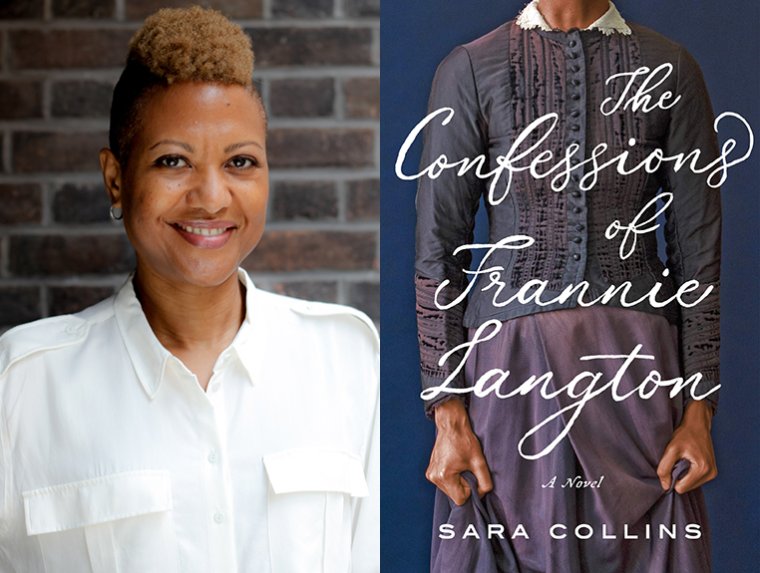
Sara Collins, author of The Confessions of Frannie Langton.


